Filters
Publications

The Macroeconomic Implications of Oil Price Uncertainty for Oil Exporting Economies: The Story of Saudi Arabia



24 December 2025
Oil price uncertainty – that is, greater unpredictability about future oil prices – is significant for oil exporters independently of whether today’s price rises or falls. This paper investigates how oil price uncertainty affects Saudi Arabia’s economy, using quarterly data from 2010 ...
Read More0

Resilient Chains, Fragile Links: The Paradox of Supply Security for Lithium, Nickel, and Cobalt



22 December 2025
The global push for net-zero has created opportunities in the mining, processing, refining, and manufacturing sectors. Industrial policies, influenced by resource endowments, have impacted markets through price volatility, supply chain challenges, and investment uncertainty. These iss...
Read More0

Global SAF Outlook: Production Capacity and Potential Share in Aviation Fuel

21 December 2025
Sustainable aviation fuels (SAFs) are drop-in alternatives to conventional jet-A1 fuel that require no changes to aircraft or fueling infrastructure. Widely recognized by regulators, airlines, and industry groups, SAFs are central to aviation’s decarbonization. Recent years have seen ...
Read More0

Differentiating Upstream Crude Oil Carbon Intensities in a Net-Zero World








21 December 2025
This study examines how leveraging upstream carbon intensities as a policy lever could reshape crude oil market dynamics, competitiveness, and asset stranding under net-zero pathways. Using GCAM-KSA with harmonised, field-level CI data, we simulate scenarios with uniform and heterogen...
Read More0

Cement in a Circular Carbon Economy: Implementing Carbon Capture and Utilization Options in Saudi Arabia


15 December 2025
Saudi Arabia’s cement sector is large, regionally concentrated, and pivotal to Vision 2030 delivery, but it is also highly carbon intensive. In this study, we estimate sectoral emissions and capture potential using a facility-level screening approach linked to prospective storage and ...
Read More0

Regression Analysis of Energy Rebound Effects From Connected Autonomous Vehicles: Urban–rural and Income Heterogeneity



10 December 2025
Read More
0

The Cost of Water in a Desert: How Much Can Saudi Arabia Save From Water Loss Reduction?



09 December 2025
Saudi Arabia is an arid nation experiencing a severe shortage of freshwater, which necessitates reliance on costly, energy-intensive seawater desalination to meet rapidly growing residential demand. Per-capita domestic water use is very high by international standards, reflecting both...
Read More0

Assessing the 2030 Technical Potential and Costs of Energy-From- Waste with Carbon Capture and Storage (WECCS) in Saudi Arabia


08 December 2025
Carbon dioxide removal (CDR) is a central pillar of Saudi Arabia’s pathway to net zero under the circular carbon economy (CCE) framework. Energy-from-waste with carbon capture and storage (WECCS) provides an integrated route that links waste management with engineered removals, yet it...
Read More0

Circular Carbon Economy in the Petrochemical Sector in Saudi Arabia: A Review of CO2 Utilization Potential Pathways

07 December 2025
This study evaluates the potential for CO2 utilization and recycling in Saudi Arabia’s petrochemical sector, with particular emphasis on its alignment with the Kingdom’s Vision 2030 and the broader framework of the circular carbon economy (CCE). It draws on published scientific litera...
Read More0

Measuring Carbon Circularity in the World’s Major Forest Economies: The CCE Index Forest Industry Lens


03 December 2025
This KAPSARC Commentary uses the KAPSARC’s Circular Carbon Economy (CCE) Index methodology to construct an aggregate score called the Forest Industry Lens (FIL), which measures the carbon circularity of the world’s major forest industry nations in the four areas of the CCE: reduce, re...
Read More0

Demand Response Programs: Concepts, Benefits, and Opportunities for the GCC Region



09 December 2025
The Gulf Cooperation Council (GCC) region is undergoing a transformational shift in its power sector, driven by ambitious national visions. Policies deployed in the region aim to enhance energy sustainability, integrate renewable energy sources, and improve the electricity sector’s ef...
Read More0

A Machine Learning Framework for Global Energy Demand Prediction: Cross-Country Analysis



26 November 2025
This study presents a comprehensive machine learning approach to model final energy consumption patterns across approximately 150 countries using Natural Gradient Boosting (NGBoost). Unlike traditional econometric methods that rely on point estimates, this approach provides probabilis...
Read More0

From Waste to Removal: The Policy Potential of Ex Situ Enhanced Mineralization in Saudi Arabia and the United Kingdom

25 November 2025
Ex situ enhanced mineralisation (ESEM) is a durable carbon dioxide removal (CDR) approach that reacts CO₂ with alkaline industrial residues to form stable carbonates while producing usable materials. Drawing on recent analysis from Saudi Arabia, this paper assesses the technical poten...
Read More0

To Auction or to Give for Free: Does the Allowance Allocation Regime Matter for Renewable Deployment in the EU ETS?


24 November 2025
Phase III of the European Union Emissions Trading System (EU ETS) marked a shift in the power sector from free allocation to auctioning as the default method of distributing allowances. To ease the transition, some lower-income countries were granted derogations that allowed them to r...
Read More0

Introduction of Electric Vehicles in Saudi Arabia: Impacts on Oil Consumption, CO2 Emissions, and Electricity Demand


23 November 2025
Read More
0

Weighting Performance of Airport Location Sustainability Criteria: An Expert-based Analysis


23 November 2025
Read More
0

Bridging the Divide: How Unequal Carbon Dioxide Removal Deployment Threatens Climate Equity and Global Mitigation Feasibility



19 November 2025
Read More
0

Tech Firms and the Renewable Energy Sector: Exploring the Moderating Effects of Institutional Ownership on Financial Connectedness

19 November 2025
Read More
0

Elasticity of Energy Substitution in Saudi Arabia's Industrial Sector

19 November 2025
Read More
0

Scaling Up BEV Charging and Battery Capacity in Saudi Arabia


18 November 2025
This study estimates the investment requirements for passenger battery electric vehicle (BEV) battery manufacturing and charging infrastructure in Saudi Arabia from 2026 to 2060 under two adoption scenarios: Ambition and Ambition_plus. Scenario-based modeling is used to project BEV st...
Read More0

Is the Single-Buyer Model a Barrier to Clean Energy? Empirical Evidence on Decarbonization and Renewable Energy Supply in 63 Developing Countries



18 November 2025
This paper compares the energy transition performance of the Single-Buyer Model (SBM) and the Competitive Wholesale Electricity Market (WEM) in 63 emerging and developing countries. Using propensity score matching and panel data analysis, we analyze renewable energy share in supply an...
Read More0

Breaking the Energy Efficiency Paradox in Buildings: Insights for Unleashing Benefits in Saudi Arabia

18 November 2025
This paper explores the economics of energy efficiency in buildings in Saudi Arabia, with a focus on the energy efficiency paradox. Despite the well-documented benefits of energy efficiency measures, such as lower energy bills and reduced greenhouse gas emissions, adoption rates have ...
Read More0

Urban Emissions Modeling Using the Metropolis Multi-Agent Framework: The Case of Riyadh City




12 November 2025
Urban mobility-related emissions are an increasing concern in rapidly expanding cities, highlighting the need for robust methods to assess and mitigate their environmental impact. This study develops a multi-agent model to estimate emissions in Riyadh city, which serves as the primary...
Read More0

Context Matters: Life Cycle Emissions and Policy Implications of Electric Vehicles in Evolving Carbon-intensive Energy Systems


11 November 2025
Read More
0

AI and Green Jobs in the Saudi Labor Market

11 November 2025
This paper explores the intersection of artificial intelligence (AI) adoption and the green transition in shaping the future of work in Saudi Arabia. Using an IMF-developed occupational framework of AI exposure and complementarity, distributional risks among the native workforce are a...
Read More0

Housing, Travel, and Energy Spatial-temporal Simulation of Riyadh: Impacts of the New Murabba Project

08 November 2025
Read More
0

Nudging the Kingdom’s Kilowatts: Evidence from Saudi Households

29 October 2025
We conducted a six-month randomized controlled trial with 62,750 Saudi households assigned to one of four behavioral treatments: (i) peer-to-peer comparisons, (ii) peer comparisons with energy-saving tips, (iii) high-alert messages, and (iv) a bundled intervention. Some treatments red...
Read More0

Bridging Analytics and Policy: AI-Enabled Dynamic Line Rating and Large Language Model-Assisted Recommendations to Optimize Power Sector Planning and Operation

29 October 2025
This paper introduces a novel framework that bridges analytics, prediction, explanation, and optimization to support power sector planning and operation. The framework leverages large language models (LLMs) to assist experts in formulating policy recommendations. At its core, the fram...
Read More0

Assessing Passenger Car Emissions in Saudi Arabia: A Life Cycle Approach to Energy and Temporal Grid Dynamics


28 October 2025
Decarbonizing transport is central to global climate goals. Addressing this challenge requires a multifaceted approach, yet dominant policy narratives continue to promote battery electric vehicles (BEVs) as a universally optimal solution. This study assesses that narrative by evaluati...
Read More0

Renewable Energy Certificates in the Saudi Electricity System


28 October 2025
A renewable energy certificate (REC) is a tradable instrument that represents 1 megawatt-hour (MWh) of electricity generated from renewable sources. In addition to the electricity itself, a REC embodies the non-energy attributes of that generation, such as reductions in greenhouse gas...
Read More0
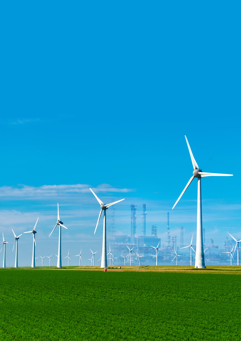
Elasticity of Energy Substitution in Saudi Arabia’s Industrial Sector

28 October 2025
Industrial activities account for a significant share of global energy consumption and carbon emissions, so understanding the elasticity of substitution between fuels in the industrial sector is crucial for designing effective energy and environmental policies. This study examines the...
Read More0

Oil Derivatives Positioning amid Trade Policy Upheaval: Insights from the Week Following Liberation Day


27 October 2025
In the week following the US "Liberation Day", interactions among market participants produced a rare smile-shaped oil futures curve. Independent producers sold June and December contracts, while consumers and physical speculators bought farther-dated ones. As prices collapsed, some f...
Read More0

Geologic Hydrogen and the Future of Clean Energy: Global Trends and Saudi Arabia’s Potential



27 October 2025
Meeting the world’s rising energy demand while simultaneously addressing climate change is one of the defining challenges of our time. As populations grow and economies develop, energy consumption is projected to rise significantly. OPEC, for instance, projects a 23% increase in prima...
Read More0
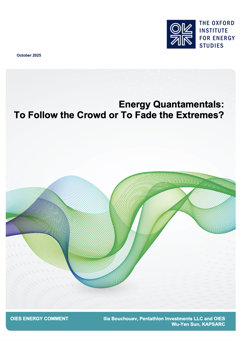
Energy Quantamentals: To Follow the Crowd or To Fade the Extremes?

23 October 2025
Read More
0

Too Many of the Same: Occupational Crowding, AI, and Wages


21 October 2025
Saudi Arabia’s transition toward a diversified and knowledge-based economy creates a strategic window to position artificial intelligence (AI) as a driver of productivity, innovation, and high-quality employment. Using unique administrative data on Saudi workers, this study provides e...
Read More0

Predicting Provincial Economic Activity in Saudi Arabia: The Case of the Eastern Province

21 October 2025
This study employs advanced econometric modeling to generate short-term projections of regional economic activity (gross value added, or GVA) in Saudi Arabia, focusing on the Eastern Province, which is the largest in terms of economic activity in the Kingdom. A combined forecasting fr...
Read More0

Closing the Clean Cooking Gap in Ghana and Kenya: Access Trajectories, Costs, and Policy


21 October 2025
Read More
0
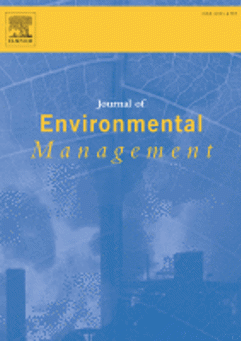
Can Efficiency Offset Emissions Stemming from Urban Growth? Prospects for Saudi Buildings



16 October 2025
Read More
0
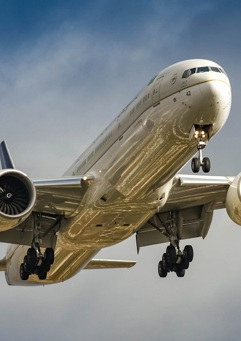
Embedding Sustainability in Airport Development: A Framework for Saudi Arabia


15 October 2025
Airports are critical infrastructure, and the selection of their locations has a significant impact on long-term sustainability. Saudi Arabia has recently embarked on an ambitious infrastructure development program to support its objectives of economic diversification, global connecti...
Read More0
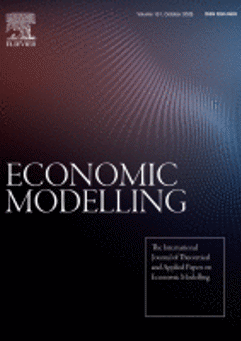
How Does Disaster Risk Impact Fiscal Sustainability and Inequality?

15 October 2025
Read More
0
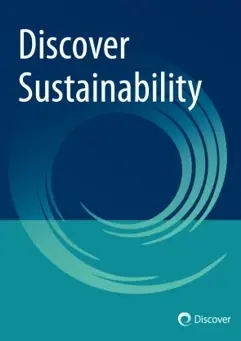
Tourism and Air Transport Growth in Saudi Arabia


10 October 2025
Read More
0
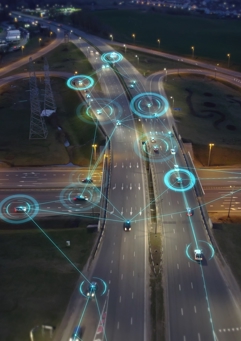
Driving the Future: How Connected Autonomous Vehicles Reshape Travel and Energy Demand in Urban and Rural Areas – An Empirical Modeling Approach



09 October 2025
The rapid evolution of connected autonomous vehicles (CAVs) is ushering in a transformative era in transportation, with profound implications for travel behavior, fuel efficiency, and mobility dynamics in both urban and rural areas.
Read More0

From Metrics to Markets: Evaluating the Role of ESG Ratings in Steering Sustainable Capital Flows




06 October 2025
This paper critically evaluates the role of ESG ratings in steering sustainable capital flows, examining both corporate and sovereign contexts. It reviews the methodologies of major rating providers highlights divergences that undermine comparability and consistency. The study explore...
Read More0
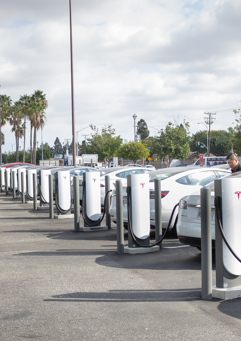
Aligning Vehicle Electrification With Power Sector Transitions: Life Cycle Insights Across Diverse Grids


05 October 2025
This study examines how the life-cycle greenhouse gas (GHG) emissions of battery electric vehicles (BEVs) vary across electricity systems with different carbon intensities, and how those emissions evolve in response to announced national energy transition initiatives. Using a temporal...
Read More0
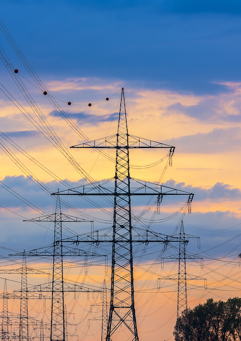
Energy Efficiency: Measuring Fish by How Well They Climb Trees

02 October 2025
Energy efficiency is a crucial component of sustainable development and resource conservation. Policies and actions aimed at improving energy efficiency play a critical role in reducing energy consumption, mitigating environmental impact, and fostering economic growth. However,...
Read More0

Measuring Quarterly Economic Activity Across Saudi Arabia’s Provinces Using Advanced Methods and Data Sources


02 October 2025
Access to province-level key macroeconomic indicators is essential for identifying disparities and potential areas for policy intervention, monitoring the coherence of economic development across provinces, and assessing the impact of Saudi Arabia’s Vision 2030 initiatives on p...
Read More0

Dividends of Expanding Clean-Cooking Fuel Access: Rural-Urban Evidence on Infant, Maternal, and Nutrition Gains

02 October 2025
Access to clean cooking fuels is essential for improving health, equity, and environmental sustainability globally. Despite ongoing policy efforts, a large number of households, particularly in developing countries, continue to rely on polluting cooking fuels, which contributes to adv...
Read More0
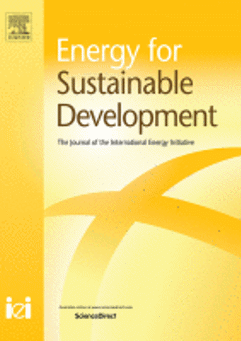
An Expert Opinion-based Perspective on Emerging Policy and Economic Research Priorities for Advancing the Low-carbon Hydrogen Sector


01 October 2025
Read More
0
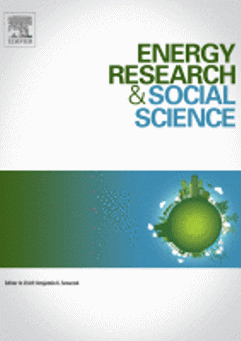
A Perspective on the Evolving Plug-in Electric Vehicle Landscape Amid Trade Tariffs and Strategic Responses


30 September 2025
Read More
0
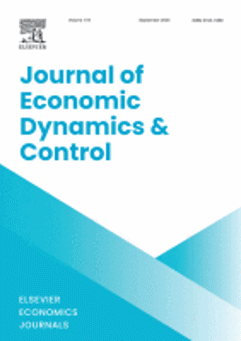

Tourism Expansion and Air Transport in Saudi Arabia: A Case Study on Growth, Connectivity, and Efficiency


29 September 2025
Saudi Arabia’s Vision 2030 outlines a transformative agenda centered on infrastructure development and the expansion of the tourism sector, supported by strategies such as the National Transport and Logistics Strategy, the National Tourism Strategy, and the Saudi Aviation Strategy. Wh...
Read More0
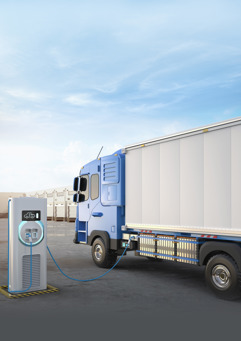
China’s Electric Truck Boom: A Double-Edged Sword for Oil Demand and Power Supply

28 September 2025
China’s rapid shift toward electric vehicles (EVs), especially in the heavy-duty trucking sector, is reshaping its oil consumption landscape. While the initial wave of electrification primarily impacted gasoline demand through widespread adoption of light-duty EVs, recent momentum in ...
Read More0
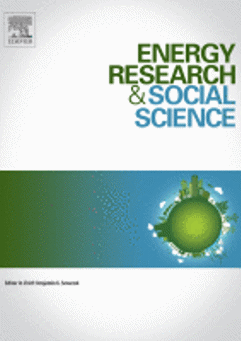
The Limits of Energy Conservation: Why Doubling Current Energy Efficiency Progress Is No Easy Feat

28 September 2025
Read More
0

A Commentary on the 2025 IEA Future of Electricity in the Middle East and North Africa Report

27 September 2025
Earlier this month, the International Energy Agency (IEA) released The Future of Electricity in the Middle East and North Africa report, which reviews historical trends in the electricity sector and projects its developments to 2035. Given Saudi Arabia’s size and importance in the reg...
Read More0

Mapping the AI Landscape in Buildings Energy Research: Temporal Dynamics and Global Disparities Using Topic Modeling


26 September 2025
Read More
0
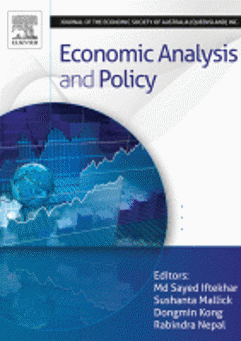
National Innovation Capacity and the Drivers of Energy Efficiency R&D in the OECD

26 September 2025
Read More
0
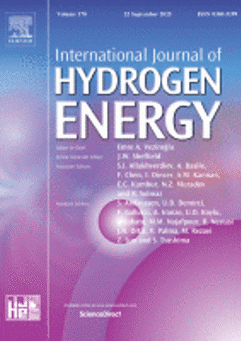
The Economics of Off-shore Wind-based Hydrogen Production in Saudi Arabia



26 September 2025
Read More
0
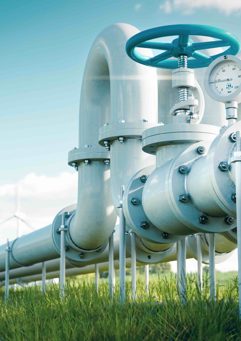
Designing Effective Hydrogen Markets: Policy Recommendations from Electricity and Gas Market Reform


25 September 2025
Read More
0

Uncertainty In Modelling the Demand for Minerals from the Energy Sector at a Country-level: A Case Study of Saudi Arabia

24 September 2025
Read More
0
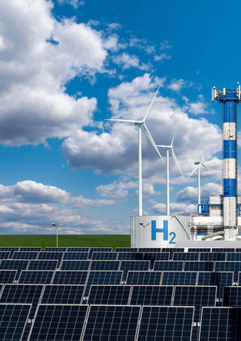
Decoding European RFNBO and Low Carbon Fuels Regulations: Implications for Hydrogen Production from Electricity in Saudi Arabia


21 September 2025
Previous recent publications from KAPSARC have explored the possibilities for a global framework for low-emission hydrogen and have identified research priorities. Building on these, this commentary presents key principles of the European Union (EU) hydrogen certification and derives ...
Read More0
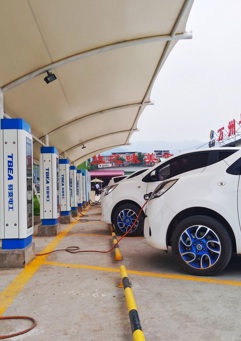
A Perspective on the Evolving Plug-in Electric Vehicle Landscape Amid Trade Tariffs and Strategic Responses


15 September 2025
Various explanations have been proposed for the recent slowdown in the growth of global plug-in electric vehicle (PEV) sales. Considerable uncertainty also remains regarding future PEV adoption rates due to evolving consumer incentives and newly announced Western tariffs on Chinese PE...
Read More0
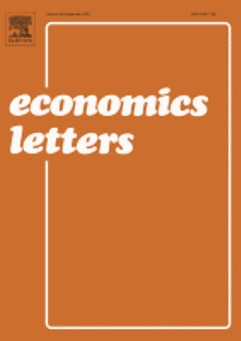
Macro-financial Impacts of Foreign Digital Money

01 September 2025
Read More
0
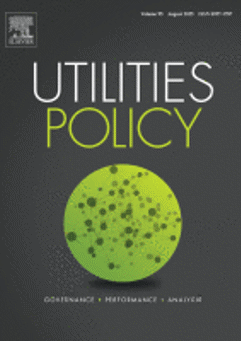
The Impact of Variable Renewables on Price Dynamics Within Wholesale Electricity Markets


31 August 2025
Read More
0
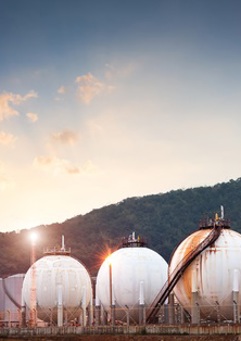
AI-Based Dynamic Line Rating for Enhancing Renewables-Gas Complementarity in the Power Sector



28 August 2025
As renewable energy (RE) grows, efficient grid integration is vital to reduce curtailment and defer costly infrastructure upgrades. Among available options, dynamic line rating (DLR) offers a low-cost, data-driven solution that enhances transmission line capacity based on real-time we...
Read More0

Mapping Global Income and Basic Residential Energy Inequality

28 August 2025
Despite global efforts to expand energy access, substantial disparities persist, with basic residential energy services remaining unavailable to large populations, particularly those contributing minimally to emissions yet experiencing heightened climate vulnerability. Using harmonize...
Read More0
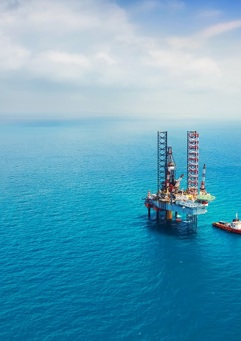
The Art of War in Oil Markets: A Tripartite Framework for Strategic Countermeasures to the Phantom Oil Conundrum




27 August 2025
To counter phantom oil, ad hoc responses are not enough; what is needed is a systematic, coherent framework that integrates technical tools, legal enforcement, institutional capacity, and international cooperation into a phased, adaptive strategy. Isolated interventions—such as fuel m...
Read More0

The Role of Ownership Structure in Oil and Gas Production After the Paris Agreement

21 August 2025
This paper investigates the role of state ownership in oil and gas production after the Paris Agreement, comparing national oil companies (NOCs) with international oil companies (IOCs). Using firm-level panel data spanning from 2010 to 2021 in a difference-in-differences setting, it w...
Read More0
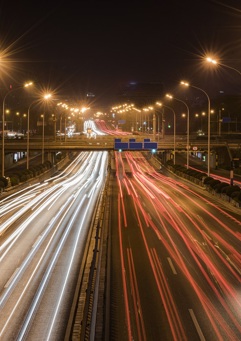
The Rising Cost of Cooling: Regional Energy Futures in a Warming Saudi Arabia



21 August 2025
This study quantifies the impact of a warming climate on residential cooling demand in Saudi Arabia, examining four regions through 2060. Utilizing region-specific electricity demand models and IPCC temperature pathways, we find that a 1°C increase in average temperature could raise e...
Read More0

China’s Vehicle Trade-In Subsidy: Impact, Cost-Effectiveness, and Barriers to Electric Vehicle Purchase

21 August 2025
of trade-ins that would not have occurred in its absence – and analyze its cost-effectiveness. Results indicate that approximately 44% of respondent trade-ins were directly attributable to the subsidy, with a greater impact observed among lower-income consumers. On average, the subsid...
Read More0

Future of Residential Electricity Demand in Saudi Arabia and the Role of Energy Efficiency in 2060’s Net Zero Pledge

21 August 2025
Read More
0
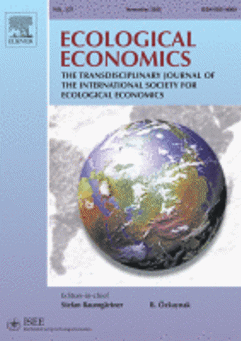
Navigating the energy transition in the EU: Renewables, critical raw materials and emerging vulnerabilities

14 August 2025
Read More
0

Sustainable Aviation Fuel (SAF): Charting the Path to Net Zero in the Skies?


10 August 2025
As the aviation industry faces mounting pressure to reduce its carbon footprint, sustainable aviation fuel (SAF) has emerged as a pivotal component in the pathway to achieving net-zero emissions by 2050. According to the International Air Transport Association (IATA), SAF could...
Read More0
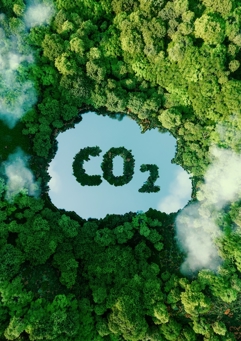
Social Cost of Carbon: The Elusive Quest for the Right Value to Guide Policy

06 August 2025
The social cost of carbon (SCC) assigns a monetary value to the economic and societal costs of accumulating CO2 emissions in the atmosphere, making it a key metric for shaping climate policy. In particular, it gives guidance for evaluating whether the benefits of a policy, regulation,...
Read More0

Assessing the Technical Potential of Ex Situ Enhanced Mineralization in Saudi Arabia

03 August 2025
Ex Situ Enhanced Mineralization (ESEM) has emerged as a viable CO2 utilization pathway and carbon dioxide removal (CDR) strategy, leveraging industrial byproducts and silicate minerals to permanently sequester CO₂ in stable carbonate forms. Saudi Arabia, with its vast industrial lands...
Read More3
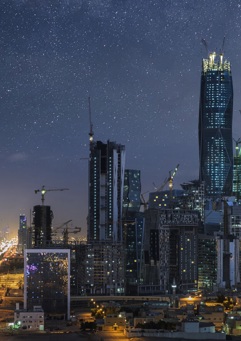
Global Demand for Materials for the CCS Industry: A Case Study of Saudi Arabia


03 August 2025
In this paper, we examine the materials required for the deployment of the targeted, and projected levels of CCS across the globe and for a case study of Saudi Arabia. We examine the materials required for the construction and operation of CCS capture plants on both power generation a...
Read More3
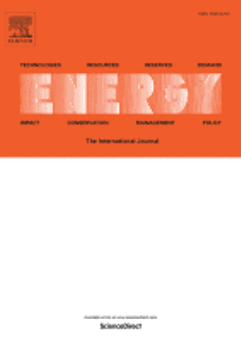
Breaking Down Barriers: Emerging Issues on the Pathway to Full-scale Electrification of the Light-duty Vehicle Sector

31 July 2025
Read More
0

Rethinking the Oil Futures Market: Insights from Commodity Futures Literature and Speculators’ Perspectives

27 July 2025
This article examines speculative activity in the oil futures market and revisits key insights from the broader commodity futures literature. We trace the evolution of the oil futures market over the past four decades through the lens of speculators, offering a nuanced perspective on ...
Read More9

The Impact of Temperature on Energy Consumption and Carbon Emissions in Saudi Arabia



27 July 2025
This study explores the intricate relationship between rising temperatures and energy demand in Saudi Arabia. By employing advanced econometric modeling, it quantifies the impact of temperature changes on consumption patterns across electricity and non-electricity sectors. Simulating ...
Read More9

Trends in Global Solar Photovoltaic Installation in 2024

27 July 2025
Read More
9
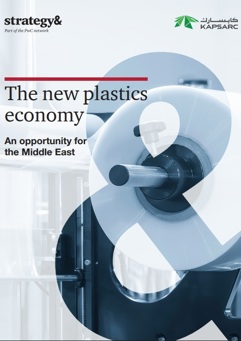
The New Plastics Economy: An Opportunity for the Middle East




24 July 2025
This joint report by Strategy& and KAPSARC explores how this new plastics economy presents an opportunity for Middle East countries, in particular those of the Gulf Cooperation Council (GCC), to become a global hub for circular plastics. By linking plastic waste supply from Asia w...
Read More11
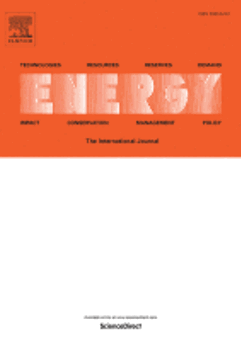
Life Cycle Greenhouse Gas Emissions of Jet Fuel Production and Consumption in the Kingdom of Saudi Arabia


24 July 2025
Read More
5
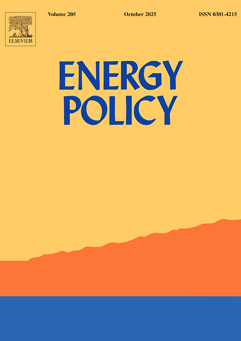
Applying multi-criteria decision analysis in the assessment of carbon dioxide removal technologies for Saudi Arabia


22 July 2025
Read More
10
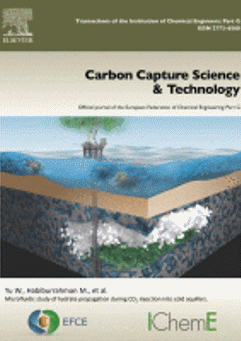
Techno-economic assessment of waste heat-powered direct air capture in the refinery and petrochemical sectors in Saudi Arabia


22 July 2025
Read More
11

Generative AI for the Power Sector: Methodology, Safety, Trustworthiness, and Policy Implications


17 July 2025
Power systems are transforming into digitalized smart grids where cyber, physical, and social domains converge. In parallel, Generative AI (GenAI) offers new capabilities to address these challenges. While prior research explores AI in specific power sector applications, comprehensive...
Read More18
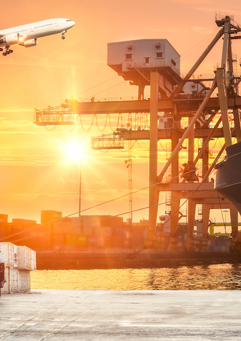
An Expert Opinion-Based Perspective on Emerging Policy and Economic Research Priorities for Advancing the Low-Carbon Hydrogen Sector


17 July 2025
This perspective sheds light on emerging research priorities crucial for advancing the low-carbon hydrogen sector considered critical for achieving net zero greenhouse gas emissions targets especially for hard-to-abate sectors. Our analysis follows a five-step process, including drawi...
Read More16
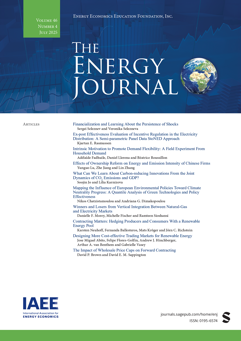
Net Zero Emissions in Saudi Arabia by 2060: Least Cost Pathways, Influence of International Oil Price and Economic Consequences

16 July 2025
Read More
20

Is the Single-Buyer Model a Barrier to Clean Energy Deployment? Empirical Evidence on Decarbonization and Renewable Energy Supply in 63 Developing Countries



13 July 2025
This paper compares renewable energy share in generation and carbon emission intensity of the Single-Buyer Model (SBM) and the Competitive Wholesale Electricity Market (WEM) in 63 emerging and developing countries. Using propensity score matching and panel data analysis, we analyze ho...
Read More23

The Art of Endurance Oil Sanctions and the Strategic Adaptations of Sanctioned Oil- Exporting States

13 July 2025
This paper examines the evolution and impact of oil-related sanctions on Venezuela, Iran, and Russia, focusing on their economic and political consequences. It compares how each country has adapted to sanctions based on differences in economic structure, global alliances, and strategi...
Read More21

The U.S.-China Tariff Conflict and the LNG Market: Modelling Consequences Until 2030

08 July 2025
To answer it, the author ran the World Gas Model developed by Nexant using three Scenarios . The first Scenario is a baseline scenario developed by Nexant, describing business-as-usual development of the world gas market as if no spat between China and the U.S. took place. In Scenario...
Read More25

Assessing the Potential of Emerging CO2 Utilization Pathways in Saudi Arabia: A Multi-criteria Decision Analysis Approach


12 August 2025
Read More
32

Watt’s Next? The Future of Electricity Market Design and Regulation

03 July 2025
In recent years, power markets have experienced significant price volatility, ranging from record-high peaks to negative prices. While such spikes are an inherent feature of marginal pricing, they have nevertheless sparked concerns over windfall profits and the fair allocation of cost...
Read More14
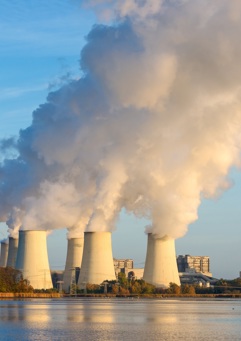
Governmental Carbon Crediting Mechanisms: Global Experiences and Insights for Saudi Arabia

03 July 2025
This paper examines governmental carbon crediting mechanisms, offering a focused look at three programs that initially operated independently of compliance schemes such as emissions trading systems or carbon taxes. The paper aims to provide insights into crediting mechanisms similar i...
Read More14

Changing Tides: Strategic Implications of the New Draft IMO Net-Zero Framework for the Maritime Sector

30 June 2025
Read More
37

Why Doubling Current Energy Efficiency Progress Is No Easy Feat

30 June 2025
Energy efficiency is central to achieving global decarbonization objectives. The COP28 agreement calls for doubling the average annual rate of energy efficiency improvements from 2% to 4% annually by 2030. In this paper, we discuss the feasibility of the COP28 target by analyzing hist...
Read More36
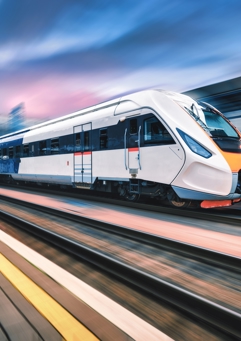
Prospects for Sustainability in Riyadh’s Metro Connectivity




25 June 2025
Public transportation is essential for functional urban mobility, offering cost- effective, safe, and convenient commuting – especially in densely populated cities like Riyadh. Between 2019 and 2024, average peak-hour travel time within Riyadh increased by approximately 10%, accordin...
Read More29
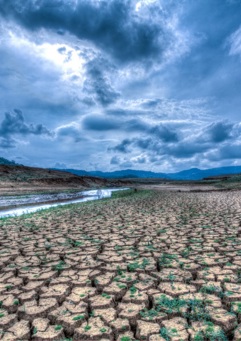
Determinants of Sustainable Finance Flows: A Literature Review


25 June 2025
Sustainable finance has gained remarkable momentum over the past decade, but its global allocation remains uneven, with emerging market and developing economies (EMDEs) struggling to attract the capital required to meet ambitious climate targets. This shortfall threatens progress towa...
Read More30
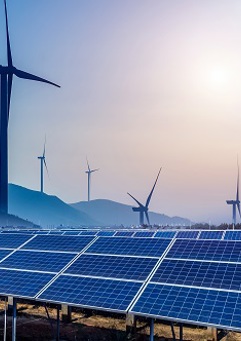
Positioning Saudi Arabia’s Biogas Power Sector on the Global Stage: A Comparative Economic and Environmental Analysis



25 June 2025
Saudi Arabia is advancing a comprehensive framework to reduce greenhouse gas emissions through a range of strategies, including the displacement of liquid fuels, the implementation of energy efficiency measures, and the deployment of renewable energy technologies. To complement these...
Read More31

The Impact of LPG Adoption on Time Allocation, Employment, and Earnings in Kenya

25 June 2025
This study investigates how access to liquefied petroleum gas (LPG) affects time allocation, employment, and earnings in Kenya, using data from the country’s first nationally representative time use survey, Kenya Time Use Survey 2021 (KTUS) (Kenya National Bureau of Statistics 2023a),...
Read More29

The Impact of Variable Renewables on Price Dynamics Within Wholesale Electricity Markets



17 June 2025
The increasing integration of variable renewable energy sources introduces new complexities into electricity markets. This paper investigates their effects on price dynamics by utilizing unplanned wind power plant outages as exogenous shocks. Using data from the Turkish electricity m...
Read More33

Application of Global Optimization and Machine Learning Models to Refinery Programming

16 June 2025
aditional crude oil refinery production and economic models adopt linear approximations to facilitate linear programming applications for the purposes of operational planning, scheduling, and/or logistics to optimize product yields, margins, or other performance metrics of interest, u...
Read More24

The Response of Global Oil Inventories to Supply Shocks




16 June 2025
Read More
22

Analyzing The Interplay of Urbanization, Economic Development, and Seaborne Trade: Revealing Their Connection to Urban Resilience in Saudi Arabia



15 June 2025
Read More
24
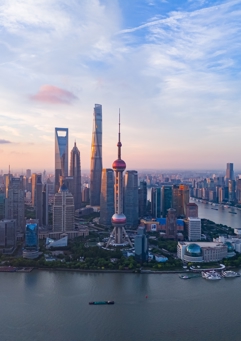
Comparing the Latest 2024 Estimates of Methane Emissions for Saudi Arabia


11 June 2025
Methane is a very potent greenhouse gas (GHG) and the second-largest contributor to climate change after carbon dioxide (IPCC 2021). Over a 100-year period, 1 ton of methane can trap as much heat as almost 30 tons of carbon dioxide (IPCC 2021). Therefore, methane emission reductions a...
Read More33

Decarbonization Pathways for Asphalt Pavement Mixtures in Saudi Arabia: A Life Cycle Assessment Approach



11 June 2025
This study conducts a cradle-to-gate life cycle assessment (LCA) of asphalt mixtures in the Kingdom of Saudi Arabia (KSA). It focuses on assessing the environmental impacts of asphalt mixtures produced with and without reclaimed asphalt pavement (RAP), as well as the use of warm mix a...
Read More33

Assessing the Feasibility and Sustainability of Urban Air Mobility in Saudi Arabia

02 June 2025
Urban air taxis promise a revolution in transportation. However, the question of their immediate feasibility demands a complex answer, requiring a balance of technical capabilities, cost-effectiveness, operational efficiency, regulatory hurdles, and public acceptance. Urban air mobili...
Read More27
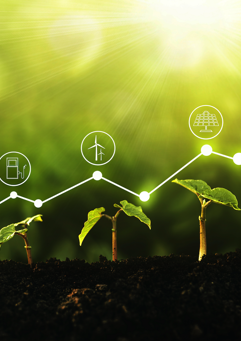
Life Cycle Environmental and Cost Analysis of SUVs: a Saudi Arabia Case Study




01 June 2025
Read More
21

A Perspective On Emerging Policy and Economics Research Priorities for Enabling Low-carbon Trucking


01 June 2025
Read More
20

Integrating Fairness Principles into Global Net-Zero Targets A Systematic Exploration of Fair Climate Policy



01 June 2025
Equity is a cornerstone of international climate policy, yet operationalizing “fair” burden-sharing remains challenging. Here we present a comprehensive effort-sharing framework that systematically spans a broad spectrum of principles, rather than limiting analysis to a few discrete ...
Read More28

January 2025, KAPSARC, in collaboration with the ELEVATE project funded by the European Union, conducted a “Co-Creation Workshop on National and Global Net-Zero Strategies.” The event brought together policymakers, industry professionals, think tanks, and academics to integrate scien...
Read More25

Balancing The Value Of Plug-in Electric Vehicle Subsidies



28 May 2025
While subsidies increase sales in the medium term, they can pose significant challenges to overall cost-effectiveness.
Read More0

Aligning Urban Growth with Climate Goals: Emission Drivers and Policy Responses in Saudi Arabia’s Building Sector


27 May 2025
This study combines an econometric analysis and a Monte Carlo simulation to explore the drivers of carbon dioxide (CO₂) emission reductions in the Saudi building sector, with a particular focus on energy efficiency. Historical data from 1990 to 2022 are used to estimate the effects o...
Read More28

The Green Transition and Tech Firms’ Financial Performance: Insights from Patent Data

27 May 2025
The twin green and digital transitions are shaping the global business environment. However, academic research exploring the financial implications of the green-digital nexus remains limited. This paper explores the financial implications of a key mechanism within the green-digital n...
Read More29

Demand-side Modeling of Energy

22 May 2025
This entry gives a thorough overview of the concept of energy demand, including its forms and the different consumer groups associated with it. It outlines the theoretical underpinnings of how energy demand is shaped, and discusses the significance a... Read Full Book Chapter Here
Read More26

How Can LCA Inform ASI Strategies for Sustainable Mobility Transitions?

22 May 2025
Integrated approaches are vital for guiding sustainable mobility transitions, yet there is limited understanding of how life cycle assessment (LCA) can operationalize Avoid-Shift-Improve (ASI) strategies. This study explores the connections between LCA and ASI, demonstrating that LCA...
Read More33
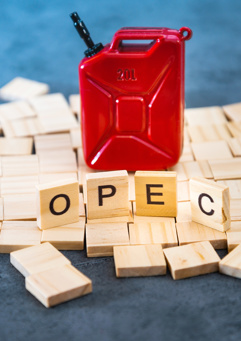
Do Rising and Falling Oil Prices Affect Non-Oil Trade Balance Equally? Evidence from OPEC Countries


22 May 2025
This study investigates the effects of oil price changes on the non-oil trade balance in four major OPEC economies – the Kingdom of Saudi Arabia (KSA), Kuwait, Nigeria, and Venezuela – over the period 1982-2022.
Read More25
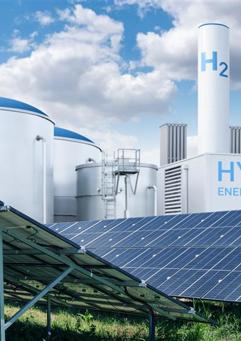
Advancing Hydrogen in Saudi Arabia: Evidence-Based Insights from Stakeholder Engagement and Expert Survey




22 May 2025
Hydrogen technologies offer a promising pathway for reducing greenhouse gas emissions and advancing climate objectives globally. Integrating hydrogen into the Circular Carbon Economy framework is a strategic priority in the Kingdom of Saudi Arabia (KSA) to address climate and economi...
Read More21
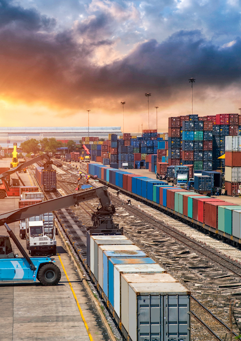
Future Seaborne Exports and Their Impacts on Bunker Energy Demand: An Estimation of Saudi Container Seaports


22 May 2025
Seaports are crucial for facilitating maritime trade and integrating countries into the global economy. Understanding port business dynamics, including trade and the impact on bunker energy demand, is essential for a nation’s competitiveness. Saudi Arabia’s ports are strategically sit...
Read More23

Improving Predictive Ability of Macroeconometric Models Using Coefficient Averaging


22 May 2025
approach to enhance KGEMM’s predictive ability. The framework includes the consideration of theoretically consistent estimates from single equation cointegration methods and Vector Autoregressive models for averaging after a set of prediction accuracy metrics widely used in empirica...
Read More26

Energy economists gathered in Riyadh to discuss the region’s unique opportunities and economy diversification challenges of energy transition.
Read More0

How OPEC Stabilizes Oil Prices, Despite Information Gaps



21 May 2025
Research shows just how volatile oil prices would have been without OPEC’s recent interventions.
Read More0

Race to the Top: Harmonizing Regulations for Geological CO₂ Storage Under Article 6


20 May 2025
The urgent need to mitigate climate change underscores the importance of achieving reliable and widespread deployment of geological carbon storage. This discussion paper highlights the role of robust and harmonized state regulations in ensuring the environmental integrity of CO2 stor...
Read More29

Breaking Down Barriers: Emerging Issues on the Pathway to Full-scale Electrification of the Light-Duty Vehicle Sector



20 May 2025
A key pathway being considered worldwide to achieve net-zero greenhouse gas emissions in the light-duty vehicle (LDV) sector is the complete transition to electric vehicles (EVs). In this research, we assess potential barriers and challenges to fully electrifying the LDV sector. We u...
Read More31

Saudi Arabia’s Transport Sector in Transition: Life Cycle Perspectives



06 October 2025
Transportation is a fundamental driver of economic growth but also a significant contributor to environmental challenges such as air pollution and climate change. The Kingdom of Saudi Arabia (KSA) has set ambitious objectives to diversify and decarbonize its economy in order to achie...
Read More28

Inexpensive Renewable Electricity Enables Saudi Arabia’s Fuel Price Reforms

20 May 2025
Saudi Arabia is currently implementing fuel price reforms. The reforms are being executed in phases, where the ultimate goal is to have fuel prices approach their market equivalent values. Using the KAPSARC Energy Model, this analysis shows that such reforms would have been more cost...
Read More29

Competing in a Carbon-Constrained World: Exploring the Emerging Concept of Carbon Competitiveness

18 May 2025
The interplay between climate policies and economic competitiveness is increasing rapidly. In response, the concept of carbon competitiveness is emerging as a crucial factor that is shaping the future of global trade and climate action. The central challenge lies in balancing the nee...
Read More26

The Dynamics of Variable Renewable Energy Integration: A Multi-Dimensional Framework for Future Power Systems



18 May 2025
This paper examines the impacts of integrating a high share of variable renewable energy (VRE) on power systems and markets, proposing a multi-dimensional framework to analyze its technical, economic, and regulatory challenges. A structured literature review and topic modeling are em...
Read More26
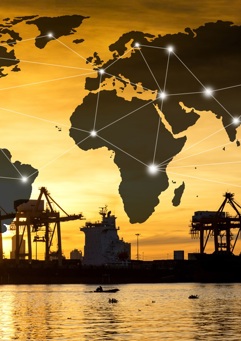
Towards a Global Framework for Low-Emission Hydrogen: Certification and Trade in International Collaboration




18 May 2025
The international certification and trade of low-emission hydrogen are critical for decarbonizing hard-to-abate sectors such as heavy industry and transportation. However, fragmented regulatory frameworks across jurisdictions pose significant barriers to scaling global trade and inve...
Read More23
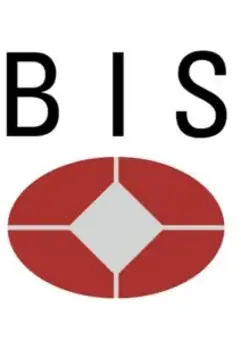
Financing the Decarbonization of Hard-to- Abate Sectors Trends, Issues, and Ways Forward

18 May 2025
The decarbonization of hard-to-abate sectors, such as steel, cement, petrochemicals, and heavy transportation, is essential to achieving global net-zero targets and maintaining financial stability. Despite a significant increase in global transition... Read Full Book Chapter Here
Read More35

Can Converting Plastic To Oil Solve The Plastic Crisis?


14 May 2025
Managing the global problem of plastic waste requires innovative approaches. Plastic-to-oil technologies offer a promising solution by converting a waste product into a valuable commodity.
Read More0

Certifying The Transition To Clean Hydrogen Production


14 May 2025
The rapid rollout of blue hydrogen demands international standards to certify the capture and storage of Co2 generated during production.
Read More0
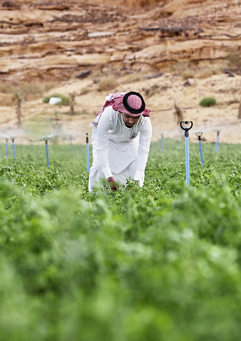
How Can The MENA Region Navigate Water Scarcity?
07 May 2025
A KAPSARC study shows regional policymakers how different strategies would affect water, energy and food activities under a socioeconomic framework.
Read More0

Charged Possibilities: Exploring The Potential Of Regional Electricity Trade




07 May 2025
As Arab countries link their grids, electricity trading can bring major savings and pave the way for a green transition.
Read More0

Decarbonizing Saudi Arabia’s Transportation: Insights from LCA Case Studies

05 May 2025
The transport sector is vital to Saudi Arabia’s socioeconomic landscape, yet it contributes approximately 22% of the nation’s total greenhouse gas (GHG) emissions. As the Kingdom diversifies its economy beyond the oil sector, adopting sustainable transport solutions is essential for ...
Read More29

Integrating Life Cycle Assessment and Avoid-shift-improve Frameworks for Sustainable Mobility Transition in India




01 May 2025
Read More
18

Climate Change and Carbon Policy: A Story of Optimal Green Macroprudential and Capital Flow Management

01 May 2025
Read More
23

Assessing the Impact of Energy Transition Initiatives on the Policy Cost of Saudi Arabia's Net-Zero Ambition
30 April 2025
Read More
23
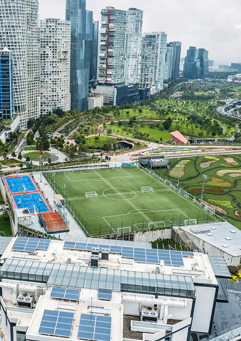
Transforming Residential Energy Use For A Sustainable Future

30 April 2025
A curated collection of research papers looks at the challenges, benefits, and future directions of residential buildings’ energy efficiency.
Read More0

Navigating Carbon Circularity: Lessons From Southeast Asia



30 April 2025
A detailed assessment of Southeast Asian countries highlights the successes and challenges in moving toward carbon-neutral economies.
Read More0

Toward AV-CAV Deployment in the Kingdom of Saudi Arabia: A Readiness Assessment Based on Expert Feedback



29 April 2025
Read More
26

The “Resolutionary” Shift: The EU’s Transition to 15-Minute Clearing in Day-Ahead Electricity Markets

27 April 2025
In an effort to enhance grid stability, support the deployment of renewable energy, and improve overall electricity market performance, the European Union (EU) is preparing to implement a significant change – the introduction of a 15-minute Market Time Unit (MTU) across its interconn...
Read More27

Are There Adequate Materials and Land Resources for the Saudi Power Sector to Achieve Net Zero by 2060?







27 April 2025
Saudi Arabia has committed to net-zero (NZ) greenhouse gas emissions by 2060. This requires substantial emission reductions across key sectors, including the power generation sector. We assess the technological options, critical mineral requirements, renewable energy resource require...
Read More26

Myths and Mysteries About Speculation in the Oil Market


27 April 2025
The article provides unique quantitative insights about highly secretive and poorly understood speculation in the oil market. To demystify the behavior of speculators, we look at the problem from five different angles. First, we explain how the presence of large over-the-counter (OTC...
Read More33
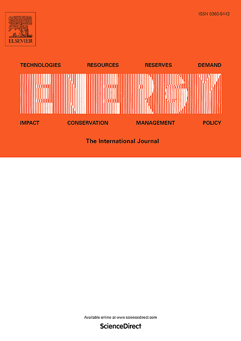
Cross-Border Electricity Trading in the GCC Countries, Egypt, Jordan and Iraq: Hourly Market Coupling or Bilateral Agreements?




26 April 2025
Read More
22
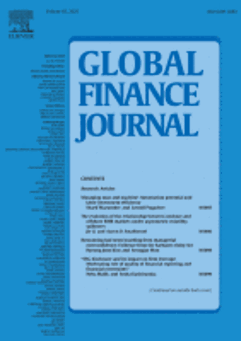
The Green Transition and Tech Firms' Financial Performance: Insights From Patent Data

23 April 2025
Read More
0

Non-oil Productivity Growth To Propel Saudi Arabia’s Vision 2030 Success


23 April 2025
Insight into the drivers of Saudi Arabia’s international competitiveness will help the country meet its strategic targets.
Read More0

Saudi Arabia’s Pivotal Role In Reducing Global Maritime Emissions And Decarbonizing Maritime Transport



23 April 2025
How the Kingdom’s strategic location, resources, and commitment to hydrogen infrastructure could fuel the transition of the maritime sector.
Read More0
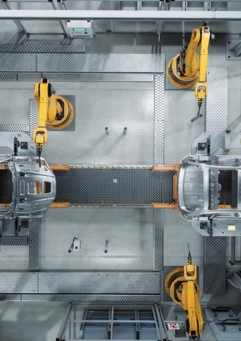
Toward Autonomous and Connected Autonomous Vehicle (AV-CAV) Deployment in Saudi Arabia: A Readiness Assessment Based on Expert Feedback


21 April 2025
The deployment of autonomous vehicles (AVs) and connected autonomous vehicles (CAVs) presents significant opportunities to transform urban mobility, reduce emissions, and enhance transportation efficiency. This study evaluates the readiness of the Kingdom of Saudi Arabia (KSA) for AV...
Read More63

Advancing Plastic Waste Recycling in the GCC: Policies, Technologies, and Economic Opportunities




21 April 2025
This report aims to provide a comprehensive analysis of plastic waste disposal, recycling rates and the recycling infrastructure gaps in the GCC countries, along with encouraging policies to capture the untapped potential of the recycling sector, and transition from current disposal-...
Read More51

Emerging Policy and Economics Research Priorities for Enabling Low-Carbon Trucking


16 April 2025
Trucking plays a crucial role in sustaining economic activity worldwide, yet its current path of carbon emissions is out of sync with the net-zero goals set by governments globally. As a result, identifying key energy economic and policy research priorities for low-carbon trucking has...
Read More51

Limiting Carbon Dioxide Removal Could Exacerbate Global Economic Inequality



16 April 2025
The Paris Agreement’s goal of limiting global warming to well below 2 degrees Celsius (°C), and ideally 1.5°C, above pre-industrial levels, places significant emphasis on carbon dioxide removal (CDR) technologies. However, the global landscape for CDR deployment remains uneven, with s...
Read More50

Capturing and storing CO2 from gas power plants could be a more cost-effective way of reducing emissions than nuclear power in many regions depending on a number of factors.
Read More0

Lower-cost Pathways To Achieve Saudi Arabia’s Greenhouse Gas Emission Reduction Targets



16 April 2025
A market-wide cap on carbon emissions instead of a prescriptive energy transition could achieve the same reductions at much lower cost to industry and consumers.
Read More0
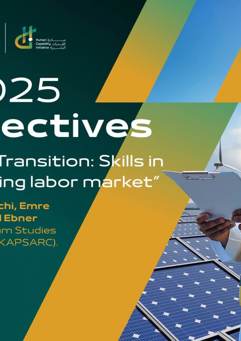
Resilience in Transition: Skills in a Decarbonizing Labor Market


10 April 2025
To better measure job resilience, we use the Transition Risk Index (TRI), which combines sectoral carbon exposure, occupational adaptability, and labor market frictions. Between 2019 and 2022, Saudi Arabia’s TRI improved significantly. With the right policies—sh... Read Full Report Here
Read More31

A New Route To A Sustainable Aviation Industry


09 April 2025
Analysis of emerging trends in aviation identifies critical areas requiring further research to enable aviation climate action.
Read More0

Exploring The Impact Of Climate Change Policies On Energy Affordability




09 April 2025
Stricter climate policies are exacerbating energy poverty in developed countries. How will transitioning impact the world’s poorest nations?
Read More0

The Fast Uberization Trend in China’s Road Freight Transport Sector

08 April 2025
Road freight transport is a leading oil consumer and one of the most hard-to-abate sectors (IEA 2017; McKinnon 2018). In most developing countries, the sector is characterized by excessive market fragmentation, where the majority of the market supply is from small carriers, such as o...
Read More27

Ground-Source Air Conditioning: A Potential Solution for Saudi Arabia’s Building Sector


08 April 2025
Energy consumption for cooling in Saudi Arabia is notably high due to the country’s extreme climatic conditions, with air conditioning accounting for a significant portion of electricity demand. Addressing this challenge requires innovative solutions that align with Saudi Arabia’s Vi...
Read More31
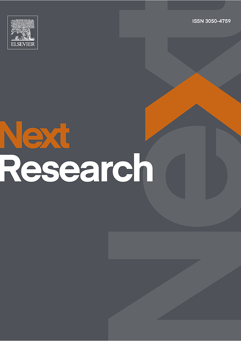
Costs of Switching Fuels and Manufacturing Processes for Construction Materials Companies in Saudi Arabia


05 April 2025
Read More
19

Critical Minerals In The Energy Transition
03 April 2025
Robust global supply chains for minerals play a pivotal role in the envisioned electrification future.
Read More0

Pandemic Measures Reveal Routes For Cutting Commercial Airline Emissions



03 April 2025
Analyzing air travel disruption during the COVID-19 pandemic offers insights for improving aviation energy efficiency.
Read More0

Evaluating Hypothetical Carbon Pricing for Saudi Arabia Using a Macroeconometric Modeling Framework




02 April 2025
Read More
23
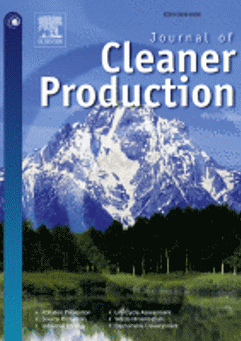
Life Cycle Analysis of Decarbonization Strategies For Asphalt Mixtures in Saudi Arabia



31 March 2025
Read More
0

The Rapid Expansion of Battery Energy Storage: Why the Saudi Market Is Booming


27 March 2025
Saudi Arabia has embraced utility-scale battery storage to the extent that it now ranks third globally in announced battery storage energy project capacities at 22 gigawatt-hours (GWh), behind only China and the United States (U.S.), and it aims to achieve 48 GWh of battery energy st...
Read More33

How OPEC And Its Allies Have Helped Stabilize The Global Oil Market



26 March 2025
A new numerical model highlights the importance of OPEC’s actions and its cooperation with allied nations in reducing oil price volatility.
Read More0

Saudi Arabia In Prime Position For Green Hydrogen




26 March 2025
Access to low-cost solar energy on a large scale means that the Kingdom could become a highly competitive global supplier of green hydrogen.
Read More0

Does integrating oil refining with petrochemicals provide long-term benefits for Saudi Arabia?

25 March 2025
To integrate or not to integrate petrochemicals – that is the question posed by this paper for Saudi Arabian oil refineries. The viability of combining domestic oil refining and petrochemical activities is investigated using an energy system model for Saudi Arabia. Two scenarios are ...
Read More33

Decarbonizing Saudi Arabia energy and industrial sectors: Assessment of carbon capture cost

25 March 2025
The global drive for net-zero emissions has highlighted carbon capture, utilization, and storage (CCUS) as a critical tool to reduce CO2 emissions from energy and industrial sectors. Achieving climate goals necessitates a comprehensive understanding of regional CO2 emission profiles ...
Read More27

Saudi Arabia needs to decarbonize road freight transportation to fulfill its emission reduction commitments. In this study, we utilize the GCAM-KSA modeling framework to explore potential mitigation pathways for the Kingdom’s road freight sector. We evaluate the emission implications...
Read More30

Opportunities From Saudi Mineral Resources – A Domestic Supply Perspective




21 March 2025
Saudi Arabia’s mineral sector, long recognized as the third pillar of its economy alongside oil and petrochemicals, is becoming increasingly vital due to the global demand for minerals essential for the clean energy transition. Understanding the domestic and international implication...
Read More31

Navigating Global Sustainability Reporting and Taxonomies: Insights for Saudi Arabia




21 March 2025
The paper explores the evolution of ESG reporting frameworks and taxonomies, focusing on their implications for Saudi Arabia. It discusses the challenges posed by global ESG practices, such as mandatory Scope 3 emissions reporting, materiality standards, and carbon management technol...
Read More0

Energy Stewardship in a Transitioning World: Extending the Hydrocarbon Value Chain into Lithium Extraction in Saudi Arabia



21 March 2025
Energy security has long been central to the strategic and policy frameworks of governments worldwide, owing to the indispensable role of stable and sufficient energy supplies in underpinning economic growth, social welfare, and political stability. Historically, the pursuit of energ...
Read More31
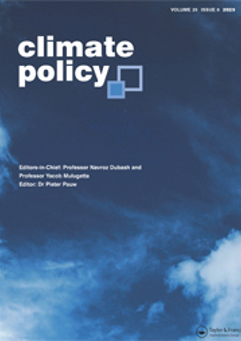
Lessons from Gulf Cooperation Council Countries’ Participation in the Clean Development Mechanism - journal article


20 March 2025
This study fills a gap in the literature on international carbon markets by identifying lessons learned from Clean Development Mechanism (CDM...
The article starts with a brief review of global and regional CDM literature, focused on distilling lessons learned from past experiences.
4
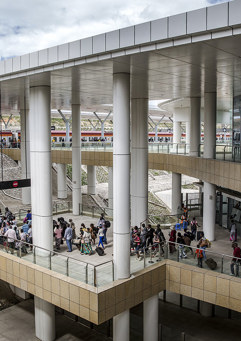
China Emerges As A Key Economic Partner In GCC Energy Sectors


19 March 2025
Chinese investments in the Gulf have facilitated the country’s growing influence in the region, as it continues to expand its soft power under the Belt and Road Initiative.
Read More0
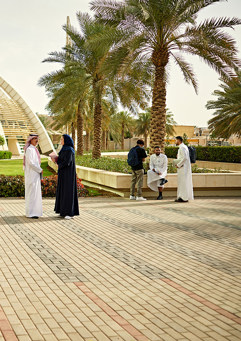
A Blueprint For A Green Economy Transition


19 March 2025
Exploring pathways to economic resilience, experts analyze the economies of 31 oil-exporting nations to identify the structural factors needed to diversify.
Read More0

Progress and Gaps in the Adoption of Clean Cooking Fuels in Africa – Policy Options for Ghana and Kenya


13 March 2025
Access to clean cooking fuels is vital for public health, environmental sustainability, and socio-economic development in sub-Saharan Africa. This study examines the key barriers to adopting clean cooking fuels in Ghana and Kenya, asking. Despite progress in urban areas toward liquef...
Read More30
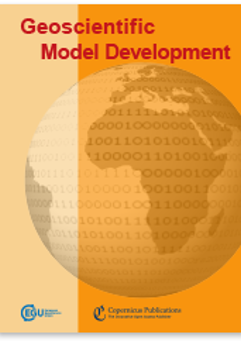
Long-term Hydro-economic Analysis Tool for Evaluating Global Groundwater Cost and Supply

13 March 2025
Read More
0

How To Ensure Energy Security On The Way To Net Zero



12 March 2025
To encourage more green investments, policy-makers need to prepare for the inevitability of global crises disrupting renewables supply.
Read More0

Tapping Into Saudi Arabia’s Energy Demand



12 March 2025
Saudi Arabia's energy price reforms, made possible by historically low energy prices, have delivered substantial economic and environmental benefits.
Read More0

Exploring Contractual Arrangements for Electricity Trading in the Middle East



09 March 2025
The Gulf region is undergoing an energy transition, and the electricity sector is crucial to its success. Since 2001, the region’s interconnections have allowed electricity trade among the Gulf Cooperation Council (GCC) countries. Its continued interconnection expansion within the GC...
Read More30

Carbon Markets and Saudi Arabia: A Review of Options and Analysis of Carbon Crediting Potential



09 March 2025
In response to the growing interest in carbon markets in Saudi Arabia, KAPSARC implemented a study to better characterize and understand the potential for carbon crediting in the Kingdom. The focus was specifically on providing estimates of the potential for supply and demand of carbo...
Read More29

Pandemic, Ukraine, OPEC+ and Strategic Stockpiles: Taming the Oil Market in Turbulent Times



09 March 2025
Read More
23
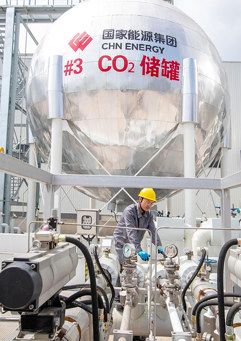
The Carbon Footprint Of CCS-EOR Projects


05 March 2025
New economic formulas reveal how government support for capturing and storing CO2 in oilfields can reduce emissions while balancing energy production needs.
Read More0

A Green Route To Bridge The Gender Pay Gap

05 March 2025
Jobs arising from Saudi Arabia’s green transition could reduce the gender salary discrepancy.
Read More0
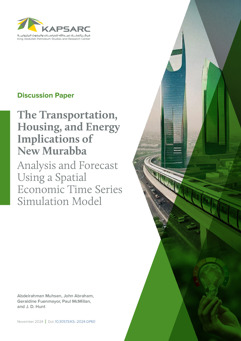
The Transportation, Housing, and Energy Implications of New Murabba Analysis and Forecast Using a Spatial Economic Time Series Simulation Model

04 March 2025
New Murrabba is a proposed megaproject involving residential, office, and retail development in Riyadh, Saudi Arabia. This project would encapsulate a portion of the expected rapid growth in the city into a unique and visionary development.
Read More33
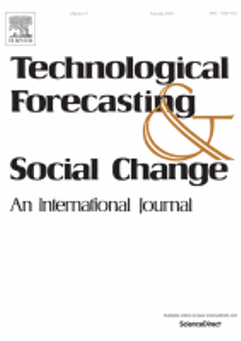
Mapping Saudi Arabia's Low Emissions Transition Path by 2060: An Input-output Analysis

28 February 2025
Read More
0

Decoding Implicit Energy Subsidies


26 February 2025
A new set of equations could help estimate the indirect economic effects of subsidizing energy prices in Saudi Arabia and beyond.
Read More0

Tailored Behavioral Interventions Can Be Best For Energy Efficiency



26 February 2025
Targeting behaviors could encourage the Saudia Arabian public to save electricity and reduce domestic energy demands.
Read More0
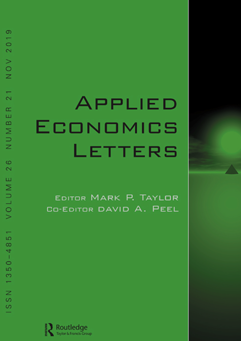
Analysing the Role of Energy in Economic Growth and Convergence: A Cross-country Study from 1980–2019


25 February 2025
Read More
24
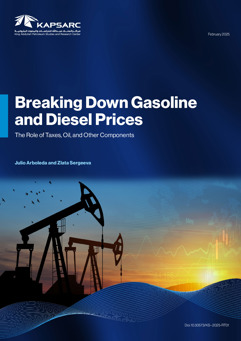
Breaking Down Gasoline and Diesel Prices: The Role of Taxes, Oil, and Other Components


24 February 2025
There is a common belief that fluctuations in gasoline and diesel retail prices are primarily driven by changes in oil prices (Bumpass, Ginn, and Tuttle 2015). While this is partly true, the fact is that gasoline and diesel prices are influenced by multiple components, which can redu...
Read More29
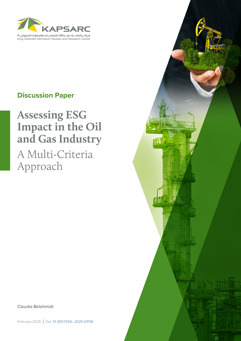
Assessing ESG Impact in the Oil and Gas Industry: A Multi-Criteria Approach

24 February 2025
The paper titled “Assessing ESG Impact in the Oil & Gas Industry: A Multi-Criteria Approach” discusses the critical role of environmental, social, and governance (ESG) principles in the oil and gas sector, highlighting both challenges and opportunities. The document e...
Read More28
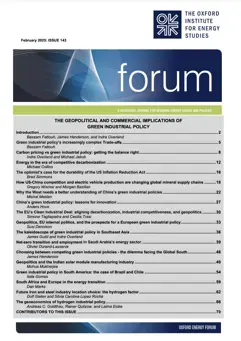
Net-Zero Transition and Employment in Saudi Arabia’s Energy Sector

24 February 2025
Saudi Arabia has engaged in a deep transformation of its hydrocarbon-based domestic energy system. The shift is in line with the country’s Nationally Determined Contribution commitment to reduce emissions by 278 million tons below a baseline by 2030, and ... Read full report here
Read More33

Rethinking Emissions Through The Circular Carbon Economy





19 February 2025
Saudi Arabia is emerging as a case study for how various carbon management options could fit together to achieve net-zero emissions.
Read More0

Highlighting Bumps In The Road To Energy Transition






19 February 2025
Investment in sustainable technologies required to meet Paris Agreement goals still falls short, especially in developing countries. How do we close the gaps?
Read More0

Unravelling The Socioeconomic Effects Of Fuel Poverty


12 February 2025
Economists untangle the impact of rising household bills to guide government policy.
Read More0

The US Inflation Reduction Act And What It Means For The Rest Of The World


12 February 2025
Wider adoption of energy-efficient technologies could reduce carbon emissions. These should stimulate innovation and reduce cost, creating a more sustainable energy market.
Read More0
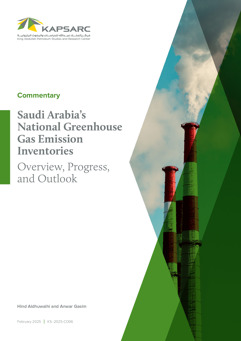
Saudi Arabia’s National Greenhouse Gas Emission Inventories: Overview, Progress, and Outlook


11 February 2025
This paper summarizes Saudi Arabia’s history with national greenhouse gas emission reporting, giving an overview and discussing the trends in emissions.
Read More30
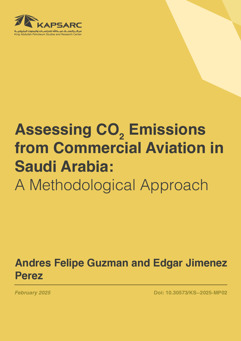
Assessing CO2 Emissions from Commercial Aviation in Saudi Arabia: A Methodological Approach

11 February 2025
Aviation is projected to grow in the coming decades, leading to increased fuel consumption and greenhouse gas emissions, despite advancements in efficiency. As other sectors decarbonize, aviation’s impact on climate change may become more significant. Assessing aircraft perform...
Read More32
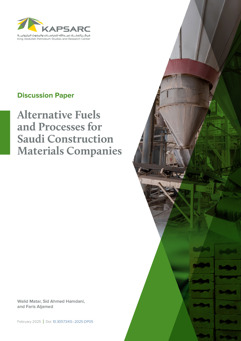
Alternative Fuels and Processes for Saudi Construction Materials Companies



03 March 2025
Producing construction materials requires a great amount of energy, and in Saudi Arabia, this production currently entails the use of substantial amounts of liquid fuels. Liquid fuels are mostly sold at below-market prices domestically, and thus result in large opportunity costs for...
Read More31
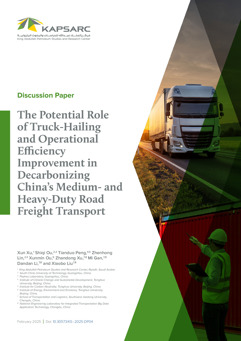
The Potential Role of Truck-Hailing and Operational Efficiency Improvement in Decarbonizing China’s Medium- and Heavy-Duty Road Freight Transport






11 February 2025
Truck-hailing is a relatively new Uber-like business model that connects road freight carriers with shippers via mobile apps. First appeared around 2013, it has achieved fast market uptake in China, involving almost 8 million commercial trucks annually by the end of 2023. With China ...
Read More30
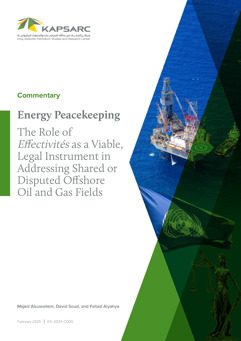
Energy Peacekeeping: The Role of Effectivités as a Viable, Legal Instrument in Addressing Shared or Disputed Offshore Oil and Gas Fields



11 February 2025
As more offshore oil and gas discoveries, some of them dramatic, take place in areas where maritime boundaries can be disputed, effectivités have become key considerations in resolving some of the resulting conflicts. A basic understanding of the theory of effectivités is therefore v...
Read More30
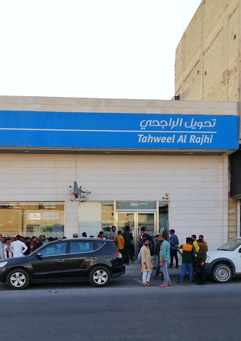
How Can Policy Change The Financial Choices Of Saudi Arabia’s Workers?


09 February 2025
A study of Saudi Arabia’s foreign remittance outflows offers clues on how to keep more earnings in the Kingdom.
Read More0
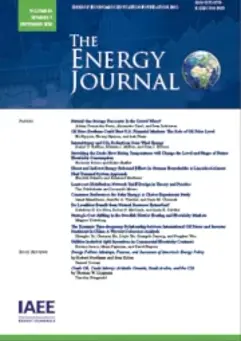
Energy Transition in Oil-Dependent Economies: Public Discount Rates for Investment Project Evaluation


05 February 2025
For an oil-exporting economy, valuing oil-related cash flows from a public perspective requires using a discount rate equal to the risk-free public rate plus a risk premium. Economic dependence on oil affects the public discount rate for oil-related cash flows in two opposite ways: o...
Read More21

Fuel Price Reform Among Options To Cut Transport-Linked Emissions



05 February 2025
Efforts to mitigate carbon emissions linked to transport will require detailed analysis and new policy ideas.
Read More0

The Role of the Petrochemical Sector's Exports in the Diversification of the Saudi Economy. A Scenario Analysis of the Foreign and Domestic Price Shocks



04 February 2025
Read More
80

Macroeconomic and Sectoral Effects of Natural Gas Price: Policy Insights from a Macroeconometric Model






04 February 2025
Read More
77

Concrete: The Non-Critical, Critical Material

02 February 2025
The paper is a commentary on key questions facing the relationship between concrete, the energy transition and the global move to net-zero.
Read More105
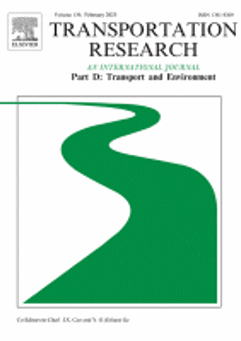
Why Chinese Car Owners May Not Repurchase Electric Vehicles?



01 February 2025
Read More
22
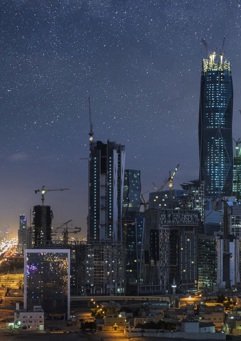
Ratifying the Kigali Amendment Challenges and Opportunities for Saudi Arabia



23 January 2025
The Kigali Amendment to the Montreal Protocol is an international agreement which continues the effort to protect the ozone layer but adds the phase out of hydrofluorocarbons (HFCs), potent greenhouse gases that contribute significantly to global warming. The international efforts on...
Read More72

Evaluating Airport Location Sustainability Performance: A Methodology from Experts and Contextual Perspective


23 January 2025
This paper presents a methodology to evaluate the sustainable performance of an airport location. The approach integrates multiple criteria, including transport requirements, environmental impacts, accessibility, economic potential, social impacts, and regulatory acceptability. The m...
Read More100

Waste-to-Hydrogen Techno-Economic Assessment and Emission Reduction Potential in Saudi Arabia


23 January 2025
Waste-to-hydrogen (WTH) presents an enormous untapped potential to achieve climate change objectives for many countries by transitioning from high CO2 emission waste disposal techniques to producing clean fuel such as green hydrogen. Additionally, WTH can be incorporated with carbon ...
Read More56

Windfalls and Pitfalls: How Foreign Labor Strengthens Economic Resilience in GCC During Energy Transition



20 January 2025
Governments in oil-dependent countries, particularly those in the Gulf, have launched broad and ambitious national plans to diversify their economies. While diversification reduces vulnerability to oil shocks, the expansion of renewables and the deregulation of domestic energy prices...
Read More59
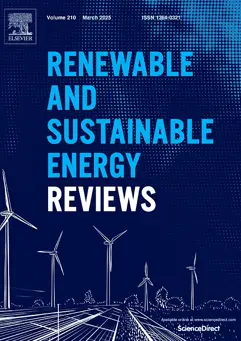
The Potential Role of Seasonal Pumped Hydropower Storage in Decarbonizing the Power Sector in Saudi Arabia

16 January 2025
Read More
48
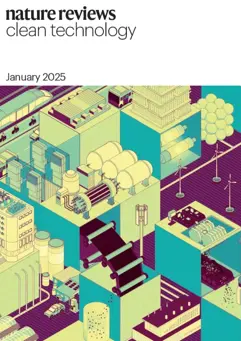
Designing Long-lasting Inventions for Residential Energy Efficiency

15 January 2025
Read More
52
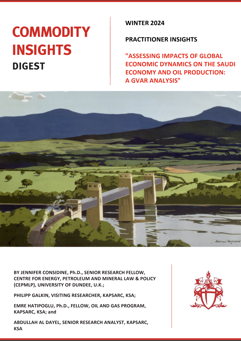
Assessing Impacts of Global Economic Dynamics on the Saudi Economy and Oil Production: A GVAR Analysis




14 January 2025
Read More
46
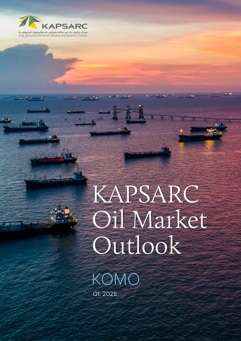
KAPSARC Oil Market Outlook (KOMO)
13 January 2025
This is the KAPSARC Oil Market Outlook quarterly report that focuses on oil markets supply, demand and balances.
Read More50
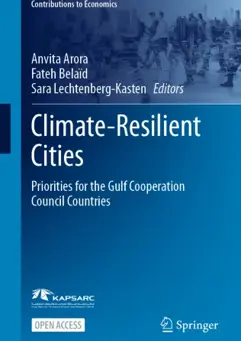
A Review Approach to Understanding the Current Status of Port Resilience: Lessons Learned for GCC Ports


12 January 2025
Read More
50

A Maritime Sector in Transition – The Role of Saudi Arabia




12 January 2025
The maritime sector currently accounts for approximately 2.3% of global CO₂ emissions, with forecasts suggesting that this figure could rise to 10%-13% by 2050 (IMO 2023). This significant increase emphasizes the pressing need for decarbonization to mitigate environmental risks. This...
Read More58

Does the Income Elasticity of Energy Demand Vary with the Stages of Economic Development?



12 January 2025
This paper revisits the empirical evidence on the income elasticity of energy demand by investigating whether it varies with the level of economic development. Our analysis, based on a sample of 111 countries spanning three decades, reveals that the elasticity is not constant a...
Read More101

Roadmap for Carbon Capture, Utilization, and Storage (CCUS) in Saudi Arabia Insights From Stakeholder Engagement and Expert Survey




12 January 2025
This paper presents the findings of a survey conducted by KAPSARC, focusing on the role of Carbon Capture and Storage (CCS) technology within the framework of Circular Carbon Economy (CCE). The survey, part of the CCE Roadmaps project, aimed to gather insights from diverse stakeholde...
Read More57

Decarbonizing Land-Based Passenger Transport in Saudi Arabia




12 January 2025
The Saudi government has outlined its decarbonization strategy through various statements and reports, identifying key initiatives, preferred technologies, and investment targets to drive this transformation. In this study, we employ Integrated Assessment Modeling (IAM) to evaluate t...
Read More60
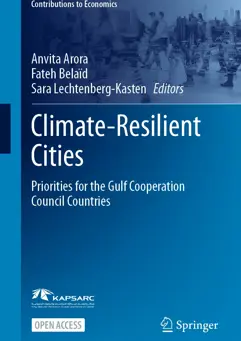
Climate-Resilient Cities: Priorities for the Gulf Cooperation Council Countries


12 January 2025
This edited volume discusses the concept of resilient cities within the Gulf Cooperation Council (GCC) region. Written by an international panel of scholars and experts, the book presents theoretical approaches, identifies risk factors, and suggests policie... Read Full Book Here
Read More59

Sectoral Clustering and Climate-Tech Startup Financing Through Venture Capital and Private Equity

12 January 2025
In this study, I investigate climate-tech startup financing of venture capital (VC) and private equity (PE) investments across different sectors around the world for the 2022-2024 period. Cross-sectional analysis suggests that start-ups in sectors with higher dynamism (proxied by dea...
Read More55

Technoeconomic Assessment and Carbon Dioxide Removal Potential for the Global Pulp and Paper Industry


12 January 2025
The pulp and paper industry is the fourth largest industrial energy user globally and presents significant carbon removal potential as a large portion of emissions from this industry are biogenic. The decarbonization potential of this industry has been discussed in literature at coun...
Read More54
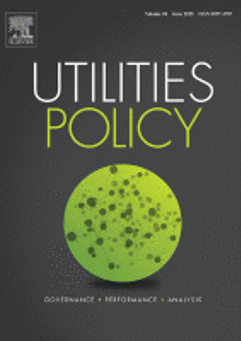
Modeling the Impact of Price and Usage Efficiency on Domestic Water Demand in Saudi Arabia

09 January 2025
Read More
22

In May 2023, the King Abdullah Petroleum Studies and Research Center (KAPSARC) organized a workshop titled “The race to decarbonize long-haul transport and the lessons learned for KSA” with the support of the University of Antwerp. The workshop aimed to discuss current developments i...
Read More49
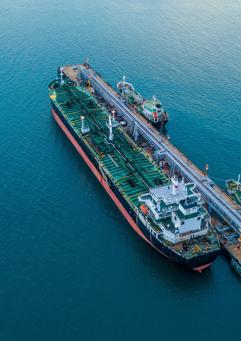
Anticipating Trend Shifts in Oil Prices Using the Crude Oil Storage Index


07 January 2025
We analyze oil price dynamics in the long-, medium and short-term by using the world crude storage index (COSI), a global index reflecting spread options values from crude oil at major ports around the world for all of the major competing crudes.
Read More56

No Magic Bullet The Challenge of Security Interventions in Phantom Oil Flows


07 January 2025
The discovery and exploitation of oil and gas significantly transformed the global economy and social welfare landscape. Oil, in particular, became the lifeblood of industrialization, fueling the growth of numerous sectors, including transportation, manufacturing, and electricity gen...
Read More52
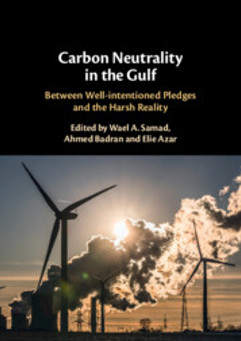
The GCC and the Circular Carbon Economy: Progress and Potential



01 January 2025
The circular carbon economy (CCE) concept aims to provide a holistic, technology-agnostic, and cost-effective framework for assessing climate change mitigation options and pathways at a global, national, or organisational level with the ultimate goal...
Read More0

The Determinants of Successful Energy Subsidy Reforms: A Logistic Regression Analysis




29 December 2024
Many factors influence whether an energy subsidy reform is successful. We define success as a reform that does not lead to social unrest and is not reversed. To better understand these factors, we apply logistic regression analysis to an original dataset capturing 392 distinct episod...
Read More46

Harnessing Heat from the Refinery and Petrochemical Sectors for Future Commercial-Scale DAC Systems in Saudi Arabia



29 December 2024
As the global community commits to achieving net-zero carbon emissions, innovative strategies such as Direct Air Capture (DAC) are gaining prominence. DAC, a key carbon dioxide removal (CDR) technology, is energy intensive and requires large amounts of heat and electricity. To ensure...
Read More51

Navigating the Trade and Climate Change Nexus

19 December 2024
As global efforts to tackle climate change intensify, the intersection of trade and climate policy is increasingly critical. Trade can drive access to clean energy technologies and promote sustainable practices but also risks amplifying emissions through carbon-intensive industries a...
Read More56
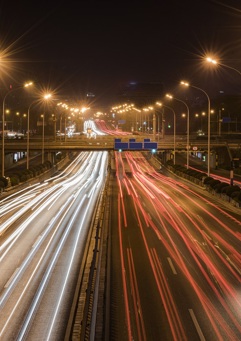
Impact of Urban Traffic on Fuel Consumption Leveraging IoT Data: Case Study of Riyadh City




19 December 2024
This study explores the rising trend of traffic congestion in Riyadh and its impact on fuel consumption for passenger cars amid the challenges of rapid urbanization and increasing vehicle use. By utilizing real-time floating car data (FCD) collected by vehicles equipped with Global P...
Read More59

The Economics of Offshore Wind-Based Hydrogen Production in Saudi Arabia



18 December 2024
Offshore hydrogen production from offshore wind energy is gaining global attention as an appealing solution for scaling up green hydrogen production. The technoeconomic feasibility of integrating offshore wind into hydrogen production has been explored in various regions, but no comp...
Read More53

Analyzing the Interplay of Urbanization, Economic Development, and Seaborne Trade A Case of Saudi Arabia



18 December 2024
Urbanization is widely recognized as a critical factor influencing economic growth and global trade, yet there is ongoing debate about whether it drives these outcomes or is a consequence of them. To address this, it is essential to determine whether urbanization spurs economic devel...
Read More57

Environmental Performance of Passenger Cars in the KSA: Comparison of Different Technologies via a Life Cycle Assessment Approach


18 December 2024
In terms of deployment feasibility, PHEVs and HEVs have a distinct advantage over FCEVs, as they can leverage the existing electricity grid and fueling infrastructure, making them a more practical and readily available solution for reducing near-term emissions in the KSA transportat...
Read More56
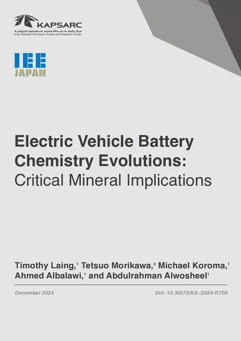
Electric Vehicle Battery Chemistry Evolutions: Critical Mineral Implications





18 December 2024
The energy and transport transition will require a wider volume and range of materials than the systems that it is replacing. This has become an increasingly important topic across both the government and private sectors over the last decade. A crucial component of this materiality i...
Read More50

Carbon Dioxide Utilization in the Desalination Sector in Saudi Arabia: An Opportunity for Achieving Negative Emissions






18 December 2024
The global pursuit of sustainable solutions to mitigate climate change has intensified, necessitating innovative approaches that transform traditional carbon-intensive industries into potential carbon sinks. Carbon capture, utilization and storage (CCUS) is a key tool for achieving n...
Read More53

Carbon Removal Ratings and their Potential in Saudi Arabia




18 December 2024
As the global focus on mitigating climate change intensifies, carbon dioxide removal (CDR) technologies have emerged as critical tools in reducing atmospheric carbon levels. In Saudi Arabia, recent studies have identified direct air capture (DAC) and energy from waste with carbon cap...
Read More52
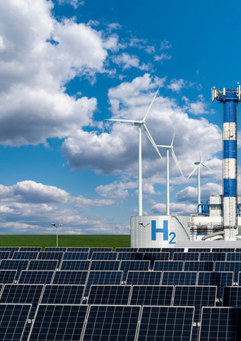
Uncertainty in Modeling the Demand for Materials from the Energy Sector at a Country-level: A Case Study of Saudi Arabia

12 December 2024
The material intensity of the energy transition has been a topic of growing importance in the literature and policymaking over the last decade. Much of this debate has been founded on a range of future demand forecasts of the material requirements of the energy transition, primarily ...
Read More59

How to Create a Hydrogen Market? Lessons from Electricity and Gas Markets on Pricing and Investment Approaches


12 December 2024
To promote low-carbon hydrogen, which is produced in a way that results in no or near-zero greenhouse gas (GHG) emissions, for decarbonization, substantial investments are required across the hydrogen value chain. Despite the potential of hydrogen in several applications, various unc...
Read More57

Life Cycle Assessment (LCA) Framework for Examining the Environmental Impacts of Asphalt Pavement Mixtures in Saudi Arabia


12 December 2024
Energy consumption and transport distance (i.e., the distance between raw... Several environmental impact categories, including stratospheric ozone depletion, photochemical ozone formation, acidification, eutrophication, climate change, and particulate matter formation, were identified.
Read More66

Towards a CCS National Strategy and Roadmap for Saudi Arabia













09 December 2024
Saudi Arabia, the world’s largest oil exporter, has long been associated with the production and consumption of hydroacrbons. However, with the increasing concerns over climate change and the urgent need to reduce greenhouse gas emissions, the country has started to explore and inves...
Read More66

A Maritime Sector in Transition – Learning from Other Sectoral Energy Transitions




09 December 2024
The maritime sector currently contributes approximately 2.3% of global CO₂ emissions, with projections suggesting that this share could rise to 10%-13% by 2050, highlighting an urgent need for decarbonization. In response to the potentially catastrophic impacts of climate change, the...
Read More54

Life Cycle Assessment of Road Freight Decarbonization in Saudi Arabia



09 December 2024
The Kingdom of Saudi Arabia (KSA) is committed to transitioning towards a diversified, low-carbon economy, necessitating the decarbonization of its road freight sector, which is a significant source of domestic energy consumption and greenhouse gas (GHG) emissions. This study address...
Read More57

BRICS+ and the Future of Commodity Markets


05 December 2024
The dissolution of the Soviet Union in late 1991 marked a pivotal shift in the global economic landscape, ushering in an era characterized by increased market openness and economic integration. The years following have been symbolized by the formation of the European Union in 1993 an...
Read More58

Could Geothermal Boost Saudi Arabia’s Energy Transition?



05 December 2024
Investment in geothermal energy sources could boost renewable power generation, create jobs, and enhance technological advancement across Saudi Arabia.
Read More0

Empowering Change: Overcoming Obstacles in Implementing CCS for Power Generation – Key Takeaways for Global Players

03 December 2024
Ac...2emissions, which come primarily from the combustion of fossil fuels, reached a record high level of 37.4 gigatonnes (Gt) in 2022 (IEA 2024). At 38% electricity generation continues to be the largest contributor to these emissions, despite the impressive growth in renewable energy.
Read More49

Locating EV Charging Stations to Enable Intercity Travel in Saudi Arabia


03 December 2024
The development of electric vehicle (EV) infrastructure presents a promising pathway to reduce transportation emissions, particularly when integrated with low-carbon energy systems. Given Saudi Arabia’s commitment to sustainable travel initiatives, a clear understanding of the ...
Read More65

Behavioral Changes in Household Electricity Consumption from 2015 to 2022


02 December 2024
Analyzing the distribution of electricity consumption provides a clearer picture of distinct household segments and their behaviors. This approach allows us to identify clusters of low, moderate, and high consumers, offering insight into usage patterns. Such granularity can guide tar...
Read More51

Key Drivers of Decarbonizing Hard- to-Abate Energy- System Sectors by Midcentury



02 December 2024
o limit global warming to 1.5°C or 2°C, achieving a net-zero or near-zero greenhouse gas emission energy system by midcentury is essential. This ambitious target requires the decarbonization of hard-to-abate sectors, particularly transportation and heavy industry. This study employs ...
Read More57

Introduction of Electric Vehicles in Saudi Arabia: Impacts on Oil Consumption, CO2 Emissions, and Electricity Demand


02 December 2024
emissions associated with the road transport sector by 2050. On the basis of the projected number of ICE vehicles, we design three scenarios for developing electric vehicles (EVs) (high-, moderate-, and low-growth scenarios) to determine the impact...2emissions, and electricity demand.
Read More55

Balancing International Trade and Climate Justice: Legal Perspectives on the EU’s Deforestation Regulation


02 December 2024
Forests play a crucial role as natural carbon sinks and protectors of biodiversity. According to the Food and Agriculture Organization (FAO) of the United Nations, the world lost approximately 4.2 million square kilometers of forest between 1990 and 2020 – an area nearly twice the si...
Read More49

Phantom Oil Movements: An Investigation into Opaque Ship- to-Ship Operations and Their Role in Sanction Evasion



02 December 2024
The transportation and distribution of large volumes of oil, gas, and refined products over long distances are enabled primarily by marine shipping. Transborder pipelines serve as an additional method for transporting oil and gas. However, these pipelines are typically more expensive...
Read More57
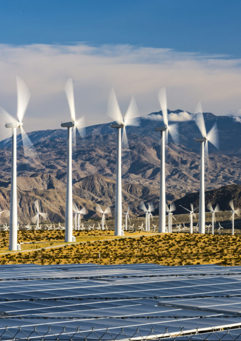
Inside The Grid Of The Future





02 December 2024
A new integrated assessment modelling study highlights the importance of strategic planning and investment in transforming Saudi Arabia’s electricity grid.
Read More0

What's Driving Plug-in Vehicle Abandonment?




02 December 2024
Understanding why American electric vehicle owners are switching back to gasoline could help other countries develop more effective policies for EV adoption.
Read More0

Income Growth Fuels Electricity Demand In Middle-Income Countries


02 December 2024
Income stability, price, and electricity demand could help shape long-term energy policies for growing economies.
Read More0

Creating A Walkable City For Riyadh’s New Metro




02 December 2024
Shaded and safe walkways as well as cycling routes are needed to encourage people to shift from driving to using Riyadh’s new metro.
Read More0

Sensors In The Sky: Satellite Technology Is A Promising Tool To Measure Emissions



02 December 2024
A recent study explores how new satellite technology can measure methane emissions and help explain the highly divergent estimates for Saudi Arabia.
Read More0

Toward A Carbon-Neutral Kingdom
02 December 2024
Analyzing the long-term impact of Saudi Arabia’s climate-related initiatives.
Read More0

To Fund Or Not To Fund?



02 December 2024
Researchers investigate how cost-benefit analysis can help decision-making in petrochemical investments.
Read More0
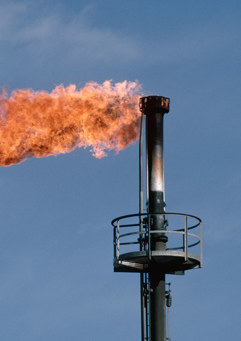
A Blueprint For A Sustainable Oil Industry: Saudi Arabia’s Example
29 November 2024
Through innovative technologies and strict regulations, Saudi Arabia is setting a new standard for the global oil industry, providing a blueprint for sustainable production with a much smaller methane footprint.
Read More0

Decoding Saudi Arabia’s Commercial Energy Demands


29 November 2024
Regional differences in energy demand across the Kingdom offer insights for tailored energy policies and infrastructure planning.
Read More0

The Unexpected Impact Of Mineral Price Shocks




29 November 2024
Unanticipated changes in the price of critical minerals can have complex flow-on effects on the price of oil and lead to inflation.
Read More0

Advancing The Transition Through Energy Efficiency

29 November 2024
A novel analysis shows that enhancing energy efficiency could potentially reduce the Kingdom’s carbon emissions by 20%.
Read More0

Shifting Electricity Use Between Seasons Could Save Money And Energy



29 November 2024
Load shifting from peak summer months to low-demand winter also boosts export potential.
Read More0

The Startups Shaping The Energy Landscape



29 November 2024
Startup trends offer insights that could boost green tech development and use.
Read More0

Cost-effective Methods Of Decarbonizing LNG


29 November 2024
The Middle East could lead the way in decarbonizing the production of liquefied natural gas using carbon capture and storage technologies.
Read More0

Decarbonization Makes Waves In Maritime Shipping


29 November 2024
Progress toward a low-emission global maritime shipping sector requires a concerted effort.
Read More0

The Future Of Oil: The Economics Of Energy Transition


29 November 2024
With advances in energy transition, weighing the costs and benefits of investment projects is crucial.
Read More0

Understanding Electricity Demand In Saudi Arabia’s Government Sector
29 November 2024
A look at how income, electricity prices, and weather conditions can determine regional consumption patterns.
Read More0
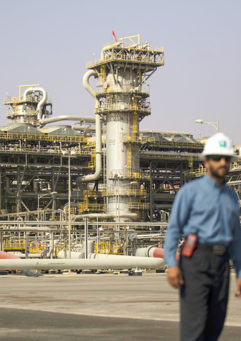
Predicting Future Gobal Oil Demand From Buildings


28 November 2024
A comprehensive modelling study offers insights into the future energy needs of the world’s built environment.
Read More0

How To Fortify Power Grids Against Extreme Weather



28 November 2024
Understanding how electricity systems respond to extreme weather events is key to developing more resilient infrastructure.
Read More0

How Well-planned Shade Reduces The Impact Of Heatwaves

28 November 2024
Building height and trees can make a significant difference to the street-level experience of heatwaves.
Read More0

Driving The Transition To Energy-Efficient Homes

28 November 2024
A new study into household energy-saving solutions provides valuable insights and implications for policymakers aiming to promote investment in energy efficiency.
Read More0

Simulating The Impact Of Groundwater Overuse
28 November 2024
Increasing dependence on underground extraction is depleting natural aquifers, transforming water into a finite resource. By modelling 900 future scenarios, researchers are revealing the global impact of this unsustainable trend.
Read More0

A Recipe For Expanding Global Access To Clean Cooking






28 November 2024
Enhanced collaboration across sectors can expand access to liquid petroleum gas, paving the way for clean cooking targets by 2030.
Read More0

Predicting Future Global Oil Demand From Buildings


28 November 2024
A comprehensive modelling study offers insights into the future energy needs of the world’s built environment.
Read More0

An Appetite For Change In Energy Use


27 November 2024
A lab-based study of individuals’ attitudes toward energy efficiency strategies for buildings provides a blueprint for real-world initiatives.
Read More0

Shaping The Future Of Energy

27 November 2024
Agile, timely, and anticipative, KAPSARC’s energy economics and sustainability research programs are finding solutions to support domestic and global energy transitions.
Read More0

Approach and Initial Findings in Modeling Future Seaborne Trade and Its Impact on Energy Demand



26 November 2024
) emissions, prompting the International Maritime Organization (IMO) to aim for net-zero shipping greenhouse gas (GHG) emissions by 2050 to mitigate climate change. Shipping is a critical link between countries for transporting goods, and its future advancements will hinge primarily ...
Read More61

Digitalized Virtual Power Plants to Unlock the Value of Distributed Energy Resources in the Day-Ahead Market

26 November 2024
Digitalized virtual power plants (DVPPs) are advanced software platforms that aggregate and optimally orchestrate a collection of distributed energy resources (DERs) to support grid balance and stability to alleviate stressed transmission and distribution lines and provide critical g...
Read More57

Resilient Digitalized Power Grids with High Penetration of Distributed, Variable Renewable Energy

25 November 2024
Conventional power grids are undergoing a transition towards digitalized power grids, where cyber, physical, and social domains are tightly coupled through smart components, advanced metering infrastructure, wireless communication /connectivity networks, and digital technologies that...
Read More46

How the Census-2022 Results Changed the Outlook for Electricity Demand


25 November 2024
This paper aims to address these discrepancies by reestimating an original empirical model of electricity demand using recently revised population data from GaStat (2024). The original model, which was developed by Mikayilov and Darandary (2024), relied on population data from GaStat...
Read More51
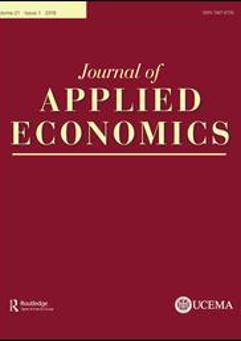
Export Destination and Firm Upgrading: Evidence from Spain

20 November 2024
Read More
48
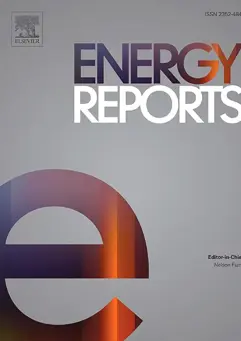
Inter-fuel Substitution in the Industrial Sector of Saudi Arabia

15 November 2024
Read More
48

The Circular Carbon Economy Index 2024 – Results



14 November 2024
The 2024 CCE Index provides a multidimensional overview of the current state of net-zero transitions worldwide, covering 125 countries from all world regions. It is based on the holistic, technology-neutral and flexible concept of the circular carbon economy (CCE), where a full CCE i...
Read More55

Pandemic, Ukraine, OPEC+ and Strategic Stockpiles: Taming the Oil Market in Turbulent Times



12 November 2024
With a simple decomposition method, we estimate the monthly shifts in global oil demand and non-OPEC+ supply since 2010. We find evidence that during the January 2017 to December 2023 period, OPEC+ attempted to stabilize the price of crude oil well below the values assessed by market...
Read More52

Why Does Sustainable Finance Not Flow into the Global South?


12 November 2024
While private sustainable finance flows have grown substantially in recent years, they are heavily concentrated in certain countries – primarily in a few advanced economies. Emerging markets and developing economies (EMDEs) face significant barriers to accessing much-needed private f...
Read More46
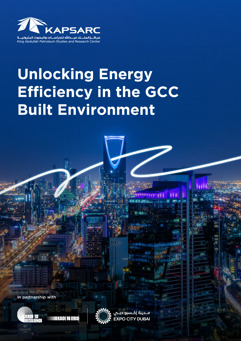
Unlocking Energy Efficiency in the GCC Built Environment

12 November 2024
The Gulf Cooperation Council (GCC) region, encompassing Bahrain, Kuwait, Oman, Qatar, Saudi Arabia, and the United Arab Emirates, is distinguished by rapid urbanization, robust economic growth, and substantial energy consumption. The built environment has expanded significantly to ac...
Read More53
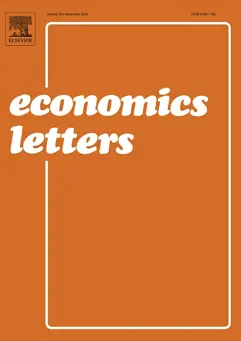
Does the Income Elasticity of Energy Demand Vary with the Stages of Economic Development?



12 November 2024
Read More
57

The Life Cycle Greenhouse Gas Emissions Assessment of Jet Fuel Production and Consumption


12 November 2024
This paper aims to estimate the life cycle greenhouse gas (GHG) emissions of jet fuel production and consumption in the Kingdom of Saudi Arabia (KSA) using the life cycle assessment (LCA) methodology. The system boundaries include well-to-tank (WTT) activities, covering crude oil ...
Read More59

Critical Minerals and the Oil Industry: The Impact of a Positive Shock to Critical Mineral and World Oil Prices




07 November 2024
The term “critical minerals” (CMs) refers to a distinct category of commodities, such as rare earths, critical earth minerals, and other non-fuel minerals or mineral materials that are of strategic importance to national economies and technical development and that have a high risk o...
Read More53
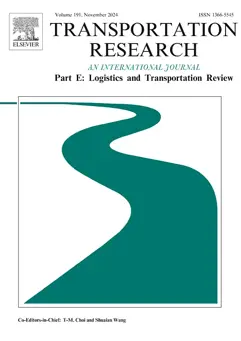
Enabling Net-zero Shipping: An Expert Review-based Agenda for Emerging Techno-economic and Policy Research



06 November 2024
Read More
47
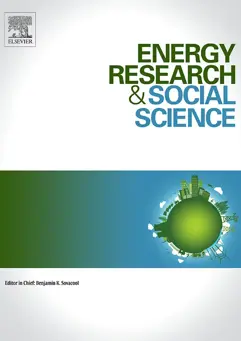
A Perspective on Emerging energy Policy and Economic Research Agenda for Enabling Aviation Climate Action


06 November 2024
Read More
45
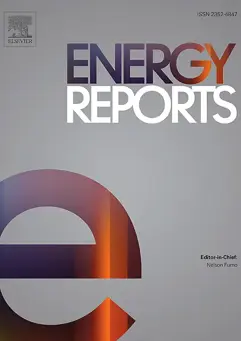
Emerging Energy Economics and Policy Research Priorities for Enabling the Electric Vehicle Sector



06 November 2024
Read More
47

Assessing the Impact of Energy Transition Initiatives on the Policy Cost of Saudi Arabia’s Net- Zero Ambition






05 November 2024
Saudi Arabia’s ambitious goal to achieve a net-zero economy by 2060 offers a unique opportunity for diversification away from fossil fuels while fostering long-term economic resilience and sustainability. Crucial to this transition are energy policies that steer the Kingdom from a fo...
Read More53
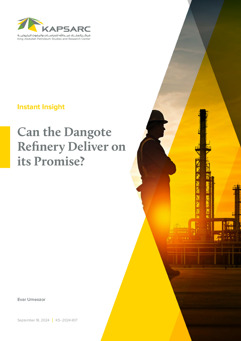
Can the Dangote Refinery Deliver on its Promise?

03 November 2024
In Nigeria, energy cost is the predominant driver of prices for all goods and services. With a population of over 200 million people, Nigeria is a member of the Organization of the Petroleum Exporting Countries (OPEC) and a major producer of crude oil in Africa.
Read More55

Lessons from an International Review of Successful and Unsuccessful Energy Subsidy Reforms



03 November 2024
Many factors contribute to the success of energy subsidy reform. To better understand these factors, we review studies that drew lessons from past attempts at reform. We synthesize the lessons and then expound on them by reviewing our newly constructed database of over 3,000 news art...
Read More58

Understanding the Causal Nexus Between Saudi’s Seaborne Trade and Economy and Quantifying the Relationship



03 November 2024
An economy’s primary objective is to foster high economic growth, ultimately enhancing the well-being of its citizens. Recent economic strategies have increasingly emphasized trade-oriented policies to achieve this goal.
Read More56

Financing the Decarbonization of Hard-to- Abate Sectors Trends, Issues, and Ways Forward

03 November 2024
Global transition investments have experienced incredible growth and progress, with the increasing level of participation from private actors in recent years. Investment flows in clean technologies have significantly increased since the COVID-19 era, reaching US$1.8 trillion in 2023,...
Read More51

Long-Term Forecasting Models of Oil Demand Emerging from the Global Petrochemical Sector


03 November 2024
This study aims to estimate the demand for petrochemical feedstocks for four main products (naphtha, ethane, liquified petroleum gas [LPG], and other petrochemical products) for each of the eight regions of the world.
Read More52

The Impact of Displacing Fuel Oil on Saudi Refineries

03 November 2024
Saudi Arabia aims to displace fuel oil in its electricity system and industry. Such a move will impact the operation of its oil refineries, and this commentary explores these potential effects.
Read More51

K-DSGE 2.0: A Dynamic Stochastic General Equilibrium Model for Saudi Arabia with Carbon Circular Economy Features




03 November 2024
This paper describes a substantially improved version of K-DSGE, the dynamic stochastic general equilibrium model of the Saudi Arabian economy, developed by KAPSARC researchers.
Read More56
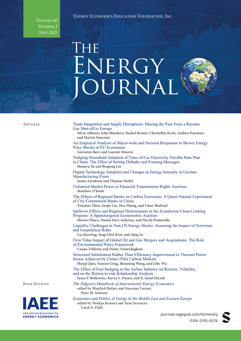
Mitigating Climate Change While Producing More Oil: Economic Analysis of Government Support for CCS-EOR


01 November 2024
Read More
20
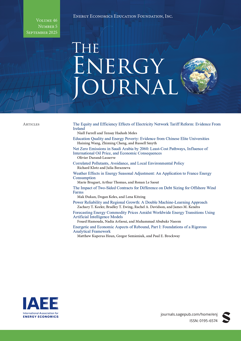
Beyond Cost: A Multifaceted Look at Financial Incentives and Residential Energy Renovation Behavior

01 November 2024
Read More
0

A Global Hydrogen Future
31 October 2024
Hydrogen is a significant part of energy conversations because of its scalability, flexibility, and decarbonization potential. Considerable efforts are underway globally to determine the most effective ways to introduce hydrogen into the energy mix. This report—A Global Hydrogen Futu...
Read More57

Future Energy Breakthroughs: Implications for the Hydrocarbon Economies of the Arabian Gulf

31 October 2024
Read More
0

Using Satellite Technology to Measure Methane Emissions in Arabian Gulf Countries





30 October 2024
Decision makers need high-quality information on the level of greenhouse gas (GHG) emissions to take effective climate actions. Of the GHGs, methane can be particularly difficult to measure. Huge discrepancies exist in methane emission estimates at the global, national, and corporate...
Read More58
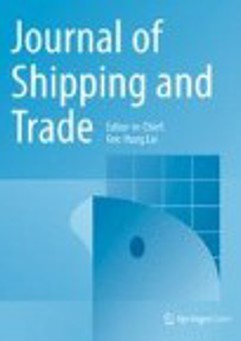
Unveiling the Causal Nexus Between Saudi’s Seaborne Trade and Economy: Evidence from an ARDL Model



21 October 2024
Read More
46

The Unfolding Potential of GCC China Collaboration on Critical Minerals




15 October 2024
As a clean energy system begins to be implemented worldwide, the demand for critical minerals is expected to increase dramatically in the coming decades. Thus, demonstrating how mineral collaboration benefits the economy is key to building long-term supply resilience and keeping the ...
Read More52

Are Automakers Overcharging Consumers for Electric Vehicle Batteries?


15 October 2024
Vehicle electrification is a major component of many sustainability goals and frameworks. Research suggests that battery costs account for a large portion of the price premium for electric vehicles (EVs) relative to internal combustion engine vehicles (ICEVs) and that price parity, w...
Read More53
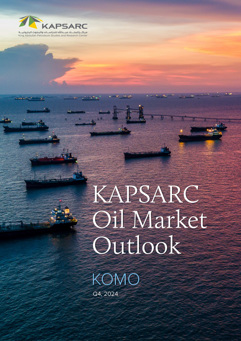
KAPSARC Oil Market Outlook
15 October 2024
This quarter’s highlights include stagnating quarter-on-quarter (QoQ) oil demand, with a trivial decline of only 8,000 barrels a day (Kb/d), following last quarter’s growth of 1.27 million barrels per day (MMb/d). While significant gains and losses were reported in individual regions...
Read More52

Emissions Effect of Financial Development in the GCC: is The Effect Asymmetric?

14 October 2024
Read More
44

Unraveling the Black Market for Oil: The Complex Web of Phantom Trade and Its Reverberating Effects on Energy Security, Trade Balances, and Social Welfare



14 October 2024
for oil embodies the ancient parable of the blind men and the elephant. Just as the blind men each touched a different part of the elephant and experienced only a fraction of its true nature, so do policymakers perceive the black market for oil through narrow lenses. However, this m...
Read More54

Azerbaijan: Energy, Carbon, and Opportunities


14 October 2024
At the end of 2023, after prolonged discussions, Azerbaijan was selected as the host country of the 2024 United Nations climate summit, COP29. Like the two preceding hosts of COP28 and COP27, the United Arab Emirates (UAE) and Egypt, Azerbaijan is also a major oil and gas producer.
Read More60

Geothermal Energy – A Rising Powerhouse? A Global Technical Review and Applications for Saudi Arabia




14 October 2024
The Earth’s core, which is as hot as the sun, contains a large amount of thermal energy insulated by impermeable rocks. This energy, totaling 15 million zetta joules, dwarfs traditional energy sources such as coal and gas. However, only a fraction of this energy has been utilize...
Read More49

Facilitating the Low-Carbon Hydrogen Market: Opportunities, Challenges, and Pathways
14 October 2024
he hydrogen industry is at a turning point, as regulatory frameworks and incentive schemes begin to take shape. However, there are still barriers for market participants to commit to production projects and infrastructure, as they face the chicken-and-the-egg dilemma. The King Abdull...
Read More52

Enabling Net-Zero Shipping An Expert Review-Based Agenda for Emerging Techno-Economic and Policy Research




14 October 2024
Net-zero shipping is emerging as a global priority, underscored by the shipping sector’s increasing projected contribution to climate change, making it critical to understand the emerging associated research priorities. We outline key techno-economic and policy research priorities fo...
Read More36

Long-Term Forecasting Models of Oil Demand Emerging from the Global Petrochemical Sector


11 October 2024
Read More
45

Crafting Effective Climate, Energy, and Environmental Policy: Time For Action

11 October 2024
Read More
50

Saudi Arabia and the Circular Carbon Economy: From Vision to Implementation


06 October 2024
This case study shows how the Circular Carbon Economy (CCE) Index can be used to analyze a country’s CCE performance and enablers in a holistic manner and in a comparative context, relative to other countries. Saudi Arabia is an extremely relevant country to examine in this context g...
Read More63

Understanding the Role of Renewable Energy in Import Demand for Petrochemicals Is the Prevailing Perception More Imagined Than Real?



06 October 2024
The prevailing perception is that the transition to renewable energy will lead to a decrease in demand for hydrocarbons and petrochemicals. The present work empirically demonstrates that this common sense may be more imaginary than real: it finds evidence that the renewable energy ...
Read More51

The State of Carbon Dioxide Removals (CDRs) - Policymaking and Governance

04 October 2024
Carbon Dioxide Removals (CDRs) involve capturing carbon dioxide from the atmosphere and storing it for decades to millennia on land, in the ocean, in geological formations or in products. Innovation in CDR has expanded substantially, exemplified by RD&...
Read More
0

Fueling India’s Mobility Transition: A Life Cycle Perspective on Passenger Road Transport Options



30 September 2024
The transportation sector is crucial for India’s economic and social development but poses significant environmental and global warming challenges. This study conducts a comprehensive Life Cycle Assessment (LCA) of passenger vehicles in India, evaluating various propulsion technologi...
Read More49

Gas Demand in the MENA Hydrocarbon- Producing Countries: Recent Trends and Drivers

30 September 2024
Middle East and North Africa ...MENA) region, with demand reaching more than 700 billion cubic meters (bcm) in 2022 and increasing by almost 50% compared with a decade ago. Gas demand in the MENA region accounts for 17% of the global gas consumption, making it a key demand center.
Read More58

Web-Based User Interfaces for Mathematical Models to Support Decisions: The Fuel Distribution Network Optimizer








30 September 2024
Mathematical models provide quantitative analyses that can inform policy decisions. We argue that two attributes can support models’ adoption by policymakers: an intuitive graphical interface and active engagement between modelers and policymakers.
Read More50

Climate and Cost Analysis of SUVs in Saudi Arabia A Life Cycle Analysis Approach



30 September 2024
This study is conducted within the framework of the Saudi Vision 2030 agenda to diversify its economy and promote sustainable technologies, specifically examining the life-cycle performance of hybrid and conventional sport utility vehicles (SUVs) in the Kingdom (KSA).
Read More55

Assessing the Potential and Feasibility of Carbon Dioxide Removal (CDR) Technologies in Saudi Arabia




13 October 2024
As the Kingdom of Saudi Arabia strives to achieve its climate goals and transition its economy away from fossil fuel dependency, understanding the viability and impact of carbon dioxide removal (CDR) options becomes paramount.
Read More54
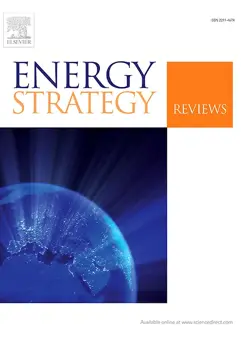
The Path to 2060: Saudi Arabia’s Long-Term Pathway for GHG Emission Reduction





24 September 2024
Read More
55

Southeast Asia and the Circular Carbon Economy: A Rapidly Developing Region


12 September 2024
53

Middle East and North Africa and the Circular Carbon Economy: Seizing the Potential for Action



12 September 2024
The Middle East and North Africa (MENA) region is an emerging center of energy demand. Economic and population growth, increasing industrialization as well as rising living standards are all expected to contribute to a continued increase in the region’s energy consumption over the co...
Read More58
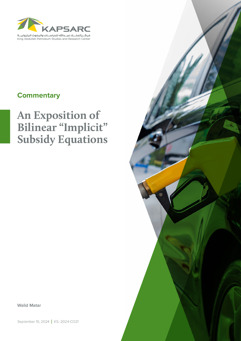
An Exposition of Bilinear “Implicit” Subsidy Equations

10 September 2024
The price-gap method is popularly applied to estimate energy subsidies, and it simply involves calculating the difference between the market and domestic prices of a good multiplied by the quantity consumed. In the case where subsidies impose foregone revenue rather than direct costs...
Read More50

Saudi Arabia’s Population Trends: Insights from the 2022 Census Revision


30 September 2024
Having people as a main focal point of all policies and activities worldwide and at an individual country level sets a responsibility for all countries/institutions to have reliable information on the size, structure, and dynamics of the population that can be used in provision of n...
Read More49

Are Households Quitting Electric Vehicle Ownership?




03 September 2024
In this paper, we investigate the proportion of U.S. plug-in electric vehicle (PEV) owners who discontinued PEV ownership by disposing of their PEV and buying a non-PEV as their next vehicle, which is termed PEV “discontinuance.”
Read More50

Emerging Policy and Economic Research Priorities for Enabling the Electric Vehicle Sector



01 September 2024
We highlight key emerging research priorities on the climate- and industrial-policy driven pathway to passenger car electrification, including both pure battery electric and plug-in hybrid electric vehicles, using a three-pronged approach. This includes examining journalistic reports...
Read More54

Emerging Research Priorities for Enabling Aviation Climate Action: Identification and Expert Evaluation


01 September 2024
Aviation climate action is emerging as a global priority, underscored by the aviation sector’s increasing projected contribution to climate change and the consequential effects of climate change on aviation operations. This makes it critical to understand the emergent associated rese...
Read More53

Green Jobs and the Saudi Gender Wage Gap: Explained and Unexplained

01 September 2024
Saudi Arabia has made great strides recently in increasing female labor force participation, reaching the Vision 2030 goal of 30% in late 2020, almost a decade early. With labor force participation achieved, the conversation now turns to labor market outcomes, and an increasing gende...
Read More53

Residential Electricity Consumption and Rebound Effects in Saudi Arabia: Insights into Bridging the Energy Efficiency Gap


30 September 2024
The rebound effect refers to the phenomenon where energy efficiency improvements lead to increased energy consumption, offsetting some of the expected energy savings. This article aims to estimate the direct rebound effect of residential electricity consumption in Saudi Arabia and ex...
Read More48
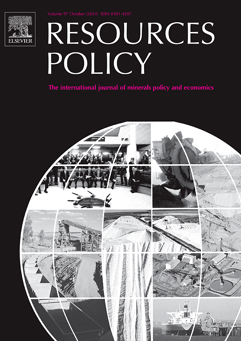
Climate Policy Stringency and Trade in Energy Transition Minerals: An Analysis of Response Patterns

01 September 2024
Read More
53
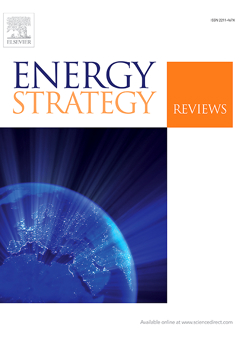
Are Automakers Overcharging Consumers for Electric Vehicle Batteries?


01 September 2024
Read More
40

The workshop participants voiced a number of diverse views about the prospects for future oil demand. They also clearly articulated the need for OPEC spare production capacity as a critical policy tool for the stabilization of world oil markets.
Read More49
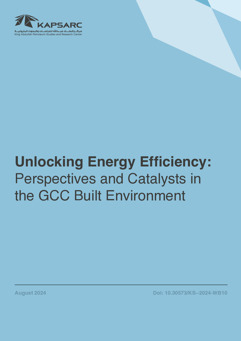
The final COP28 agreement has set an ambitious target by calling for a doubling of the average annual rate of energy efficiency improvement by 2030. To achieve this goal, the current 2% improvement in energy efficiency needs to grow steadily, reaching and maintaining a growth rate of...
Read More43

Strategic Priorities and Cost Considerations for Decarbonizing Electricity Generation Using CCS and Nuclear Energy



26 August 2024
Read More
47
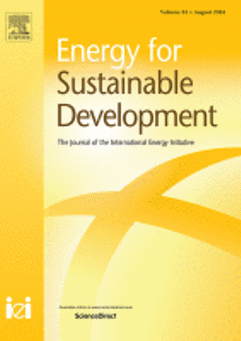
Net-zero Transport Dialogue: Emerging Developments and the Puzzles They Present

25 August 2024
Read More
45

The Dynamic Role of Subsidies in Promoting Global Electric Vehicle Sales


25 August 2024
Read More
47
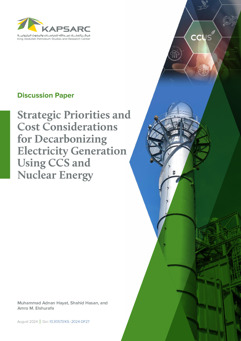
Strategic Priorities and Cost Considerations for Decarbonizing Electricity Generation Using CCS and Nuclear Energy



25 August 2024
This paper investigates the economics of deploying carbon capture and storage (CCS) on gas-fired power plants while covering its entire value chain, i.e., carbon capture, transport, and storage, and conducting a thorough sensitivity scenario analysis. Our analysis shows that adopting...
Read More49

Energy is the vehicle that has enabled humanity to flourish. Since the dawn of time, humans have sought to find more efficient ways to power and propel their lives forward. With each generation, humanity has made progress in unlocking energy density, from burning wood to using fossil...
Read More51
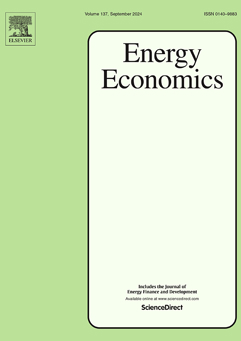
Finding Opportunity in Economic Power Dispatch: Saving Fuels without Impacting Retail Electricity Prices in Fuel-producing Countries



20 August 2024
Read More
43
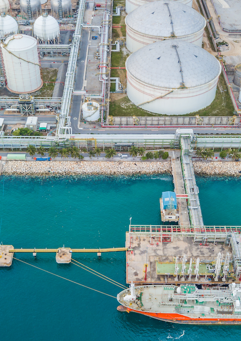
Assessing CCUS Potential for LNG in the GCC


14 August 2024
As the world experiences the energy transition, traditional oil and gas producers are feeling a greater need to decarbonize their hydrocarbon production.
Read More47

Bridging the Gaps for an Orderly Energy Transition: The Role of Sustainable Finance in Saudi Arabia
11 August 2024
As governments and organisations across the Middle East work towards achieving their net-zero agendas, sustainable finance plays a crucial role by raising capital for projects essential to achieving these targets. Robust capital markets, supportive regulatory frameworks, and tra...
Read More53

Measuring Green Jobs in Saudi Arabia: Saudis in Green Occupations

11 August 2024
This paper offers the first estimate of employment in Saudi Arabia that can be linked to the energy transition. Using a task-based taxonomy devised by the United States Bureau of Labor Statistics applied to detailed administrative data on Saudi workers, it is estimated that in 2022 a...
Read More60
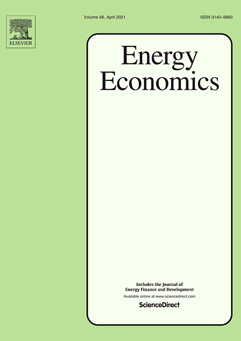
Carbon Capture and Renewable Energy Policies: Could Policy Harmonization be a Puzzle Piece to Solve the Electricity Crisis?

01 August 2024
Read More
41
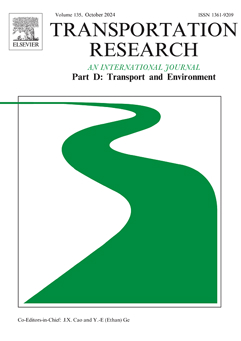
Are American Electric Vehicle Owners Quitting?


01 August 2024
Read More
46

The Future of Residential Electricity Demand in Saudi Arabia and the Role of Energy Efficiency in the 2060 Net Zero Pledge

25 July 2024
Abstract Saudi Arabia has set the ambitious goal to reach net zero by 2060, and reducing domestic electricity consumption and thus curbing greenhouse gas (GHG) emissions is critical. Since the residential sector is the biggest consumer of electricity in the Kingdom, understanding how...
Read More49
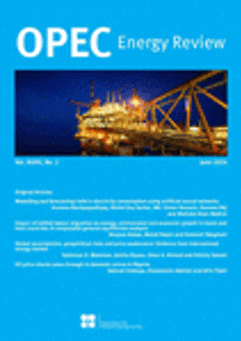
Modelling and Projecting Regional Electricity Demand for Saudi Arabia


17 July 2024
Read More
37

Trends in Global Solar Photovoltaic Installation in 2023

16 July 2024
In 2023, global solar photovoltaic (PV) capacity increased by a record 407 gigawatts (GW) and brought the total global cumulative installed PV capacity to 1,589 GW at the end of 2023.
Read More55

Impacts of Ride-Hailing on Energy and the Environment: A Systematic Review


15 July 2024
Ride-hailing has expanded substantially around the globe over the last decade and is likely to be an integral part of future transportation systems. Through a systematic review of the literature concerning the energy and environmental impacts of ride-hailing, we have identified a dic...
Read More52
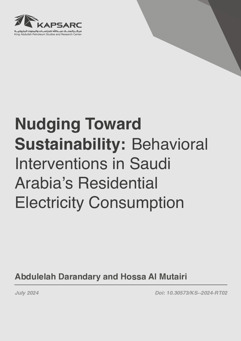
Nudging Toward Sustainability: Behavioral Interventions in Saudi Arabia’s Residential Electricity Consumption


10 July 2024
sidential energy consumption is responsible for significant global energy consumption and associated emissions. As a result, households are a prime focus for behavior-modifying interventions. Household energy conservation can be achieved through changes in consumption patterns and in...
Read More52

The Role and Deployment Timing of Direct Air Capture in the Kingdom of Saudi Arabia’s Net-Zero Transition






08 July 2024
The Kingdom of Saudi Arabia (KSA) has pledged to achieve net-zero greenhouse gas (GHG) emissions by 2060. Direct air carbon capture and storage (DACCS) is critical for the country to meet its net-zero target given its reliance on fossil fuels and limited options for ...2) removal (CDR).
Read More60

Aviation Challenges in the Long Term: Technological Developments, Energy Transition, and Climate Change
11 July 2024
The aviation sector, known for its significant emission levels, is facing a...2 emissions, presents challenges across the short-, medium-, and long-term horizons. As a result, there is a growing focus on addressing the environmental impact of aviation and adopting sustainable practices.
Read More45

An Emerging Framework for the Probabilistic Cost- Benefit Analysis of the Reliability, Resiliency, and Adaptability of Electric Power Systems


07 July 2024
Probabilistic cost-benefit analyses of the reliability, resiliency, and adaptability of electric power systems can inform policymakers on how to efficiently reduce the frequency, magnitude, duration, and costs of power outages; how to cost-effectively improve the integration of varia...
Read More59

Framework for Leveraging the Digitalization of Power Systems within the Context of Energy Transition


07 July 2024
The digitalization of power systems can contribute to a smoother energy transition by, for example, maximizing the use of renewable energy (RE; i.e., minimizing curtailment), peak shaving, and relaxing grid congestion. Collectively, these and other benefits play an important role in ...
Read More51
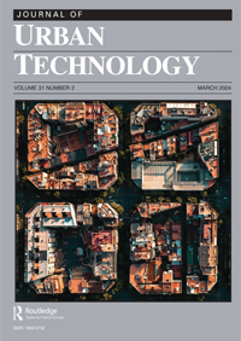
Can Smart Cities Be Sustainable: An Emerging Field of Research

07 July 2024
Research on smart sustainable cities (SSCs) has fueled a rapid expansion of scholarly work in recent years. However, the key trends and future research avenues in this field are still ambiguous. This article examines the content of SSC research by conducting network and bibliometric ...
Read More47
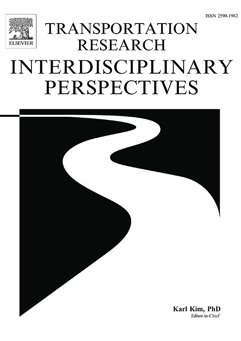
Energy Efficiency Trends in Saudi Arabian Commercial Aviation before and after COVID-19



01 July 2024
Read More
48

Driving Reductions in Emissions: Unlocking the Potential of Fuel Economy Targets in Saudi Arabia


21 August 2024
The adoption of more stringent fuel economy standards represents a pivotal pathway toward achieving net zero emissions in the transportation sector. By steadily increasing the fuel efficiency of vehicles, this approach drives a gradual but consistent decline in emissions. When couple...
Read More55

Carbon Capture, Utilization, and Storage (CCUS) Solutions to Decarbonize LNG: Why, Where and How Much?


01 July 2024
In 2019, a new product – carbon-neutral LNG – was born. By 2021, the market for this product had grown rapidly. However, in 2022, the number of announcements about the volumes delivered to customers significantly decreased. To a large extent, this decrease was linked to credibility i...
Read More51

KEMGEv2: A General Equilibrium Model for Least-Cost Net Zero Emission Pathways in Saudi Arabia

01 July 2024
This paper describes a novel, dynamic, forward-looking applied general equilibrium model of Saudi Arabia that represents interactions between the energy sectors and the rest of the economy. This model serves to produce long-term scenarios that describe possible energy transition traj...
Read More57

Reaching Net-Zero GHG Emissions in Saudi Arabia by 2060: Transformation of the Industrial Sector





30 June 2024
The industrial sector plays a crucial role in the economy of the Kingdom of Saudi Arabia (KSA). Its energy consumption primarily relies on natural gas and oil due to the abundance of these resources and their relatively low administered prices. To reduce oil dependence and create a m...
Read More57

he global energy landscape is undergoing a profound transformation driven by the urgent need to mitigate climate change and transition toward a sustainable, low-carbon future. The development and deployment of carbon capture and storage (CCS) and hydrogen technologies are gaining tra...
Read More49

Accelerating Climate Finance for Saudi Arabia’s Net Zero Ambitions: Green Financing Frameworks






27 June 2024
As part of the global climate agenda, the Kingdom of Saudi Arabia (KSA) is committed to achieving net zero greenhouse gas (GHG) emissions by 2060 through the Circular Carbon Economy (CEE) approach. To achieve this goal, the Kingdom aims to involve private investors more and advance i...
Read More59
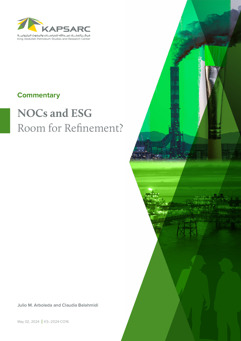
NOCs and ESG: Room for Refinement?


24 June 2024
The oil and gas industry has faced investment challenges since 2014. Oil and gas suppliers are still searching for a solution to attract investments from financial institutions and other cautious investors who are hesitant to inject more capital. Factors such as price volatility, unc...
Read More50

Decarbonizing Saudi Arabia’s Residential Sector: Designing Behavioral Interventions for Efficient and Sustainable Energy Consumption



24 June 2024
There is a consensus in the literature regarding the significant role of behavioral change in reducing the level of residential energy consumption. However, there is an ongoing debate concerning the most effective mechanisms and instruments with which to promote energy-efficient acti...
Read More53

Projecting Saudi Arabia’s CO2 Dynamic Baselines to 2060: A Multivariate Approach




12 June 2024
Using an econometric model, we generate scenario projections of CO2 emissions under different sets of assumptions on the underlying drivers. These drivers include GDP, the energy price, economic structure, and the underlying emissions trend. Our baseline scenario projects that Saudi ...
Read More43
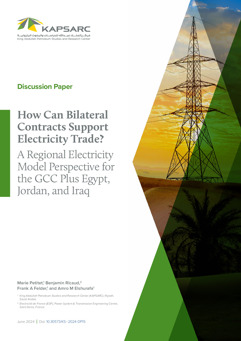
How Can Bilateral Contracts Support Electricity Trade? A Regional Electricity Model Perspective for the GCC Plus Egypt, Jordan, and Iraq




11 June 2024
Cross-border electricity trading in the Middle East and North Africa (MENA) can provide cost and environmental benefits. However, for historical reasons, electricity trading has not reached a mature stage in this region. Based on a bespoke economic dispatch model for the 2030 horizon...
Read More49

Impacts of Regional Electricity Demand in Saudi Arabia A Study of the Government Sector


05 June 2024
This research presents a comprehensive analysis of electricity demand factors in Saudi Arabia, focusing on the government sector across different regions.
Read More54

Energy Transition in Oil-Dependent Economies: Public Discount Rates for Investment Project Evaluation


05 June 2024
The selection of welfare-enhancing projects necessitates the determination of the present value of cash flows from a public policy perspective. For an oil-exporting economy, the domestic energy transition often implies displacing oil from domestic consumption. Economic dependence on ...
Read More51
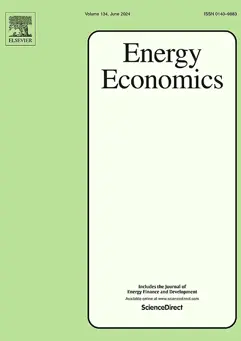
Closing the Efficiency Gap: Insights into curbing the direct rebound effect of residential electricity consumption in Saudi Arabia


04 June 2024
Read More
49
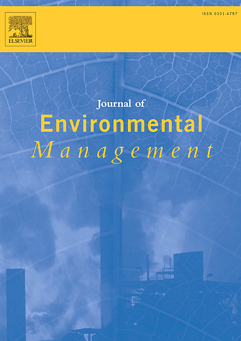
The Role of Renewable Energy and Total Factor Productivity in Reducing Carbon Emissions: A Case of Top-ranked Nations in the Renewable Energy Country Attractiveness Index

04 June 2024
Read More
38
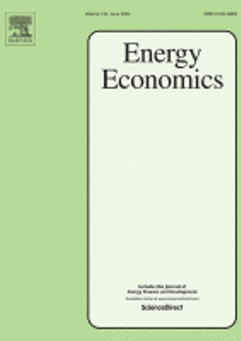
Estimating the Direct Eebound Effect for Residential Electricity Use in Seventeen European Countries: Short and Long-run Perspectives

03 June 2024
Read More
0
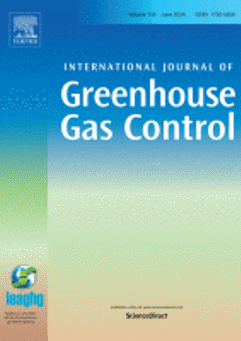
Which Bioenergy with Carbon Capture and Storage (BECCS) Pathways Can Provide Net-negative Emissions?



01 June 2024
Read More
45
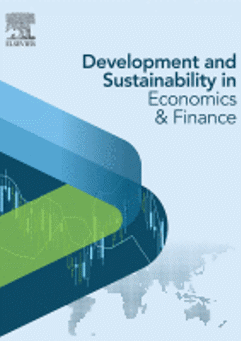
Beyond Efficiency Gains: Addressing the Rebound Effect in Saudi Arabian Residential Cooling



01 June 2024
Read More
46

Resilience of Saudi Arabia’s Economy to Oil Shocks: Effects of Economic Reforms




30 May 2024
We assess the extent to which the implementation of Vision 2030 policies enhances the Saudi economy’s resilience to oil shocks. Using a dynamic stochastic general equilibrium model that captures the country’s economic diversification policies, we build a resilience index based on imp...
Read More51

Managing the Oil Market Under Misinformation: A Reasonable Quest?



28 May 2024
This paper examines the type and quality of information that OPEC needs to stabilize the oil market. We extend our previous structural model, in which OPEC makes potential mistakes in judging the size of market shocks, to now include the possibility that OPEC misestimates how the mar...
Read More50

The worldwide endeavor to achieve a low-carbon, sustainable economic future via energy transition technologies emphasizes the significant need for minerals and materials.
Read More46

How the U.S. Inflation Reduction Act Supports Energy Efficiency and Low-Carbon Buildings


27 May 2024
The U.S. Inflation Reduction Act (IRA) recognizes that buildings account for a significant share of U.S. energy consumption and greenhouse gas emissions. To address this issue, the IRA includes a range of policies and programs to make energy efficiency and conservation measures more ...
Read More50

Toward Just Transitions in the MENA Region: Insights from the 2022 Circular Carbon Economy Index



23 May 2024
In recent years, it has become increasingly evident that any major effort to reduce emissions will require a whole-of-society approach that brings along people equally within and across countries. As a sign of this notion entering the “mainstream” of global climate governance, a just...
Read More50

The New Oil Market Multiverse: Physical Commodity Swaps as Instruments for Circumventing Sanctions and Their Implications for the Global Economy


23 May 2024
From the global pandemic to the aftershocks of the COVID-19 pandemic and the war in Ukraine, the past few years have witnessed a reordering of global trade flows, most dramatically in the energy sector. Less obviously, these shifts have also precipitated an emerging trend toward alte...
Read More51

European Gas Supply Diversification: What Is the Role of Middle Eastern and African Liquefied Natural Gas?


23 May 2024
This paper investigates the role of the Middle East and Africa (MEA) in supplying liquefied natural gas (LNG) to Europe in the context of sustained Russian gas pipeline disruptions.
Read More54

Forecasting Saudi Arabia’s Non-Oil GDP Using a Bayesian Mixed Frequency VAR


23 May 2024
Bayesian vector autoregressions have been used by central banks to prepare short-term projections of quarterly GDP and other macroeconomic variables. The Bayesian approach offers the advantage that a researcher can use a priori knowledge to specify a prior distribution of the paramet...
Read More53
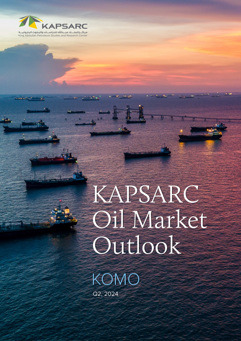
KAPSARC Oil Market Outlook
14 May 2024
This quarter’s highlights include an oil demand quarter-on-quarter (QoQ) growth of 940 Kb/d following last quarter’s declines. While the Organization for Economic Cooperation and Development (OECD) countries witnessed a QoQ decline of roughly 700 thousand barrels per day (Kb/d)...
Read More50

Smart Energy-Saving Technologies and Their Potential Application in Buildings Lessons for Saudi Arabia



12 May 2024
The increasing demand for energy in our modern world has led to a critical need to conserve energy resources. The International Renewable Energy Agency (IRENA) predicts that under the 1.5°C scenario, electricity will be the primary energy carrier in the future, with a threefold incre...
Read More56

Energy-from-Waste (Ef W) with Carbon Capture and Storage (CCS) in Saudi Arabia

12 May 2024
Carbon dioxide removal (CDR) technologies, such as direct air capture (DAC) and bioenergy with carbon capture and storage (BECCS), are essential for Saudi Arabia to achieve net zero by 2060. It is estimated that approximately 250–371 Mt/y of CDR will be needed by 2060 (Kamboj et al. ...
Read More56

The Contribution of Energy to Economic Growth and Convergence


12 May 2024
Using a sample of 94 countries, we analyze the contribution of energy to cross-country economic growth and convergence since 1980. By extending the traditional frontier approach to include energy as an additional factor of production, we decompose economic growth into components attr...
Read More52

Projecting Global Oil Demand for the Buildings Sector


06 May 2024
one of the largest consumers of energy resources, the building sector plays a key role in the evolution of the global energy landscape. Buildings account for approximately one-third of the world’s final energy consumption. This methodology paper aims to provide a projection of oil de...
Read More44

Decoding the Behavioral Patterns in Saudi Arabia from GASTAT’s Five-Year Household Energy Statistics Survey


05 May 2024
This commentary presents the findings of the annual Energy Statistics Survey by the General Authority for Statistics (GASTAT), an ongoing initiative since 2017 that is now in its fifth iteration, which covers 2022. The survey encompasses hundreds of responses from 45,420 households a...
Read More53
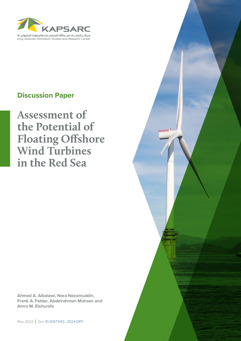
Assessment of the Potential of Floating Offshore Wind Turbines in the Red Sea





05 May 2024
Floating offshore wind turbines (FOWTs) have recently gained traction and are being installed in several regions of Europe and Asia. These turbines use the same technology as typical offshore wind turbines but are not directly anchored to the seabed. Instead, they are tethered with m...
Read More53

In 2022, the U.S. passed the “Inflation Reduction Act (IRA)” – legislation that appropriated ~$370 billion as subsidies for measures dedicated to improving energy security and accelerating the clean energy transition, making it the single largest investment in climate and energy in A...
Read More49

Global Crude Oil Refinery Configurations

02 May 2024
Crude oil refineries produce finished petroleum products through a series of processing steps known as refinery unit operations. The capacities and varieties of process units, along with their operational characteristics, differentiate one refinery from another.
Read More46

Energy Policy Pathways to Inform Climate Policy in Saudi Arabia



01 May 2024
Read More
46
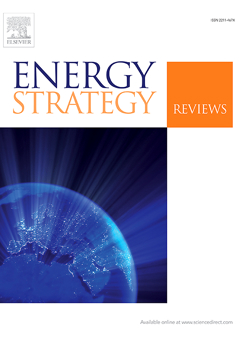
Macroeconomic, Energy, and Emission Effects of Solar PV Deployment at Utility and Distributed Scales in Saudi Arabia



01 May 2024
Read More
57

Geothermal – Saudi Arabia’s Next Energy Vector?



30 April 2024
For decades, Saudi Arabia’s power sector has heavily relied on hydrocarbons for electricity generation. Their abundant supply, affordability, and differential performance have made them a top choice. A significant portion of this electricity provides power for air conditioning system...
Read More54

Satellite-Assisted Methane Emissions Intensity from Saudi Oil and Gas Production in 2023




28 April 2024
In its latest release of the Global Methane Tracker, the International Energy Agency (IEA) imputes methane intensity for each oil and gas producer for 2023.
Read More44
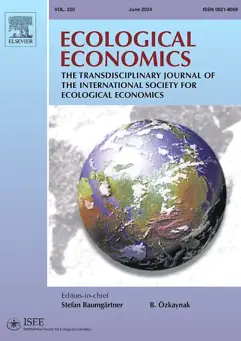
Ecological-behavioral Economics: Impact of Information on Energy-renovation Decision Through Third-party Investing

28 April 2024
Read More
46
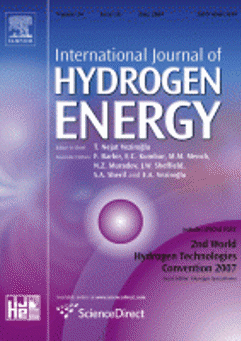
Modeling Green Hydrogen Production Using power-to-x: Saudi and German Contexts




25 April 2024
Read More
47

Global Peak Water Limit of Future Groundwater Withdrawals

22 April 2024
Over the past 50 years, humans have extracted the Earth’s groundwater stocks at a steep rate, largely to fuel the irrigated green revolution of global agro-economic development. Given society’s growing reliance on groundwater, we explore `peak water limits’ to inves...
Read More47
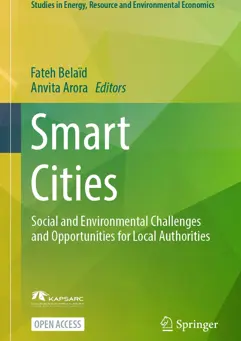
Smart Cities: Social and Environmental Challenges and Opportunities for Local Authorities


21 April 2024
This edited volume discusses the socioeconomic, environmental, and policy implications of smart cities. Written by international experts in energy economics and policy, the chapters present wide range of high quality theoretical and empirical studies at th... This is an open access book
Read More56
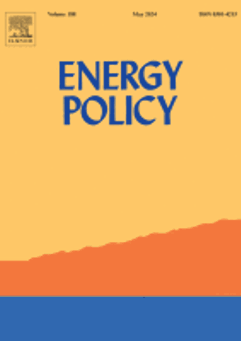
Modeling the Determinants of Electrical Vehicles Adoption: A Saudi Perspective

18 April 2024
Read More
46
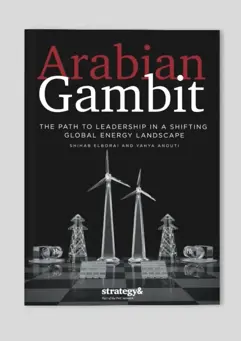
Revitalizing Relationships for the Clean Energy Souk




18 April 2024
The GCC countries have been trading for millennia, and energy transition offers new opportunities to revitalize existing trade relationships and form new partnerships driving growth through innovation. Read More Here
Read More52
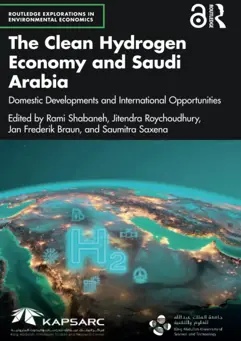
The Clean Hydrogen Economy and Saudi Arabia


18 April 2024
This book provides a first-of-its-kind analysis of the emerging global hydrogen economy from the vantage point of one of the world’s biggest energy providers: Saudi Arabia. In 2021, and within the context of the Circular Carbon Economy framework, Saudi Arabia anno... Read Full Book Here
Read More54

Impacts of Ride-hailing on Energy and the Environment: A Systematic Review


09 April 2024
Read More
44
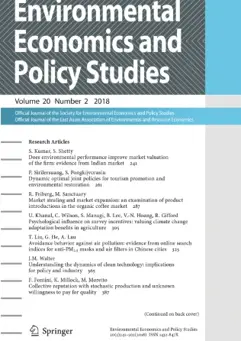
Energy Price Reform to Mitigate Transportation Carbon Emissions in Oil-Rich Economies


02 April 2024
Read More
46

The Circular Carbon Economy Index 2023: Results



31 March 2024
The Circular Carbon Economy (CCE) Index provides a comparative overview of where countries stand on the road to net-zero and how well equipped they are to get there. The CCE Index compiles quantitative data points from 38 robust sources into a composite indicator covering countries r...
Read More58

Assessing the Impact of Water Price and Water-Use Efficiency on Domestic Water Demand in Saudi Arabia

21 April 2024
The main objective of this paper is twofold. First, we attempt to identify the main determinants of domestic water demand in Saudi Arabia. In this respect, we estimate two sets of water demand models for Saudi Arabia from 1994 to 2021. In the first model, we estimate water demand as ...
Read More53

Identifying Leaders in Electricity Innovation Networks Using Twitter (X): A Resource for Policymaking


28 March 2024
The objective of this study is to map the innovation network in the electricity sector and to identify its pivotal actors to inform policymaking, particularly in Saudi Arabia. This study, which is part of a larger series, aims to identify emerging technologies, antic...
into innovation.
45
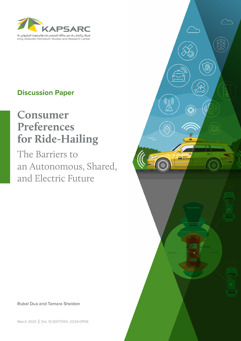
Consumer Preferences for Ride-Hailing: The Barriers to an Autonomous, Shared, and Electric Future


30 June 2024
Research has shown that when combined in a mobility-on-demand (MOD) framework, automation, carpooling, and electrification have the potential for theoretically large emission reductions. However, there is insufficient research regarding the consumer preferences for and behavioral res...
Read More52

The Role of Congestion Pricing in Boosting Public Transport Efficiency: An Overview of Its Impact on Congestion Reduction and Emission Control

25 March 2024
The road transportation sector in Saudi Arabia, like that in many countries worldwide, has played a significant role in contributing to greenhouse gas emissions, accounting for a substantial 21% of total CO2 emissions in 2019 .
Read More46

The Cost of Green Hydrogen Production in Saudi Arabia and Germany: A Model-Based Approach




25 March 2024
With over seventy countries setting net-zero commitments by or around mid-century, low-carbon hydro...2) is expected to play a pivotal role in the decarbonization of the global economy, especially sectors less dependent on electricity, which are often termed as hard-to-abate industries.
Read More47

The circular carbon economy (CCE) builds on the principles of the circular economy and applies them to managing carbon emissions: to reduce the carbon that must be managed in the first place, to reuse carbon as an input to create feedstocks and fuels, to recycle carbon through the na...
Read More53

As shipping has the advantage of being the most cost-effective mode of transportation, it will continue to grow with increasing international trade flows. Therefore, this advantage must be leveraged to achieve the long-term goals of the maritime industry.
Read More54
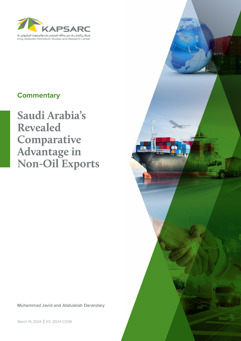
Saudi Arabia’s Revealed Comparative Advantage in Non-Oil Exports


25 March 2024
The revealed comparative advantage (RCA) is based on Ricardian trade theory, which postulates that trade flows between countries are determined by their relative productivity differences. The RCA index provides a general indication and a first approximation of a country’s competitive...
Read More59

Achieving Net-Zero GHG Emissions of Saudi Arabia by 2060: The Transformation of the Building Sector







25 March 2024
In this paper, an economy-wide, net-zero pathway that enables Saudi Arabia to achieve net-zero greenhouse gas emissions by 2060 is investigated, with a specific focus on the critical role played by the building sector. An exploration is undertaken of the significance of energy effici...
Read More48

The Asymmetric Effects of Oil Prices on the Nonoil Trade Balance: The Case of Saudi Arabia


21 March 2024
Oil prices play a pivotal role in the economies of oil-exporting countries, especially those in the Organization of Petroleum Exporting Countries (OPEC).
Read More58
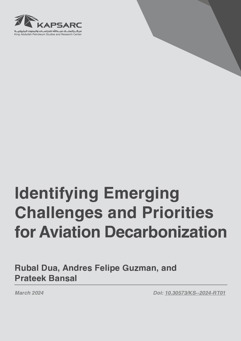
Identifying Emerging Challenges and Priorities for Aviation Decarbonization



18 March 2024
Decarbonization of the aviation sector has emerged as a global concern because the sector contributes 2%-3% to total global greenhouse gas emissions. Thus, it is critical for us to understand the associated emerging challenges. We determine key research priorities for achieving effec...
Read More47

Mapping the Net-Zero Pathways for Sustainable Transport Systems in Saudi Arabia: The Role of Life Cycle Assessment


18 March 2024
Net-zero pathways have become a key climate goal that can help promote a carbon-neutral future by balancing anthropogenic greenhouse gas (GHG) emissions with emissions removed from the atmosphere. These pathways provide strategic frameworks and roadmaps for countries to reduce GHG em...
Read More52
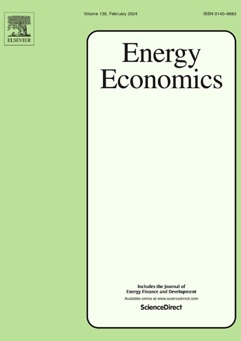
Long-term Issues with the Energy-Only Market Design in the Context of Deep Decarbonization

17 March 2024
Read More
51

Finding Opportunity in Economic Dispatch: Saving Fuels Without Impacting Retail Electricity Prices



17 March 2024
For important domestic public policy reasons, many oil- and natural-gas-producing countries allocate fuels to their electricity sector at administratively set prices that are below fuel opportunity costs. This article shows that dispatching power units based on fuel opportunity costs...
Read More51

Paris Agreement Article 6 and Geological CO2 Storage: The State of Affairs After COP 28


17 March 2024
This KAPSARC commentary focuses on the role of CCS within the market mechanisms defined in Article 6 of the Paris Agreement. It discusses how related technologies fit under Article 6 and examines the current progress in implementing this article. The analysis draws insights from the ...
Read More55

Extended KGEMM’s Emission Block With Carbon Pricing




12 March 2024
This methodological work develops a representation of carbon pricing through the KAPSARC Global Energy Macroeconometric Model (KGEMM). This representation makes two principal contributions in terms of model capabilities: establishing a feedback link from the emissions block to the en...
Read More53

Charting the Evolution of Electricity Sector Startups: A Methodological Note

10 March 2024
This commentary provides an update on ongoing research on innovation in the electricity sector. This project aims to identify emerging technologies early, anticipate changes, and discern the key drivers and their connections in the innovation landscape. This research can serve as a t...
Read More53

Fueling the Transition in the Maritime Sector: What Are the Current Status and Path Ahead?



10 March 2024
The continued demand for global seaborne trade is estimated to have accounted for 85.9% of world trade in 2023, with demand reaching 12 billion tons. As with the growth in demand, the continued growth in CO₂ emissions from global shipping, which currently contributes an estimated 2.1...
Read More52
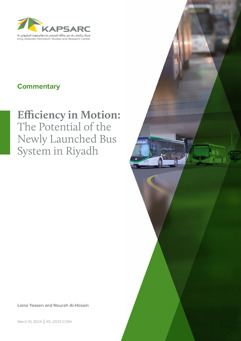
Efficiency in Motion: The Potential of the Newly Launched Bus System in Riyadh


10 March 2024
Public transportation is an essential component of a functional, well-planned transportation system. It provides a cost-effective, convenient mode of commuting within a city, especially in densely populated cities such as Riyadh.
Read More51

The Life Cycle Assessment of Jet Fuel Production and Consumption – A Methodology for Saudi Arabia’s Aviation Sector


10 March 2024
Lif... net-zero targets. The International Civil Aviation Organization has also developed a methodology to evaluate life cycle greenhouse gas emissions for aviation fuels that aligns with the Carbon Offsetting and Reduction Scheme for International Aviation sustainability criteria.
Read More52
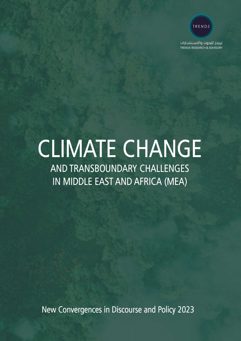
Climate Change and Transboundary Challenges in Middle East and Africa (MEA)


04 March 2024
The world’s largest climate summit, the Conference of the Parties of the UN Framework Convention on Climate Change (COP28), held in Dubai, United Arab Emirates (UAE), between 30 November and 12 December 2023, is a landmark moment in our planet’s future.... Read Book Chapter
Read More48

Inverse Product Differentiation Logit model: Holy Grail or Not?


01 March 2024
Read More
50
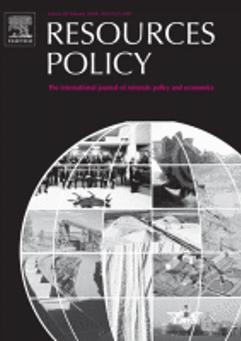
Navigating Energy Diplomacy in Times of Recovery and Conflict: A Study of Cross-border Energy Trade Dynamics



29 February 2024
Read More
48

Towards Energy-Efficient and Sustainable Cities
25 February 2024
the world continues to grow and urbanize, the significance of cities will also increase. Urban development is lengthy and costly, justifying the need for effective urban planning. Urban planning is a complex process with many often competing objectives, including sustainability and e...
Read More51

Saudi-China Collaboration in the Context of a Circular Carbon Economy: Priorities and Opportunities in the Globalization of Hydrogen Markets
25 February 2024
Developing clean hydrogen industries and markets are strategically crucial for Saudi Arabia and China to achieve their net-zero climate goals. Saudi Arabia has made significant progress in hydrogen development from extraction to commercialization. Different options for galvanizing cl...
Read More50

The Role of Circular Economy for Plastic Waste Management

17 February 2024
In March 2022, in Resolution 5/14, the United Nations Environment Assembly requested that the UN Environment Programme set up an Intergovernmental Negotiating Committee to develop an international legally binding instrument on plastic pollution, which included the marine environment....
Read More55
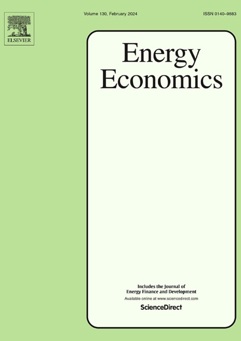
Impacts of Electricity Price Reform on Saudi Regional Fuel Consumption and CO2 Emissions



14 February 2024
Read More
52
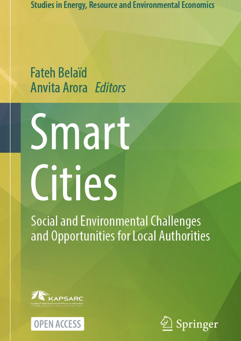
Smart Transportation Systems in Smart Cities: Practices, Challenges, and Opportunities for Saudi Cities


08 February 2024
Smart transportation is an approach that incorporates modern technologies into transportation systems to improve the efficiency of urban mobility. Cities worldwide call digital technologies to harness their development to address potential challenges and conc... Read Book Chapter
Read More54
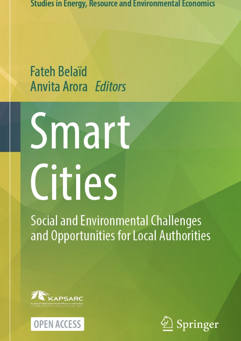
Smart Cities Initiatives and Perspectives in the MENA Region and Saudi Arabia

08 February 2024
This chapter focuses on the evolution of smart cities in developing countries. It starts by mapping the definitions and evolutions of smart cities concepts. Then it outlines the progress and current practices that emerging economies, in general, have achieved... Read Book Chapter
Read More53
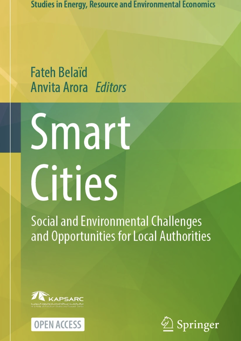
Smart Energy Cities: The Role of Behavioral Interventions in Reducing Electricity Demand in Buildings in Principality of Monaco

08 February 2024
With energy powering the most attractive aspects of urban environments in modern society, from health, transportation, and comfort to information, business, and leisure, energy cities are perfectly positioned to design the smart city of the future by leveragi... Read Book Chapter
Read More55
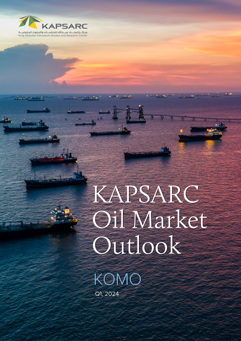
KAPSARC Oil Market Outlook
01 February 2024
This quarter’s oil demand highlights include another muted quarter-on-quarter (QoQ) demand growth in Organization for Economic Cooperation and Development countries, while non-OECD countries experienced greater growth. Continued monetary tightening policies, fears over weakening sign...
Read More51
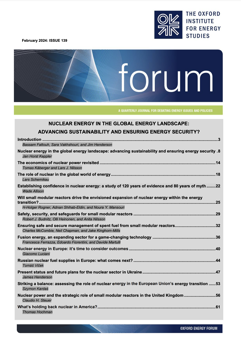
The Status of Nuclear Energy in Saudi Arabia: A Strategic Approach to Energy Security and Sustainability

01 February 2024
Saudi Arabia’s strategic adoption of nuclear energy, in alignment with Vision 2030, represents a crucial step towards energy security and sustainability. The integration of nuclear power offers grid stability, low emissions, cost-effective electricity g... Read full report on here
Read More54
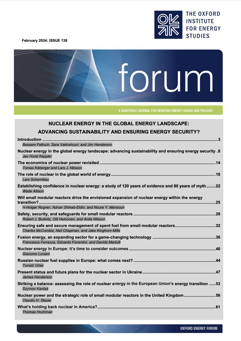
Will Small Modular Reactors Drive the Envisioned Expansion of Nuclear Energy Within the Energy Transition?



01 February 2024
This paper evaluates the role of Small Modular Reactors (SMRs) in the global shift towards sustainable energy, driven by the 2030 Sustainable Development Goals and the Paris Agreement. It highlights nuclear energy’s importance for achieving Net Zero Emissi... Read Full Report here
Read More54

India’s Shift Toward Alternative Fuel Vehicles: An Overview


30 January 2024
47
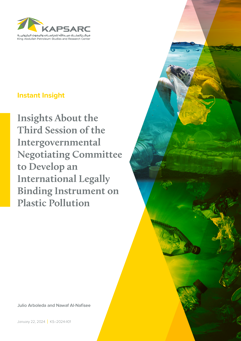
Insights About the Third Session of the Intergovernmental Negotiating Committee to Develop an International Legally Binding Instrument on Plastic Pollution


22 January 2024
Read More
53

IMO GHG Emission Reduction Strategy: Insight into the Alignment of Saudi Arabia’s Efforts at Maritime Decarbonization


19 February 2024
session of the Marine Environment Protection Committee (MEPC 80), where they adopted a revised strategy to reduce greenhouse gas (GHG) emissions from international shipping (KSA IMO 2023c). The initial GHG emission strategy was adopted in 2018 during the MEPC 72, and since then, the...
Read More52

Saudi Arabia Net-Zero GHG Emissions by 2060: Transformation of the Transport Sector





22 January 2024
Decarbonizing the transport sector will likely play a crucial role for Saudi Arabia in fulfilling its target of reaching net-zero greenhouse gas (GHG) emissions by 2060. While clear and immediate low-carbon or zero-carbon alternatives exist in some sectors, the transport sector faces...
Read More53

The Role of Intelligent Transportation Systems and Artificial Intelligence in Energy Efficiency and Emission Reduction




22 January 2024
Despite the technological advancements in the transportation sector, the industry continues to grapple with increasing energy consumption and vehicular emissions, which intensify environmental degradation and climate change. The inefficient management of traffic flow, the underutiliz...
Read More49

Assessing the Impact of Electric Vehicle Penetration on Electricity Demand in Riyadh



22 January 2024
This paper aims to assess and estimate the impact of electric vehicle (EV) penetration on annual electricity demand, specifically in Riyadh, the capital city of Saudi Arabia. Such an assessment can yield significant insights for stakeholders, including policymakers, energy planners, ...
Read More58

Future of Hydrogen in Mobility
22 January 2024
he signing and subsequent ratification of the 2015 Paris Agreement, followed by the consequent net-zero emission target pledges of individual countries, have galvanized the global focus on decarbonization activities. The transport sector contributes almost a quarter of all energy-rel...
Read More48

Modeling Long-Term Oil Demand in the Agricultural Sector


17 January 2024
he agricultural sector and global food security are facing an increasing number of risks due to climate change, the increasing population size, rising energy and agricultural demands, competing demands for land for biofuel production, and the degradation of soil quality. Between 2001...
Read More50

Economic Growth and Convergence: Implications of Energy Transition Pathways


17 January 2024
The 44th International Association for Energy Economics (IAEE) conference was held in Riyadh, co-hosted by KAPSARC and the Saudi Association for Energy Economics (SAEE). It was the first IAEE conference in the Middle East and North Africa (MENA) region. The main theme was “Pathways t...
Read More50

A Meta-Analysis of the Long-Term Oil Demand Emerging from the Power Sector


09 January 2024
il is a versatile source of energy that is used in various sectors, including the power sector. The power sector is transitioning toward low-carbon generation sources. During this transition, it is important to understand the role of oil-based power generation. This paper presents a ...
Read More47
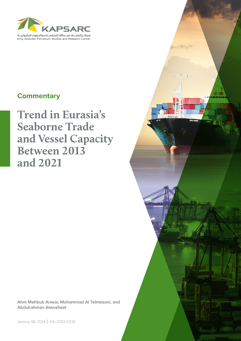
Trend in Eurasia’s Seaborne Trade and Vessel Capacity Between 2013 and 2021



09 January 2024
International trade between countries and across regions has existed for centuries. Moreover, international trade saw a significant increase in its growth from 1950 to 2000, with trade volume growing at an average rate of 6% per year. The concept of trade comprises both exporting and...
Read More52

Kazakhstan – Saudi Arabia: Crossroads


09 January 2024
On July 23, 2022, official talks occurred between Saudi Arabia’s Crown Prince Mohammed bin Salman Al Saud and Kazakhstan’s President Kassym-Jomart Tokayev in Jeddah. During the meeting, the parties confirmed their intention to intensify mutual trade. At the same time, companies in th...
Read More53
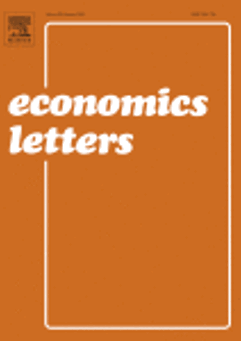
Drivers of Unconditional Income Convergence

05 January 2024
Read More
49

Transit-Oriented Development (TOD) and Energy Consumption – Global and Local Contexts



04 January 2024
There is growing concern about the environmental impact of transport systems. The increase in energy consumption and vehicle emissions is the main contributor to the problem. Several studies have tested hypotheses about the relationship between the urban structure, especially high de...
Read More45

Behavioral Efficiency Improvement via Freight Digitalization as a Viable Near- Term Strategy to Decarbonize the Difficult-To-Abate Road Freight Sector in China and Other Developing Countries






04 January 2024
The containment of road freight transport emission growth is a significant challenge to climate change mitigation, as the road freight sector has been one of the fastest growing sources of greenhouse gas (GHG) emissions and is considered particularly difficult to decarbonize (ITF 202...
Read More48

Impact on Energy Consumption and Emissions of Variations in Aircraft Seating Density Designation from Manufacturers’ Recommendations



04 January 2024
Aircraft capacity utilization is an important factor in airline productivity, but airlines are not using the maximum seating density designations recommended by manufacturers to accurately represent efficiency or performance.
Read More55

Saudi-China Collaboration Under the Circular Carbon Economy: Priorities and Opportunities in CCUS
02 January 2024
Rising ambitions for an energy transition are changing how energy suppliers and consumers think about fuel supply chains. These energy transition ambitions have revitalized interest in alternative energies and technological solutions that reduce greenhouse gas (GHG) emissions to comb...
Read More51
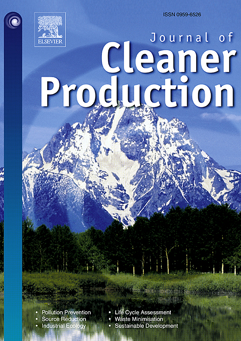
Consumer Preferences for Ride-hailing: Barriers to an Autonomous, Shared, and Electric Future


01 January 2024
Read More
48

The Importance of the Suez Canal for Global Energy Flow


26 December 2023
On March 23, 2021, the Ever Given, a northbound ship loaded with more than 18,000 containers from China to the Netherlands drifted off course and became stuck in a single-lane section of the Suez Canal. As a result, hundreds of ships carrying food, oil, chemicals, and other goods wer...
Read More68

Estimating Car Price Elasticity Using an Inverse Product Differentiation Logit Model



26 December 2023
Since the seminal work of Berry, Levinsohn, and Pakes (1995), random coefficient logit (RCL) has become the workhorse model for estimating demand elasticities in markets with differentiated products using aggregated sales data. While the ability to represent flexible substitution pat...
Read More49

Urban Transportation Challenges in Saudi Arabia: Micromobility as a Solution to First and Last Mile



24 December 2023
The transportation sector plays a significant role in global carbon emissions and environmental challenges. On a worldwide scale, the aggregate greenhouse gas (GHG) emissions attributed to transportation amount to approximately 14.3% of total emissions. Notably, road transport emissi...
Read More63

Energy-Efficient Policy in the Built Environment: From Formulation to Implementation
24 December 2023
Building energy efficiency is a critical component of efforts to address climate change and achieve sustainable development and can potentially reduce greenhouse gas emissions, save money, lower energy bills, create new jobs, and improve occupants’ indoor comfort and quality of life....
Read More48

Saudi Arabia’s High Borrowing Rates and Surging Deposits

14 December 2023
- Rise in Other Quasi-Money Deposits: The paper also examines the implications of a record-high in other quasi-money deposits, signifying an increased interest in alternative ways to save and invest money. This trend may be a response to changing economic conditions, attractive intere...
57
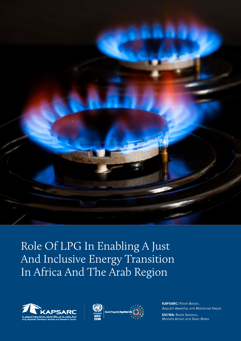
Role Of LPG In Enabling A Just And Inclusive Energy Transition In Africa And The Arab Region






14 December 2023
Globally, 2.3 billion people still lack access to clean fuels and technologies for cooking (CFTs) today, with an overwhelming majority residing in rural areas. Without a dramatic increase in investment and action for scalable solutions, 1.9 billion people will remain without access t...
Read More54
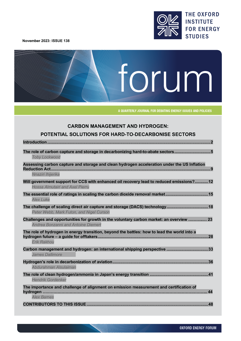
Will Government Support for CCS-EOR Lead to Reduced Emissions?


14 December 2023
Government support for CCS-EOR projects is often contested on the grounds that the resulting increase in oil production undermines their environmental benefits. This paper summarizes a simple approach based on a marginal reasoning consistent with economic decision-making. It produces...
Read More53

Enabling Blue Hydrogen for a Low- Carbon Future: Certifying Emissions and CO2 Storage


14 December 2023
As part of a diverse energy portfolio, hydrogen can support global efforts toward transitioning to a more sustainable energy system. This would align with climate goals, such as those outlined in the Paris Agreement. For hydrogen to fulfill this potential, its production method needs...
Read More52
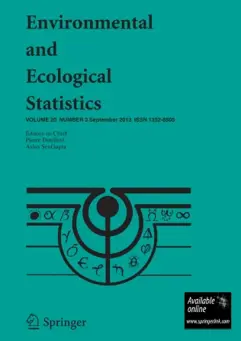
Are the Income and Price Elasticities of Economy-wide Electricity Demand in Middle-income Countries Time-varying? Evidence From Panels and Individual Countries


12 December 2023
Read More
49

The Role of Financial Development in Private Sector Growth in Saudi Arabia



11 December 2023
Saudi Vision 2030 (SV2030), the masterplan for the socioeconomic development of the Kingdom, places considerable emphasis on the development of the private sector in the diversification of the economy. This plan aims to have the private sector account for 65% of the total GDP of the ...
Read More51

Using Satellite Technology to Measure Greenhouse Gas Emissions in Saudi Arabia



07 December 2023
Measuring and monitoring greenhouse gas (GHG) emissions are crucial to address climate change and fulfill Paris Agreement objectives. This paper explores the potential of satellite technology in measuring and tracking CH4, CO2, and N2O emissions in Saudi Arabia, collaborating with en...
Read More47

Saudi Arabia Net Zero GHG Emissions by 2060: Transformation of the Electricity Sector






05 December 2023
Under its Vision 2030 targets, Saudi Arabia is working to steer the nation toward a sustainable future. The Kingdom has recently amplified its sustainability goals, announcing its intention to achieve net zero greenhouse gas (GHG) emissions by 2060. As part of this renewed commitment...
Read More52

The CO2 Cost of Idling: Road Traffic Congestion Plays a Role

04 December 2023
Road-traffic relief is essential for big cities. It can be achieved by various infrastructure improvements to remove the reliance on motorized vehicles by optimizing different modes of urban mobility.
Read More50

Net Zero Emissions in Saudi Arabia by 2060: Least-Cost Pathways, Influence of International Oil Price, and Economic Consequences

30 November 2023
This paper presents possible net zero emissions (NZE) trajectories for Saudi Arabia at horizon 2060 and analyzes their possible economic consequences. We use an in-house hybrid forward-looking general equilibrium model of the Saudi economy. We construct a baseline scenario where the ...
Read More48

Powering the Future of Aviation: Exploring the Role of Hydrogen and Power-to- Liquid in Sustainable Aviation Fuels



30 November 2023
emissions by 80% (Airbus 2023). The aviation industry aims to produce enough SAFs to meet aviation fuel demand by 2050, with power-to-liquid (PtL) technology emerging as an alternative pathway for SAF production. This paper provides insights into the application and deployment of th...
Read More52

Long-Term Decarbonization Pathway for Saudi Arabia To Reach Net Zero GHG Emissions by 2060





29 November 2023
Saudi Arabia is a signatory to the 2015 Paris Agreement. It has updated its nation...2 eq) by 2030. In the lead-up to COP 26 and joining the global efforts, under the umbrella program of the Saudi Green Initiative, Saudi Arabia announced its pledge to achieve net zero emissions by 2060.
Read More50

Worldwide intraregional and interregional air passenger traffic volume distribution



23 November 2023
51
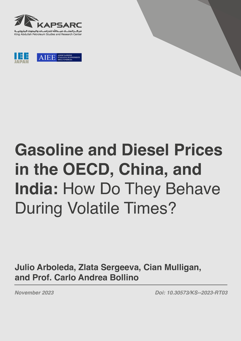
Gasoline and Diesel Prices in the OECD, China, and India: How Do They Behave During Volatile Times?




22 November 2023
. Together, they have compiled a dataset aimed at elucidating how the prices of gasoline and diesel evolved during this three-year span and which factors played a more significant role in determining the prices. Presented at a country level on a monthly basis, the data facilitates th...
Read More52

Trends in Global Solar PV Installation in 2022

21 November 2023
We briefly comment on global solar PV installations for 2022, and provide insights on the record-breaking trend that this industry has been witnessing for the past 15 years.
Read More53

Is the Shale Oil Rush Over?





20 November 2023
he California Gold Rush was a time of exuberance and technological development in the mining sector and exhibits significant parallels with shale development that are worth exploring. The easy wins of the pioneers gave way to larger organizations with better funding and technology, s...
Read More52

Challenges and Opportunities for Sustainable Deployment of Bioenergy with Carbon Capture and Storage Pathways (BECCS) Globally



20 November 2023
) from processes that utilize bioenergy to produce heat, electricity or biofuels. However, thi...2 ($/tCO2), respectively. Other technologies, such as poplar pellets, forest residue and agricultural residue with trans-Atlantic shipments, are not able to achieve negative emissions.
Read More47
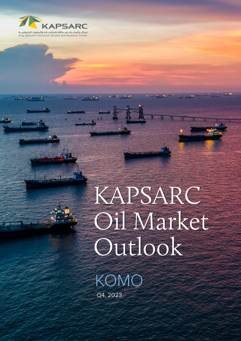
KAPSARC Oil Market Outlook
13 November 2023
This quarter’s oil demand highlights include muted quarter-on-quarter (QoQ) demand growth from OECD countries, while non-OECD countries are experiencing declines in line with seasonal patterns. Monetary tightening policies, particularly in OECD countries, have stalled due to ongoing ...
Read More49

Implications of Climate Policy on Energy Poverty




13 November 2023
This article examines the complex issue of energy poverty and its various dimensions, including energy access and affordability. It explores the challenges of addressing energy poverty and the trade-offs that may exist between energy poverty and climate change policy.
Read More
52
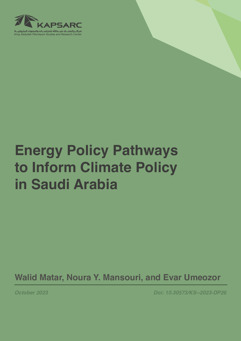
Energy Policy Pathways to Inform Climate Policy in Saudi Arabia



13 November 2023
e). In this regard, this paper contributes a modeling view of the climate-related effects of various energy policies on the Saudi energy system. The baseline entails the continued progression of current domestic policies ...2 emissions equal to those displayed in the announced policies.
Read More54

Eyes Off the Prize? Labor Flows in the Saudi Oil Industry 2019-2023

13 November 2023
While much attention has been paid recently to oil and gas investment gaps, there has also been a rising chorus of analyses highlighting an emerging talent gap in traditional energy industries.
Read More55
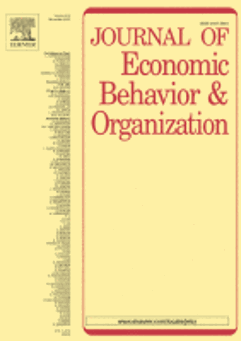
Boosting Buildings Energy Efficiency: The Impact of Social Norms and Motivational Feedback

02 November 2023
Read More
0
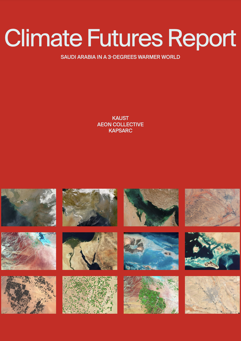
Climate Futures Report

01 November 2023
49
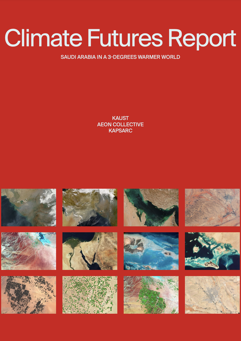
Chapter 7. Energy and Industry

01 November 2023
46
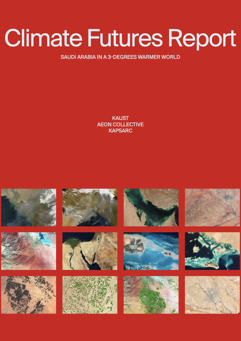
3-Degrees Warmer World

01 November 2023
56
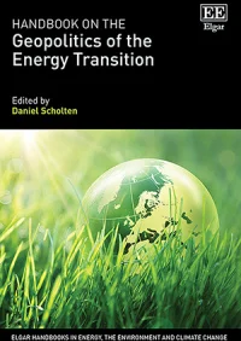
Renewables and Geopolitics in the Middle East



01 November 2023
The energy transition is fundamentally transforming geopolitics, with renewable energy and other decarbonization options reshaping existing energy markets, trade flows, and energy security strategies. What new opportunities and challenges await us? Will it p... Read Book Chapter
Read More57
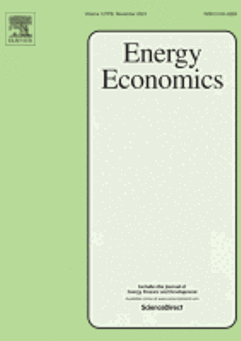
The Effects of a Shock to Critical Minerals Prices on the World Oil Price and Inflation




01 November 2023
Read More
42

Worldwide Intraregional and Interregional Air Freight Traffic Volume Distribution



26 October 2023
Freight by air does not comprise a significant share of the worldwide tonnage due to its cost compared to land (road and rail) and sea transport. However, air freight is important for commodities that either have high values or are time-sensitive. For instance, documents, perishable ...
Read More51

Global Crude Oil Refining Capacities

26 October 2023
Global crude oil refining capacities are presented according to the classification of global refineries in the KOVA model. The evolution of Saudi Arabian refining capacities and configurations between 2005 and 2020 is also presented.
51

Recent Developments and Trends in Cybersecurity in the Power Sector



26 October 2023
The power sector is a crucial component of critical national infrastructure, and its continuous and resilient operation underpins the socioeconomic prosperity of any nation. Energy security is a priority in many regions of the world, as it is essential for economic growth and prosper...
Read More44

Saudi Arabia’s Population, GDP, and Seaborne Trade



26 October 2023
This infographic tells the story about Saudi Arabia’s population, GDP, and seaborne trade. It shows the trade between Saudi Arabia and the rest of the world.
Read More52

US’s Regional Clean Hydrogen Hubs (H2Hubs) Program Key Takeaways for Global Players

25 October 2023
From the launch of federal energy and research agencies in the 1970s to the enactment of legislation dedicating resources to clean energy research and the creation of the Office of Energy Efficiency and Renewable Energy , the US has had a rich history of market evolution. These devel...
Read More47

World’s Population, GDP, and Seaborne Trade



25 October 2023
This infographic tells the story about the world’s population, GDP, and seaborne trade. The trade is reflected in regions across the globe.
53

Global Geothermal Electricity and Heat Generation Since 2000

25 October 2023
Geothermal energy is a form of renewable energy generated by tapping into the Earth’s internal heat. This heat is produced by the radioactive decay of minerals and the original heat of the Earth, which dates to its formation. There are several ways to generate electricity from geothe...
Read More59

Aircraft seating capacity designation by selected airlines in Europe, the Middle East, Africa, Asia/Pacific, North America, and Latin America



25 October 2023
Aircraft capacity utilization is one of the main factors in an airline’s productivity. It is also vital when analyzing both energy efficiency and greenhouse gas emissions (GHG) in the aviation sector per passenger. In fact, the energy consumption by passengers in aviation has enormou...
Read More52

Cost-Effectiveness Analysis of Aerodynamic Improvement Technologies for Road Freight Transport in Saudi Arabia


25 October 2023
For the last several decades, road freight transport has been one of the fastest growing energy- and oil-consuming sectors in Saudi Arabia. With sustainability being one of the key pillars of Vision 2030 and given the Kingdom’s commitment to achieving carbon neutrality by 2060, decar...
Read More53

How Can the European Energy Crisis Reshape the Power Sector Reform Endeavors of GCC Countries?



24 October 2023
nergy prices in Europe have been soaring, and policymakers are trying to find solutions to immediately contain the energy prices for end-consumers and to enhance the market design in the longer term. This paper discusses some of the current events that are facing the power sector in ...
Read More53

Creating Demand for Low-Carbon Hydrogen for Industry Decarbonization: Lessons from the Electricity Sector

24 October 2023
ny policymakers now see the use of low-carbon hydrogen as a strong contender in terms of how to achieve climate neutrality goals. Currently, hydrogen is used in refinery processing, ammonia production, or methanol production as feedstock, where no other alternatives exist...2 emissions.
Read More50

Interfuel Substitution in the Industrial Sector in Saudi Arabia

23 October 2023
he Kingdom of Saudi Arabia has taken many decisive steps toward a more sustainable future, in line with its Vision 2030, including the use of c...2emissions target. A ridge regression method is used to estimate the parameters of the translog production function for the period 1990–2020.
Read More59

Modeling the Determinants of Electric Vehicle Adoption: A Saudi Perspective



23 October 2023
his study aims to contribute to the literature by shedding light on consumers’ acceptance of electric vehicles (EVs) in Riyadh and their potential response to adoption incentives. A stated preference experiment (SPE) was developed and then incorporated into an online stated preferenc...
Read More51

The Role of Petrochemical Sector Exports in the Diversification of the Saudi Economy: A Scenario Analysis of Foreign and Domestic Price Shocks



22 October 2023
, the estimated export equations were integrated into a general equilibrium model, called the King Abdullah Petroleum Studies and Research Center (KAPSARC) Global Energy Macroeconometric Model (KGEMM), and a scenario analysis was conducted for the diversification implicati...until 2035.
Read More49

Household Expenditure Survey, Housing and Energy Costs in Saudi Arabia


22 October 2023
The Household Income and Expenditure Survey for Saudi Arabia was conducted by statistical agency GASTAT in 1999, 2007, 2013 and 2018. In this economic commentary, we discuss some of the key findings and developments over the period under consideration. We devote particular attention ...
Read More48

Employment Potential of Renewable Energy in Saudi Arabia: A Value Chain Analysis

22 October 2023
This paper looks at the employment possibilities across the value chain of solar PV and onshore wind and, applying the unique characteristics of the Saudi labor force, investigates where localization mandates should target in order to optimize the benefits to the Saudi econom...
Read More56
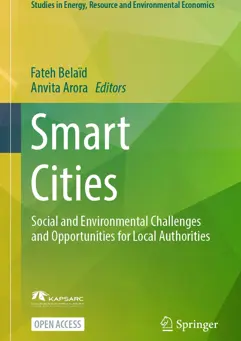
Smart Cities from an Indian Perspective: Evolving Ambitions


15 October 2023
Indian urban infrastructure is in the middle of a massive build-up. For several decades, Indian cities were caught between the demands of an exploding population and the need to provide infrastructure in terms of health, education, transport, and services to... Read Book Chapter
Read More49

Closing the Investment Gap to Achieve Paris Agreement Goals






09 October 2023
his study aims to assess the alignment of global sustainable financial flows with transition investment priorities. First, we identify investment gaps based on the difference between the required annual investment to meet global net-zero emissions (NZE) targets and current inve...
Read More56

The Economic and Energy Transformation in Saudi Arabia: Exploring the Role of Strategic Investments

03 October 2023
This Instant Insight reviews Saudi Arabia’s capital expenditure (central government capital expenditure + public investment fund [PIF] expenditure), which is a key component of its fiscal policy. Capital expenditure stimulates the primary goal of economic diversification, a structura...
Read More52

India Middle East Europe Economic Corridor: Bridging Economic and Digital Aspirations


02 October 2023
The announcement of the India-Middle East-Europe Economic Corridor (IMEC) during the 2023 Group of 20 (G20) Summit in New Delhi marks a significant development for the Partnership for Global Infrastructure and Investment (PGII) initiative. The PGII formation was announced in 20...
Read More52

Modeling and forecasting industrial electricity demand for Saudi Arabia: Uncovering regional characteristics





01 October 2023
Read More
42

Commercial Electricity Demand Modeling: Do Regional Differences Matter for Saudi Arabia?


26 September 2023
Read More
48

Modeling of the Interconnected Middle East and North Africa Electricity System: Including Uncertainties to Better Inform Policymakers




26 September 2023
The modeling of power systems can bring about insightful quantitative results to inform policymakers. This commentary reviews the literature on modeling the Middle East and North Africa (MENA) region’s electricity interconnections and trade in the context of expanding variable and in...
Read More48

Carbon Markets in Gulf Cooperation Council Countries: Accelerating Robust Market Development and Promoting Regional Cooperation
26 September 2023
As both regulated and VCMs take off in Saudi Arabia and across the GCC region, KAPSARC is seeking to help inform and support their robust development in two ways. The first is to keep track of the rapidly evolving global market landscape. Questions here relate to both how governance...
Read More
53

World Oil and Critical Mineral Study: A Global VAR Analysis




26 September 2023
ritical minerals (CMs), such as lithium, cobalt, nickel, and rare earth metals, are essential for the development of clean energy technologies across the whole value chain of wind and solar power, electricity networks, and electric vehicles (EVs). Demand for these minerals is expecte...
Read More59

Global Crude Oil Refinery Models: Parametric and Nonparametric Methods

26 September 2023
Crude oil refineries produce finished petroleum products through a series of processing steps known as refinery unit operations. The varieties and capacities of process units, along with their operational characteristics, differentiate one refinery from another. Over the years, the...
Read More
54
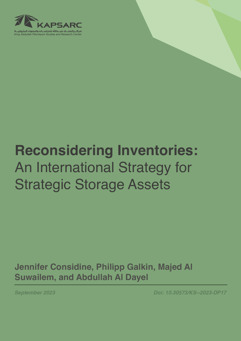
Reconsidering Inventories: An International Strategy for Strategic Storage Assets




26 September 2023
he purpose of this report is to recommend an interconnected regional and international strategy to share the burden of developing and maintaining commercial and strategic storage infrastructure for Saudi crude oil and products through an alliance with the Gulf Cooperation Council (GC...
Read More49

Renewable Energy and Job Creation: An Automation Risk Assessment

20 September 2023
The necessity of a green transition from traditional energy sources to renewable alternatives has brought with it optimism regarding the employment benefits of this change. Announcements of major renewable energy projects include forecasts of thousands of associated direct, indirect ...
Read More54
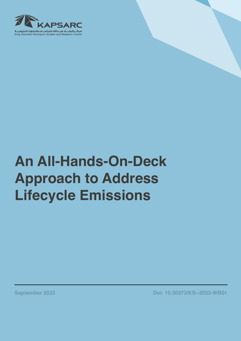
An All-Hands-On-Deck Approach to Address Lifecycle Emissions
20 September 2023
emission standards, zero-tailpipe-emission vehicle mandates, and tailpipe criteria pollutant emission regulations. Historically, transportation technology and policy have been evaluated based on exhaust emissions; however, ignoring those emissions generated during fuel and vehicle p...
Read More49

The Surge in Riyadh’s Population: Electricity Demand Implications


20 September 2023
The city of Riyadh, the capital and most populous city of the Kingdom of Saudi Arabia, is undergoing a makeover to become a global metropolis. Saudi Vision 2030 announced a wide range of projects in the city, placing it on an accelerated sustainable development path toward becoming a...
Read More47

How Have Electricity Tariffs Evolved in Saudi Arabia Over the Last Half Century (1974 – 2023)?

18 September 2023
Gathering information nested in different sources and across years for all electricity consumer types and covering the most extended period, this Data Insight is a first and unique source for modelers and policymakers.
Read More58

A Decomposition Approach to Energy Policy Analysis

18 September 2023
Index decomposition analysis (IDA) has been used to study energy use movements since the 1980s. Methods at that time consisted primarily of multiplying factors that ultimately yielded the aggregate quantity, such as energy use. IDA is a straightforward way for researchers to examine ...
Read More46

India’s Decarbonization Strategy for its Electricity Sector: Balancing Renewables and Coal

18 September 2023
On November 1, 2021, at the 26th Conference of the Parties of the UNFCCC (COP 26), Prime Minister of India Narendra Modi made an ambitious pledge, announcing India’s commitment to reaching net-zero emissions by 2070. Furthermore, during the speech, Prime Minister Modi went on to anno...
Read More58

The Implementation of the Carbon Offsetting and Reduction Scheme for International Aviation and Its Challenges for Aviation


14 September 2023
The aviation sector is a fast-growing industry that contributes significantly to greenhouse gas emissions and climate change. To address this issue, the International Civil Aviation Organization (ICAO) set aspirational emissions goals and introduced the Carbon Offsetting and Reductio...
Read More49
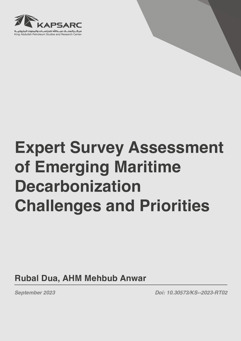
Expert Survey Assessment of Emerging Maritime Decarbonization Challenges and Priorities


14 September 2023
The decarbonization of the maritime sector has emerged as a global concern due to the shipping sector’s 3% contribution to world’s total greenhouse gas (GHG) emissions. Notably, the latest developments involving the adoption of more ambitious GHG reduction targets by the Internationa...
Read More47

Macroeconomic, Energy and Emission Effects of Solar PV Deployment at Utility and Distributed Scales in Saudi Arabia



14 September 2023
This study assesses the macroeconomic, energy and emissions impacts of solar photovoltaic (PV) deployment in the Kingdom of Saudi Arabia for the period 2021–2030. This is accomplished by linking an energy and environmental sector augmented macroeconometric model with a power model a...
Read More
0

Methane Emissions Baseline Forecasts for Saudi Arabia Using the Structural Time Series Model and Autometrics



14 September 2023
Reducing methane (CH4) emissions is key to near-term efforts to limit global warming. CH4 is the second most abundant anthropogenic greenhouse gas (GHG) in the atmosphere after carbon dioxide (CO2). The production, transport, and consumption of fossil fuels, in addition to was...
Read More51

Fiscal Policy in Oil and Gas-exporting Economies: Good Times, Bad Times and Ugly Times


12 September 2023
Read More
45

Brazil, Russia, India, China, and South Africa: Potential Roadways to A New Global Governance Mechanism for Energy and Climate



11 September 2023
The recent regionalization of global politics and trade has placed Brazil, Russia, India, China, and South Africa (BRICS) at the forefront of the geopolitical agenda.
Read More
52

What Could Happen to the Oil Market if Iran’s and Venezuela’s Sanctions Are Lifted?

11 September 2023
Disagreements between oil producers and consumers for keeping a stable market has resulted in actions from both sides, elevating concerns about the near future stability of the oil sector. On one side, producers have concerns about future demand uncertainties, while consumers look fo...
Read More49
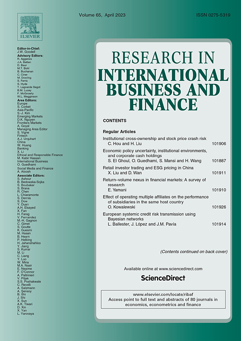
Saudi Arabia Energy Transition in a Post-paris Agreement Era: An Analysis with a Multi-level Perspective Approach


11 September 2023
Read More
46

Saudi Arabia’s Input-Output Table: Computing Type I Multiplier


05 September 2023
These releases have extended the number of sectors representing the Saudi Arabian economy to 20 from the 13 sectors typically reported in GDP official reports. This disaggregation of sectors in the input-output table is valuable for analyzing new sector developments and targeted sect...
Read More59

Aggregate Real Energy Price Index


05 September 2023
Our aggregate real energy index is constructed in two steps. First, sectoral energy prices are obtained from Hasanov et al (2020). Second, the index is constructed by calculating a weighted average of these sectoral energy prices, in which the weight for each sector is its contributi...
Read More51

An Overview of Integration Costs of Variable Renewables in the Power Sector



04 September 2023
In recent years, the cost of electricity generated by renewables has significantly decreased to the point where it is cost competitive with conventional plants. However, incorporating variable renewable energy (VRE) technologies like wind and solar photovoltaics (PV) into the power s...
Read More52
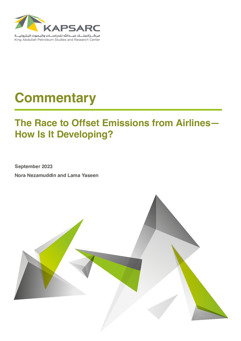
The Race to Offset Emissions from Airlines— How Is It Developing?


03 September 2023
) emissions, with the International Energy Agency (IEA) indicating that the growth in aviation in the last decade has been faster than that of roads, rail, or shipping. The pandemic has provided a unique situation in which the airline industry was brought to a halt due to pandemic me...
Read More45

Electricity Balancing Market in the United Kingdom: Time to Rebalance Participants’ Interests

30 August 2023
During the four months of winter (November to February) of 2021/22, the costs of keeping supply and demand matched through the United Kingdom’s electricity balancing market reached a record high of over £1.5 billion.
Read More57

Future Fuel Demand From the Saudi Shipping Sector: A Business-as-Usual Estimation




21 August 2023
The purpose of this commentary is to suggest a rough estimation of future exp...
- A global average energy intensity of 0.078 megajoules per tonne-kilometers (MJ/tonne-km).
- An average export distance of 5,441 nautical miles (nm) between Saudi Arabia and export trading partner countries.
53

Heralding a New Era in Trade Between the GCC, Africa and Asia

21 August 2023
Global geopolitical dynamics are altering trade flows of petrochemicals and chemical products from Gulf Cooperation Council (GCC) countries. These include the conflict between Russia and Ukraine impacting access to cheap gas for industrial activities in Europe, and protectionist ener...
Read More54
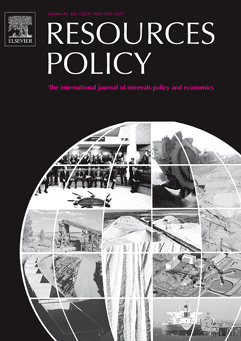
Environmental Consequences of Geopolitical Crises: The Case of Economic Sanctions and Emissions



20 August 2023
Read More
42

Carbon-neutral LNG in Japan: Drivers and Perspectives


17 August 2023
In 2019, a new phenomenon – so-called “carbon-neutral liquified natural gas” (LNG) – was introduced into gas markets. It originated from two shipments delivered by Shell in June 2019 to the Japanese utility Tokyo Gas and a Korean energy company, GS Energy. The only difference from co...
Read More54
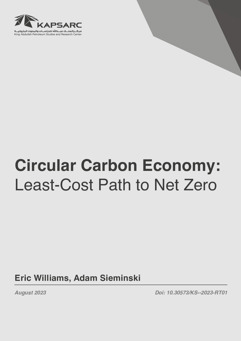
Circular Carbon Economy: Least-Cost Path to Net Zero


16 August 2023
emissions with removals. ‘Net-zero’ has become a shorthand phrase to describe how governments, companies, and others should respond to climate change challenges and to the implementation of the Paris Agreement. However, there is no standard definition of what exactly net-zero entail...
Read More52
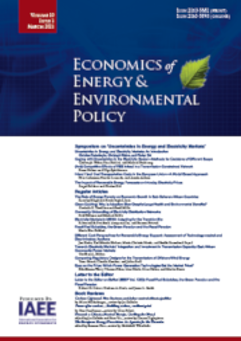
Making Electricity Capacity Markets Resilient to Extreme Weather Events


14 August 2023
Read More
46
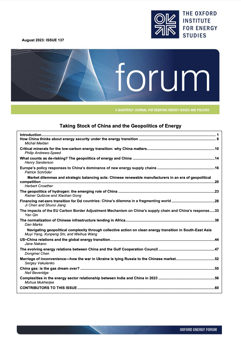
Taking Stock of China and the Geopolitics of Energy

14 August 2023
Read More
46

One Year After the Texas Blackout: Lessons for Reliable and Resilient Power Systems



10 August 2023
In February 2021, Texas experienced an extreme cold snap causing a dramatic electricity blackout that left millions of households without electricity, resulting in over two hundred fatalities and economic damages of approximately $100 billion. The Texas blackout... Read more here
Read More53

How Firm Capacity and Forced Outage Rate Assumptions of Renewables Impact Capacity Expansion Model Results



10 August 2023
We assess how varying the firm capacity (FC) and forced outage rate (FOR) assumptions of renewable energy (RE) resources impact capacity expansion models (CEM). Eight scenarios that vary the FC and FOR, RE share targets, and annual RE uptake were run on a power ... Read more here
Read More52

Determinants of Remittance Outflows: The Case of Saudi Arabia


10 August 2023
Read More
45
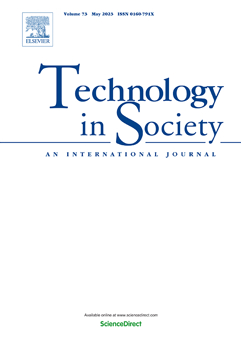
Systematically Mapping Innovations in Electricity Using Startups: A Comprehensive Database Analysis



07 August 2023
Read More
46

الطاقة المتجددة في دول الخليج العربية: الوضع الراهن والتحديات وخيارات السياسات


07 August 2023
Read More
32

Enabling the Progress of the Circular Carbon Economy: India’s Approach to CCUS



03 August 2023
The circular carbon economy (CCE) concept is an extension of the idea of a circular economy, focusing on energy and carbon flows while implicitly retaining the circular economy’s material, energy, water, and economic flows. The goal of the CCE framework is to achieve a carbon balance...
Read More45
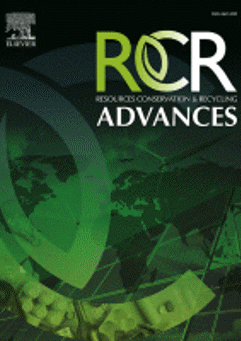
How Does Concrete and Cement Industry Transformation Contribute to Mitigating Climate Change Challenges?

02 August 2023
Read More
46

Energy Efficiency and Residential Energy Consumption: Current Challenges, Policies, and Emerging Trends

02 August 2023
Read More
40
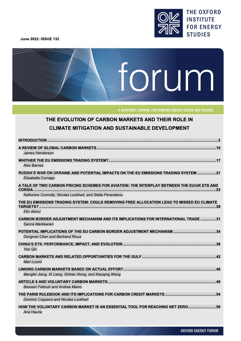
New Oxford Energy Forum – The Evolution of Carbon Markets and their Role in Climate Mitigation and Sustainable Development – Issue 132

30 July 2023
Read More
40

Fuel Efficiency in Saudi Arabia’s Aviation Sector: Progress and Future Implications



25 July 2023
Despite the fast global expansion of the aviation industry, due to its sustainability issues, the industry’s concerns about energy efficiency and emissions are still very important. Studying the changing energy consumption patterns in Saudi Arabia is crucial, as the country is expect...
Read More53

Driving Forward a Low-carbon Built Environment: The Impact of Energy Context and Environmental Concerns on Building Renovation

20 July 2023
Read More
42

Humidity Adjusted Cooling and Heating Degree Days in Saudi Arabia


19 July 2023
This data insight calculates the humidity-adjusted Cooling and Heating Degree Days for Saudi Arabia. This dataset can be used by researchers who model residential electricity demand, energy efficiency studies, and policymakers to base their potential policy scenarios on weather condi...
Read More57

Joint Gas Purchasing in Europe: How Can It Change Market Competitive Forces?

18 July 2023
The European Union (EU) has adopted joint gas purchasing to mitigate the risk of security of supply, lower gas prices and volatility exacerbated by the Russia-Ukraine conflict. This paper aims to investigate the implications of this mechanism for market competitive forces to obtain ...
Read More
51

Estimating Regional Variation in Saudi Arabia’s Energy Usage and Carbon Emissions


18 July 2023
Estimates of regional energy consumption and carbon emissions could be useful for agencies investigating the effects of regionally targeted investments and policy interventions. Using gasoline consumption in Saudi Arabia as a case study, we develop two approaches for estimating the r...
Read More54
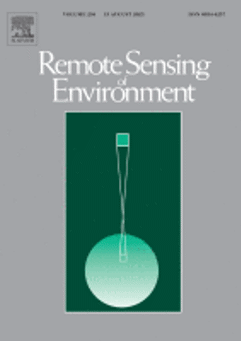
Multi-city Assessments of Human Exposure to Extreme Heat During Heat Waves in the United States

06 July 2023
Read More
46
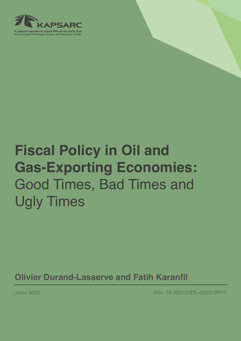
Fiscal Policy in Oil and Gas-Exporting Economies: Good Times, Bad Times and Ugly Times


04 July 2023
Revenues from oil and gas exports represent an important source of government budgets in some emerging countries. At the same time, these revenues fluctuate considerably due to changing global economic conditions and energy prices. Economic theory prescribes that governments should t...
Read More51
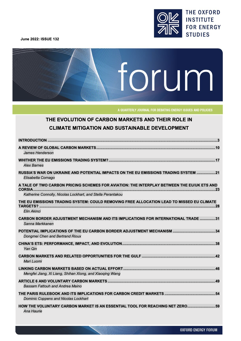
Carbon Markets and Related Opportunities for the Gulf

30 June 2023
Read More
42

Commercial Electricity Demand Modeling: Do Regional Differences Matter?


25 June 2023
One of the key benefits of understanding regional electricity consumption and its response to policy changes is enhancing the decision-making process. In Saudi Arabia, energy policies are set at the national level, and assessing their impacts at the regional level provides valuable i...
Read More53

Plastic to Oil: Saudi Arabia and Global Perspectives


22 June 2023
ay, it is impossible to im...waste plastic disposal. According to the “OECD Global Plastic Outlook” published in 2022, global plastic waste production increased by more than 2.25 times between 2000 and 2019 to 353.3 million tons (MMT). However, only 9% of that plastic waste is recycled.
Read More60

Oil and Non-Oil Determinants of Saudi Arabia’s International Competitiveness: Historical Analysis and Policy Simulations

19 June 2023
Read More
41

The Viability of Energy Efficiency in Facilitating Saudi Arabia’s Journey Toward Net-zero Emissions

19 June 2023
Read More
48

Determinants of Saudi Arabia’s International Competitiveness: Historical Analysis and Policy Simulations

18 June 2023
udi Vision 2030 aims to improve Saudi Arabia’s ranking on the Global Competitiveness Index from 25 in 2015–2016 to within the top 10 by 2030. It also strives to increase the share of non-oil exports in non-oil GDP from 16% in 2016 to 50% by 2030. To achieve these goals, decision-maki...
Read More62

Floating LNG: A Solution for the European Gas Supply Crisis?

17 June 2023
The European energy crisis started in the second half of 2021 and was aggravated in 2022 by geopolitical tensions in Eastern Europe, explosions on the crucial Nord Stream pipelines that bring a significant portion of Russian gas to Europe and unplanned nuclear outages and low hydro l...
Read More53

Will King Salman International Airport Be One of the Largest Airports in the World?



15 June 2023
In April 2016, Crown Prince Mohammad bin Salman launched Saudi Vision 2030, which is a comprehensive strategy for the economic and social development of Saudi Arabia. Its objectives include diversifying the Saudi economy, boosting tourism, increasing trade, generating new jobs and ec...
Read More61
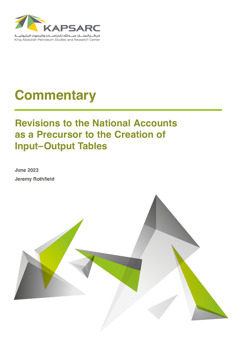
Revisions to the National Accounts as a Precursor to the Creation of Input–Output Tables

14 June 2023
KAPSARC has an ongoing research project on input–output IO) tables. These tables provide a summary record for a particular year of the transactions between economic sectors and between different agents in the economy.
Read More48

What Innovations Are Chinese Electricity Startups Pursuing?



13 June 2023
We provide a snapshot of the innovations that Chinese electricity startups are pursuing and compare them with the innovation efforts of their worldwide and Gulf Cooperation Council (GCC) counterparts. We contrast types of innovation, technological domains and focuses on megatrends wi...
Read More56

Urban Transport Energy Demand Model for Riyadh: Methodology and Preliminary Analysis






13 June 2023
equivalent annually by 2030, according to its Nationally Determined Contribution to the United Nations Framework Convention on Climate Change (UNFCCC). Among many policies it is introducing, a mass transit system and transit-oriented development are being advanced with the expectati...
Read More57

Challenges Facing the Circular Economy That Aims to Improve Electric Vehicle Sector Sustainability

13 June 2023
Governments around the world are increasingly focusing on the future of transportation, particularly road transportation, to reduce global greenhouse gas emissions and local air pollution. As the shift to low-carbon transportation continues, the sales of electric vehicles (EVs) are e...
Read More49

Can Hybrid Solar Projects Pave the Way for Concentrated Solar Power Development?

12 June 2023
Hybrid renewable energy systems combine two or more technologies that complement each other to generate clean and stable power output. These systems could be two renewable energy systems (e.g., solar and wind) or renewables with storage (e.g., with battery or thermal storage). Their ...
Read More48

Assessing Climate Mitigation Benefits of Public Support to CCS-EOR: An Economic Analysis


08 June 2023
Government support for CCS-EOR projects is sometimes contested on the grounds that the resulting increase in oil production undermines their environmental benefits. Addressing this concern requires determining the effects of implementing CCS-EOR on global CO2 emissions. This paper pr...
Read More50

The Joint Crediting Mechanism in the Paris Agreement Era: The Challenges of and Potential for Future Saudi-Japanese Cooperation

07 June 2023
The joint crediting mechanism (JCM) is a Japan-initiated bilateral mechanism for reducing greenhouse gas (GHG) emissions while transferring Japan’s technologies to partner countries in exchange for transferring carbon credits to Japan. It is seen as a leading pilot mechanism of “coop...
Read More55
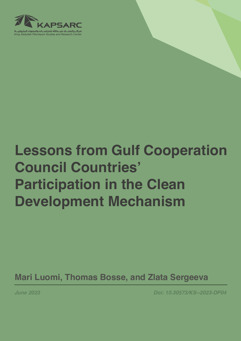
Lessons from Gulf Cooperation Council Countries’ Participation in the Clean Development Mechanism



06 June 2023
rbon markets have rapidly risen on government and corporate agendas in the Gulf Cooperation Council (GCC) countries as the region gears up to implement the Paris Agreement and pursue ambitious net-zero greenhouse gas (GHG) emission targets. Governments have expressed interest in part...
Read More56
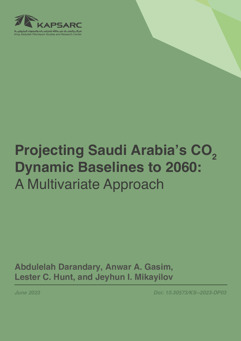
Projecting Saudi Arabia’s CO2 Dynamic Baselines to 2060: A Multivariate Approach




06 June 2023
As a party to the Paris Agreement, which aims to limit the global average temperature rise to below 2 degrees and keep it as close as possible to 1.5 degrees Celsius, Saudi Arabia has submitted its nationally determined contribution (NDC). NDCs are essentially climate action plans th...
Read More46
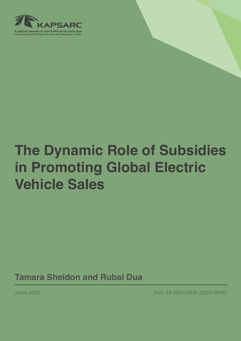
The Dynamic Role of Subsidies in Promoting Global Electric Vehicle Sales


06 June 2023
We offer the most comprehensive analysis to date of global plug-in electric vehicle (PEV) subsidies. We accomplish this by estimating vehicle choice models for 23 countries using 2010–2019 sales data and using counterfactual simulations to assess the cost-effectiveness of PEV incent...
Read More
52

Modeling and Projecting Regional Electricity Demand for Saudi Arabia


05 June 2023
This paper utilizes a structural time series approach to model Saudi Arabia’s regional electricity demand, capturing undetected forces of variability in the data-generating process that include improvements in technology, energy-saving behavior, and other underlying trends tha...
Read More50

Energy Transition Amid Converging Global Energy Crises



04 June 2023
In this commentary, we provide a discussion of the factors that have led to the ongoing spike in natural gas prices. We then discuss the potential short- and long-term implications for the global energy transition and for users of natural gas, both residential and industrial. The ana...
Read More49
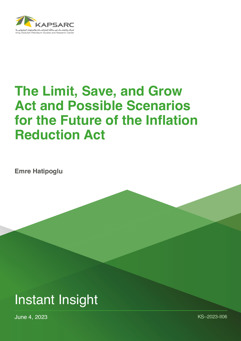
The Limit, Save, and Grow Act and Possible Scenarios for the Future of the Inflation Reduction Act

04 June 2023
The IRA has already begun delivering tangible benefits in the U.S., with much of it going to Republican districts. While LGSA has brought House Speaker McCarthy into the national spotlight, he does not have sufficient political clout to pursue a reversal of the IRA, especially when i...
Read More42
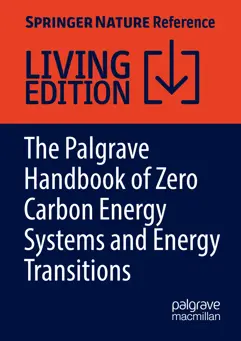
Reframing the Net-Zero Debate from Obligation to Opportunity: The Promise of the Circular Carbon Economy


17 May 2023
Read More
48
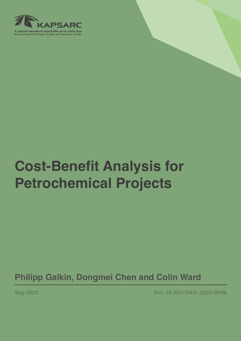
Cost‒Benefit Analysis for Petrochemical Projects



14 May 2023
ost‒benefit analysis (CBA) has been used to assess investment projects for decades with the aim of quantifying their externalities and potential impacts on social welfare. However, the domain where CBA is applied has been primarily limited to direct public financing in several sector...
Read More65
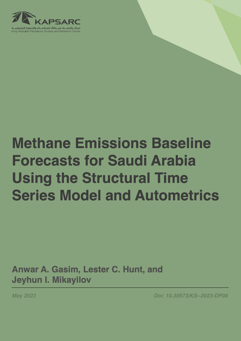
Methane Emissions Baseline Forecasts for Saudi Arabia Using the Structural Time Series Model and Autometrics



14 May 2023
ducing methane (CH4) emissions is key to near-term efforts to limit global warming. CH4 is the second most abundant anthropogenic greenhouse gas (GHG) in the atmosphere after carbon dioxide (CO2). The production, transport, and consumption of fossil fuels, in addition to waste and ag...
Read More58
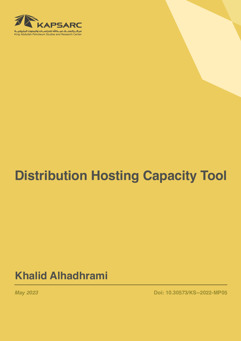
Distribution Hosting Capacity Tool

14 May 2023
Distributed energy resources (DERs) are a critical component of strategies to decarbonize the electricity sector. As the costs of solar panels and electric vehicles decline, distribution systems will host an increasing number of DERs. Successful implementation requires determining th...
Read More50

Choosing to Diet: The Impact and Cost-effectiveness of China’s Vehicle Ownership Restrictions




14 May 2023
Can voluntary carbon emission reduction pledges, such as the nationally determined contributions under the Paris Agreement, result in significant emission reductions? According to prominent experts such as Nordhaus (2015), Barrett (2005), and Weitzman (2019), free-riding is un...
Read More49
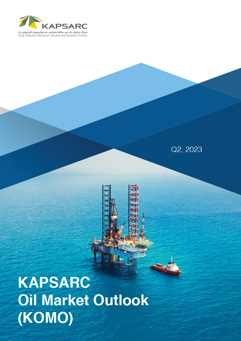
KAPSARC Oil Market Outlook (KOMO)
14 May 2023
This quarter’s demand highlights show competition between seasonality and economics in each country, with one factor limiting growth while the other enhances quarter-on-quarter (QoQ) demand to new levels.
Read More56

The Energy Transition and Export Diversification in Oil-Dependent Countries: The Role of Structural Factors


11 May 2023
e energy transition toward decarbonization is expected to impact producers of fossil fuels. However, oil-exporting countries are currently key players in the modern economy. Thus, the energy transition will not be successful if state revenues in these countries are not stably maintai...
Read More43

Modeling the Distribution and Transshipment of Refined Oil Products

11 May 2023
KAPSARC has developed an optimization model to characterize the distribution of oil products after the refining stage. The model ensures that the demand for any group of refined oil products is simultaneously met while minimizing the social costs associated with the distribution syst...
Read More59

Modeling Factors Affecting the Choice to Use the Proposed Riyadh Metro System




11 May 2023
e Riyadh metro system is being implemented as a sustainable transport option that will offer reliable, affordable and comfortable urban mobility. It is important to understand the factors influencing the likelihood that people will use the new metro system. Thus, this study’s key obj...
Read More49

Baseline Forecasts of Carbon Dioxide Emissions for Saudi Arabia Using the Structural Time Series Model and Autometrics



11 May 2023
As a party to the Paris Agreement, Saudi Arabia submitted a baseline emissions reduction target as part of its nationally determined contribution. The baseline target rests on the development of a baseline emissions scenario. This is a counterfactual scenario that shows how emissions...
Read More66
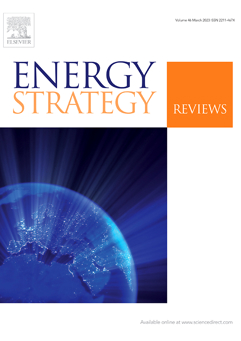
Modeling Cross-seasonal Fuel Savings From Load Shifting in the Saudi Industrial Sector and Interlinkages to Export Revenues




10 May 2023
Read More
44

In May 2022, the King Abdullah Petroleum Studies and Research Center (KAPSARC) and King Abdullah University of Science and Technology (KAUST) co-organized an event titled “Advancing the Circular Carbon Economy in Saudi Arabia.” The one-day event, which comprised a high-level event a...
Read More
51

Macroeconomic and Sectoral Effects of the Natural Gas Price: Policy Insights from a Macroeconometric Model






10 May 2023
croeconomic and sectoral assessment of the energy price reform (EPR) can provide policymakers with useful insights regarding price deregulation options. A key feature of this research that differentiates it from many other studies is its modeling framework. The framework first estima...
Read More52
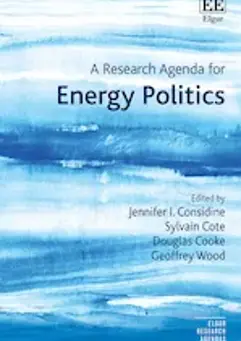
Chapter 2: Geopolitics and energy security issues in India

09 May 2023
This book chapter assesses the issues related to the Indian energy sector through a geopolitical and energy security lens, focusing on the energy access and economic drivers that have helped shape these lenses historically and their impact on the future. The energy needs of the India...
Read More35

The Rebound Effect in Residential Energy Demand: The Case of Saudi Arabia



08 May 2023
Although the rebound effect phenomenon h...th-century economist Stanley Jevons (Jevons, 1865). Jevons, in his book The Coal Question (1865), postulated that energy consumption would increase with increasing industrial efficiency as individuals produce and consume more goods.
Read More57

The COVID-19 pandemic was one of the greatest challenges of modern times. More than two years since its onset, the global oil market has yet to regain any semblance of balance or stability. The future remains extremely uncertain. The pandemic and Russian operations in Ukraine have s...
Read More
48
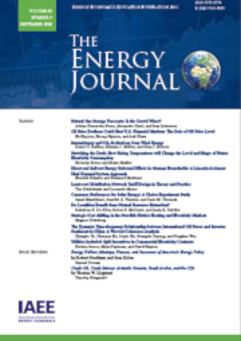
Decarbonizing the Residential Sector: How Prominent is Household Energy-Saving Behavior in Decision Making?

08 May 2023
Read More
46
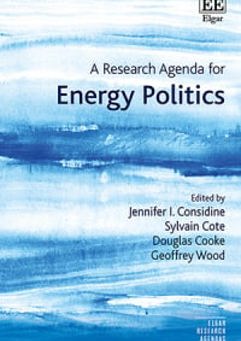
Chapter 5: China’s energy investment through the lens of the Belt and Road Initiative


01 May 2023
President Xi Jinping announced the BRI in 2013 during his official visits to Kazakhstan and Indonesia. The vision for a Silk Road Economic Belt connecting Central Asia and Europe was outlined in his speech in Kazakhstan, and the roadmap for a Maritime Silk... Click here to read the book
Read More52
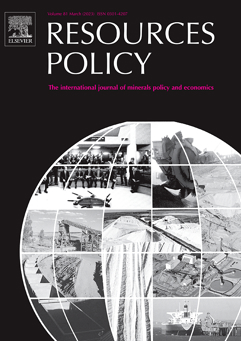
Oil Rents and Non-oil Economic Growth in CIS Oil Exporters. The Role of Financial Development

01 May 2023
Read More
43
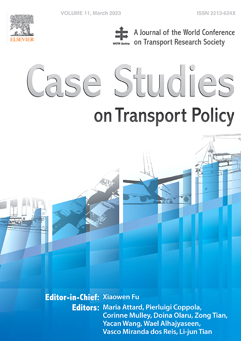
What Would it Take for the People of Riyadh City to Shift From Their Cars to the Proposed Metro?




30 April 2023
Read More
48

Exploring the Effect of a Transportation Subsidy on Saudi Arabia’s Main Labor Force Indicators


30 April 2023
As part of the strategic roadmap for Saudi Vision 2030, the Saudi Arabian government set a goal in 2017 to increase female participation in the workforce from 22% to 30%. This goal falls under objective 4, Increase Employment, of the Human Capability Development Program.
Read More46

emissions from aviation are a priority for policymakers, researchers, entities, and governments worldwide. Traditional approaches to analyzing the aviation sector must be modified because aviation practices are no longer supply driven. In fact, the recent increase in environm...
Read More48
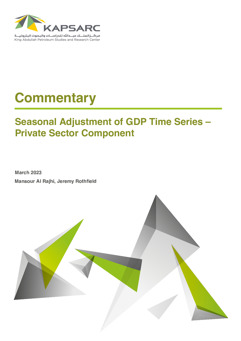
Seasonal Adjustment of GDP Time Series – Private Sector Component


09 April 2023
For analysts, the seasonal adjustment of GDP and its components is an important one to make because it enables practitioners to better understand the makeup of each individual GDP series. There may be structural and cyclical elements, as well as elements that show repeat patte...
Read More56

How Responsive Are New Car Buyers in India and China to Factors Driving Fuel Consumption?


09 April 2023
China and India, the world’s two most populous developing economies, are also among the largest automotive markets and carbon emitters. To reduce carbon emissions from the passenger car sector, both countries have considered various policy levers that affect fuel price, car pr...
Read More53

Regional Energy Cooperation: Opportunities to Enhance the Saudi-India Relationship


09 April 2023
Saudi Arabia and India, two of the fastest growing economies globally, play important roles in South Asia and the Middle East, respectively. Saudi-India relations have started to acquire a strategic dimension owing to the countries’ growing business opportunities, rising investment ...
Read More
50
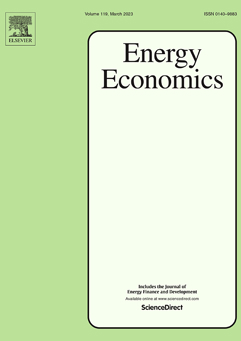
Electric Vehicle Subsidies: Time to Accelerate or Pump the Brakes?



04 April 2023
Read More
42
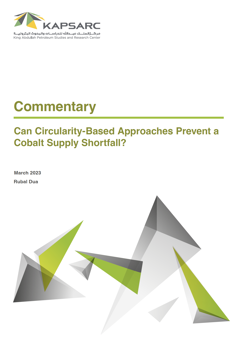
Can Circularity-Based Approaches Prevent a Cobalt Supply Shortfall?

04 April 2023
Electric vehicle batteries rely heavily on a small number of critical minerals, including cobalt. Cobalt metal prices have doubled over the past year as a result of a mismatch between supply and demand, particularly for electric car batteries (Hume 2022).
Read More
51

The Ban on Long-Term Natural Gas Contracts for the European Union: A Double-Edged Sword?

04 April 2023
Long-term natural gas contracts are necessary market instruments that provide supply security for customers and demand security for producers. Nevertheless, the European Commission recently announced a plan to ban long-term contracts for unabated fossil gas after 2049. This study sh...
Read More
52

Real Gross Domestic Income for Saudi Arabia From 1986 to 2021

04 April 2023
A country’s national income is defined as the total market value of its output. The most used measure for national income is gross domestic product (GDP). One way to estimate GDP for a country is to sum its government consumption, private consumption, investment, and exports minus i...
Read More
56

Understanding Phantom Oil
26 March 2023
Phantom oil is oil that is deliberately moved from legally recognized sources or traded in the black market. It is also frequently referred to as illegal, illicit, tacit, or unregistered oil. This oil is generally concealed from the energy community for various reasons, including to...
Read More
76

Many countries in the Middle East and North Africa (MENA) region have reinforced their interest in enhancing domestic value creation from renewable energy industries while striving to achieve their green energy transition targets. The Kingdom of Saudi Arabia has identified key...
Read More47

Hydrogen is projected to play an important role in meeting decarbonization targets. Hydrocarbon-rich countries perceive this as an opportunity to decarbonize existing assets and monetize undeveloped hydrocarbon reserves. Meanwhile, non-traditional energy exporters rich in renewable ...
Read More
47

Saudi Arabia’s Potential to Further Hydrogen Use in the Maritime Sector



21 March 2023
The United Nations Climate Change Conference (COP 26) in Glasgow focussed on advancing low-carbon fuels to reach emissions abatement targets. The conference also reaffirmed the goals of the Paris Agreement: to secure global net-zero emissions by mid-century and limit the glob...
Read More
55

Impacts of Global Climate Policies on Middle Eastern Oil Exporters: A Review of Economic Implications and Mitigation Strategies


21 March 2023
Climate policies are tightening in an effort to curb carbon dioxide emissions. As a result, global oil demand may peak and gradually decline, causing oil prices to fall. A structural fall in oil prices may have serious implications for Middle Eastern oil exporters. Many studies atte...
Read More
42

Modeling final energy demand and the impacts of energy price reform in Saudi Arabia

10 March 2023
Read More
43

Consult Within: Analyzing the Recent Decision to Localize Consultancy Professions in Saudi Arabia

09 March 2023
In October 2022, Saudi Arabia’s Ministry of Human Resources and Social Development (MHRSD) issued a decision mandating the progressive localization of consultancy professions up to 40% by the end of March 2024. Such targeted localization (or Saudization) of specific professions is no...
Read More52
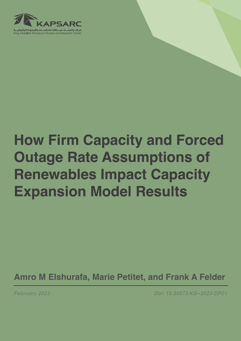
How Firm Capacity and Forced Outage Rate Assumptions of Renewables Impact Capacity Expansion Model Results



09 March 2023
The undergoing energy transition relies heavily on the deployment of renewables such as solar photovoltaic (PV) and wind power for the generation of electricity. These variable and intermittent resources would modify power systems’ reliability compared to the situation where electric...
Read More59
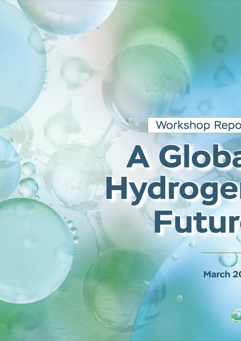
A Global Hydrogen Future
06 March 2023
-APPENDIX C3:...click here)
4. Appendix D: Workshop Presentations (click here)
5. APPENDIX E: POST-WORKSHOP SURVEY
-APPENDIX E1: EFI-KAPSARC- A Global Hydrogen Future Workshop Survey Summary (click here)
-APPENDIX E2: A Global Hydrogen Future Workshop Survey Results (click here)
50

Regional Fuel Consumption and Carbon Dioxide Emissions in Saudi Arabia: Impacts of Electricity Price Reforms



05 March 2023
Evaluating the potential outcomes of energy price reforms is essential for policymakers to assess their effectiveness. In 2016 and 2018, the Saudi government enacted two waves of energy price reforms to curb historically fast-growing electricity demand. We quantify the effects...
Read More56

Is the Recent Price Spike in Electric Vehicle Lithium-Ion Battery Packs Temporary or the Start of a New Trend?



05 March 2023
Most nations are evaluating vehicle electrification as a way to decarbonize their passenger car sectors. To make electric vehicles competitive with conventional vehicles for cost-conscious consumers, the upfront purchase price of electric vehicles needs to fall. The battery pack is t...
Read More52

Key Improvements in the Saudi Aviation Sector: Exploring the Performance of the Passenger Load Factor


05 March 2023
Aviation is a significant contributor to the global economy, given that it, directly and indirectly, contributes to jobs, tourism, trade, and countries’ gross domestic product (GDP). However, environmental issues, technological advances, consumer behavior, energy consumption, the vo...
Read More
53

India’s Long-Term Low-Carbon Development Strategy: The Decarbonization of its Road Transport Sector

05 March 2023
India submitted its long-term low-emissions development strategy (LT-LEDS) to the 27th Conference of the Parties of the United Nations Framework Convention on Climate Change (COP 27) on November 14, 2022 in Sharm El Sheikh, Egypt. The strategy sets out a detailed roadmap of India’s ...
Read More
53

The Circular Carbon Economy Index 2022 – Results



05 March 2023
The circular carbon economy (CCE) concept provides a holistic, flexible and pragmatic framework for countries to plan their energy and economic transitions to lower carbon dioxide and greenhouse gas emission levels and, ultimately, net-zero emissions. The CCE Index measures countries...
Read More46

The circular carbon economy (CCE) is an energy transition framework that is based on a holistic, technology-neutral and country context-sensitive approach to achieving net-zero emissions. It embraces all available technologies and tools, from renewable energy to carbon capture...
Read More51
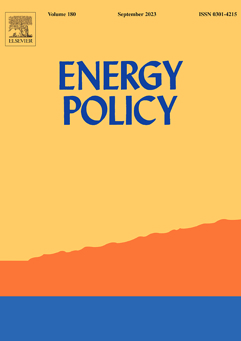
Overbuilding Transmission: A Case Study and Policy Analysis of the Indian Power Sector

02 March 2023
Read More
43

Innovation by Gulf Cooperation Council Electricity Startups: A Global Comparison


28 February 2023
The electric power sector is the cornerstone for achieving the energy transition goals of economic progress, energy security and environmental improvements. Substantial and timely innovations are necessary to accomplish these goals. In this commentary, we investigate innovations in t...
Read More52

The Stability of World Oil Markets and the Potential for Oil Shocks
27 February 2023
- How high (low) do inventories have to be before world oil market...
- What is a reliable, unbiased, way to model uncertainty in world oil markets?
- Is there a human factor in the stability of world oil markets? Has the role of policymakers changed significantly in the past decade?
Read More
50
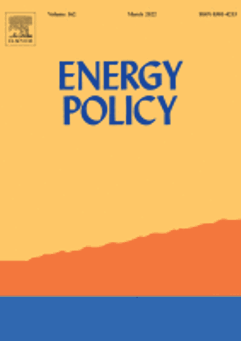
Impacts of Income Poverty and High Housing Costs on Fuel Poverty in Egypt: An Empirical Modeling Approach


27 February 2023
Read More
39
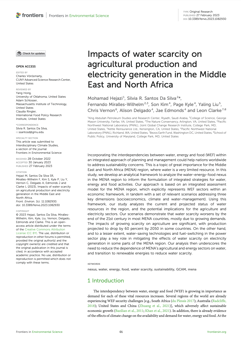
Impacts of Water Scarcity on Agricultural Production and Electricity Generation in the Middle East and North Africa

27 February 2023
Read More
41

Lessons From the European Electricity Crisis


20 February 2023
On January 23, 2023, the European Commission initiated a public consultation to reform the European Union’s electricity market (European Commission 2023) on the heels of extremely high wholesale electricity prices in Europe in the last months and days of 2022. Negative spot prices, h...
Read More53

Bans on the Sale of Gasoline- And Diesel-Powered Vehicles: Why Are Policymakers Favoring Commandand- Control to the Point of Banning, and Does It Send Unintended Policy Signals?


15 February 2023
In recent years, the adoption of command-and-control policies, from mandating sales of zero-tailpipe-emission vehicles all the way to prohibiting future sales of gasoline- and diesel-powered vehicles via tailpipe carbon dioxide (CO2) emissions standards or otherwise, has gained momen...
Read More47

Spatial Modeling of Bargaining Among Stakeholders in Energy Policy: The Case of Japanese Nuclear Plants



15 February 2023
his paper evaluates the evolving political will in Japan to restart nuclear power plants to generate electric power, in light of the country’s political and economic developments over the past few years. We apply a model of collective decision-making processes (CDMPs), using the KAPS...
Read More49
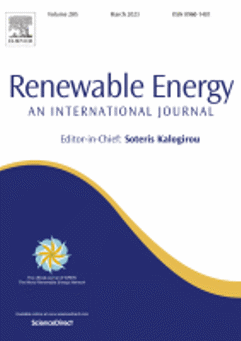
Balancing Climate Mitigation and Energy Security Goals Amid Converging Global Energy Crises: The Role of Green Investments



14 February 2023
Read More
43
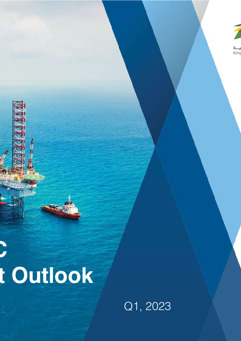
KAPSARC Oil Market Outlook (KOMO)
08 February 2023
On the demand side, seasonality tends to play an important role as it keeps oil demand growth stagnating or in decline relative to its previous quarter. However, this quarter will also witness an added layer of downward pressure as several European Union (EU) countries, among others,...
Read More53

To analyze the main factors...
To analyze the role of environmental, social, and corporate governance (ESG) scores and strategies and possible solutions that could help the oil and gas industry attract more investment and, at the same time, cope with its sustainability responsibilities.
Read More54

Cost, Footprint, and Reliability Implications of Deploying Hydrogen in Off-grid Electric Vehicle Charging Stations: A GIS-assisted Study for Riyadh, Saudi Arabia



29 January 2023
We quantify the cost, footprint and reliability implications of using hydrogen in off-grid electric vehicle charging stations (CS) using an optimization model coupled with a geographical information system (GIS) analysis for the city of Riyadh, Saudi Arabia. We also account for the c...
Read More50
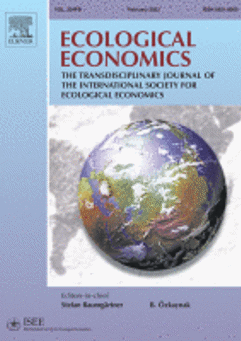
The Energy Transition and Export Diversification in Oil-dependent Countries: The role of Structural Factors

29 January 2023
Read More
44
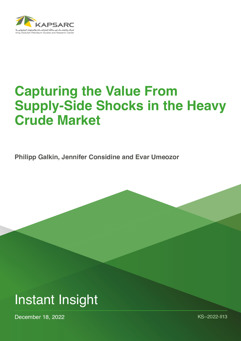
Capturing the Value From Supply-Side Shocks in the Heavy Crude Market



29 January 2023
The Russian-Ukraine conflict and sanctions on Russian crude oil flows have significantly affected world oil markets. Price volatility has increased, flows have been re-directed and there is considerable uncertainty concerning future energy policy. The implications of these changes a...
Read More
45

Oil Market Shocks and Financial Instability in Asian Countries


24 January 2023
Read More
37

The Crisis in Electricity Prices in Europe: Context and Key Insights


17 January 2023
The cost of electric power in Europe is soaring. After a steady rise in 2021, prices spiked in the first half of 2022 following the post-COVID-19 economic recovery. Day-ahead wholesale electricity prices increased more than threefold on average in 2021 compared to 2020, reachi...
Read More51

The G7 Pricing Scheme, an Exercise in Monopsony Power


17 January 2023
High in the Bavarian Alps, at a special security session, G7 leaders set out to devise an ambitious plan to sanction Russian energy sales. The intent was to reduce Russian profits from oil and gas sales, while minimizing the damage to developed economies caused by rising fuel prices ...
Read More43

Alternative Fuels for Saudi Cement Manufacturing with Time-varying Carbon Pricing


17 January 2023
After cement production in Saudi Arabia surged in the first half of the 2010s due to the country’s rapid economic development, it has slowed measurably in recent years as economic growth has declined. This is shown in Figure 1, along with the evolution of the Kingdom’s real gross do...
Read More
49

Stagflation: Should the Oil Industry Worry?


09 January 2023
Oil is an essential commodity with an almost perfectly inelastic demand, despite its volatile price. In recent months, fuel prices have declined significantly from approximately $120 per barrel (b) at the beginning of June to less than $85/b at the end of September. Experts and mark...
Read More
49
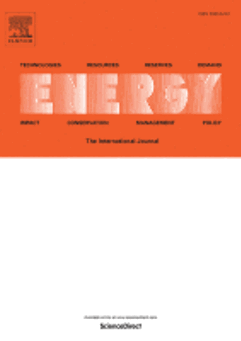
Hard-linking a Top-down Economic Model with a Bottom-up Energy System for an Oil-exporting Country with Price Controls






07 January 2023
Read More
42
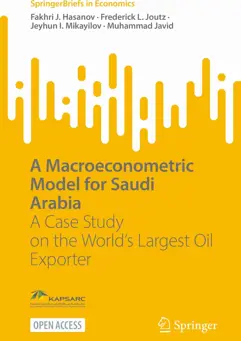
A Macroeconometric Model for Saudi Arabia: A Case Study on the World’s Largest Oil Exporter




01 January 2023
Open ... Introduces the KAPSARC Global Energy Macroeconometric Model for Saudi Arabia Combines cutting-edge econometric methods, a well-established theoretical foundation, and empirical coherence Customizable for different research and policy questions Click here to read the book
Read More48

Peak Demand-based Optimization Approach for Building Retrofits: Case Study of Saudi Residential Buildings


11 December 2022
Read More
47

Fostering Net-Zero Transition Pathways: The Role of Clean Hydrogen


08 December 2022
In early 2022, 80 countries (including Saudi Arabia), representing around 74% of global greenhouse gas emissions, pledged to reach net-zero emissions (NZE) in the coming decades. Achieving these ambitious climate policy objectives requires shifting the energy mix toward existing and ...
Read More44
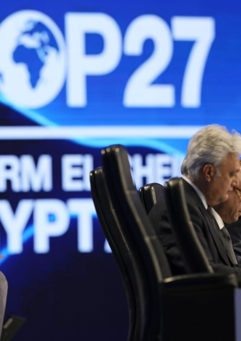
COP 27 and Different Narratives for a Net-Zero World

08 December 2022
Post-COP 27, Gulf countries have the opportunity to demonstrate a net-zero world is possible through leading by example and bringing together two competing visions of how to get there.
Read Full Report Here
0

Status of Global Concentrated Solar Power Installations

07 December 2022
Concentrated solar power (CSP) is a type of renewable energy that uses mirrors to concentrate solar irradiation onto a receiver and convert it into heat. The heat can then be used directly or indirectly for thermal or electrical applications. CSP technologies store energy, which mak...
Read More
51

Insights from India’s Journey to Over 100 Gigawatts of Renewable Energy


07 December 2022
This commentary analyzes the key industry developments, policy and regulatory features, prevailing circumstances and challenges related to renewable energy (RE) in India. It also highlights learnings for other countries. As electricity is a concurrent subject as per the Indian ...
Read More52

Saudis in the Private Sector: Women Leading the Way

07 December 2022
In Q3 2018, 30% of S...
At the beginning of the series in Q3 2018, over 75% of employed Saudi women worked in the public sector. However, in the same period Saudi female labor force participation increased from under 20% to 34% – fulfilling a major policy objective of Saudi Vision 2030.
Read More43

Gaming Out the Proposed Price Cap on Russian Oil



24 November 2022
In a June 29, 2022, communique, the G7 countries agreed to explore ways to impose a price cap on Russian oil exports. The main mechanism would be a ban on the provision of insurance, logistics and financial services by G7 nations for cargoes sold above the price ceiling. Wh...
Read More48
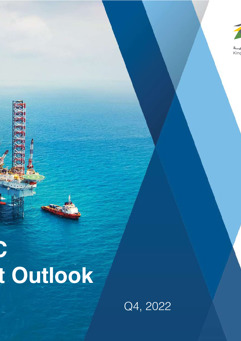
KAPSARC Oil Market Outlook (KOMO)
20 November 2022
Declining gross domestic product (GDP) growth in Q4 2022 will add downward pressure to the underlying seasonality of oil demand trends in several countries, playing an important role in oil demand declines this quarter. OECD countries in North America and Europe are expected to witne...
Read More51
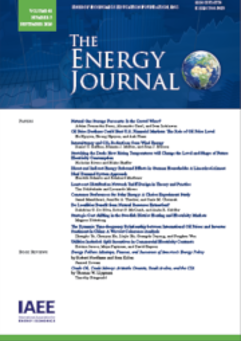
Oil Market Stabilization: The Performance of OPEC and Its Allies



15 November 2022
Read More
47

The Circular Carbon Economy Index 2022 – Results



10 November 2022
The circular carbon economy (CCE) concept provides a holistic, flexible and pragmatic framework for countries to plan their energy and economic transitions to lower carbon dioxide and greenhouse gas emission levels and, ultimately, net-zero emissions. The CCE Index measures countries...
Read More45
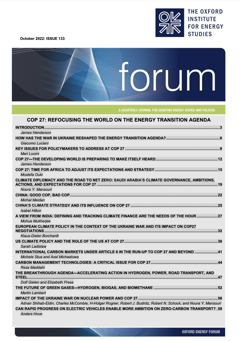
Key Issues for Policy-makers to Address at COP 27

30 October 2022
Read More
41
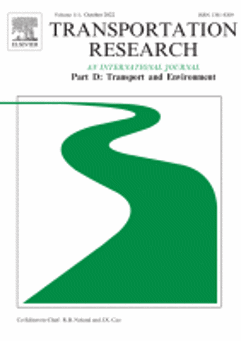
Choosing to Diet: The Impact and Cost-effectiveness of China’s Vehicle Ownership Restrictions


24 October 2022
Read More
36

Understanding the Trajectory of Urban and Transport Development in Riyadh

16 October 2022
Riyadh has been a car-oriented city since the 1950s, a trend that was compounded by the economic boom of the 1970s. Likewise, the first master plan of Riyadh, a highway-based plan prepared by Doxiadis Associates International in 1973, encouraged the continued use of pr...
Read More51

Indiaʼs Updated NDC: A Pathway to Net-Zero by 2070?


16 October 2022
This update came in the aftermath of the prime minister’s pledge at the 26th United Nations Climate Change Conference (COP 26), held in Glasgow, United Kingdom, in 2021, to reach net-zero emissions by 2070. During the conference, Prime Minister Modi went on to announce four supporti...
Read More
50

Future of Fuels in the Aviation Sector
16 October 2022
Aviation is crucial for connecting people and countries worldwide. Although aviation carriers, manufacturers, and governments have all aimed to increase energy efficiency through significant technological advances over recent decades, this transport mode has struggled to find altern...
Read More
39

How Can Governments, Oil and Gas Enterprises, and Research Institutions Collaborate to End Routine Gas Flaring?
16 October 2022
Natural gas is a feedstock for the petrochemical industry and a fuel of choice in the power sector to help transition toward clean, sustainable, and affordable energy. As vital as gas is for electricity generation, the petrochemical industry, and the transportation sector, many oil o...
Read More52

Fuel Consumption Elasticities, Rebound Effect and Feebate Effectiveness in the Indian and Chinese New Car Markets


16 October 2022
Read More
43

How Long Will the Semiconductor Crisis Affect the Traditional Automotive Sector? Implications for car fuel demand



13 October 2022
The 2020 semiconductor crisis has hit the automotive sector, as well as many other sectors. As a consequence of the COVID-19-induced shock, a worldwide semiconductor supply-demand imbalance arose between 2020 and 2022. Demand grew by around 17% annually while manufacturing capacity ...
Read More
48
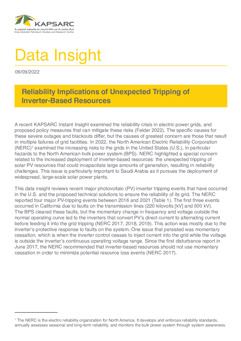
Reliability Implications of Unexpected Tripping of Inverter-Based Resources


10 October 2022
A recent KAPSARC Instant Insight examined the reliability crisis in electric power grids, and proposed policy measures that can mitigate these risks (Felder 2022). The specific causes for these severe outages and blackouts differ, but the causes of greatest concern are those that re...
Read More
49

Trends in Global Solar PV Installation in 2021

10 October 2022
In 2021, global solar photovoltaic (PV) capacity increased by a record 175 gigawatts (GW). This brought the total global cumulative installed PV capacity to around 942 GW at the end of 2021.
Read More
46

The Effects of Russian Sanctions on the Global Economy




10 October 2022
On February 24, 2022, Russia began a ‘special military operation’ in Ukraine, which quickly escalated into a militarized conflict across multiple fronts. The act drew immediate disapproval from the United Nations and led most members of the Western alliance to impose sanctions on Rus...
Read More41

Scaling up ESG finance in the Gulf: A Perspective from Saudi Arabia


05 October 2022
Financing the sustainable energy transition continues to be a global challenge given the massive investment needs associated. According to projections provided by different institutions (e.g., OECD, World Bank, and UN Environment, 2018), sev...
0
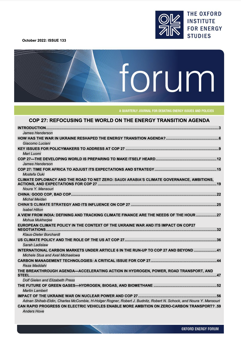
Climate Diplomacy and the Road to Net Zero: Saudi Arabia’s Climate Governance, Ambitions, Actions, and Expectations for COP 27

04 October 2022
Read More
0
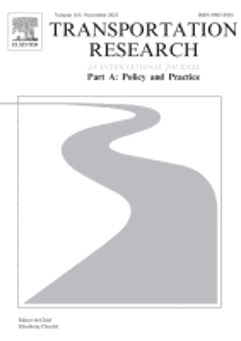
Your Mileage May Vary: Have Road-fuel Demand Elasticities Changed Over Time in Middle-income Countries?

02 October 2022
Read More
38
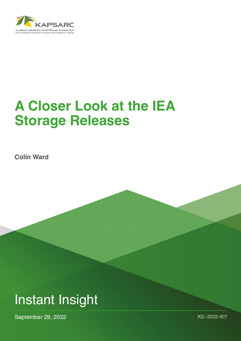
A Closer Look at the IEA Storage Releases

02 October 2022
The United States (U.S.) and its western allies have been increasing their pressure on Russia in response to the conflict in Ukraine. Undercutting Russian government finances is a priority for them. Energy exports are a key source of income for the Russian economy, and several differ...
Read More46

Integrated Oil Companies and the Quest for Energy Transition

26 September 2022
Integrated oil and gas (O&G) companies operate vertically integrated businesses that span the O&G value chain. In this way, they can leverage expertise across multiple domains rather than just focusing on exploration and production (E&P). Examples of... Read more here
Read More47
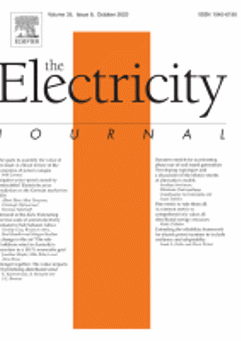
Extending the Reliability Framework for Electric Power Systems to Include Resiliency and Adaptability


25 September 2022
Read More
38
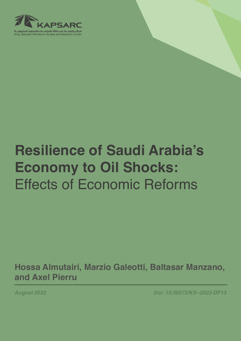
Resilience of Saudi Arabia’s Economy to Oil Shocks: Effects of Economic Reforms




23 September 2022
We assess the extent to which the implementation of Saudi Vision 2030 policies enhances the Saudi economy’s resilience to oil price and production shocks, and to the productivity of tradable and non-tradable goods. We extend Blazquez et al.’s (2021) dynamic stochastic g...
Read More48

Digital Transformation in the Context of the Energy Transition
18 September 2022
For decades, the oil and gas industry has delivered the world with the best value proposition in the forms of reliable, affordable, safe energy supplies. As global population projections soar, demand for all forms of energy is also set to rise, with hydrocarbons expected to play a do...
Read More54

Global Crude Oil Storage Index: A New Benchmark for Energy Policy



13 September 2022
The global oil market dwarfs other commodity markets. Its size and role in the energy and industrial value chains underscore its significant economic and geopolitical impacts. Thus, the consequences of oil price fluctuations extend far beyond the oil industry and can be viewed as a ...
Read More
45
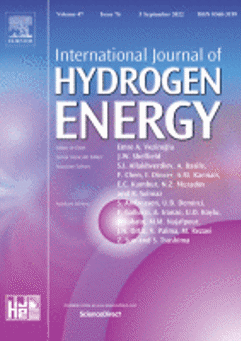
Cost, Footprint, and Reliability Implications of Deploying Hydrogen in Off-grid Electric Vehicle Charging Stations: A GIS-assisted Study for Riyadh, Saudi Arabia



11 September 2022
Read More
41

Cost, Emission, and Macroeconomic Implications of Diesel Displacement in the Saudi Agricultural Sector: Options and Policy Insights





11 September 2022
Read More
39

Digital Transformation in the Oil and Gas Industry: Hype or Hope?


11 September 2022
For decades, the oil and gas (O&G) industry has provided the globe with the best value proposition in the form of reliable, affordable, and safe energy supplies. As global population projections soar, demand for all forms of energy is also set to rise, with hydroc...
Read More
54

The impact of fiscal policy on non-oil GDP in Saudi Arabia




09 September 2022
Read More
49
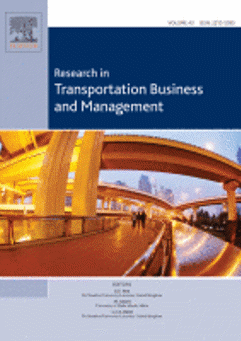
Impact of the COVID-19 Pandemic on Road Freight Transportation – A Colombian Case Study

07 September 2022
Read More
45
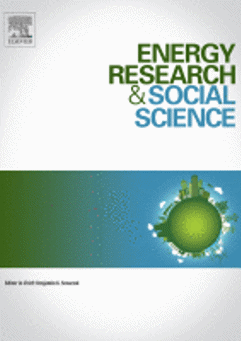
Implications of Poorly Designed Climate Policy on Energy Poverty: Global Reflections on the Current Surge in Energy Prices

06 September 2022
Read More
42
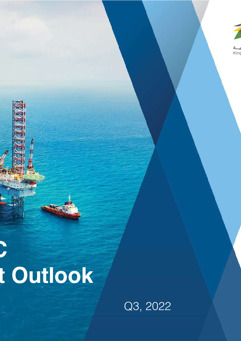
KAPSARC Oil Market Outlook (KOMO)
06 September 2022
Despite great uncertainty in oil markets, a reduction in expected supply from Russia, and a reduction in global demand since our previous quarterly outlook, we expect oil supply growth to continue in 2022, with production coming close to parity with demand in 2022 and exceeding ...
Read More56
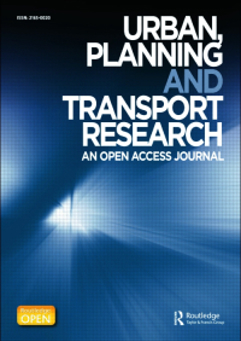
Urban Transport Energy Demand Model for Riyadh: Methodology and a Preliminary Analysis






05 September 2022
eq annually by 2030 through Nationally Determined Contribution (NDC) to UNFCCC. Among many policies, mass transit system and transit-oriented development are being developed with the expectation to reduce energy consumption and GHG emissions in Riyadh. To what extent such initiative ...
Read More47
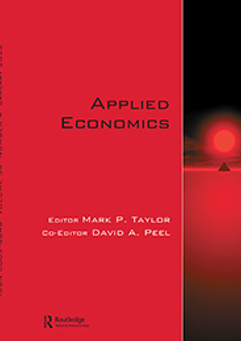
Labour Productivity Growth and Convergence in Manufacturing: A Nonparametric Production Frontier Approach

01 September 2022
Read More
43
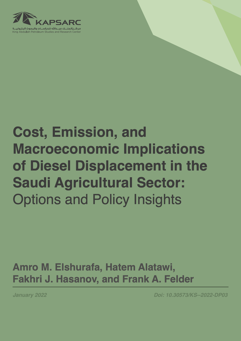
Cost, Emission, and Macroeconomic Implications of Diesel Displacement in the Saudi Agricultural Sector: Options and Policy Insights




24 August 2022
The Saudi agricultural sector relies on diesel for irrigation, which is provided to farmers at a much lower price than the average global price, implying significant opportunity costs. With the aid of soft-coupled power and macro-econometric models, we assess the cost and macroeconom...
Read More50

Keeping the Nuclear Energy Option Open






23 August 2022
Nuclear energy is already playing a crucial role in reducing emissions from electricity generation. However, if this role is not expanded, achieving the international goal of avoiding unacceptable global climate change will be extremely difficult. The evidence presented in this study...
Read More44

Investment Challenges Affecting the Oil and Gas Industry


22 August 2022
The unprecedented crisis generated by the COVID-19 pandemic has affected the investment in the oil and gas sector, which was already suffering from low investment levels, among other reasons due to the climate change misconceptions. This report analyzes the main challenges negatively...
Read More46
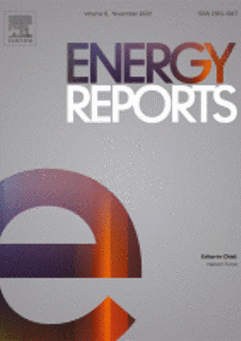
Contextualizing Uncontrolled Oil Trade Flows: A Novel Categorization




02 August 2022
Read More
48
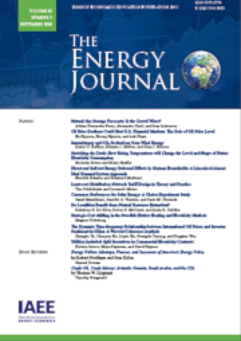
How Cost-effective are Electric Vehicle Subsidies in Reducing Tailpipe-CO2 Emissions? An Analysis of Major Electric Vehicle Markets



24 July 2022
Read More
48
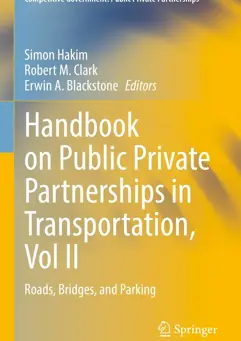
PPPs in Colombia: Policy Lessons

22 July 2022
Latin American countries have introduced private participation in the transport sector to decrease the economic resources spent in projects’ time line. This private participation has also increased the development of corridors in which governments have... Read Book Chapter
Read More49
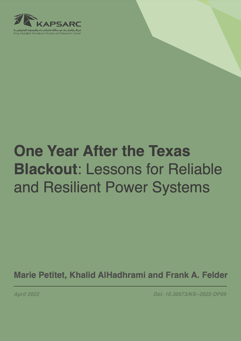
One Year After the Texas Blackout: Lessons for Reliable and Resilient Power Systems



14 June 2022
In February 2021, Texas experienced an extreme cold snap causing a dramatic electricity blackout that left millions of households without electricity, resulting in over 200 fatalities and economic damages of approximately $100 billion. The Texas blackout has been used to support a va...
Read More56

Investing in Net-Zero Emission Ambitions: Global ESG Frameworks and CCUS Projects


14 June 2022
Achieving global net zero emission (NZE) goals necessitates trillions of US$ of annual investment in various mitigation technologies. While a significant portion of this investment is expected to take place in mainstream mitigation technologies (e.g., renewable energy), low carbon te...
Read More52

The Gulf Cooperation Council and the Circular Carbon Economy: Progress and Potential



14 June 2022
Over the past year, all six Gulf Cooperation Council (GCC) countries have updated their medium-term greenhouse gas (GHG) emission targets by submitting revised nationally determined contributions (NDCs) under the Paris Agreement. Bahrain, Saudi Arabia, the United Arab Emirates (UAE),...
Read More46
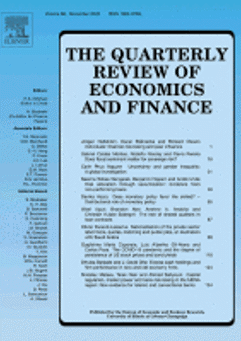
Nationalization of the Private Sector Labor Force, Quotas, Matching and Public Jobs, an Illustration with Saudi Arabia

12 June 2022
Read More
43

Policy Responses to the Reliability Crisis in the Power Grid

06 June 2022
From China, Europe, Central Asia, India and to the United States, there is a reliability crisis in electric power grids. Why are power grids so brittle and what should policymakers do?
Read More47

A Remaining Piece of the COVID-19 Puzzle: Saudi Arabia’s Remittances Account



30 May 2022
It has been two years since the beginning of COVID-19, a one-of-a-kind crisis in recent history. The global economy was disrupted entirely in a few months and most economies faced shutdowns. While many disruptions can be explained, especially the economic disruptions, parts of the pu...
Read More47
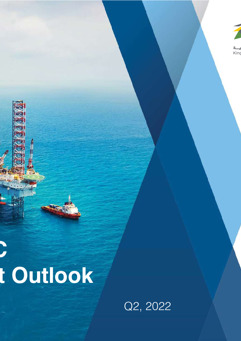
KAPSARC Oil Market Outlook (KOMO)
30 May 2022
The drivers of this quarter’s global demand outlook stem from multiple factors (i.e., the Russian-Ukrainian conflict, lower trade confidence, the U.S. Federal Reserve’s interest rate hike, overall downward gross domestic product (GDP) revisions, continued inflati...
Read More56

How to Mitigate Transportation Emissions in Saudi Arabia? The Role of Energy Price Governance



29 May 2022
In light of Saudi Arabia’s recent energy-pricing ...2) emissions in the transport sector. We employed a battery of econometric techniques to analyze the long-run relationships between income, fuel prices, energy share, population, and total carbon emissions in the transportation sector.
Read More50

Current and Future Trends in Saudi Arabia’s Container Throughput




25 May 2022
The maritime sector is a key pillar for the diversification of the Kingdom of Saudi Arabia’s economy, and it has been prioritised by the Saudi government due to its strategic importance. Saudi Vision 2030 has set a target for making KSA a global logistics hub. Correspondingly, the Ki...
Read More54

The Current State and Future of Clean Hydrogen Projects Worldwide

25 May 2022
This data insight reviews clean hydrogen projects worldwide that are listed in the Hydrogen Projects Database of the International Energy Agency (IEA 2021), which covers hydrogen projects for “energy or climate change mitigation purposes” based on electrolysis, fossil fuels with carb...
Read More46

The Implications for the Power Sector from Innovation by Startup Companies


25 May 2022
We compiled a multi-regional database of 320 startups from 36 countries whose focus is on new technologies in the electricity sector. To reach this number, we performed internet searches with neutral key words such as ‘startups,’ ‘electricity,’ ‘innovation,’ and avoided search...
Read More46

Post-Covid Recovery of Air Traffic in Saudi Arabia




25 May 2022
The dramatic drop in air traffic caused by the COVID-19 pandemic and the related travel restrictions has significantly impacted the aviation industry in Saudi Arabia and around the world. The sector has suffered considerable losses due to the reduction in passenger traffic.
Read More54
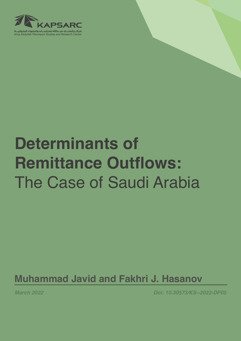
Determinants of Remittance Outflows: The Case of Saudi Arabia


22 May 2022
International labor migration has played a key role in the development of both advanced and developing countries. Many developing countries in Asia have relied on labor migration, mainly to the oil-rich Gulf region, to reduce both unemployment and poverty (Naseem 2007). Mansoor and Q...
Read More51
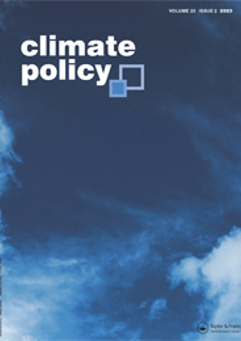
Saudi Arabia’s Climate Change Policy and the Circular Carbon Economy Approach





22 May 2022
Read More
55
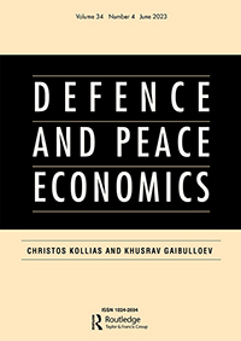
Unintended Transnational Effects of Sanctions: A Global Vector Autoregression Simulation



15 May 2022
Read More
37

Understanding the Dynamics of Renewable Energy Transition: Country Performance and Potential

11 May 2022
Renewable energy (RE) is a vital stream of the global energy transition toward sustainable alternatives. Various mitigation strategies, such as enhancing energy efficiency, utilizing fuel switching, deploying nuclear power and adopting carbon capture, have been developed. Of these, R...
Read More47

Understanding the Dynamics of the Renewable Energy Transition: The Determinants and Future Projections Under Different Scenarios

11 May 2022
The global energy system’s current structure has severe environmental consequences that necessitate an urgent transformation toward more sustainable alternatives. Besides many available mitigation actions, such as enhancing energy efficiency, deploying nuclear energy, switchin...
Read More44

Moving Saudi Arabia’s Role in the Global Methane Pledge Forward



08 May 2022
In our previous Instant Insight, The Global Methane Pledge: What It Means for the Oil and Gas Industry Post-COP26, we shed light on the increased momentum behind the issue of methane emissions and how it is taking center stage in major climate change forums. As of the time of writing...
Read More55

The European Energy Collapse: A Chain of Contingencies or a Recurring Nightmare?


20 April 2022
Choosing to rely exclusively on renewable energy sources (RES) and eliminating hydrocarbons can lead to significant difficulties for an energy system. Challenges may arise when energy storage is insufficient to guarantee a stable power supply. The lack of suitable technologies...
Read More45

Impact of Stay-home Orders on the Electricity Demand of Residential Buildings: Case Study of Saudi Arabia


14 April 2022
The analysis presented in this paper evaluates the impact of the COVID-19 stay-home order (or lockdown) on electricity consumption among Saudi residential building stock. Our analysis is based on an assessment of monitored data obtained for a sample of housing units as well as the re...
Read More53

Cross-seasonal Fuel Savings from Load Shifting in the Saudi Industrial Sector




11 April 2022
Load shifting, that is, moving demand from peak to off-peak hours, is an important type of demand response. It can reduce the overall operating costs of a power system and improve the reliability of the power grid. This study estimates the financial implications of load...
Read More54
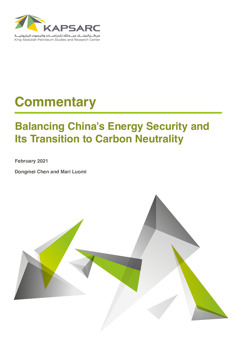
Balancing China’s Energy Security and Its Transition to Carbon Neutrality


10 April 2022
At the United Nations (UN) General Assembly’s seventy-fifth session held on September 20, 2020, Chinese President Xi Jinping pledged that China would reach peak carbon emissions before 2030 and achieve carbon neutrality by 2060. This is seen as a significant step in the global effort...
Read More45
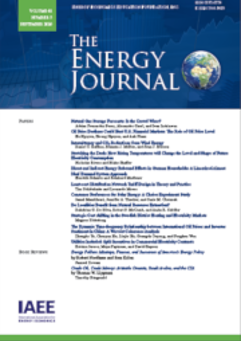
Revisiting Energy Subsidy Calculations: A Focus on Saudi Arabia


07 April 2022
Read More
46

Role of Energy Efficiency in Designing Carbon-neutral Residential Communities: Case Study of Saudi Arabia


03 April 2022
This study focuses on the impact of improving the energy efficiency of housing units on the design of carbon-neutral grid-connected residential communities in Saudi Arabia. Particularly, it examines the efficacy of both photovoltaic systems and wind turbines as on-site renewable powe...
Read More51

Plastics in the Circular Carbon Economy
28 March 2022
Plastics are a critical category in the chemicals value chain and have helped shape the modern economy. The COVID-19 pandemic has demonstrated the importance of plastics in people’s lives. Throughout the international community, the demand for plastic has surged during the pandemic o...
Read More47
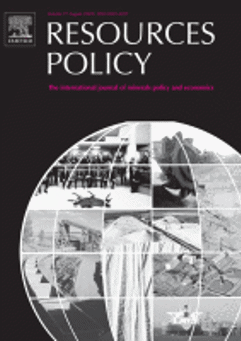
Inventories and the Term Structure of Oil Prices: A Complex Relationship



27 March 2022
Read More
40

Understanding the Willingness to Make the Modal Shift to the New Metro in Riyadh

27 March 2022
Riyadh, Saudi Arabia’s capital and main financial hub, is currently facing substantial urban growth pressures. The city suffers from serious traffic congestion, especially at peak hours. Owing to the city’s high level of urbanization, travel demands are expected to increase. This dem...
Read More61
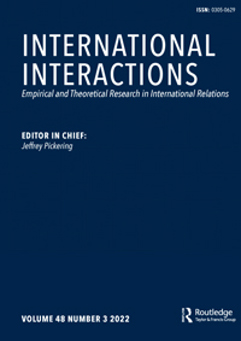
Documenting Energy Flows between States: The Global Energy Relations Dataset (GERD), 1978–2014


23 March 2022
Read More
42

Achieving Renewable Energy Targets Without Compromising the Power Sector’s Reliability



22 March 2022
Saudi Arabia’s Ministry of Energy has set ambitious renewable energy goals. Although the Kingdom’s current energy mix is dominated by conventional energy (>95%), it aims to draw 50% of its energy from renewable sources by 2030. Currently, the Kingdom enjoys very high solar photovo...
Read More45

Potential implications of the EU Carbon Border Adjustment Mechanism


22 March 2022
From 2023 onward, the European Union’s (EU’s) Carbon Border Adjustment Mechanism (CBAM) will require importers to declare the embedded carbon emissions of electricity, iron, steel, aluminum, cement and fertilizers. The CBAM will ultimately transition into a carbon import tax, with th...
Read More50

Cooperate or Compete? Insights from Simulating a Global Oil Market with No Residual Supplier






22 March 2022
Read More
43

Renewable Energy Development in the Gulf Cooperation Council Countries: Status, Barriers, and Policy Options


06 March 2022
Read More
39

Why is the EU Carbon Price at a Record €60 per Tonne?


01 March 2022
Carbon prices soared above €60/tonne for the first time on August 30, 2021, with the expectation of tightened environmental legislation. These prices made a new record on the European Union Emission Trading System (EU ETS), the European Union’s carbon market. The stress...
Read More44

How Realistic Is Hydrogen for Electrification?


01 March 2022
Hydrogen has gained considerable global support in the energy policy discourse on how to meet decarbonization targets. Due to its clean-burning properties and versatility, hydrogen is being examined as an alternative fuel source to reduce greenhouse gas (GHG) emissions ...
Read More49

The Economics and Resource Potential of Hydrogen Production in Saudi Arabia


01 March 2022
Energy transition discussions, policymakers are increasingly viewing hydrogen as a preferred emissions-free substitute for oil, natural gas and coal in hard-to-abate sectors. However, hydrogen is not a primary energy source but rather is a carrier of energy. Many factors, including i...
Read More68

Understanding the Dynamics of the Renewable Energy Transition: A Determinant Index Approach

28 February 2022
Renewable energy is a key component of global energy transitions. To better identify its dynamics, this study constructs a composite index to measure countries’ renewable energy transition potential. Based on two decades of academic research, we identify 45 main enabling factors of t...
Read More50

Integrated Oil Companies and the Requiem for a Transition: How Are They Coping with Climate Change?


28 February 2022
Integrated oil and gas (O&G) companies operate vertically integrated businesses that span the O&G value chain. In this way, they can leverage expertise across multiple domains rather than just focusing on exploration and production (E&P). Examples of such companies includ...
Read More44
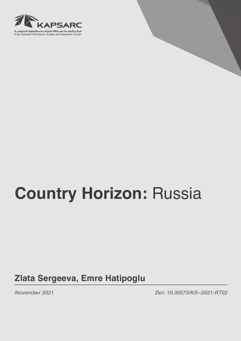
Country Horizon: Russia


28 February 2022
This report provides an up-to-date overview of Russian domestic and foreign policy issues related to the oil and natural gas markets. We also discuss the potential role of hydrogen in Russia’s short-term energy strategy. We present a succinct overview of the domestic de...
Read More52

COP 26 Outcomes and Opportunities for Saudi Arabia and Other Arab Countries

13 February 2022
The 2021 Glasgow Climate Change Conference, also known as COP 26, took place at a difficult juncture. Countries are still struggling with the COVID-19 pandemic and its economic consequences. The concentrations of greenhouse gases (GHGs) in the atmosphere continue to rise, and extreme...
Read More47
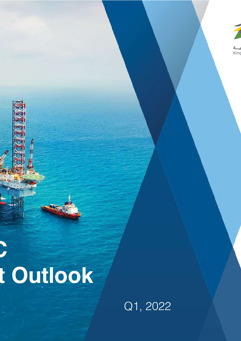
KAPSARC Oil Market Outlook (KOMO)
13 February 2022
The drivers of this quarter’s global demand outlook stem from multiple factors (i.e., a slower roll-out of vaccinations in developing countries, multiple continued lockdowns in several countries due to fears of the COVID-19 omicron variant, a slowdown in long-haul travel, rising infl...
Read More47

The Role of Building Energy Efficiency in Shaping the Energy Transition in Saudi Arabia: Key challenges and initiatives


08 February 2022
This commentary discusses a crucial topic that has emerged in the policy and economic literature in recent years: the potential role of energy efficiency in the current energy transition. It provides a straightforward analysis of the prominent role that residential energy efficiency ...
Read More54

Sectoral Investment Analysis for Saudi Arabia




07 February 2022
Read More
40
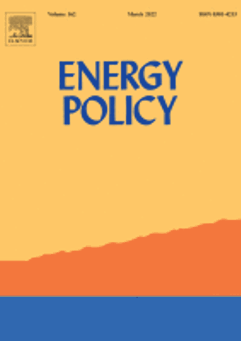
Mapping and Understanding the Drivers of Fuel Poverty in Emerging Economies: The Case of Egypt and Jordan

02 February 2022
Read More
38

Natural Gas Price Surge: Implications for International Energy Markets and the Way Forward


24 January 2022
As the Northern Hemisphere has moved into winter, the current worldwide surge in energy prices has raised fears of an energy crisis with serious implications. The focus of this brief Instant Insight is twofold. First, we provide a brief overview of the current energy market. W...
Read More45

The Global Methane Pledge: What It Means for the Oil and Gas Industry Post-COP26

13 January 2022
After two weeks of climate negotiations in Glasgow, the 2021 U.N. Climate Change Conference of the Parties (COP26) concluded successfully. Representatives of nearly 200 nations agreed to well over 50 decisions (some of which have been pending since COP24), keeping the implementation ...
Read More48
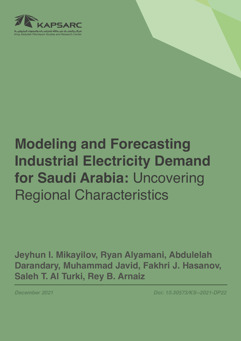
Modeling and Forecasting Industrial Electricity Demand for Saudi Arabia: Uncovering Regional Characteristics







13 January 2022
The objective of this study is to investigate Saudi Arabia’s industrial electricity consumption at the regional level. We apply structural time series modeling to annual data over the period of 1990 to 2019. In addition to estimating the size and significance of the price and income ...
Read More62

Energy Open Data, Energy Policy Scenario Models and Tools
06 January 2022
The workshop brought together over 40 experts from research, academia, government and industry to exchange ideas and experiences around the theme of open data for the energy sector. Participants discussed obstacles for Saudi Arabia, including the limited availability of open source d...
Read More47
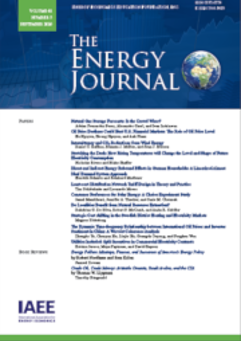
Energy Transition in Saudi Arabia: Key Initiatives and Challenges


01 January 2022
Read More
47
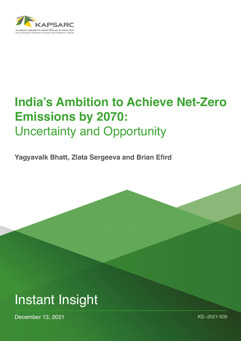
India’s Ambition to Achieve Net-Zero Emissions by 2070: Uncertainty and Opportunity



29 December 2021
The special report by the Intergovernmental Panel on Climate Change (IPCC) on the impacts of global warming of 1.5 degrees Celsius (°C) above pre-industrial levels highlighted the importance of achieving net-zero emissions or a carbon-neutral future. There has subsequently been growi...
Read More52

The Circular Carbon Economy Index 2021 – Results



29 December 2021
There is an urgent need to align global carbon dioxide and other greenhouse gas emissions with climate-safe trajectories. A broad range of technologies and approaches are needed to achieve this cost-effectively and equitably. The circular carbon economy (CCE) concept provides a holis...
Read More48

Renewables, Reliability and Efficiency in Electricity Markets


29 December 2021
The choice to use electricity markets to transition to an ultra-high renewable electricity sector depends on whether a high level of reliability and efficiency can be achieved. This study presents a reliability, resiliency and adaptability policy framework for a liberalized po...
Read More56

What Drove Saudi Arabia’s 2020 Fall in CO2 Emissions?




29 December 2021
In June 2021, the energy data provider Enerdata released its initial estimates f...2) emissions. The data indicate that the Kingdom’s CO2 emissions from fuel combustion decreased by 3.3%, from 508.3 million tonnes of CO2 (MtCO2) in 2019 to 491.8 megatonnes of CO2 (MtCO2) in 2020.
Read More49

Saving Costs and Emissions by Reforming Electricity Prices in Saudi Arabia: A Counterfactual Assessment



23 December 2021
Electricity price reforms are generally regarded as a mechanism to reduce distortions in energy markets, improve energy efficiency, and increase government revenue. However, an additional co-benefit of such policy measures is lowering greenhouse gas (GHG) emissions.
Read More59

Cost-Effectiveness of Energy Efficiency and Renewable Energy Technologies for Reducing Peak Demand


22 December 2021
This paper describes an optimization-based approach to evaluate measures providing peak electricity demand reduction cost benefits for Saudi residential buildings. These measures can be categorized as energy efficiency (EE) and renewable energy (RE) measures. Specifically, this paper...
Read More45

The Implications of Soaring Gas and Coal Prices on Europe’s Energy Poverty Trap

15 December 2021
With the recovery of the world economy following the easing of restrictions designed to contain COVID-19, energy demand has surged even as natural gas stocks were dangerously low. This triggered one of the first significant energy shocks of the green era and exposed the fragilities o...
Read More51

How Do Bankruptcies in the Shale Sector Induce Operators to Focus on Value Creation?

09 December 2021
Between January 2015 and early 2021, about 76 of the approximately 2,160 small-to-medium independent companies in the tight oil sector filed for Chapter 11 protection. These filings mostly occurred in 2016 and 2019. These companies were negatively impacted by th... Read more here
Read More52
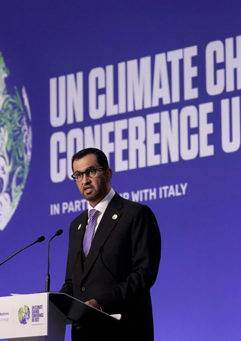
From the Year of Climate Ambition to Action in the Gulf

08 December 2021
For Gulf countries, 2021 was the year of ambition and new climate targets, and 2022 will be the year of implementation.
Read Full Report Here
0

Aviation Fuel Consumed and Passengers Carried in Saudi Arabia



07 December 2021
The air transport sector in Saudi Arabia has an important impact on the economy (e.g., job creation, gross domestic product, and gross value added). Over 690 routes are registered in the Kingdom of Saudi Arabia for both domestic and international travel. There are currently 141 domes...
Read More53

Residential Energy Model for Evaluating Energy Demand and Energy Efficiency Programs in Saudi Residential Buildings

07 December 2021
Read More
36

Theoretical framework for industrial energy consumption revisited: The role of demographics

30 November 2021
Read More
45

Why are European Wholesale Electricity Prices Soaring?


23 November 2021
Since the beginning of summer 2021, European wholesale electricity prices have been soaring to historic highs. The average day-ahead price of electricity for central European countries more than doubled between June and September, reaching 170 euros per megawatthour (e/MWh) on...
Read More51
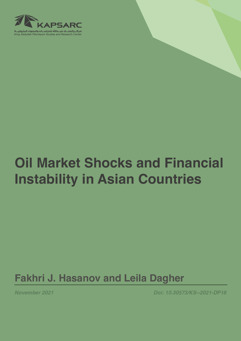
Oil Market Shocks and Financial Instability in Asian Countries


23 November 2021
There is no commodity whose interlinkages with the macroeconomy have been studied as extensively as oil, starting with Hamilton’s (1983) seminal study. Thousands of subsequent studies have examined the relationship between oil prices and various economic variables, including the stoc...
Read More54
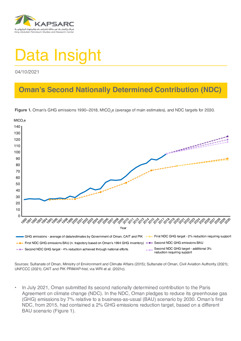
Oman’s Second Nationally Determined Contribution (NDC)


23 November 2021
In July 2021, Oman submitted its second nationally determined contribution to the Paris Agreement on climate change (NDC). In the NDC, Oman pledges to reduce its greenhouse gas (GHG) emissions by 7% relative to a business-as-usual (BAU) scenario by ...
Read More71

The Sensitivity of Oil Price Shocks to Preexisting Market Conditions: A GVAR Analysis



11 November 2021
This study develops a Global Vector Autoregression (GVAR) model to simulate various types of shocks to oil markets and to see whether such shocks are time-sensitive in oil markets. Our model extends the canonical Mohaddes and Pesaran (2016) model temporally (to 2018Q3), spatial...
45

The Impact of Total Factor Productivity on Energy Consumption: Theoretical Framework and Empirical Validation


10 November 2021
Read More
38

Will COP26 Recognize a Role for Nuclear Energy in the Clean Energy Mix?


04 November 2021
Next month, the 2021 United Nations Climate Change Conference (COP26), hosted by the United Kingdom, will discuss the big challenge facing the world’s governments, which is how to limit the average rise in global temperatures above pre-industrial levels to below 1.5–2 degrees Celsius...
Read More50
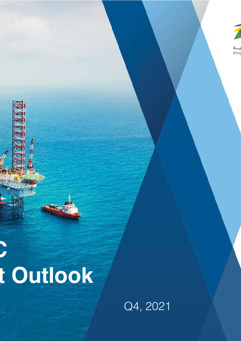
KAPSARC Oil Market Outlook (KOMO)
04 November 2021
The drivers of this quarter’s global demand outlook stem from multiple factors (i.e., a slower roll-out of vaccinations in developing countries, multiple continued lockdowns in several countries, rising inflation, including shipping costs, lagging delivery times, the usual sea...
Read More47

How the Circular Carbon Economy Index Can Serve Policymaking: Case Study of Saudi Arabia



02 November 2021
The Circular Carbon Economy (CCE) Index is a tool developed by KAPSARC for energy and climate policymakers and stakeholders to quantify and compare country performance and potential on the CCE. The CCE is a relatively new concept. It aims to draw attention to the need to address carb...
Read More48

The Circular Carbon Economy Index 2021 – Methodology



02 November 2021
The Circular Carbon Economy Index (CCE Index) aims to measure countries’ progress in and potential for achieving circular carbon economies (CCEs). The CCE Index is based on two sub-indices: one for measuring countries’ current performance in the various dimensions of the CCE and the ...
Read More55

Volatility, Contango, and Crude Oil Inventories: A Complex Relationship



01 November 2021
Read More
39

The Role of Residential Energy Efficiency in Shaping the Energy Transition in Saudi Arabia: Key Challenges and Initiatives


01 November 2021
Read More
46

Potential Trip Coverage of the Proposed Public Transport Network in Riyadh


01 November 2021
Read More
34

Impact of Stay Home Living on Energy Demand of Residential Buildings: Case Study of Saudi Arabia


26 October 2021
The analysis presented in this paper evaluates the impact of stay-home order on the energy consumption of Saudi residential building stock. The analysis combines monitored data obtained for a sample of housing units as well as the results Residential Energy Model (REEM). In particula...
Read More42

China’s BRI and Saudi Vision 2030: A Review to Partnership for Sustainability

24 October 2021
This study reviews the comprehensive strategic partnership between Saudi Arabia and China and the interconnection between China’s Belt and Road Initiative (BRI) and Saudi Vision 2030. These connections have significantly improved cooperation in trade, investment, energy and new techn...
Read More49

Modeling World Oil Market Questions: An Economic Perspective


17 October 2021
The choice of a modeling approach is driven by the oil policy or market question that needs to be addressed. We provide the non-modeling community with insightful information on oil market models, shedding light on the economic interpretation of technical aspects (such ...
Read More36

Sustainable Transport in Riyadh: Potential Trip Coverage of the Proposed Public Transport Network


13 October 2021
The transport sector has always had high energy demand and is a significant contributor to greenhouse gas (GHG) emissions and climate change. To improve energy efficiency and reduce GHG emissions, Riyadh is introducing an integrated public transport system. Per capita e...
Read More52

Long-term electricity demand projections are fundamental for power generation expansion planning and for broader energy policy formulation. Studies show that electricity demand in Saudi Arabia and the GCC region has been growing rapidly over the past decades. This growth has s...
Read More54
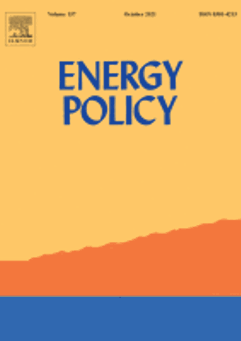
An Economic Analysis of Gas Pipeline Trade Cooperation in the GCC



11 October 2021
Read More
44

Building Back Better in Saudi Arabia With Energy Efficiency







05 October 2021
The first priority for governments in managing the COVID-19 crisis is the health of their citizens. However, the implementation of restrictions on activity necessary for limiting the spread of the disease has caused the greatest global recession since the Great Depression. Many gover...
Read More48

Barriers to and Opportunities for Light-Duty Vehicle Electrification in India: Insights From a Survey of Experts




05 October 2021
According to the World Health Organization, India has the world’s worst air quality. Among other factors, vehicular pollution from the increasing stock of passenger vehicles has contributed to India’s deteriorating air quality. This increasing stock is also a factor in India bec...
Read More51

Implications of the 2021 Iran-China Deal for the Oil Market


05 October 2021
In late March 2021, China and Iran signed a cooperation pact to stimulate investments in Iran’s oil, gas and petrochemical infrastructure. We refer to this pact as the ‘Iran-China deal’ throughout this manuscript. This deal attracted substantial attention for its effects on global oi...
Read More50

Countries’ Progress and Enablers for Circular Carbon Economies
05 October 2021
The circular carbon economy (CCE) is a new concept, developed in detail by Saudi scholars and stakeholders since 2019 and promoted via Saudi Arabia’s Group of Twenty (G20) presidency in 2020. The CCE is conceptualized as an economy in which atmospheric carbon dioxide emissions...
Read More49

Flight and Passenger Flows in Saudi Arabia


28 September 2021
The Kingdom of Saudi Arabia (KSA) has four major international airports. They are King Khalid International Airport (RUH), King Abdulaziz International Airport (JED), King Fahd International Airport (DMM) and Prince Muhammed Bin Abdulaziz International Airport (MED). Before th...
Read More51

How Can Energy Storage Catalyze the Electricity Policies of Gulf Cooperation Council Members? Issues and Options



27 September 2021
Saudi Arabia and other Gulf Cooperation Council (GCC) members are working in parallel to reform their electricity markets and achieve ambitious renewable energy deployment goals. The motivation for this agenda is multifaceted, and increasing economic efficiency is one of several reas...
Read More49

A Saudi Perspective on COP26 and Current Initiatives


26 September 2021
The 26th Conference of the 197 Parties (COP) who make up the UN Framework Convention on Climate Change will take place in Glasgow, Scotland, from 1 to 12 November 2021. Negotiations will be conducted in the shadow of the dire conclusions reached by the Intergovernmental Panel on Clim...
Read More38
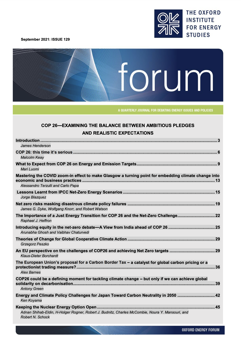
What to Expect from COP 26 on Energy and Emission Targets

15 September 2021
This short article, written upon invitation for the Oxford Energy Forum, unpacks how the UNFCCC deals with energy and net-zero targets – and how it doesn’t – and what this means for COP 26.
Read More
0

Resilient Cities in the Gulf Cooperation Council
14 September 2021
KAPSARC hosted a webinar, “Resilient Cities in the Gulf Cooperation Council,” on July 20, 2020, to discuss the relationships between governmental leads and non-governmental capabilities to support risk mitigation policy formulation. The webinar drew global participants from diverse s...
Read More49

Projecting Saudi Sectoral Electricity Demand in 2030 Using a Computable General Equilibrium Model


09 September 2021
Projecting future demand for electricity is central to power sector planning, as these projections inform capacity investment requirements and related infrastructure expansions. Electricity is not currently economically storable in large volumes. Thus, the underlying drivers of elect...
Read More51

Keeping the Nuclear Energy Option Open

01 September 2021
Read More
50
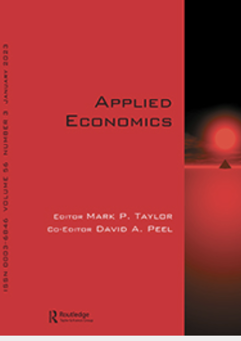
Sectoral Employment Analysis for Saudi Arabia



26 August 2021
Read More
38

Climate and Power System Reliability in the Aftermath of the Texas Blackouts




25 August 2021
The February 2021 blackout in Texas underscored the importance of reliable and resilient power systems. In this commentary, we discuss the roles of regulators, markets, fuel and generation supply chains, and interdependent infrastructures, and finds that they need to be reconsidered ...
Read More45
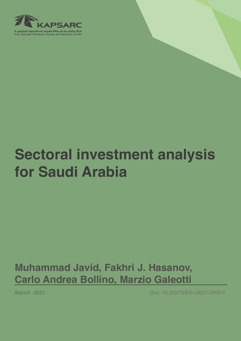
Sectoral Investment Analysis for Saudi Arabia




24 August 2021
This study aims to investigate the determinants of short- and long-run investment behavior in Saudi Arabia for eight non-oil sectors. Saudi Arabia is currently proceeding with its historic Vision 2030 reform plan, which aims to significantly increase the private sector’s contribution...
Read More48

Saudi Non-oil Exports Before and After COVID-19: Historical Impacts of Determinants and Scenario Analysis



24 August 2021
The diversification of the non-oil sector, including its exports, is at the core of Saudi Vision 2030. This study investigates Saudi non-oil exports in a novel way. Specifically, it differs from previous studies on this topic owing to its modeling framework. This study’s modeling fra...
Read More43

Are Consumers Myopic About Future Fuel Costs? Insights from the Indian two-wheeler market




24 August 2021
India has the world’s third highest carbon dioxide (CO2) emissions, after China and the United States. The transportation sector is the third largest contributor to carbon dioxide emissions in India, accounting for roughly 11% of all carbon dioxide emissions ...
Read More50
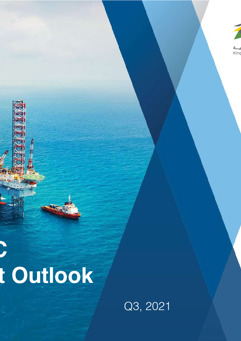
KAPSARC Oil Market Outlook (KOMO)
22 August 2021
The drivers of this quarter’s significant demand growth will be the reopening of COVID-related shutdowns/behaviors, continued economic recovery and seasonal consumption patterns. We anticipate that the most significant quarter-on-quarter (QoQ) growth will come from the U.S., fo...
Read More44

Sectoral Employment Analysis for Saudi Arabia




11 August 2021
This study aims to explore the impact of output and wage on labour demand in Saudi Arabia at sectoral level. We applied cointegration and equilibrium correction methods to the time-series data of 10 sectors over 1995–2016 using the demand side framework and considering ...
Read More41

Role of Energy Efficiency and Distributed Renewable Energy in Designing Carbon Neutral Residential Buildings and Communities: Case Study of Saudi Arabia


02 August 2021
as on-site renewable power technologies to achieve the carbon neutrality status for residential communities. Various energy efficiency levels for the housing units that make the residential communities are considered in the analysis. For this study, the design of carbon neutral comm...
Read More47

The Pacifying Effect of Energy Dependence on Interstate Conflict: A Large-N analysis



01 August 2021
Energy remains essential to all forms of economic and military activity and constitutes one of the most valuable and strategic commodities in international trade. Using the newly released Global Energy Relations Dataset, we assess whether trade in energy resources systematically affe...
Read More40

Trends in Global Solar PV Installation in 2020

26 July 2021
Dozens of governments worldwide have supported, and still support, renewable energy technology deployment, including solar photovoltaics (PV). This has been driven by their ambitions to be energy independent, meet carbon emissions reduction targets, and contribute to their dom...
Read More45

Measuring to Manage: The Case for Improving CO2 Monitoring and Reporting in Saudi Arabia



13 July 2021
) and greenhouse gas emissions (GHG) monitoring and reporting in the Kingdom. Such systems provide the essential evidence base for domestic climate policymaking. Developing them will also be crucial in helping Saudi Arabia achieve its reporting commitments under ...2 mitigation efforts.
Read More50
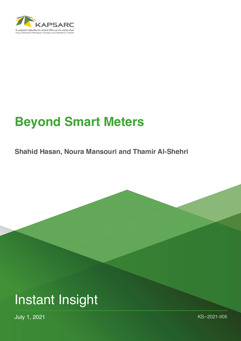
Beyond Smart Meters



11 July 2021
Over the last two decades, many countries have installed millions of smart meters to improve the efficiency, reliability, and quality of service in the electric power sector. Compared with traditional meters, smart meters measure consumers’ electricity usage at 5- or 15-minute interv...
Read More45

Saudi Arabia’s Clean Hydrogen Ambitions: Opportunities and Challenges


30 June 2021
Fully leveraging clean hydrogen to sustainably power the global economy would give the Kingdom a competitive edge in an increasingly carbon-constrained world in which net-zero carbon dioxide (CO2) emissions are both a requirement and a condition for surviva...
Read More49

Once Consumers Adopt an Electric Vehicle, Do They Go Back?


29 June 2021
The lack of repeat adoption of low carbon technologies has implications for climate change mitigation. In this insight, we explore how many electric vehicle owners dispose of their electric vehicles and do not buy another when purchasing their next car. We also investigate their reas...
Read More47

The Circular Carbon Economy Index – Methodological Approach and Conceptual Framework




28 June 2021
The circular carbon economy (CCE) approach, developed during Saudi Arabia’s G20 Presidency and endorsed by G20 leaders and energy ministers, can be used as a framework for holistic assessments of all available energy and emission management technologies within the confi...
Read More55

Evaluating Access to Riyadh’s Planned Public Transport System Using Geospatial Analysis


24 June 2021
The King Abdulaziz Project for Public Transport in Riyadh city is one of the world’s largest urban transit systems being developed. The project aims to meet the demands of the city’s growing urban population while reducing traffic congestion, heavy private car dependence and air poll...
Read More47

Revisiting the Impact of COVID-19 on the Demand for Transport and Gasoline


24 June 2021
The global outbreak of COVID-19 began in March 2020. As of April 2021, the global caseload has reached over 150 million. Governments globally have introduced various measures in an attempt to contain the virus’s spread. These measures have varied in type and stringency in different p...
Read More50

Assessing Effects of Renewable Deployment on Emissions in the Saudi Power Sector Until 2040 Using Integer Optimization




21 June 2021
Read More
33

Enablers and Disablers to Plug-in Electric Vehicle Adoption in India: Insights from a Survey of Experts




20 June 2021
Read More
32

How Cost-Effective Are Electric Vehicle Subsidies in Reducing Tailpipe-CO2 Emissions?



08 June 2021
The transportation sector accounts for 24% of global greenhouse gas (GHG) emissions (IEA 2020). Road transport is the most utilized mode because of its convenience (Van Essen 2008). However, it is also the most emissions intensive mode, accounting for 75% of global tran...
Read More49

If Renewable Energy is Getting Cheaper, Why Are Electricity Prices Increasing?

06 June 2021
In this commentary, we discuss the impact of renewable energy penetration on end-user electricity prices driven by the observed development in European countries since 2000. We conclude with a discussion on how Saudi Arabia is benefiting from its development of renewable energ...
Read More49

Assessing the Role of Renewables in Reducing Emissions in the Saudi Power Sector Using Mixed-Integer Optimization




02 June 2021
Renewable energy (RE) technologies are viewed as a critical means of reducing power sector-related emissions. Using mixed-integer optimization, we evaluate the extent to which renewable energy reduces carbon emissions in the Saudi power sector.
Read More42

Global Trends in Cloud Computing and Saudi Arabia’s Response


02 June 2021
As data centers become operational in the Kingdom, they will be an additional driver of long-term electricity demand. KAPSARC is actively studying these challenges and their implications for the economy by modeling and forecasting electricity demand.
Read More44
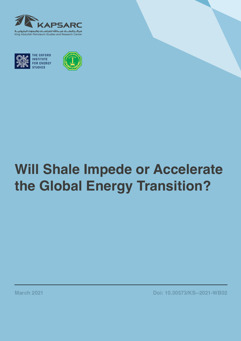
United States (U.S.) shale has transformed oil market dynamics in ways we never thought possible. Shale oil has transformed the oil supply curve through massive supply shocks, such as the rapid increase in tight oil production over the past decade, alongside productivity and technolo...
Read More44

How Would Real-time Electricity Pricing Affect the Saudi Power Sector in the Long-run?

20 May 2021
Read More
33
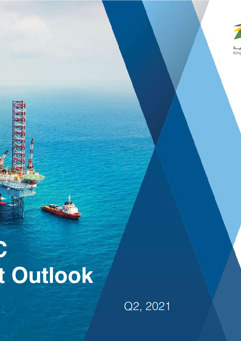
KAPSARC Oil Market Outlook
02 May 2021
Total global oil demand is expected to increase year-on-year (YoY) by 4.3 million barrels per day (MMb/d) in 2021 to 96.3 MMb/d. It is expected to further grow by 3.2 MMb/d in 2022 (300,000 barrels per day [Kb/d] less than our January Q1 2021 outlook for 2022), returning to 2019 leve...
Read More46

India’s Political Ambition of Implementing Plug-In Electric Vehicle Sales Targets


26 April 2021
The Indian transportation sector is going through a massive transition, especially the light-duty vehicle (LDV) sector. Policymakers consider the electrification of road transport to be one of the ways of solving India’s triple problem of increasing greenhouse gas (GHG) emissions, ri...
Read More47

Fiscal Policy for Stability in Oil-Exporting Countries: From the Old Problems to the Challenges of COVID-19


25 April 2021
Since the Great Recession of 2008, oil-exporting countries have had to adjust their fiscal policies to respond to larger oil price variations and increased unpredictability. This commentary provides insights into the relationship between oil prices and fiscal policies in emerging and...
Read More52

Renewable Energy in the MENA Region: Key Challenges and Lessons Learned



22 April 2021
Many pieces of evidence showing that investments in energy transition can boost GDP and create jobs. Further, national and regional energy transitions can help build resilient economies and societies. Therefore, linking short-term actions to medium-... Read Full Book Chapter Here
Read More51

Responsiveness of Saudi New Vehicle Fleet Fuel Economy to Fuel and Vehicle Price Policy Levers


21 April 2021
). However, the extent to which these policies have been effective in improving the Saudi new vehicle fleet fuel econo...Energy Economics journal that explored the impact of fuel- and vehicle price-related policies on Saudi Arabia’s new vehicle fleet fuel economy (Sheldon and Dua 2020).
Read More59

Economic Diversification Under Saudi Vision 2030


14 April 2021
The last decade has brought a row of substantial changes that have profound implications for the hydrocarbon resource-rich economies. The general answer to a changing environment is: Adapt! From the macroeconomic perspective, this means diversifying the economy to broaden the income ...
Read More55

What Policy Levers Could Address Indiaʼs Automobile-Related Externalities?



12 April 2021
The Indian government has shown a growing recognition of the need for policy instruments aimed at addressing increasing air pollution, oil imports, and greenhouse gas (GHG) emissions associated with India’s light-duty vehicle (LDV) sector. Based on the findings of a survey of ...
Read More53

Estimating Different Order Polynomial Logarithmic Environmental Kuznets Curves



11 April 2021
be followed since it potentially could lead to misleading conclusions. Instead, it should be based upon the sign and statistical significance of the estimated coefficients of the leading terms, the location of turning point(s), and the sign and statistical significance of the estima...
Read More43

Impact of COVID-19 on Passenger Railway Demand in Saudi Arabia

06 April 2021
The Saudi Railways Organization (SRO) operates a network of approximately 1,400 kilometers (km). This network links the Eastern Province with Riyadh, where more than 40% of the country’s population and economic activities are located. A passenger line connects Riyadh with Dammam thro...
Read More46

The RCEP and its Potential Impact on Saudi Regional Exports


30 March 2021
On November 15, 2020, 10 Southeast Asian economies, joined by Australia, China, Japan, New Zealand and South Korea, formed the Regional Comprehensive Economic Partnership (RCEP) – the world’s largest trading bloc, representing about a third of the global economy (BBC 2020). This comp...
Read More35

Overview of Saudi Electricity Demand (1970–2018)

29 March 2021
Saudi Arabia’s demand for electricity is undergoing unprecedented changes. In recent years, the government has implemented several efficiency measures and pricing reforms to curb demand growth. These measures started delivering concrete results in 2016. After decades of rapid ...
Read More46

Economic Analysis of Gas Pipeline Trade Cooperation: A GCC case study



23 March 2021
Natural gas development across the member states of the Gulf Cooperation Council (GCC) — including Saudi Arabia, the United Arab Emirates (UAE), Qatar, Kuwait, Oman and Bahrain —has become a priority for achieving long-term energy security and for supporting economic diversification ...
Read More47

The concept of connecting electricity markets, which started with the sole objective of maximizing economic gains, is now being increasingly expanded to fulfill other policy objectives, primarily to support the low-carbon future energy system. The importance of clearly articulating p...
Read More41

Private Participation in the Renewable Energy Transition

22 March 2021
The electricity sector captures a significant portion of PPI flows in developing countries. Over half (51%) of total PPI flows in developing countries since 1995 (~ US$1.9 trillion) went into the electricity sector. This figure covers the privatization of existing electricity infras...
Read More
47

Are Electric Vehicle Subsidies Becoming More Impactful Over Time?



22 March 2021
Various subsidies for plug-in electric vehicles (PEVs) have been implemented worldwide at the federal, state and regional levels. These subsidies aim to promote PEV adoption to help reduce both local air pollution and greenhouse gas emissions (Hardman 2019). In the United Stat...
Read More52

Long-run Effects of Real-time Electricity Pricing in the Saudi Power Sector

22 March 2021
This study explores the potential effects of real-time electricity pricing on the operations of Saudi Arabia’s power generation sector. The Kingdom currently sets fuel prices for power utilities at levels that suppress the costs of power generation. However, this analysis prov...
Read More44

The Road to Zero Routine Gas Flaring: A Case Study from Saudi Arabia

16 March 2021
Gas is envisaged as the fuel of choice in the power sector and is ideal for helping to transition toward clean, sustainable, and affordable energy access. As vital as gas is for electricity generation, the petrochemical industry, the transportation sector, and h... Read more here
Read More45

Review Analysis of COVID-19 Impact on Electricity Demand for Residential Buildings


15 March 2021
In this paper, a systematic review analysis of fully enforced stay at home orders and government lockdowns is presented. The main goal of the analysis is to identify the impacts of stay home living patterns on energy consumption of residential buildings. Specifically, metered data co...
Read More39

Policies to Nationalize the Private Sector Labor Force in a Matching Model with Public Jobs and Quotas

15 March 2021
Gulf Cooperation Council (GCC) countries aim to employ more of their nationals in the private sector to absorb the inflow of new entrants into the labor force. They have put in place workforce nationalization policies to revert two peculiar features of their labor markets: the prefer...
Read More45

The Value of Opec’s Spare Capacity to the Oil Market and Global Economy



13 March 2021
We investigate the extent to which OPEC has succeeded in its self‐stated mission of stabilising the oil market and the implications for the world’s economy. We discuss the modelling framework developed by Pierru, Smith and Zamrik (2018) and Pierru, Smith and Almutairi (2020) and upda...
Read More39

Mitigation Analysis of Water Consumption for power Generation and Air Conditioning of Residential Buildings: Case Study of Saudi Arabia


13 March 2021
This paper describes an analysis approach to assess water consumption attributed to electricity generation required to meet the demand for the entire Saudi residential building stock. In addition, the analysis aims at estimating the water consumption reduction due to cost-effectiv...
41

Fuel Economy Valuation and Preferences of Indian Two-Wheeler Buyers

07 March 2021
India has experienced exponential growth in sales of two-wheelers due to their high fuel economy and easy manoeuvrability in congested traffic conditions. Understanding Indian consumers’ valuation of fuel economy while purchasing a two-wheeler is crucial to evaluate whether Indian tw...
Read More43

Can Parking Fees Influence People to Use the Metro Instead of Cars in Riyadh City?


03 March 2021
In this commentary, we investigate the contexts in which car users located in five areas of Riyadh (south, north, east, west and central) would prefer to use transit for their trips. We focused on parking fees and car users because the car is the most used travel mode in Riyadh.
Read More54

What Texas Tells Us About Lessening the Frequency and Severity of Electricity Blackouts?


28 February 2021
Severe weather is a frequent cause of large-scale blackouts. For instance, in 2012, the Northeastern region of the United States suffered extensive power outages due to Hurricane Sandy. The hurricane toppled many distribution lines, resulting in several mi...
Read More46

China’s Belt and Road initiative: Changing Investment Priorities in Pursuit of Energy Security and Carbon Neutrality

22 February 2021
upend geopoli...
natural gas in the energy transition, and whether producers are adapting their strategies. They ask: who will lead the race for
new technologies and supply chains? And how will US–China competition and coordination impact global efforts to meet the
Paris climate goals?
38

The Opportunity Cost of Domestic Oil Consumption For an Oil exporter: Illustration for Saudi Arabia


22 February 2021
We develop a partial equilibrium framework to assess the opportunity cost of domestic oil consumption for an oil-exporting country. We show that the opportunity cost depends on various factors, including the constraints to which the oil producer is subject and the domestic oi...
Read More37

Residential Energy Model for Evaluating Energy Demand and Energy Efficiency Programs in Saudi Residential Buildings



21 February 2021
This paper describes the development of the Residential Energy Model (REEM) for Saudi Arabia using an engineering bottom-up approach. The model can assess energy demand for the current residential building stock and the impact of energy efficiency and demand-side management programs....
Read More47

The Pacifying Effect of Energy Dependence on Interstate Conflict: A Large-N Analysis



20 February 2021
Read More
35

The Future of the Petrochemicals Industry and Sino-Saudi Cooperation
14 February 2021
The Covid-19 pandemic and the responses to it have had a pronounced impact on the global economy. Major consuming sectors for petrochemicals, including cars and appliances, construction and textiles, have suffered a slump in demand. The production outputs of petrochemicals also vary ...
Read More48

Are Bankruptcies Healthy For The Tight Oil Sector?


14 February 2021
Between January 2015 and mid-2020, about 69 of the approximately 2,160 small-to-medium independent oil companies operating in the tight oil sector filed for Chapter 11 protection. These filings mostly occurred in 2016 and 2019. A lack of financial discipline and poor financial risk a...
Read More51

Renewable Energy Deployment to Stimulate Energy Transition in the Gulf Cooperation Council

13 February 2021
The Gulf Cooperation Council (GCC) region plays a vital role in shaping the global energy markets because of its substantial amount of hydrocarbons resources. Although the GCC has abundant hydrocarbon resources, countries in the region have also sho... Read Full Book Chapter Here
Read More43

Stated Preferences of Metro Use by Current Mode Choices in Riyadh


07 February 2021
Based on the current use of mode, people show different preferences for modal shift. This Data Insight presents the most important metro options (based on fare, travel time, walking time and waiting time of the metro) as stated by the respondents.
Read More46

Understanding Latent Consumer Demand For Fuel-Efficient Vehicles

03 February 2021
Consumer adoption of electric vehicles (EVs) – including hybrids, plug-in hybrids and pure battery electric – is a crucial step in improving energy use and reducing emissions in the transportation sector. To promote adoption, policymakers have employed various demand- and supply-side...
Read More42

The Evolution of Gasoline Demand and Prices in Saudi Arabia

03 February 2021
Gasoline is the primary fuel for the passenger car fleet in Saudi Arabia. The demand for passenger cars, and hence gasoline, is primarily driven by the size, geography and economic growth of the country, its domestic fuel prices, and the tendency for consumers to use private transpor...
Read More56
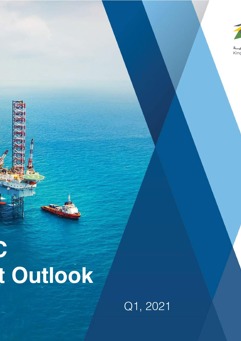
KAPSARC Oil Market Outlook
02 February 2021
Total global oil demand is expected to increase year-on-year (YoY) by 4.2 million barrels per day (MMb/d) in 2021 and further grow by 3.5 MMb/d in 2022, returning to 2019 levels by the third quarter (Q3) 2022. The International Monetary Fund (IMF) predicts economic growth of around 5...
Read More43

What Happened to Oil Product Demand in Saudi Arabia During the First Two Quarters of 2020?

31 January 2021
In this commentary, we examine the effects of the COVID-19 pandemic and the various lockdown measures on domestic oil product demand in Saudi Arabia during the first and second quarters of 2020. We e...
- liquefied petroleum gas (LPG)
- gasoline
- kerosene
- diesel
- fuel oil
- other oil products
48
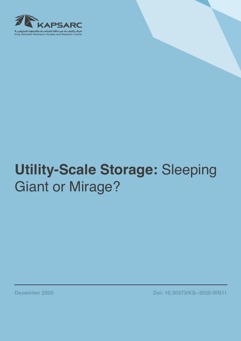
Utility-Scale Storage: Sleeping Giant or Mirage?
18 January 2021
The Kingdom of Saudi Arabia, among other countries, has ambitious plans to install a significant amount of renewable capacity by 2040. A high share of renewable generation in the power system can, however, result in grid instabilities. Energy storage technology is one option that cou...
Read More43
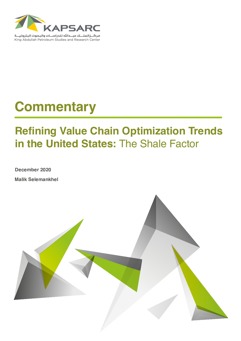
Refining Value Chain Optimization Trends in the United States: The Shale Factor

18 January 2021
Shale oil or light tight oil (LTO) is a sweet, less viscous crude oil, with an average API gravity range of 35º API to 55º API, and a sulfur content as low as <0.2%. After the Global Financial Crisis in 2008, the vast reserves of LTO in the geological formations such...
Read More51

On the Incremental Investment in Residential Energy Efficiency: A Saudi Perspective

18 January 2021
This paper examines the marginal welfare gain of adopting higher energy efficiency after another efficiency measure has already been installed. For example, how does installing stringent thermal insulation influence energy efficiency investment decisions thereafter? A mathematical mo...
Read More41

Share of Road Transport and the Consumption of Diesel and Petrol in India

06 January 2021
- As of 2015, India had approximat...
- In 2013, India had 132.55 million registered two-wheelers and 25 million registered cars. According to India’s Ministry of Petroleum and Natural Gas, the transport sector accounts for 70% of all retail diesel sales and 95% of all retail petrol sales.
44

Economic Structural Change and Freight Transport Demand in China


06 January 2021
After decades of rapid economic development, China is quickly becoming the world’s second-largest transport energy consumer. Recently, it has also surpassed the United States (U.S.) as the world’s largest oil importer, and it is expected to become the largest oil consum...
Read More44

Can Oil Refiners Adjust to a Greater Supply of Shale Oil?


06 January 2021
The advent of American shale oil and its prospects for continued production growth have raised concerns about whether oil refineries can handle the increasingly lighter crude oil supply. To provide a perspective on this issue, we run a global oil refining model for the years from 201...
Read More51

The Saudi Move into Hydrogen: A Paradigm Shift


06 January 2021
Saudi Arabia is moving ahead with its diversification plan, Saudi Vision 2030, by adopting hydrogen. The Kingdom is keen to enable the circular carbon economy (CCE) by producing and utilizing clean hydrogen. On September 27, Saudi Aramco announced its first shipment of hydrogen from ...
Read More48

In Eco-Design of Buildings and Infrastructure


01 January 2021
This chapter looks at different models and approaches concerning the energy consumption of households and buildings. The modelling of building energy consumption falls completely within this context. The field of building energy consumption modelling is th... Read Full Book Chapter Here
Read More42

Extreme Market Distortions Canadian Crude Oil Flows



27 December 2020
With extensive natural resources and strategic access to both the Atlantic and Pacific basins, Canada has the potential to become a global energy powerhouse – provided that the nation is successful in alleviating its infrastructure bottlenecks. According to the United S...
Read More50

Real Gross Domestic Income for Saudi Arabia: A Measure of National Income


27 December 2020
“A country’s national income is defined as the total market value of its output. The most used measure for national income is gross domestic product (GDP). One way to estimate GDP for a country is to sum its government consumption, private consumption, investment, and e...
Read More42

Gasoline Demand Elasticities at the Backdrop of Lower Oil Prices: Fuel-Subsidizing Country Case

23 December 2020
Read More
35

Charting Saudi Energy Flows

21 December 2020
KAPSARC has developed an energy flow chart for Saudi Arabia. The graphic provides a comprehensive view of the Kingdom’s energy profile, breaking down energy supply by source, sector, and electric power.
Read More42

Saudi Arabia Energy Report

15 December 2020
Saudi Arabia is one of the world’s leading oil producers and exporters. It has the second-largest proven crude oil reserves after Venezuela. Saudi Arabia’s oil reserves have made it one of the most significant players in the global oil market. The country also possesses vast reserves...
Read More47
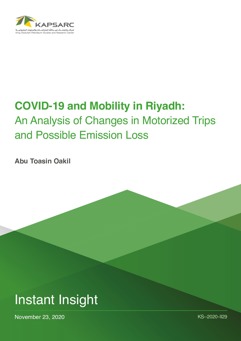
COVID-19 and Mobility in Riyadh: An Analysis of Changes in Motorized Trips and Possible Emission Loss

15 December 2020
In this insight, we investigate the implications of COVID-19 on mobility in Riyadh. COVID-19 has impacted our world, leading to a ‘new norm’ for our standard of living. Countries have restricted personal mobility significantly, among other measures, to control the spread of the viru...
Read More49

Renewables and the Future of Geopolitics: Revisiting Main Concepts of International Relations from the Lens of Renewables



14 December 2020
The development of renewable energy is often treated as a purely positive outcome for the world, without consideration of the challenges that come with implementation at scale, which will inevitably follow with the process of a global energy transition. Studies on the political proce...
Read More40
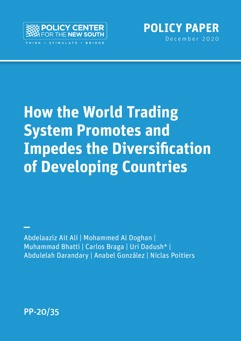
How the World Trading System Promotes and Impedes the Diversification of Developing Countries








11 December 2020
Diversification is important because it is associated with economic growth and reduced volatility. Export diversification is especially important for developing countries as a source of foreign exchange and imported know-how. We examine how export diversification is affected by trade...
Read More47

How Responsive is Saudi New Vehicle Fleet Fuel Economy to Fuel-and Vehicle-price Policy Levers?


01 December 2020
This paper investigates the drivers of recent improvements in Saudi Arabia’s fleet fuel economy for new vehicles including passenger cars and light-duty trucks. Vehicle choice models are estimated using both aggregate new vehicle sales data and disaggregate new vehicle buyer su...
Read More41

The Value of Storage in Electricity Generation: A Qualitative and Quantitative Review

26 November 2020
41
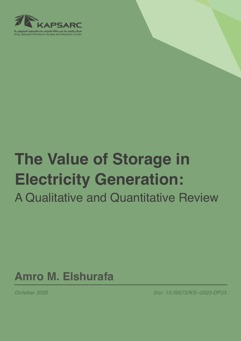
The Value of Storage in Electricity Generation: A Qualitative and Quantitative Review

26 November 2020
Electricity storage technology has many useful applications in the energy sector and can complement variable renewable power generation to achieve a low-carbon future. For policymakers, utilities, and investors, effective decisions in this context requir...
Read More43

Unlocking the Asian Market for Canadian Oil Producers

26 November 2020
On Friday, September 23, 2020, United States (U.S.) President Donald Trump gave the green light to a 2,570 kilometer (km) rail link proposed by the private company Alberta to Alaska (A2A). According to A2A, the rail link will be able to carry up to 2 million barrels of oil per day (M...
Read More41

In the past couple of years, it became evident that hydrogen would need to play a pivotal role in a carbon-free energy system. It would help decarbonize hard-to-abate sectors and act as an energy carrier to manage large variability in renewable energy production and enhance energy se...
Read More42

World’s First Blue Ammonia Shipment Signals Prospective New Low-Carbon Energy Trade for Saudi Arabia



26 November 2020
On September 27, 2020, Saudi Aramco successfully exported the world’s first shipment of carbon-neutral ammonia to Japan, helping to fuel the nascent Japanese hydrogen economy. This pilot shipment of 40 tonnes is an important realization of the hydrogen economy for both the Kingdom of...
Read More58

Energy Price Reform in Saudi Arabia: Modeling the Economic and Environmental Impacts and Understanding the Demand Response


25 November 2020
38
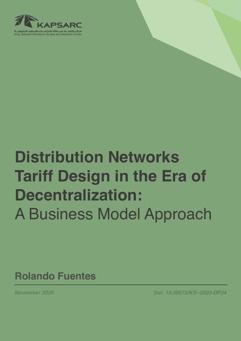
Distribution Networks Tariff Design in the Era of Decentralization: A Business Model Approach

25 November 2020
In this paper we discuss the unexplored two-way relationship between distribution network tariff design and the emergence of new business models in the power sector. Distribution network tariffs have traditionally used a cost accounting method. We suggest, instead, the use of a busin...
Read More50
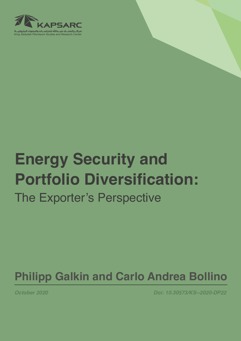
Energy Security and Portfolio Diversification: The Exporter’s Perspective


25 November 2020
Despite the increasing attention paid to energy security and the continuously broadening scope of the field, the perspective of energy importing countries (i.e., supply security) has overshadowed that of exporters, who seek to ensure demand security. As official statements and policy...
Read More44

Opportunities for Natural Gas Trade and Infrastructure in the GCC
16 November 2020
Despite the common interests, markets, and economic policies among Gulf Cooperation Council (GCC) countries, their energy cooperation has been modest. GCC countries hold 20% of the world’s gas reserves. The Dolphin gas pipeline, connecting Qatar to the United Arab Emirates (UAE) and ...
Read More50

Gasoline Demand Elasticities at the Backdrop of Lower Oil Prices: Fuel-Subsidzing Country Case


16 November 2020
This study investigates the income and price elasticities of gasoline demand for a fuel subsidizing country case, applying three different time-varying coefficient approaches to the data spanning the period from January 2002 to June 2018. The empirical estimations concluded a cointeg...
Read More31
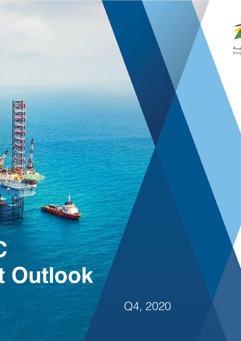
KAPSARC Oil Market Outlook
29 October 2020
The global oil market moved into deficit in the third quarter of this year and is expected to remain in deficit during the next eight quarters. We expect the deficit to range between 3.4 – 0.1 million barrels per day (MMb/d) until OPEC ends its cuts in April 2022. The most significan...
Read More44

Oman’s Shift to a Post-Oil Economy

27 October 2020
Oman’s economy has grown dramatically since 1970. Until recently, however, Oman’s economic progress has been largely driven by the wealth generated from oil export revenues. Despite historical attempts to diversify the economy away from oil, the state budget has remained domin...
Read More44

Why Should Saudi Arabia Diversify Its Economy?



21 October 2020
Climate change is a global issue. According to an IPCC special report (IPCC, Global warming of 1.5 °C. An IPCC special report on the impacts of global warming of 1.5 °C above pre-industrial levels and related global greenhouse gas emission pathways,... Read Full Book Chapter Here
Read More44

Early Estimates of the Impact of the COVID-19 Pandemic on GDP: A Case Study of Saudi Arabia



21 October 2020
The COVID-19 pandemic has affected economic sectors in a very heterogeneous way. In the early stages of the economic lockdown, only limited economic data, if any, related to the event were available. With the government’s discretionary measures to contain the infection, it became obv...
Read More43

China’s Green Freight Policy


13 October 2020
In September 2019, China’s National Development and Reform Commission (NDRC), together with the Ministry of National Resources, the Ministry of Transport, the National Railway Administration, and the State Railway Group, issued the policy announcement, “Guiding opinions on accelerati...
Read More45

Saudi Electricity Demand Drops for the First Time on Record

12 October 2020
Since 1990, Saudi Arabia’s electricity consumption has risen rapidly and consistently, at an average rate of around 6% per year. This growth rate is considerably high when compared with the global average growth rate of 3% and 4.8% in developed countries. In 2012, Saudi Arabia establ...
Read More49

Can Cooperation Enhance Natural Gas Utilization in the GCC?



12 October 2020
The last decade saw dramatic changes in the energy sector, including the shale oil and gas boom in the United States (U.S.), a commodity down-cycle, and heightened awareness of the global climate challenge. In response, the Gulf Cooperation Council (GCC) member countrie...
Read More49

Fiscal Multipliers for Saudi Arabia Revisited


05 October 2020
Fiscal policy lies at the heart of key macroeconomic and budgetary decisions and is central to understanding the dynamics of oil rich economies. Fiscal multipliers, including spending multipliers, indicate how changes to fiscal policy can stimulate economic growth, to what magnitude,...
Read More43

Electricity Sector Liberalization in Egypt: Features, Challenges and Opportunities for Market Integration



05 October 2020
KAPSARC has initiated a research project to develop insights that can facilitate the establishment of a well-functioning integrated electricity market comprising the member states of the Gulf Cooperation Council (GCC). It aims to assess the key issues affecting electricity market int...
Read More55

Natural Gas Utilization in GCC Countries


22 September 2020
Between 2009 and 2019, marketed gas production by Gulf Cooperation Council (GCC) members has grown at an average rate of 4.8% per annum, from 265 billion standard cubic meters in 2009 to 422 billion standard cubic meters (Bscm) in 2019. This has been driven by increased demand for ga...
Read More55

Supply-side Climate Policy for Crude Oil Producers


21 September 2020
This paper considers the potential for supply-side climate policy to increase climate action, with a focus on crude oil producers and exporting countries. To date, supply-side policies have not been widely used in efforts to tackle climate change, and the emerging dialogue on the top...
Read More50
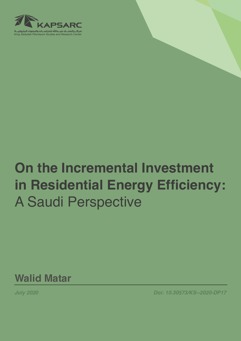
On the Incremental Investment in Residential Energy Efficiency: A Saudi Perspective

14 September 2020
It has been shown in the literature that, in aggregate, actual household energy efficiency adoption is less than would be expected economically. Energy economists and policy analysts have described this phenomenon as the ‘energy efficiency gap.’ There could be myriad reasons for this...
Read More52

Saudi Arabia’s Gas Flaring Mitigation Experience

14 September 2020
Gas is envisaged as the fuel of choice in the power sector and is the ideal fuel to help transition toward clean, sustainable, and affordable energy access. As vital as gas is for electricity generation, the petrochemical industry, the transportation sector, and heating, many oil ope...
Read More49

Regional Heterogeneous Drivers of Electricity Demand in Saudi Arabia





13 September 2020
Aggregate residential electricity consumption in Saudi Arabia has increased rapidly over the past several decades, largely due to population increases and fast economic growth (SAMA 2019). The growth in electricity consumption has been driven, among other factors, by government-admin...
Read More43

Balancing Energy Security Priorities: Portfolio Optimization Approach to Oil Imports



09 September 2020
The notion of energy security in most interpretations includes the physical supply and price affordability components, making financial risks a crucial part of energy security strategies. Mainstream analysis has focussed on the notion of the physical supply. This paper introduces a n...
Read More34

Viability of Seasonal Natural Gas Storage in the Saudi Energy System


08 September 2020
Read More
38

Per Capita Regional Electricity Consumption in the Saudi Housing Sector


07 September 2020
Aggregate residential electricity consumption data for Saudi Arabia conceals regional disparities. Although electricity prices are unified across the country, electricity consumption patterns can be driven by regional factors such as wealth, population size, and weather conditions, a...
Read More52

GCC Residential Electricity Tariffs

07 September 2020
Gulf Cooperation Council (GCC) countries have raised their domestic energy prices in recent years in a bid to increase energy efficiency, rationalize government spending and balance their budgets. Saudi Arabia and the United Arab Emirates (UAE) have taken bold steps to reform th...
Read More53

The Impact of the US-China Trade Dispute on the GCC

07 September 2020
The trade dispute between the United States (U.S.) and China has escalated since March 2018. On March 22, 2018, U.S. President Donald Trump signed a memorandum directing the U.S. government’s response to the investigation on China’s economic activities, trade policies and p...
Read More47
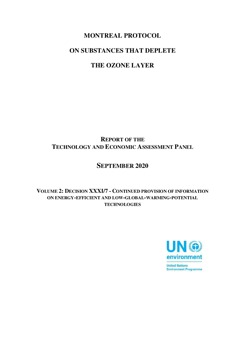
Montreal Protocol on Substances that Deplete the Ozone Layer, Report of the TEAP, Volume 2 Decision XXXI/7 – Continued Provision of Information on Energy-Efficient and Low Global Warming Potential Technologies



01 September 2020
To request the Technology and Economic Assessment Panel (TEAP) to prepare a report addressing any new developments with respect to best practices, availability, accessibility and cost of energy-efficient technologies in the refrigeration, air-conditioning and heat-pump s...
Read More44

Understanding the Evolution of the Impact and Cost-Effectiveness of Electric Vehicle Subsidies



30 August 2020
Our previous research found that promoting plug-in electric vehicle (PEV) adoption through financial subsidies is expensive. In this commentary, we explore how the cost-effectiveness of the PEV subsidy program has evolved over time. To understand this evolution, we developed vehicle ...
Read More45
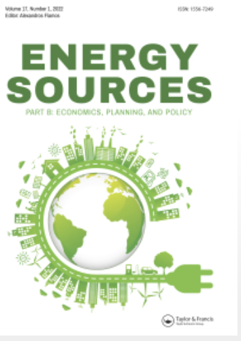
Gasoline Demand in Saudi Arabia: Are The Price and Income Elasticities Constant?



26 August 2020
Read More
52

What Happened to Residential Electricity Consumption in Saudi Arabia Between 2015 and 2018?


26 August 2020
Between 2007 and 2018, residential electricity consumption in Saudi Arabia increased by 45%, from around 89 terawatthours (TWh) to 130 TWh (SAMA 2019). Population and gross domestic product (GDP) are two key factors that influence residential electricity consumption.
Read More47

The FDI-CO2 Nexus From The Sustainable Development Perspective: The Case of Azerbaijan





25 August 2020
emissions in Azerbaijan utilizing time series data spanning from 1996 to 2013. The structural time series modeling (STSM) approach is employed in empirical estimations. The STSM framework allows parameters to evolve over time. Estimation results show that the coefficients of FDI and...
Read More34

The Impact of Restricted Mobility Due to COVID-19 in Saudi Arabia


23 August 2020
Seven months since the first COVID-19 case was identified in Wuhan, China, the contagious and vastly transmissive virus has continued to spread and grow into a global pandemic affecting more than 20 million people. When the World Health Organization (WHO) announced a Public Health Em...
Read More48
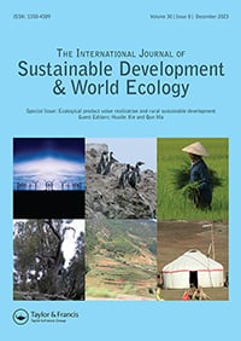
The FDI-CO2 Nexus From The Sustainable Development Perspective: The Case of Azerbaijan

23 August 2020
Read More
40

The world needs cooling. Air conditioning (AC) and refrigeration protects our health and productivity at home and work, and supports a host of critical services such as internet data centers, food delivery, and medicine. Around 1.6 billion AC units are in use globally, consuming over...
Read More46

Realizing the G20’s Vision for a Resilient Grid During the Power Sector’s Transformation


20 August 2020
Renewable energy resources can be affected by changing precipitation patterns and rising temperatures. Likewise, high wind conditions can also knock down overhead transmission lines. Thus, power outages can lead to widespread power blackouts, potentially impacting thousands or millio...
Read More48

Regional Heterogeneous Drivers of Electricity Demand in Saudi Arabia: Modeling Regional Residential Electricity Demand





19 August 2020
Read More
42
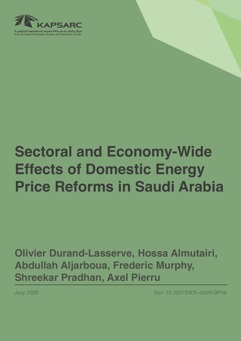
Sectoral and Economy-Wide Effects of Domestic Energy Price Reforms in Saudi Arabia






19 August 2020
This paper simulates the sectoral and economy-wide consequences of deregulating energy prices in Saudi Arabia. Our analysis is based on KAPSARC’s general equilibrium energy model (KEMGE), a new hybrid computable general equilibrium model (CGE). The model examines the effects of full ...
Read More47

Gasoline Demand in Saudi Arabia: Are the Price and Income Elasticities Constant?



12 August 2020
The paper investigates gasoline consumption in case of oil-exporting country applying Time-varying Coefficient Cointegration approach to the data from 1980 to 2017. Empirical estimations show that long-run income and price elasticities are not constant and are responsive to price and...
Read More35
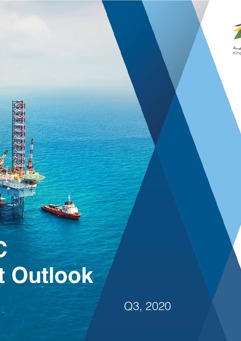
KAPSARC Oil Market Outlook
06 August 2020
The global oil market is likely to move into deficit as early as this quarter. The most significant driver of this shift has been strong compliance with the production cuts agreed by OPEC and its partners (OPEC+) at the group’s historic April meeting. The cuts agreed at that meeting ...
Read More43
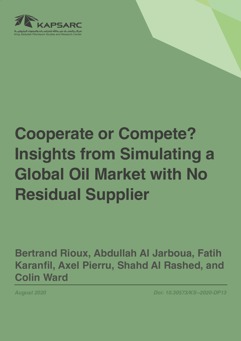
Cooperate or Compete? Insights from Simulating a Global Oil Market with No Residual Supplier






06 August 2020
Structural changes in the global oil sector are disrupting conventional market dynamics and the roles played by competing and cooperating producers. Industry players are adjusting to the shale (or ‘tight’) oil revolution and the possibility of plateauing or peaking global oil demand....
Read More42

Trends in Global Solar PV Installation

27 July 2020
Dozens of governments around the world have supported, and still support, renewable energy technology deployment, including solar photovoltaics (PV). This has been driven by their ambitions to be energy independent, meet carbon emissions reduction targets, and contribute to their dom...
Read More43

Toward Fiscal Stability and Sustainable Development: The Role of Sovereign Funds in Saudi Arabia

26 July 2020
The study, “Optimal Policies for Managing Oil Revenu...Resources Policy. It developed a model that optimizes the buildup and drawdown of a stabilization fund. It offers key insights into managing a stabilization fund to support fiscal stability over the short and medium term.
Read More42

The Fiscal Response to COVID-19 in Saudi Arabia



26 July 2020
The COVID-19 pandemic and the efforts to combat it have led to major global disruptions. Policymakers are faced with a dilemma that is not easily resolved. On the one hand, they are striving to protect public health by containing the spread of the virus. On the other, they must ensur...
Read More48

The Impact of Recent Changes to China’s Plug-In Electric Vehicle Subsidy Design


19 July 2020
Subsidies that promote plug-in electric vehicle (PEV) adoption have been a key component of China’s overall plan for reducing local air pollution and the greenhouse gas emissions from its light-duty vehicle sector. Since 2009, PEVs qualify for substantial rebates (up to US$9,000) fro...
Read More46
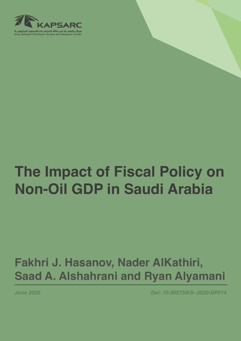
The Impact of Fiscal Policy on Non-Oil GDP in Saudi Arabia




19 July 2020
A clear objective of Saudi Vision 2030, the strategic roadmap for the future of the Kingdom of Saudi Arabia, is to put the non-oil sector at the heart of the country’s economic development. The vision realization programs (VRPs), such as the National Transformation Program and...
Read More43
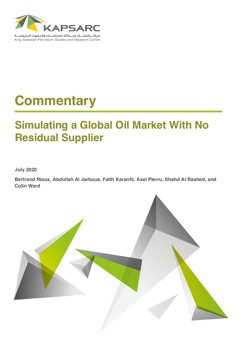
Simulating a Global Oil Market With No Residual Supplier






16 July 2020
What if OPEC decided to abandon organizing residual production collectively, transitioning the world permanently to a competitive oil market? This commentary is based on a forthcoming KAPSARC paper, “Cooperate or Compete? Insights from Simulating a Global Oil Market with No Residual ...
Read More42

Saudi Arabia’s CO2 Emissions Steady in 2019 Ahead of Expected 2020 Fall Due to COVID-19




12 July 2020
The 2019 data on carbon dioxide (CO2) emissions have just been re... On June 3, Enerdata released its data for Saudi Arabia’s 2019 emissions from fuel consumption, estimating them to remain stable at 526.84 million tonnes of CO2 (MtCO2), slightly down (-0.04%) from 527.05 MtCO2 in 2018.
Read More50

Social Distancing: The Impact of COVID-19 on Mobility in Saudi Arabia

08 July 2020
Saudi Arabia took early measures to combat the spre... Figure 1 compares the daily change in mobility1 requests submitted by users of Apple Maps in Saudi Arabia since February 27, 2020 (left axis) with the confirmed cumulative number of COVID-19 cases in the country (right axis).
Read More51

Balancing World Oil Markets and Understanding Contango and Inventories: The Changing Nature of World Oil Markets


06 July 2020
The general theory of storage suggests that the level of inventories is a key factor in determining the structure of the oil futures curve, or the basis, over time. The basis is the difference between the price of oil in the futures market and the price of oil in the spot marke...
Read More47

The Impact of the Coronavirus Lockdown on the Electricity Sectors in Saudi Arabia and India



05 July 2020
Currently, an estimated third of the global population is under some form of government-imposed lockdown measure aimed at curbing the spread of COVID-19. These lockdown measures have had various negative economic effects and could decrease electricity demand (Business Insider 2020). ...
Read More51

Residential Energy Efficiency Investment and Behavioural Response Under Different Electricity Pricing Schemes: A Physical-microeconomic Approach

25 June 2020
The purpose of this paper is to analyze the effects of electricity price changes and energy efficiency subsidy on household energy efficiency purchase and/or behavioural adjustment decisions. The analysis adds energy efficiency investment to a methodology that merges the physics of e...
Read More41

Estimating the Size and Efficiency of the Saudi Vehicle Fleet

24 June 2020
Estimates of the size of Saudi Arabia’s vehicle fleet in 2015 vary from as high as 18 million (Arab News 2014) to as low as 6.6 million (OICA 2019). This significant variation stems from the fact that the Kingdom does not operate a vehicle registration program that deletes vehicle re...
Read More52

CO2 Emissions-Economic Growth Relationship Revisited: New Insights from the Time-Varying Cointegration Approach



22 June 2020
37

Energy Price Reform in Saudi Arabia: Modeling the Economic and Environmental Impact and Understanding the Demand Response


21 June 2020
The government of Saudi Arabia, like many around the world, has long set domestic energy prices far below international market levels. This helps keep prices stable and energy affordable, providing important support to lower-income households.
Read More44

Saudi Electricity Demand for 2018-2019 based on Saudi Electricity Company Data

21 June 2020
- The Saudi government implemented two energy price reforms, in 2016 and 201...
- The government also implemented a range of efficiency measures to mitigate electricity demand growth. Since 2016, Saudi electricity demand has flattened at around 300 terawatthours (TWh).
49

Saudi Arabia’s Unfolding Power Sector Reform: Features, Challenges and Opportunities for Market Integration



21 June 2020
Today, there is a physical exchange of electricity between Gulf Cooperation Council (GCC) countries. However, this is not the same as competitive trade in electricity. Numerous studies have shown the efficiency benefits of electricity trade among GCC countries. These studies in...
Read More53

Saudi Arabian Cement Companies: Upgrading Through Leveraging Overcapacity

21 June 2020
The Kingdom of Saudi Arabia’s annual cement production capacity of 72.4 million tonnes is the highest of any Gulf country. From 2001-2005, Saudi cement production grew at a compound annual growth rate of almost 8%. However, its annual production in 2018 of 42.2 million ...
Read More46

Electricity Incentives for Agriculture in Saudi Arabia. Is That Relevant to Remove Them?


13 June 2020
Saudi Arabia has been implementing the domestic energy price reform (EPR) and fiscal reform since the end of 2015 under the Fiscal Balance Program (FBP), one of the key realization programs of Saudi Vision 2030 (SV2030). The EPR aims to increase the rational consumption of energy an...
Read More43

Impact of the COVID-19 Lockdown on Electricity Demand: Global Insights and Implications for Saudi Arabia


11 June 2020
The impact of curfews and lockdowns on total electricity demand as a result of the spread of COVID-19 depends on many factors. This insight provides a summary of the immediate demand impacts in selected regions around the world due to lockdown measures. We will follow this up ...
Read More43
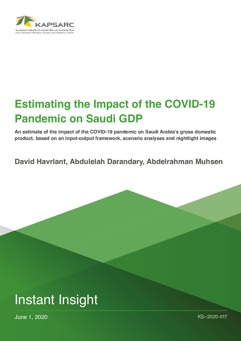
Estimating the Impact of the COVID-19 Pandemic on Saudi GDP



10 June 2020
The COVID-19 pandemic has interrupted economic and social activity globally at an unprecedented pace. The international movement of goods has been limited to the necessary minimum, often solely for deliveries of protective and healthcare equipment. Many governments have imposed stric...
Read More43

World Oil and Inventory Study: A Global VAR Analysis



10 June 2020
Despite numerous journal articles, forecasting studies, and books, very little is known about the actual quantitative value, or economic cost, of shocks to world oil markets. The potential consequences of a given political or economic disturbance are unclear, and appear...
Read More37

OPEC’s Pursuit of Market Stability



09 June 2020
We investigate attempts by the Organization of Petroleum Exporting Countries (OPEC) to stabilize the price of oil during the past fifty years. We first develop a novel decomposition of shifts in global demand and non-OPEC supply. This decomposition provides a fresh perspective on the...
Read More31

Do High Oil Prices Obstruct the Transition to Renewable Energy Consumption?




08 June 2020
) emissions, and oil price on renewable energy con...2 on renewable energy consumption is negative but statistically insignificant. The results of this article might be beneficial for policymakers and support the current literature for further research for oil-rich developing countries.
Read More39

Electric Vehicle Deployment and Carbon Emissions in Saudi Arabia: A Power System Perspective


07 June 2020
Although battery electric vehicles (EVs) are emission-free at the tailpipe, the energy mix that provides electricity to charge EVs is generally not. Ideally, it is desired to charge EVs from a low- or no-carbon energy source to ensure that the emissions avoided from driving EVs outwe...
Read More33

Why Did Domestic Gasoline Prices Fall in Saudi Arabia?


07 June 2020
On May 11, 2020, Saudi Arabia slashed its domestic gasoline prices. The price of 91-octane gasoline fell from 1.31 to 0.67 Saudi Arabian riyals (SAR) per liter, while the price of 95-octane gasoline fell from 1.47 to 0.82 SAR per liter. As a result of these price reductions, domestic...
Read More53
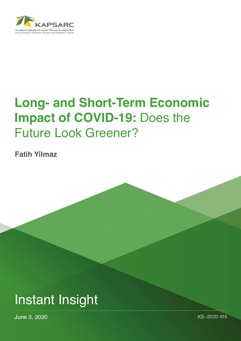
Long and Short-Term Economic Impact of COVID-19: Does the Future Look Greener?

07 June 2020
COVID-19 initially broke out in China in early January. It has since posed a severe threat to our lives and economies. Millions of infections and hundreds of thousands of deaths have been recorded globally, with more casualties expected in the coming days and months.
Read More42
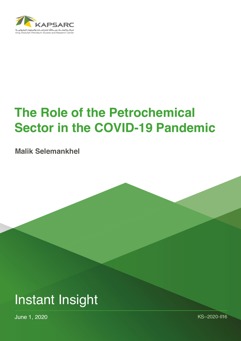
The Role of the Petrochemical Sector in the COVID-19 Pandemic

07 June 2020
Our super-connected world enabled the COVID-19 virus to quickly evolve into a pandemic, bringing the world to a standstill. Millions of people have been infected by the virus, and billions are impacted by lockdown measures to contain it and the consequent global economic slowd...
Read More42

Demystifying Policy Support Mechanisms for Distributed Solar Photovoltaic Systems

03 June 2020
Solar photovoltaic (PV) distributed generation (DG) systems are installed for residential, commercial, and industrial use. PV DG systems in the residential sector typically have capacities below 20 kilowatts (kW). However, commercial and industrial PV DG systems can have capacities o...
Read More47

Industrial Energy Consumption in Saudi Arabia

31 May 2020
In 2017, Saudi Arabia’s total final energy consumption was 140.7 million tonnes of oil equivalent (Mtoe). Total final energy consumption is defined as energy used by final consumers (or end users). It includes electricity use in residential buildings, gasoline use in cars, and...
Read More
45
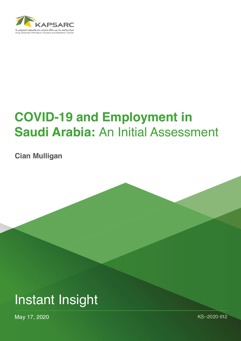
COVID-19 and Employment in Saudi Arabia: An Initial Assessment

28 May 2020
In the space of a few short weeks in March, the COVID-19 pandemic took over every aspect of our lives and caused the global economy to grind to a standstill. Health concerns over the spread and mortality rate of the virus understandably took priority in the first phase of the pandemi...
Read More42

Analyzing the Effects of Saudi Arabia’s Economic Reforms Using a Dynamic Stochastic General Equilibrium Model





21 May 2020
Saudi Arabia is the world’s second-largest holder of proved oil reserves and the second-largest producer of petroleum liquids. The country is the largest exporter of crude oil, with a share of 16% of total crude oil exports in 2017. Saudi Arabia’s economy is heavily oil de...
Read More44

Overcoming Challenges to Developing a Well-Functioning Electricity Market in GCC and MENA
21 May 2020
This is Workshop Brief reports on the insights derived from roundtable deliberations that focused on how to establish a well-functioning cross-border electricity market in the Gulf Cooperation Council (GCC) and Middle East-North Africa (MENA) region.
Read More48

The Impact of COVID-19 on Transport and Gasoline Demand



20 May 2020
In the last few months, the world has experienced the negative effects of COVID-19. The outbreak, which started as an epidemic concentrated in China, quickly spread to become a global pandemic. As of May 12, 2020, there have been over four million COVID-19 cases globally, and this nu...
Read More46

Oil’s Demanding Road to Recovery

20 May 2020
As of May 1, OPEC+ members officially began implementing supply limits, with several countries outside the group providing support on their own terms. While this cooperation will provide much needed support to the market, demand-side factors continue to dominate the effects of the pa...
Read More37

WTI Negative Price and Cushing, Oklahoma, Crude Oil Storage Capacity: The Importance of 15%

13 May 2020
Working storage capacity at Cushing, Oklahoma, is approximately 77 million barrels, which represents about 15% of the United States’ (U.S.) total working crude oil storage capacity, excluding the Strategic Petroleum Reserve. Cushing storage is important to the U.S. crude oil industry...
Read More46

Many factors, local and global, will impact Saudi Arabia’s electricity sector and energy markets. The Kingdom has committed to deploying a significant share of renewable energy by 2030 and is considering plans to add nuclear power to its energy mix. At the same time, Saudi Arabia is ...
Read More43
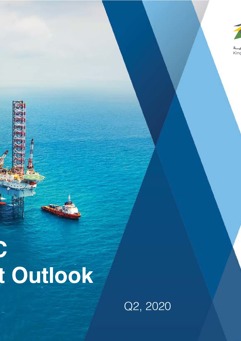
KAPSARC Oil Market Outlook
05 May 2020
The recent declaration by OPEC and its partners (OPEC+), alongside the G20 and some non-G20 countries (OPEC++), to cut oil production should help stabilize the market over the coming quarters. OPEC+ took the lead in finalizing the agreement to cut global production by 9.7 million bar...
Read More42

Effectiveness of China’s Plug-in Electric Vehicle Subsidy


01 May 2020
Subsidies for promoting plug-in electric vehicle (PEV) adoption are a key component of China’s overall plan for reducing local air pollution and greenhouse gas emissions from the light-duty vehicle sector. In this paper, we explore the impact and cost-effectiveness of the Chine...
Read More37

Electricity Demand Modeling in Saudi Arabia: Do Regional Differences Matter




30 April 2020
Energy is a pervasive input to all business and recreational activities. As such, total energy demand is an important indicator that helps explain the pattern of economic development within a country. Identifying and understanding the key determinants of electricity demand is ...
Read More44

Optimal Policies for Managing Oil Revenue Stabilization Funds: An Illustration Using Saudi Arabia




28 April 2020
We develop an analytical approach that offers insights into how governments can better manage an oil-revenue stabilization fund. The model maximizes the expected intertemporal utility of households and consists of decisions that are a function of the fund level and oil revenue. We ap...
Read More35

Energy Exchanges on GCCIA Interconnector


27 April 2020
The Gulf Cooperation Council (GCC) interconnection grid has linked the national grids of the six GCC countries since 2011. It is run by the GCC Interconnection Authority (GCCIA). It has been primarily designed to provide GCC member countries with alternative sources of operating rese...
Read More45

Crude Oil Reserves Metrics of GCC Members


27 April 2020
As of December 2018, the Gulf Cooperation Council (GCC) countries had combined proven reserves of 497 billion barrels of crude oil. This represents approximately 34% of the world’s estimated proven crude reserves.
Read More48

Understanding Latent Demand for Hybrid and Plug-in Electric Vehicles Using Large-scale Longitudinal Survey Data of US New Vehicle Buyers

27 April 2020
Consumer adoption of fuel-efficient vehicles is a crucial step in improving energy efficiency of the light-duty vehicle sector. To promote adoption, policymakers have employed various demand- and supply-side policies including incentives, fuel economy standards, zero emission vehicle...
Read More39

Designing Transport Policy for Sustainable Freight Movement in Saudi Arabia



27 April 2020
Logistics and infrastructure policy will play key roles in Saudi Arabia’s economic diversification and reform efforts. This study provides a quantitative assessment of specific measures related to freight transport, taking into consideration the heterogeneity of urban, regional...
Read More45

Eliciting preferences of TNC users and drivers: Evidence from the United States




25 April 2020
Transportation Network Companies (TNCs) are changing the transportation ecosystem, but micro-decisions of travelers and TNC drivers need to be better understood to assess their system-level impacts. Using a unique sample (N = 11,902) of the U.S. population residing in TNC-served area...
Read More35

Electricity demand modeling in Saudi Arabia: Do regional differences matter?




25 April 2020
The paper examines the electricity demand behavior for Saudi Arabia, using annual data for the period of 1990–2016, at regional level. The study finds that income, price and population are the main drivers of electricity demand at regional level. Although, the impacts vary across reg...
Read More0

Environmental consequences of tourism: do oil-exporting countries import more CO2 emissions?


23 April 2020
emissions are in line with the expectations, considering the developing path of the country. Moreover, the impacts of imports and exports are found to be positive and negative, respectively, which are in line with the expectations and with the theoretical findings discussed in the th...
Read More35

Assessing Residential Solar Rooftop Potential in Saudi Arabia Using Nighttime Satellite Images: A Study for the City of Riyadh



20 April 2020
rojects as a first step toward diversifying its electricity generation mix, currently based almost entirely on crude oil, refined oil products and natural gas. The Saudi National Renewable Energy Program aims to substantially increase the share of renewable energy in the...y 2023.
Read More48

A Look Back on Saudi Fossil Fuel Incentives in the Last Decade

19 April 2020
The Joint Organisations Data Initiative (JODI) and the Saudi Electricity Company (SEC) have just released energy use data for 2019. This insight provides an up-to-date estimation of how fossil fuel incentives have changed in 2019 compared with 2009.
Read More45

The Prospect of Unconventional Gas Development in Saudi Arabia


19 April 2020
In February 2020, Saudi Aramco announced that it obtained regulatory approval to develop the Jafurah Basin, Saudi Arabia’s largest unconventional natural gas field (Figure 1). Situated east of the giant Ghawar oilfield, it contains 200 trillion cubic feet (tcf) of gas resources.
Read More48

Saudi Vision 2030 Dynamic Input-Output Table: Combining Macroeconomic Forecasts With the RAS Method


12 April 2020
When an economy is in the midst of a transformation and diversification process, it is hard to assume that its sectoral composition and inter-industry transactions will remain unchanged. This is especially the case since substantial adjustments to a country’s economic structure are a...
Read More50
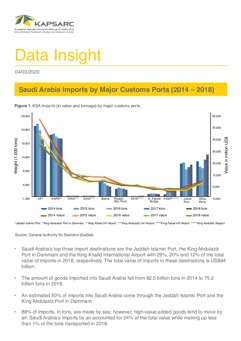
Saudi Arabia Imports by Major Customs Ports (2014 – 2018)

07 April 2020
Saudi Arabia’s top three import destinations are the Jeddah Islamic Port, the King Abdulaziz Port in Dammam and the King Khalid International Airport with 29%, 20% and 12% of the total value of imports in 2018, respectively. The total value of imports in these destinations is US$84 b...
Read More46

Modeling Sectoral Employment in Saudi Arabia






07 April 2020
chieving the desired level of employment is central to macroeconomic policy. Regulators should have a better understanding of employment dynamics in order to design appropriate policies and test their impact. Healthy employment levels not only benefit househo...
Read More61
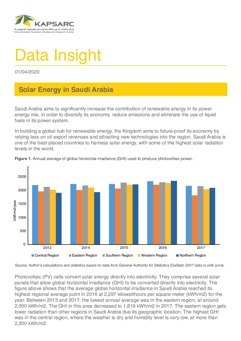
Solar Energy in Saudi Arabia

06 April 2020
In building a global hub for renewable energy, the Kingdom aims to future-proof its economy by relying less on oil export revenues and attracting new technologies into the region. Saudi Arabia is one of the best-placed countries to harness solar energy, with some of the highes...
Read More42

Revisiting Energy Demand Relationship: Theory and Empirical Application


06 April 2020
In this paper, we revisit the theoretical framework for energy demand. We then use this theoretical framework to empirically model the Saudi Arabian industrial electricity demand. We show, in the case of Saudi Arabian data, that imposing parsimonious energy demand specification on da...
Read More38

Green Growth Pathways for Saudi Arabia
06 April 2020
Green growth emphasizes that positive environmental outcomes can be consistent with economic prosperity and that greater social wellbeing can be achieved through ‘less use, more value’ policies.
Read More45

Is Saudi Arabia Getting Warmer?




06 April 2020
According to NASA, the world is getting warmer. Warmer weather increases the ...1 for 13 cities spread across Saudi Arabia over 29 years (from 1990 to 2018). The cities included Riyadh, Jeddah, Dhahran, Madinah, Arar, Sakaka, Tabuk, Hail, Buraydah, Albaha, Abha, Jazan, and Najran.
Read More45

Crude Oil and Refined Products


06 April 2020
The power sector in Saudi Arabia makes up just over half of the natural gas demand in the Kingdom, followed by the industrial sector and non-energy use as a feedstock for petrochemicals.
Read More48

Transitioning to High Efficiency Air Conditioning in Saudi Arabia: A Benefit Cost Analysis for Residential Buildings


01 April 2020
This paper assesses the benefits of transitioning to high efficiency air conditioning (AC) equipment for existing units specific to the residential building stock in the Kingdom of Saudi Arabia (KSA). The analysis is based on a calibrated residential building stock model for Saudi Ar...
Read More34

World Equity Markets and COVID-19: Immediate Response and Recovery Prospects. Research in international Business and Finance


01 April 2020
Following the spread of the COVID-19 pandemic, most global equity market indices experienced significant falls. Recognizing the severe economic impacts of the pandemic, starting from mid-March, many governments announced unprecedented economic rescue packages, which appear to restore...
Read More35

Freight Energy in Transition – Disruptors and Enablers
31 March 2020
An increase in freight activity across different modes of transport has resulted in an amplified policy focus on reducing the associated externalities of increased transportation energy consumption, pollution, and traffic congestion (especially for urban freight). Increased freight e...
Read More47

The World Needs OPEC, but OPEC Can’t Go It Alone

27 March 2020
The global oil market is going through an extraordinary period. The twin shocks of a significant increase in global supply and a remarkable fall in oil demand appear to have no parallel in history. Together, the collapsed OPEC+ agreement and the coronavirus outbreak have put OPEC and...
Read More40

The Saudi Nuclear Energy Project

25 March 2020
In 2012, the government announced a new planned energy mix, including 12 nuclear reactors. This created a lot of interest from and aggressive competition among international energy companies that wanted to take part in the reactors’ development. These companies opened offices in the ...
Read More52

Residential Energy Efficiency Investment and Demand Response Under Different Electricity Pricing Schemes: A Physical- Microeconomic Approach

24 March 2020
This paper expands on a previously-presented methodology that merges the physical properties of energy with microeconomic principles: The physical side of the model informs how much electricity is used to satisfy services that people desire, while the microeconomic side imposes a uti...
Read More38

The Relentless Politics of Climate Change: The Paris Agreement



19 March 2020
The Paris Agreement entered into force in November 2016 and, to date, 187 parties have ratified it (UFCCC). The Agreement’s goal is to limit the increase in global temperature to 2 degrees Celsius (°C) above] pre-industrial levels. The Agreement established what has been dubbed an ‘a...
Read More41

The Impact of Population Dynamics on Housing Demand and Residential Energy Consumption in Saudi Arabia

15 March 2020
Saudi Arabia has witnessed explosive population growth over the past half century. The Kingdom’s population is expected to continue to grow and generate more housing demand in the coming decades. As the country attempts to curb its fast growing domestic energy consumption, pop...
Read More44
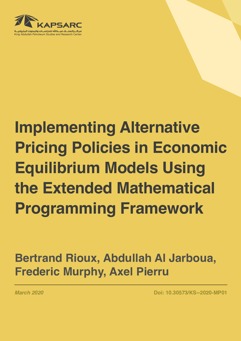
Implementing Alternative Pricing Policies in Economic Equilibrium Models Using the Extended Mathematical Programming Framework




12 March 2020
Standard economic optimization models represent markets in perfect competition. They are commonly used, though they may not accurately represent real-world policies and regulations. Equilibrium models built using a mixed complementarity problem (MCP) approach are capable of simulatin...
Read More39
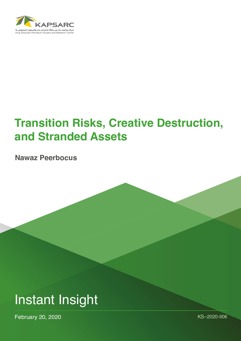
Transition Risks, Creative Destruction, and Stranded Assets

11 March 2020
Ten years ago, climate risks were absent from the top five global risks in the World Economic Forum’s Global Risks report. In their 2020 report, the top five global risks are all climate-related: extreme weather, climate action failure, natural disasters, biodiversity loss, and manma...
Read More38

Behavioral Aspects of Energy Transition: A KAPSARC-Energy Systems Catapult (ESC) Joint Methodological Report




11 March 2020
KAPSARC’s work on innovation in electricity transitions has focused on unbundling services in the electricity sector (KAPSARC 2016) and developing the microeconomic foundation for a reliability service. Our research has investigated the experiences of industries resembling the ...
Read More41

Toward A Sustainable Agriculture Sector: Policy Options for Reducing Water Use in Abu Dhabi’s Agriculture Sector


09 March 2020
Water shortages are a global challenge, with one third of the world’s population still without access to clean water. Gulf Cooperation Council (GCC) countries face a scarcity of water resources due to their dry climates. The United Arab Emirates’ (UAE’s) renewable water resourc...
Read More42

Testing the Limits of Electricity Market Design

09 March 2020
We live in an unprecedented time for the energy sector. According to the BP Statistical Review of World Energy 2019, electricity generated from renewable sources is at a historic high, with about 2,500 terrawatthours (TWh) produced in 2018 (Figure 1). This is more than...
Read More46
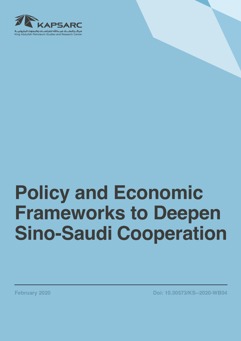
The Belt and Road Initiative (BRI) has expanded from 65 original member states during its official launch in 2015 to 131 as of April 2019. The countries of the Middle East and North Africa have generally welcomed the initiative and its goal of improving regional connectivity. However...
Read More50

Assessing the Gas Market Potential in India
08 March 2020
India faces a p... needs — yet the gas sector has struggled since 2010. The main obstacles to increasing the share of gas in the energy mix are a slowdown in domestic production, pricing and allocation issues, inefficient regulatory practices, and inadequate infrastructure.
Read More51
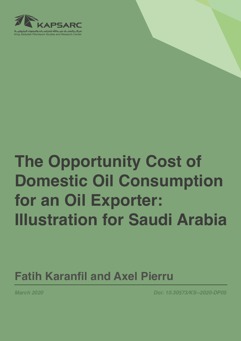
The Opportunity Cost of Domestic Oil Consumption for an Oil Exporter: Illustration for Saudi Arabia


01 March 2020
When appraising investment projects from a public perspective, a barrel of oil displaced from or added to domestic consumption has to be valued at its opportunity cost. This paper develops a partial-equilibrium framework to assess the opportunity cost of domestic oil consumption for ...
Read More44

Market Structure, Inventories and Oil Prices: An Empirical Analysis



24 February 2020
Understanding the relationship between crude oil prices and inventory levels is critical for policymakers and economic actors. The size of the ‘basis,’ or spread between spot and futures prices, reflects the level of inventories and can trigger arbitrage trading. The basis also refle...
Read More44
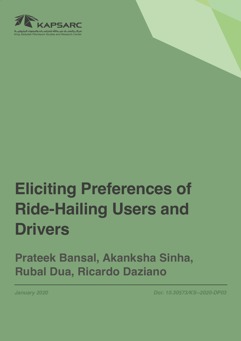
Eliciting Preferences of Ride-Hailing Users and Drivers




24 February 2020
The ‘ride-hailing’ services offered by transportation network companies (TNCs) such as Uber and Lyft have rapidly disrupted personal transportation, particularly in cities. Schaller (2018) reports that TNCs provided 2.6 billion rides in 2017 in the United States (U.S.), a 37% increa...
Read More49

Assessment of Coronavirus Effects on Oil Demand Implied by Price Elasticities




20 February 2020
There appears to be a significant response in the crude oil markets to the coronavirus outbreak that originated in Wuhan, China, in December 2019 and has since spread globally. Many cities in Hubei, of which Wuhan is the capital, have been quarantined, with many airlines suspend...
Read More36
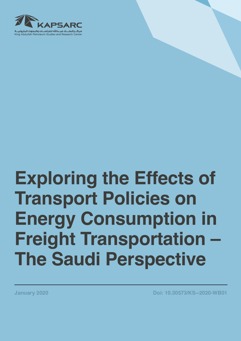
Exploring the Effects of Transport Policies on Energy Consumption in Freight Transportation – The Saudi Perspective
19 February 2020
The freight sector is at the heart of global economic activity, one of the biggest energy consumers globally and a key contributor to emissions in the transport sector. It is estimated that over 12% of all global energy consumption is related to freight transport. In the past d...
Read More48

KAPSARC Oil Market Outlook &#8211; Update


18 February 2020
China reported an outbreak of a SARS-like viral infection on December 31, 2019. The disease, officially named COVID-19, was first detected in Wuhan City, Hubei Province, China and continues to spread globally. Initial symptoms are similar to the common cold, but in severe cases...
Read More41

Analytical Approaches to Blending Political Science With the Study of Energy Markets
18 February 2020
Energy is arguably the most valuable traded commodity in the world. Unlike most other commodities, energy resources are essential for economic and military activity and therefore have unique strategic importance, especially because states vary widely in their energy resource endowmen...
Read More42

Saudi Arabia’s Residential Solar Energy Use and Prospects


13 February 2020
In an effort to diversify the energy mix of Saudi Arabia’s residential sector, the Electricity and Cogeneration Regularity Authority introduced regulations in August 2017, allowing households to use solar energy to generate their own electricity.
Read More47

KGEMM: A Macroeconometric Model for Saudi Arabia



13 February 2020
The KAPSARC Global Energy Macroeconometric Model (KGEMM), is a policy analysis tool for examining the impacts of domestic policy measures and global economic and energy shocks on the Kingdom of Saudi Arabia.
Read More53

Fuel Mix for Power Generation and Water Desalination in Saudi Arabia

11 February 2020
Saudi Arabia’s fuel mix for power generation and water desalination comprises natural gas (57%) and a suite of liquid fuels (43%). Liquid fuels include crude oil, heavy fuel oil (HFO), and diesel.
Read More62

India’s Crude Oil Imports From the Middle East

11 February 2020
India’s oil imports have risen significantly since the 1990s, when it imported fewer than one million barrels of oil per day.
Read More51

Oil Market Reactions to Recent Geopolitical Events

11 February 2020
The prices for crude oil reported on both the New York Mercantile Exchange (NYMEX) and the Intercontinental Exchange (ICE, London) reflect the oil market’s expectations for the future balance of oil supply and demand. In the face of significant geopolitical events, the observed price...
Read More46

Elasticity Analysis of Fossil Energy Sources for Sustainable Economies: A Case of Gasoline Consumption in Turkey





07 February 2020
The current paper investigates the gasoline demand relationship in the case of Turkey, utilizing different econometric techniques and using quarterly data spanning from 2000Q1 to 2019Q1. The estimation results revealed that income and gasoline price are the main drivers of consumptio...
Read More37
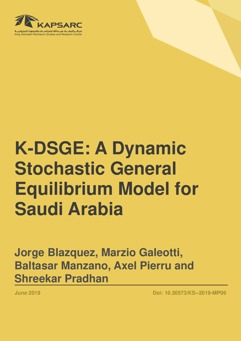
K-DSGE: A Dynamic Stochastic General Equilibrium Model for Saudi Arabia





03 February 2020
This paper describes a dynamic stochastic general equilibrium (DSGE) model of the Saudi Arabian economy, developed by KAPSARC researchers. The K-DSGE model is to be used for simulations and experiments to assess the impact of economic reforms within the Saudi Vision 2030 framework. T...
Read More49
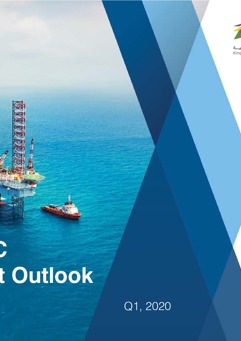
KAPSARC Oil Market Outlook
30 January 2020
The recent declaration by OPEC and its partners (OPEC+) to cut oil production by a further 500 thousand barrels per day (Kb/d) should help stabilize prices, which should, in turn, help smaller shale producers. Balancing the market in this manner risks supporting shale producers and f...
Read More45
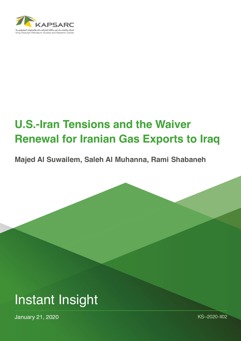
U.S.-Iran Tensions and the Waiver Renewal for Iranian Gas Exports to Iraq



30 January 2020
Following the assassination of Iranian General Qasem Soleimani in Baghdad on January 3, as a result of a United States (U.S.) airstrike, the Iraqi Parliament passed a resolution stating that it “must work to end the presence of any foreign troops on Iraqi soil and prohibit them from ...
Read More47

Placing a Value on Spot Sales from a Joint Oil Stockpiling Facility


23 January 2020
In this paper, joint oil stockpiling (JOS) refers to a commercial arrangement whereby crude oil, owned and commercially traded by an exporting country, is stored in an importing country in exchange for priority drawdown by the host country in the event of an emergency. It can t...
Read More35

Saudi Arabia’s 2018 CO2 Emissions Fall Faster Than Expected



21 January 2020
The data used in the previous analysis has been updated by Enerdata, with material revisions to the estimates for 2018 carbon diox...2) emissions. Due to media interest in this topic, we have updated our analysis to reflect the most recent information (downloaded January 9, 2020).
Read More47

Residential Building Stock Model for Evaluating Energy Retrofit Programs in Saudi Arabia


20 January 2020
A building stock model t represent energy performance of KSA existing housing units is developed. The building stock model has been applied to evaluate the benefits of energy retrofit programs.
Read More40
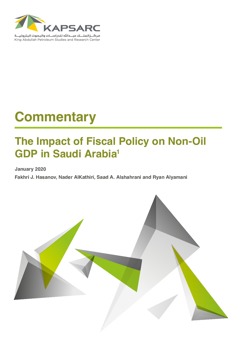
The Impact of Fiscal Policy on Non-Oil GDP in Saudi Arabia




16 January 2020
Saudi Vision 2030 (SV2030), the strategic roadmap for the future of the Kingdom of Saudi Arabia, aims to decouple the country’s economy from its reliance on oil revenues through implementing several economic and social initiatives. The key economic goals of SV2030 announced in 2016 ...
Read More47
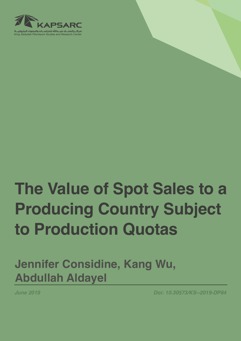
The Value of Spot Sales to a Producing Country Subject to Production Quotas



16 January 2020
In recent years, global oil markets have experienced intensified competition driven by growing surpluses of lighter crude and shale oil. As their margins have shrunk, many producers have increased output in order to boost revenue, adding to the oversupply. Meanwhile, global market dy...
Read More45

Carbon Sequestration Units (CSUs): A New Tool to Mitigate Carbon Emissions




13 January 2020
The United Kingdom’s decision to aim for net zero emissions by 2050 and to enshrine it in law raises the bar for global policymakers as the world seeks to limit the impact of climate change. A recent European Commission paper outlined policy pathways toward carbon neutrality by 2050,...
Read More46

Natural Gas Strategies for the Saudi Energy System


13 January 2020
Fuel prices in the Kingdom of Saudi Arabia have historically been below international market values. This has stimulated rapid growth in primary energy demand. The Kingdom’s natural gas demand has now outstripped its domestic production, forcing the government to impose rations on co...
Read More50

China’s Energy Investment Through the Lens of the Belt and Road Initiative



12 January 2020
The Chinese government launched the Belt and Road Initiative (BRI) in 2013 as a vision to promote... people-to-people bonds. Thousands of BRI projects have already been approved, with a total investment potential of $1.2-1.3 trillion by 2027 (IDSA 2019, Morgan Stanley 2018).
Read More43

Staying Cool in A Warming Climate: Temperature, Electricity and Air Conditioning in Saudi Arabia





09 January 2020
As global temperatures warm and populations and incomes rise, the demand for cooling will soa...2) emissions. This study explores the relationship between temperature, electricity, air conditioning (AC) and CO2 emissions, and the sustainability of cooling in the Kingdom of Saudi Arabia.
Read More37

Modelling industrial energy demand in Saudi Arabia


01 January 2020
Between 1986 and 2016, industrial energy consumption in Saudi Arabia increased by tenfold, making it one of the largest end-use sectors in the Kingdom. Despite its importance, there appear to be no published econometric studies on aggregate industrial energy demand in Saudi Arabia. W...
Read More40

India’s Future Commitments to the Paris Agreement: A Conflict Between Energy Security and Economic Growth

01 January 2020
From 2-15 December, 2018, almost 200 countries gathered at the 2018 United Nations Climate Change Conference in Katowice, Poland to adopt a set of guidelines to limit global warming. During this event, India reaffirmed its promise to implement the Paris Agreement, collectively with o...
Read More53

The Effectiveness of China’s Plug-In Electric Vehicle Subsidy


29 December 2019
Subsidies for promoting plug-in electric vehicle (PEV) adoption are a key component of China’s overall plan for reducing local air pollution and greenhouse gas (GHG) emissions from its light-duty vehicle sector. This paper explores the impact and cost-effectiveness of the Chinese PEV...
Read More41

An Alternative Framework for Measuring New Vehicle Buyers’ Responsiveness to Changes in Fuel Prices
26 December 2019
This commentary uses a cost per perceived value (CPPV) based utility maximization framework to measure new vehicle buyers’ responsiveness to changes in fuel prices. We recently used the CPPV framework to estimate the responsiveness of new light-duty vehicle (LDV) buyers to changes in...
Read More47
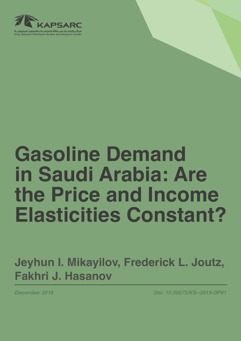
Gasoline Demand in Saudi Arabia: Are the Price and Income Elasticities Constant?



26 December 2019
After the drop in international oil prices in 2014, oil-exporting countries started to launch new policies to develop their economies. It is important that policymakers involved in energy and economic development understand how economic agents respond to increased energy prices and h...
Read More44

The Growth of India’s Electricity Generation Capacity

26 December 2019
Coal power plants accounted for 57% of India’s total generation capacity of 344 gigawatts (GW).
Read More38
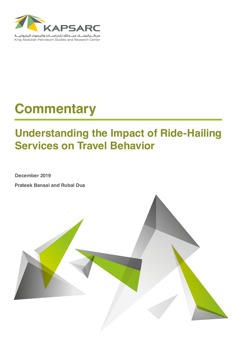
Understanding the Impact of Ride-Hailing Services on Travel Behavior


26 December 2019
Major transformations are taking place in the road transportation sector, particularly in passenger auto travel. The arrival of transportation network companies (TNCs), including Uber, Didi Chuxing, Ola, Lyft and others, has the potential to critically alter key aspects of passenger ...
Read More44

The Impact of China’s Oil Cap Pathway on Saudi Arabia’s Economic Transition

23 December 2019
On October 15, several leading Chinese research institutes released a joint study, “Research on China’s Oil Consumption Peak and Cap Plan” (ERI 2019). It analyzes China’s future oil demand and the policy instruments it could use to cap its use of oil. The latter would help China to m...
Read More42

Estimating Saudi Arabia’s Regional GDP Using Satellite Nighttime Light Images



23 December 2019
The increasing availability of data from technologies such as mobile phones, satellites and connected devices means that there are many new possible sources of economic data. This study analyzes the potential use of nighttime light images from satellites to provide a regional distrib...
Read More44

Securing New Markets in Asia: The Value of Strategic Spot Crude Oil Sales to Teapot Refiners



18 December 2019
In the race to secure customers on competitive world oil markets, many oil producers are looking to China as a promising source of increased market share. The task of securing new customers in China can be challenging, as most of China’s recent growth in oil demand has come from ‘tea...
Read More43

The Impact of High Temperatures on Battery Performance in Solar-PV Systems With Storage


17 December 2019
The World Bank estimates that nearly 1 billion people globally have no grid electricity access. Diesel generators are the default source of energy for locations lacking access to the grid. The falling costs of solar photovoltaic (PV) generation and battery storage systems will enable...
Read More43

Residential Electricity Price Reforms: Are Different Income Groups and Regions Impacted Equally?




15 December 2019
The government of Saudi Arabia has successfully reduced the country’s energy intensity, helped by its establishment of the Saudi Energy Efficiency Center (SEEC) and a series of energy price reforms (EPR) that began in 2016. However, how households have responded to the EPR is an impo...
Read More38

India’s Rising Imports of LNG

15 December 2019
In 2017, India imported 20 million metric tons (MMmt) of liquefied natural gas (LNG), making it the world’s fourth-largest importer behind Japan, China and South Korea.
Read More48

Implications of IMO 2020: The Potential for High Sulfur Fuel Oil Penetration in Saudi Arabia



12 December 2019
January 1, 2020 marks the enforcement of the International Maritime Organization’s (IMO) rule on limiting sulfur emissions from ships (IMO 2020). The rule mandates ships to reduce the sulfur content in their fuels to 0.5% from the current 3.5%. This suggests that ship owners and oper...
Read More63
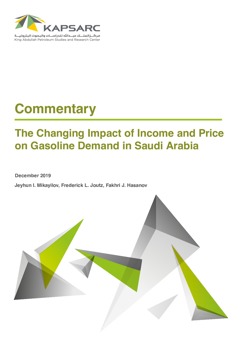
The Changing Impact of Income and Price on Gasoline Demand in Saudi Arabia



11 December 2019
The growth path of gasoline demand, a key strategic fuel, has important implications for oil security, oil-related carbon emissions, and refinery investment (Dahl 2012). As such, understanding how fluctuations in income and gasoline prices could affect the demand for oil in Saudi Ara...
Read More54

COP 25: Negotiating the Rules for a Future Global Carbon Market Under Article 6

09 December 2019
The design of the rulebook for Article 6 of the Paris Agreement is one the most significant and highly anticipated outcomes of the twenty-fifth session of the Conference of the Parties (COP 25) taking place in Madrid in December 2019.
Read More40

India’s Push to Renegotiate Long-Term LNG Contracts


08 December 2019
On August 26, 2019, India’s petroleum minister Dharmendra Pradhan announced that he would consider “a review of liquefied natural gas (LNG) prices under [India’s] long-term contracts”. However, Mr. Pradhan did not lay out a timeline for the review and reiterated that existing contrac...
Read More42
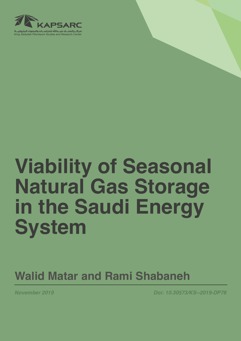
Viability of Seasonal Natural Gas Storage in the Saudi Energy System


08 December 2019
Saudi Arabia expects to double its natural gas production within the next decade. This increased domestic supply is expected to meet the demand for gas from Saudi Arabia’s industrial development and, most importantly, to displace liquid fuels in its electricity sector. Given the stro...
Read More48

India's Transport CO2 Emissions and Value Added Contribution

05 December 2019
India is one of the largest economies in the world and, consequently, holds an important position in global climate politics. According to India’s Ministry of Road Transport and Highways, the country has some 230 million vehicles. This insight sheds light on the contribution of the t...
Read More47

What is Behind the Recent Fall in Saudi Arabia’s CO2 Emissions?



04 December 2019
The International Energy Agency has recently released data showing that in 2018 Saudi Arabia’s carbon dioxide (CO2) emissions fell by 15 million tonnes of CO2 (MtCO2), or 2.7%, from 577 MtCO2 to 562 MtCO2. This is significant as it is Saudi Arabia’s first large policy-induced reducti...
Read More47

Techo-economic Assessment of a Solar Powered Absorption Chiller Coupled With Shallow-geothermal Ground Loop



04 December 2019
Read More
35

The Impact of Global Trade Disruptions on World Oil Markets




04 December 2019
After decades of relatively smooth trade liberalization, a wave of protectionist measures and a global trade war is now threatening world trade. On September 1, 2019, the United States (U.S.) imposed a new series of tariffs on Chinese imports worth more than $100 billion.
Read More44

Aramco’s LNG strategy: Opportunities and Options


04 December 2019
Saudi Arabia has taken a major step into global gas markets with Saudi Aramco signing a heads of agreement (HoA) with Sempra Energy. The HoA includes a 20-year sales and purchase agreement (SPA) for 5 million tonnes per annum (MTPA) of liquefied natural gas (LNG) from phase 1 of the ...
Read More42

Renewable Energy and Employment: The Experience of Egypt, Jordan and Morocco

03 December 2019
While the renewable energy sector needs more workers per megawatt of energy generated than fossil fuel-based energy sectors, a sound and dynamic labor market is necessary for local populations to enjoy the benefits of employment. A well-functioning market can help improve labor marke...
Read More51

Impact of India’s Recent Electric Vehicle Subsidy Announcement



03 December 2019
The Indian government is urgently promoting electric vehicles (EVs) to help curb the country’s urban air pollution — the world’s worst, according to the World Health Organization. The steep increase in vehicle sales in recent years has brought deteriorating air quality and made India...
Read More48

Modeling Industrial Energy Demand in Saudi Arabia and Understanding Its Drivers


03 December 2019
In 2016 Saudi Arabia’s industrial (or manufacturing) sector accounted for 30.3% of total final energy consumption (IEA 2018a). When non-energy use (mainly feedstock for the petrochemical subsector) is included, the industrial sector᾽s share of total final energy consumption rises to ...
Read More43

Assisting Energy Policy Instruments: LNG Imports into Saudi Arabia


26 November 2019
Read More
48

Theoretical Framework for Industrial Electricity Consumption Revisited

24 November 2019
Policymakers should expect that the energy price reform in Saudi Arabia will reduce industrial electricity consumption. However, this reduction will be slight as the price effect is found to be very small. At the same time, policymakers should be aware that the increasing population ...
Read More42

The Geopolitics of the Energy Transition
24 November 2019
Starting in 2017, KAPSARC and the Clingendael International Energy Program (CIEP) have convened a series of workshops on the Role of Oil in the Low Carbon Energy Transition. This workshop held on April 25th, 2019 took place in Hus Clingendael, The Hague, under a modified version of t...
Read More36

Electricity Demand Growth in Saudi Arabia: Cyclical Stagnation or Structural Adaptation?

24 November 2019
A recent International Monetary Fund report noted that in 2018, Saudi Arabia’s energy price reforms generated 41.3 billion Saudi riyals (SAR) (11 billion US$) in new non-oil revenue for the government. The power sector contributed 25% of this revenue gain (10.1 billion SAR or 2.5 bil...
Read More47

The ‘IPhone Effect’: The Impact of Dual Technological Disruptions on Electrification




22 November 2019
Meeting climate change goals requires both the decarbonization of the electricity sector and the electrification of much of the rest of the economy. However, the electricity sector is navigating major disruptions that are changing the regulatory and business landscape. This article f...
Read More43

A Conceptual Framework for the Integrated Studies of Energy Transformation in Smart Cities

21 November 2019
The benefits of smart city are enormous. But the list of challenges in their planning, development, and operation is long and difficult to overcome. Two important questions to policymakers and stakeholders: (1) What are the new energy problems in smart city? and (2) What are the appr...
Read More40

The Potential for Distributed Solar PV Systems in Riyadh


18 November 2019
The country’s regulator, the Electricity and Co-Generation Regulatory Authority (ECRA) has also released provisional bylaws that will govern how distributed generation (DG) would be compensated within the Kingdom. Many governmental organizations mandated to support local industries a...
Read More38
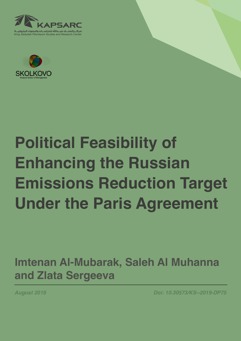
Political Feasibility of Enhancing the Russian Emissions Reduction Target Under the Paris Agreement



13 November 2019
It is widely recognized that the commitments set out in the Paris Agreement fall short of achieving the 2 degrees Celsius global warming target, agreed as the central goal of the agreement and its parties. Given this, KAPSARC has set out to explore the political feasibility of enhanc...
Read More45

Growing energy demand in the GCC countries


12 November 2019
The energy sector in GCC countries plays a vital role in achieving economic and social development and contributing to the Gross Domestic Product (GDP). Furthermore, the energy sector plays a major role in meeting the water and food needs in these countries that have harsh climate co...
Read More36

Achieving Climate Goals by Closing the Loop in a Circular Carbon Economy

07 November 2019
On October 30, the Saudi Minister of Energy, Prince Abdulaziz bin Salman, announced at the Future Investment Initiative that “the Kingdom of Saudi Arabia offers the concept of a circular carbon economy … Such a closed-loop system, much like what happens in nature, will help restore t...
Read More38

India’s Automotive Fuel Policies: Evolution and Challenges


06 November 2019
India, like many other countries, is seeking to diversify its automotive fuel mix away from conventional petroleum fuels to alternate, cleaner fuels. The primary reasons for its diversification are e...
and addressing the growing concerns of energy security and rising crude oil imports.
42
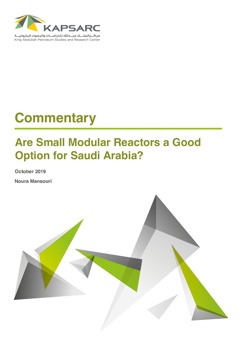
Are Small Modular Reactors a Good Option for Saudi Arabia?

03 November 2019
Since the start of nuclear power in the 1950s, nuclear generation technology has continually transformed and developed. Following the three major nuclear accidents, Three Mile Island, Chernobyl and Fukushima, nuclear power has become more robust, safer and more secure.
Read More50

A Household’s Power Load Response to a Change in the Electricity Pricing Scheme: An Expanded Microeconomic-physical Approach

01 November 2019
Energy economists are interested in how changes in electricity prices prompt a response in end-user electricity demand. If historical prices are low or seldom change, it becomes difficult to estimate price elasticities statistically , especially in the short-run. Thus, a framework th...
Read More34
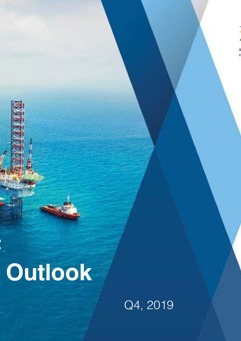
KAPSARC Oil Market Outlook
31 October 2019
Our supply/demand forecast is an average for each period and does not take into account short term volatility. Actual changes will, of course, remain volatile amid continued geopolitical events. These challenges include sanctions, trade and technology tensions, a growing number of co...
Read More43

Assessing Politics in Market Projections-Restarting Japanese Nuclear Reactors and Global Gas Markets


27 October 2019
This paper explores the value of explicitly integrating the modeling of political concerns into a model of energy market projections. This is achieved by assessing the impact on global gas markets of political constraints on restarting Japanese nuclear reactors. The 2018 KAPSARC disc...
Read More45

Can Japanese Nuclear Power Be Restarted Sooner? A Simulation of Alternative Scenarios




27 October 2019
This study assesses whether there are politically plausible paths to more quickly gain support for restarting Japanese nuclear power plants and considers alternative scenarios. It builds on the 2018 KAPSARC discussion paper, “The Policymaking Process to Restart Japanese Nuclear Power...
Read More44
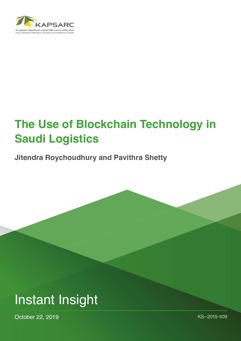
The Use of Blockchain Technology in Saudi Logistics


22 October 2019
On September 21, 2019, Saudi Customs, the Ministry of Communications and Information Technology, the Saudi Ports Authority, and the logistics firm, A.P. Moller – Maersk, jointly announced the successful completion of a blockchain pilot project tracking a shipping container from King ...
Read More37

A Short-Term Forecasting Model for Brent Oil Prices




20 October 2019
The KAPSARC Oil Market Outlook (KOMO) has been designed to provide readers with a timely source of data, forecasts and analysis of world oil markets, including an understanding of the key factors affecting world oil prices. This paper gives a detailed description of the scope of KOMO...
Read More48

Electricity Sector Reforms in Abu Dhabi and Oman: What Have We Learned?



20 October 2019
Chile was the first country to reform its electricity sector. The reform program was first mooted when Chile’s National Energy Commission was established in 1978; it took off with the enactment of the country’s Electricity Sector Law in 1982. This law is still cited as landmark legis...
Read More45

Oil-dependent economies are vulnerable to macroeconomic fiscal instability stemming from high oil price volatility in the short – run and the exhaustibility of oil in the long – run. The workshop discussed the main challenges confronting oil-dependent economies that could stop them f...
Read More40
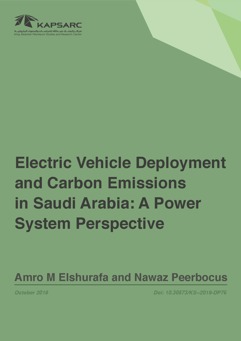
Electric Vehicle Deployment and Carbon Emissions in Saudi Arabia: A Power System Perspective


09 October 2019
A power system model for Saudi Arabia was built to quantify the carbon emission implications of deploying electric vehicles (EVs) within the Kingdom. The model represented the four operating regions in the Kingdom as segmented by the electricity regulator.
Read More37
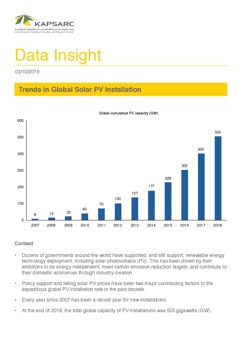
Trends in Global Solar PV Installation

06 October 2019
Dozens of governments around the world have supported, and still support, renewable energy technology deployment, including solar photovoltaics (PV). This has been driven by their ambitions to be energy independent, meet carbon emission reduction targets, and contribute to their dome...
Read More44

The Role of Oil in the Allocation of Foreign Aid: The Case of G7 Donors


03 October 2019
Aid allocated by G7 donors increases significantly with oil endowment of recipient countries. Motivated by energy security concerns, G7 donors compete for oil resources in their provision of foreign aid.
Read More37

Degree of stringency matters: Revisiting the pollution haven hypothesis based on the heterogeneous panels and aggregate data
01 October 2019
Empirical studies on the trade-environment nexus that use panel data face two simultaneous challenges. One is associated with the potential presence of unobserved cross-country heterogeneity, while the other is due to the use of aggregate data. In this paper, we apply both the dynami...
Read More34

The Potential of Distributed Solar PV Capacity in Riyadh: A GIS-Assisted Study


01 October 2019
Rooftop solar photovoltaic (PV) systems, commonly referred to as distributed generation (DG) solar systems, can play a central role in the energy mix for sustainable cities. As with all forms of power generation, DG carries technical, financial, policy, and market implications that i...
Read More41

Crude Oil Use in the Saudi Electricity Sector

29 September 2019
The Kingdom of Saudi Arabia has taken several measures to promote sustainability in its electricity sector. In 2016 and 2018, the government of Saudi Arabia introduced a range of reforms as part of Saudi Vision 2030 to modernize the economy and make it less reliant on oil revenues. T...
Read More46

Behavioral Analysis on Developing a GCC Power Market

29 September 2019
In 2011, the Gulf Cooperation Council Interconnection Authority (GCCIA) completed the construction of a regional power grid connecting the Gulf states. Its main purpose was to provide backup in case of power emergencies. The grid also increases the likelihood of developing a common p...
Read More43

Political Feasibility of Enhancing India’s Midcentury Target for Emissions Intensity




18 September 2019
India’s greenhouse gas emissions have grown along with its rapid economic growth, making it the world’s third-largest emitter after China and the United States. Under the Paris Agreement, India has committed to reduce its emissions intensity relative to its GDP by 33-35% by 2030, com...
Read More39

India’s Increasing Imports of Crude Oil

18 September 2019
Surging global benchmark crude oil rates, tied with a depreciating Indian rupee against the United States dollar (US$) and India’s increasing dependence on crude oil imports, are likely to push India’s crude oil import bill higher. This insight sheds light on the historical trends of...
Read More42

An Improved Understanding of The Balance of System Costs Can Improve The Economics of Solar PV Projects


18 September 2019
Much of the discussion around the cost of solar photovoltaic (PV) generation has focused on the costs of PV modules that convert sunlight to electricity. The overall capital cost of a PV system consists of two components: the cost of the modules and the balance-of-systems (BOS) costs...
Read More34

Estimating the Household Consumption Function in Saudi Arabia: An Error Correction Approach




17 September 2019
We estimate a micro-founded life-cycle consumption model for Saudi Arabia over the period 1970–2017 using error correction model procedures. Dynamic adjustments are significant, and both income and wealth are found to have significant effects, with a long-run marginal propensity to c...
Read More37

Temperature Trends Across Cities in Saudi Arabia


15 September 2019
KAPSARC examined temperature data for 11 cities spread across Saudi Arabia over 10 years. Except for Makkah, all cities in Saudi Arabia were warmer in 2018 compared with the national
10-year average.
44

The Challenges in Measuring Global Oil Production
12 September 2019
, Bloomberg, Reuters, the Middle East Energy Survey (MEES) and Energy Aspects. Many of the current data providers, notably media organizations, tend to focus on month-end snapshots, leaving larger energy organizations and consulting firms to provide more accurate data on energy balan...
Read More42

US Rolls Back Regulation but the Oil Industry Moves Forward

12 September 2019
On August 28, 2019, the United States (U.S.) Environmental Protection Agency (EPA) proposed a series of amendments to Obama-era environmental regulations covering greenhouse gas (GHG) emissions that it claims will save the oil and gas industry millions of dollars in compliance costs....
Read More40

An overview of key evolutions in the light-duty vehicle sector and their impact on oil demand





09 September 2019
The light-duty vehicle (LDV) sector is undergoing many changes, including technological advancements (e.g., vehicle electrification, automation), new business models (e.g., ride-hailing), and government regulations and policies (e.g., fuel economy (FE) standards, zero-emission vehicl...
Read More41
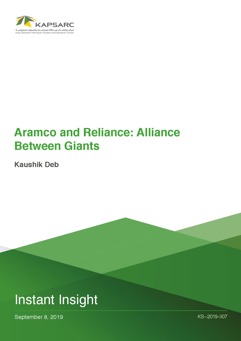
Aramco and Reliance: Alliance Between Giants

09 September 2019
India’s Reliance Industries Ltd (RIL) announced at its 42nd annual general meeting that it had signed a letter of intent to sell a 20% stake in RIL’s chemicals, refining and fuel marketing (oil-to-chemicals [O2C]) business to Saudi Aramco in a deal valued at $15 billion. This deal in...
Read More35

Assessing Energy Policy Instruments: LNG Imports Into Saudi Arabia


02 September 2019
Natural gas is already playing a prominent role in diversifying Saudi Arabia’s power mix away from a heavy reliance on oil-based fuels. Between 2010 and 2017, the share of natural gas used in power generation in Saudi Arabia grew from 44% to 54%. The country’s gas fields are being de...
Read More49

Is the Time Ripe for Private Investment in Interconnections in the MENA Region?

02 September 2019
Efforts to integrate power systems and markets in the Gulf Cooperation Council (GCC) countries and the wider Middle East and North Africa (MENA) region are gaining momentum. With rapidly growing regional electricity demand, the development of an integrated electricity market ha...
Read More46

Solar PV on mosque rooftops: Results from a pilot study in Saudi Arabia


01 September 2019
Read More
38

Gasoline Price Reform in Saudi Arabia


01 September 2019
Saudi Arabia has been adjusting gasoline prices on a quarterly basis since the start of 2019, with the most recent adjustment occurring on July 14, 2019. These adjustments depend on changes in international oil prices, and are smaller than the major changes in gasoline prices that oc...
Read More52
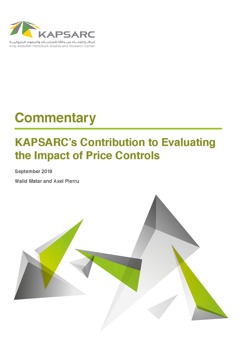
KAPSARC’s Contribution to Evaluating the Impact of Price Controls


01 September 2019
has just published a paper, “Measuring the effects of price controls using mixed complementarity models” (2019). It detailed a series of innovative modeling approaches developed by KAPSARC researchers over the last six years. The models were used to study the effects of administered...
Read More53

Finding a Viable Path to Reducing Greenhouse Gas Emissions










29 August 2019
A viable, least-cost pathway to a low greenhouse gas (GHG) emissions future must lie within the United Nations Framework Convention on Climate Change (UNFCCC) Paris Agreement. The rulebook for the Agreement was in many ways rewritten at the 2018 United Nations Climate Change Co...
Read More43

Techno-Economics of Solar PV on Mosque Rooftops: Results from a Pilot Study in Saudi Arabia


28 August 2019
There are an estimated 3.5 million mosques worldwide. The relatively large surface area of most mosque rooftops and their ubiquity in the Muslim world make them excellent candidates for solar photovoltaic (PV) installations. Muslims congregate for prayers at mosques five times ...
Read More49

The Political Feasibility of Enhancing Greenhouse Gas Emissions Targets in the European Union’s Mid-Century Strategy



22 August 2019
Article 4.19 of the 2015 Paris Agreement calls on signatories to formulate and communicate “long-term low greenhouse gas development strategies,” widely known as the mid-century strategy (MCS). Any enhancement of the European Union’s (EU’s) targets in its MCS depends on a new long-te...
Read More45

India’s Oil Imports: Achilles’ Heel or Economic Javelin?



21 August 2019
Presenting India’s 2019 budget on July 5, Finance Minister Nirmala Sitharaman sketched out the Modi government’s vision of becoming a $5 trillion economy by 2024, almost doubling the country’s current gross domestic product (GDP) of $2.73 trillion. To achieve this ambitious goa...
Read More40

How does Saudi Arabia’s recent energy performance compare with other G20 countries?



20 August 2019
The 68th annual edition of the BP Statistical Review, released recently, is a comprehensive account and analysis of global energy data. Saudi Arabia will be hosting the G20 summit in 2020, and the release of BP’s annual compilation provides a good opportunity to benchmark t...
Read More47

The Upper Limit of Distributed Solar PV Capacity in Riyadh: A GIS-Assisted Study


08 August 2019
Rooftop solar photovoltaic (PV) systems, commonly referred to as distributed generation (DG) solar systems, are deemed important contenders in future sustainable cities. Because deploying DG systems is associated with technical, financial, policy, and market implications that impact ...
Read More39

Understanding Potential for Battery Electric Vehicle Adoption Using Large-scale Consumer Profile Data

01 August 2019
Ten U.S. states have set mandated sales targets for zero-emission vehicles that could result in significant reductions in fuel consumption and carbon emissions. Battery electric vehicle (BEV) adoption is considered integral to achieving this mandate and thus a better understanding of...
Read More37

Paris Agreement CCS Policy and Mechanisms
29 July 2019
- Demand for CSUs could be incorporated into existing ...
- The ongoing Article 6 negotiations could play a facilitative role in CSU implementation by including multiple metrics based on countries’ national preferences, reflecting the Agreement’s bottom-up spirit of cooperation.
46

Using Insurance to Manage Reliability in the Distributed Electricity Sector: Insights From an Agent-Based Model

21 July 2019
- The purchase of insurance would help most consumers avoid a complete loss of power. Our simulations show that of those households that would otherwise experience a complete loss of power, on average between 1% and 15% can fully cover their excess energy needs through insurance. Betw...
49

Impact of China’s Plug-In Electric Vehicle Subsidy Reduction


17 July 2019
PEV subsidies are one of the most commonly used policy levers for encouraging PEV purchases globally, including in China. They reduce the high up-front purchase price of PEVs relative to comparable ICEVs, one of the major barriers to PEV adoption. Since 2009, PEVs qualify for su...
Read More41

An adaptive policy-based framework for China’s Carbon Capture and Storage development



12 July 2019
) emissions will peak around 2030 and enacting measures through the 13th Five-Year Plan to support energy efficiency, clean energy technology, and carbon management. Chinese policymakers consider carbon capture and storage (CCS) a critical bridging technology to help accelerate the d...
Read More39

How to Empower Saudi Women in the Labor Force?

07 July 2019
In the week when Saudi Arabia celebrated its first anniversary of women drivers in the Kingdom and Crown Prince Mohammed bin Salman accepted the chair of the G20 summit for 2020, G20 countries – including Saudi Arabia – reaffirmed their commitment to furthering the empowerm...
Read More48

State-of-Charge Effects on Standalone Solar-Storage Systems in Hot Climates: A Case Study in Saudi Arabia


24 June 2019
In this paper, we quantify the economic and environmental implications of operating a standalone photovoltaic-battery system (PVB) while varying the battery’s minimum allowable state of charge (MSOC), the load profile, and simultaneously incorporating ambient temperature effects in h...
Read More47

The Future of Gas in the Gulf: Continuity and Change


15 June 2019
. The book comprises in-depth studies of a smaller set of countries, but those of critical regional and international importance to the future of gas: Qatar, Iran, Oman, Saudi... https://www.oxfordenergy.org/shop/the-future-of-gas-in-the-gulf-continuity-and-change/?v=3dd6b9265ff1
Read More42

Gas Demand Growth Beyond Power Generation

31 May 2019
- Electri...
- Countries including China and India have aggressively promoted the use of natural gas through mandates and subsidies, with the aim of improving local air quality. The success of these initiatives shows that policy support is sometimes needed to promote gas in the energy mix.
47

Oman Electricity Sector: Features, Challenges and Opportunities for Market Integration





29 May 2019
- Regulatory oversight through a financially and administratively independent regulator with an adequate mandate, the Authority for Electricity Regulation, ...
- Oman intends to implement a new arrangement for the future procurement of electricity through the spot market by 2020.
47

An Economic Analysis of China’s Domestic Crude Oil Supply Policies



28 May 2019
- The level of uneconomic oil production in China is highly sensitive to the international oil price. At $50/bbl about 9 million tonnes of domestic supplies are foun...
- Rising crude oil import prices since mid-2017 may allow policymakers to further deregulate China’s domestic oil sector.
50

Balancing Energy Security Priorities: A Portfolio Optimization Approach to Oil Imports



28 May 2019
- The risk premium associated with passing through the Malacca Straits would result in a 27.5% increase in price volatility for China’s oil imports, although the negative impact on its average import price level would be less pronounced, at 2.6% compared to between 5.2% and 5.8% for t...
43

How Total Factor Productivity Drives Long-Run Energy Consumption in Saudi Arabia




21 May 2019
In this study, we investigate how total factor productivity (TFP), alongside income, price, and population, shapes energy consumption in the long-run in Saudi Arabia, the world’s number one oil exporter. To do so,... https://link.springer.com/chapter/10.1007%2F978-3-030-06001-5_8
Read More46

Energy Governance in China: The Structures and Processes of Government Decision-Making



14 May 2019
This paper provides an overview of how key decisions i... The paper’s aim is to provide insights for those outside China who wish to better understand Chinese energy governance, from policymakers, researchers and academics, to diplomats, or corporations wishing to invest in the country.
Read More68

Estimating Freight Transport Activity Using Nighttime Lights Satellite Data in China, India and Saudi Arabia



09 May 2019
The methodology offers a solution to inadequate data access and allows for scenario building in policy planning for transportation. This approach allows for quick estimation of the effects of policy measures and economic changes on transportation activities at a global level. The pap...
Read More42

Iran Sanctions: Implications for the Oil Market




09 May 2019
The paper also simulates the likely impact on the global oil price of ending the waivers in four scenarios which... The analysis in the paper is based on two in-house models: the KAPSARC Toolkit for Behavioral Analysis (KTAB) and the KAPSARC Global Energy Macroeconometric Model (KGEMM).
Read More40

Re-evaluating the Environmental Impacts of Tourism: Does EKC Exist?

09 May 2019
The study investigates the long-run impact of tourism development on ecological footprint by employing the time-varying coefficient cointegration approach (TVC), in addition to the conventional cointegration techniques in the case of Azerbaijan for the period of 1996–2014.
Read More40

The Impacts of Industrialization on Freight Movement in China


09 May 2019
- Chi...
- Changes to the country’s economic structure may also lead to structural changes in modes of freight transportation, including an increased share for rail, the growing use of automotive transportation, and the increased use of containers in an integrated freight transport system.
44

- Reduced costs for new and replacement batteries, reduced electric vehicle manufacturing costs through economies of scale and reduction in electric vehicle (EV) depreciation rates will be critical if EVs are to achieve unsubsidized cost competitiveness with internal combustion engine...
39

Drivers of New Light-Duty Vehicle Fleet Fuel Economy in Saudi Arabia


30 April 2019
- The estimated elasticities, and thus policy sensitivities, vary by income and household size. Thus, a revenue-neutral ‘feebate’ policy – involving taxes on fuel-inefficient vehicles and rebates for fuel-efficient vehicles – could be more progressive than another gasoline price incre...
57
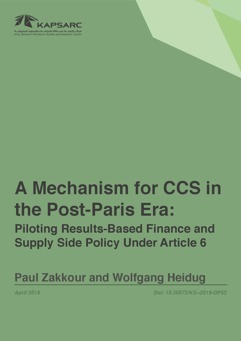
A Mechanism for CCS in the Post-Paris Era


07 April 2019
A new CCS-specific technology mechanism is suggested as a means by wh... The authors argue that their proposed storage crediting scheme can complement and supplement carbon pricing, unlock new layers of climate finance for CCS, and overcome barriers historically faced by the technology.
Read More58

Estimating the Impact of Energy Price Reform on Saudi Arabian Intergenerational Welfare using the MEGIR-SA Model

01 April 2019
In particular, the model analyzes how these price increases might affect the welfare of Saudis through a direct increase in ener... The analysis suggests that the increase in end-user energy prices results in a net overall favorable effect on the intertemporal welfare of all households.
Read More31

Potential of Various Renewable Energy and its Introduction Policy in Southeast Asia






31 March 2019
49

Deepening Cooperation Between Saudi Arabia and China


27 March 2019
This paper also identifies five steps that could enhance the existing model of collaboration: defining a bridging strategy, building capacity, establishing a free trade agreement, encouraging a new partnership for financing, and building a joint research platform for energy collabora...
Read More44

An Empirical Analysis of the Welfare Implications of the Direct Rebound Effect

27 March 2019
Improving the energy efficiency of an energy service, such as lighting, cooling, or driving, makes the service cheaper, normally leading consumers to demand more of it. This additional demand is known as the direct rebound effect.
Read More44

- On average, northern hemisphere summer LNG prices can be $0.50 per million British thermal units...
- Several countries neighboring Saudi Arabia have successfully imported LNG to optimize their fuel mixes. However, such diversification comes with both commercial and technical challenges.
46

Abu Dhabi Electricity Sector - Features, Challenges and Opportunities for Market Integration




03 March 2019
The paper is part of a KAPSARC research project to develop insights that can facilitate the creation of a well-functioning integrated electricity market among members of the GCC and wider Middle East and North Africa region and to suggest potential enablers that could help to fill ex...
Read More43

From Vertical to Horizontal Unbundling: A Downstream Electricity Reliability Insurance Model


01 March 2019
Read More
38

Policy Pathways to Meet Saudi Arabia’s Contribution to the Paris Agreement


27 February 2019
- A Full Fuel Price Reform wher...
44

Adaptive Strategies in the Low Carbon Energy Transition
25 February 2019
- Although the industry will incur costs adapting to changing demand patterns, it could well benefit from the growth in demand for petrochemicals and the oppor...
- Emissions reduction policy is a key pillar of trust between politicians and citizens, and between corporations and consumers.
44

Integrated Approaches to Decentralized Electricity Transitions
20 February 2019
- Testbeds for trialing new business models and electricity sector offerings can offer a reliable and safe way to help stakeholders in the Kingdom better understand the implications of current trends in the electricity industry. The findings can then help inform the development of a n...
50

Households’ Demand Response to Changes in Electricity Prices: A Microeconomic-Physical Approach

14 February 2019
The study calibrates the physical component for a dwelling in Saudi Arabia. Domestic electricity tariffs in the – tiered – progressive pricing structure were partially raised in 2018. In addition to those increases, the response to other electricity pricing schemes is analyzed: time-...
Read More48

Estimating the Household Consumption Function in Saudi Arabia




05 February 2019
The authors’ estimation shows that both income and wealth have significant effects on household consumption in Saudi Arabia, with a long-run marginal pro... The sensitivity of consumption to income and wealth in Saudi Arabia appears to be consistent with the growth of the Saudi economy.
Read More51

The Costs and Gains of Policy Options for Coordinating Electricity Generation in the Gulf Cooperation Council


03 February 2019
We investigate the economic impacts of policies for coordinating electricity production in the Gulf Cooperation Council (GCC) through electricity trade. The GCC countries have installed a network of high-voltage transmission lines that links Saudi Arabia, Bahrain, Kuwait, Oman, Qatar...
Read More35

Electricity Tariff Changes in Saudi Arabia 1974-2018

30 January 2019
The Kingdom of Saudi Arabia’s households account for around 50% of national power consumption, with more than 7 million residential customers in 2017. The majority of this power is used for air conditioning and cooling systems due to the climate in the Kingdom, where the demand for e...
Read More48

In modern economies, the advancement of well‐being of the citizens should be in an inclusive and sustainable way. In this respect, the sustainable welfare targets should exclusively include three main pillars: economic growth, social inclusion, and environmental protection. These pil...
Read More40
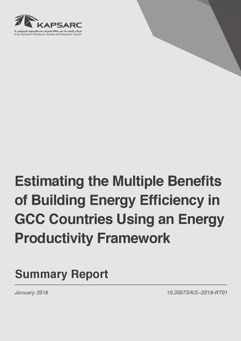
Estimating the Multiple Benefits of Building Energy Efficiency in GCC Countries Using an Energy Productivity Framework



14 January 2019
- A deep energy efficiency retrofit has a payback period for investors of between 11 and 70 year...
- This analysis provides a strong case for public energy efficiency programs, without which building owners are unlikely to invest in the socially optimal amount of energy efficiency.
48

Assessing the Effectiveness of California’s “Replace your Ride.”


04 January 2019
We analyze the effectiveness of California’s “Replace Your Ride” policy, a pilot program that gives subsidies to lower income households in the greater Los Angeles area to retire older vehicles and replace them with newer, cleaner vehicles.
Read More32

Measuring the Cost-effectiveness of Electric Vehicles Subsidies


03 January 2019
Despite the prevalence of plug-in electric vehicle (PEV) subsidies, research on improving their cost-effectiveness and impact remains limited. To assess the scope for improving their cost-effectiveness, we develop a vehicle choice model-based counterfactual simulation using a large-s...
Read More40

Chapter 2 – Role of Economy and Income to Fall in Energy Poverty: Policy Act

01 January 2019
Fuel poverty is a complex and multi-scale issue, which relating the household-level to the country-level and the demand-side to the supply-side. The fuel poverty situation is shaped by various factors, including household social and economic conditi... Read Full Book Chapter Here
Read More40

The Economic Impact of Price Controls on China’s Natural Gas Supply Chain





01 January 2019
Despite significant progress made by China in liberalizing its natural gas market, certain key areas such as market access and pricing mechanisms remain controlled by the government.
Read More32

Measuring the Effects of Price Controls Using Mixed Complementarity Models


01 January 2019
Read More
35

Blind Spots in Energy Transition Policy: Case Studies From Germany and USA


01 January 2019
Energy transitions aim at economic prosperity through ‘green-collar’ job-creation, greater energy ‘independence’, and/or reduced emissions. These objectives imply creating policy-supported national renewable technology industries, ideally reducing clean energy costs to a point where ...
Read More37
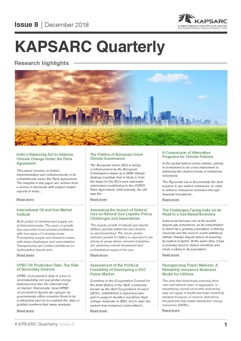
KAPSARC Quarterly Issue 8
31 December 2018
The research summaries in this issue are grouped into four themes: climate change; oil and gas; electricity; and Asia. Opening with an overview of KAPSARC’s most recent work on climate change, we also highlight our latest research on global oil and gas issues, electricity markets and...
Read More48

The Policymaking Process to Restart Japanese Nuclear Power Plants





31 December 2018
- The Nuclear Regulation Authority (NRA) appears to be a credible and effective voice in building political acceptance of restarti...
- Despite the turbulence in Japanese politics in 2017, the trend of slowly growing political will in favor of nuclear power appears to be largely unchanged.
52

A Comparison of Alternative Programs for Climate Policies



30 December 2018
As an alternative, we evaluate a methodology that could fund investments to reduce carbon dioxide (CO2) emissions, and we show that the policy we consider to be optimal from a tax standpoint – Ramsey pricing can both improve world welfare and be politically more acceptable than ...
Read More51

International Oil and Gas Market Outlook
18 December 2018
- Worldwide LNG supply and liquefaction capacity are growing. The expansion of global liquefaction&nbs...
- Market coordination can help regional partners achieve energy transition goals by improving international connections through natural gas markets and regional electricity trade.
43

India’s Balancing Act to Address Climate Change Under the Paris Agreement




12 December 2018
- India tends to take a conservative appr...
- The Prime Minister of India has the final say on climate policy matters, but consults with and is advised by a small number of actors in his Council on Climate Change. Think tanks play a major supporting role in climate policymaking.
44

China's Policy Drivers of Future Energy Demand
10 December 2018
- China’s evolving approach to international energy collaboration, from securing supplies towards a more comprehensive collaboration, will have an increasing impact on its domestic energy demand. The transfer of China’s industrial capacity and labor to Belt and Road Initiative countri...
50

Effect of Preferential Trade Agreements on China’s Energy Trade From Chinese and Exporters’ Perspectives



29 November 2018
China is a major energy import powerhouse, its trade deals have significant impact on international energy trade and global energy markets. The purpose of this paper is to explore the role of energy in China’s preferential trade agreements (PTAs) and their impact on Chinese imports o...
Read More41

Reorganizing Power Markets: A Reliability Insurance Business Model for Utilities



26 November 2018
In this paper, we propose a market mechanism that may ameliorate this potential distortion based on the creation of a market for risk. Utilities would provide reliability insurance services to households to protect them against the failure of their own DER systems. Creating...
Read More46

OPEC Oil Production Data: The Role of Secondary Sources


17 November 2018
- Tanker tracking techniques using Automatic Identification System monitoring and satellite imagery are still in their infancy and do ...
- Although much of the data secondary sources collate is unverifiable, there are currently no alternative sources or methodologies that are more robust.
47

Assessing the Impact of Natural Gas on Natural Gas Liquids: Policy Challenges and Imperatives


15 November 2018
NGLs may present a silver lining to the future of natural gas, given their close links. The power sector is usually considered the principal driver of future demand growth. However, natural gas is likely to have a bigger role to play in future, given the essential role of NGLs i...
Read More46

Oil and Oil-related Products Exported via Saudi Ports

01 November 2018
Saudi Arabia ranks as the world’s largest exporter of crude oil and petroleum products; the oil and gas sector accounts for about 70 percent of export earnings. Ras Tanura and Yanbu are the major oil-exporting ports in Saudi Arabia, accounting for nearly 99 percent of total exports. ...
Read More48

The Challenges Facing India on its Road to a Gas-Based Economy



29 October 2018
- Progress has been hampered by jurisdictional conflicts...
- Gas pipelines are currently limited to regions where domestic gas production and LNG import terminals are located. Realizing the vision of a gas-based economy in India will require a clear roadmap and coherent planning approach.
50

The Politics of European Union Climate Governance



25 October 2018
- A struggle has emerged for leadership within the...
- Despite some changes in governments, the national climate position of EU member states remains stable.
- Poland, perhaps supported by other coal-dependent countries, is likely to remain an obstacle to more ambitious EU climate targets.
48

The Economics of Renewable Energy in the Gulf







17 October 2018
Ghada Abdulla, Hisham Akhonbay, Abdullah Al-Badi, Walid Ali, Odeh Al-Jayyousi, Imtenan Al-Mubarak, Maha Alsabbagh, Omar Al-Ubaydli, Moiz Bohra, Sylvain Cote, Nasreddine El-Dehaibi, Amro Elshurafa, Bassam Fattouh, Stephen Gitonga, Steve Griffiths, Marwan Khraisheh, Walid...
Read More44

Saudi Arabia Population Pyramid

09 October 2018
Key insights into Saudi Arabia’s workforce demography.
Read More45

Assessment of the Political Feasibility of Developing a GCC Power Market





04 October 2018
Countries in the Cooperation Council for the Arab States of the Gulf, commonly known as the Gulf Cooperation Council (GCC), established a regional power grid to support member countries’ high voltage networks in 2001 but, to date, the system has remained underutilized. The ...
Read More50

Saudi Arabia’s Passenger and Freight Railway Network

27 September 2018
We have launched a new series of Data Insights which aim to share topical insights and data on a range of interesting themes. The first insight of the series is focused on Saudi Arabia’s passenger and freight railway network.
Read More54

An Estimation of the Drivers Behind OPEC’s Quota Decisions


19 July 2018
This paper identifies key determinants that appear to shape OPEC’s quota strategy and implementation. Using econometric estimations, it examines the factors that seem to most influence members’ adherence to their production commitments in the short term and what drives the organizati...
Read More55

Policy Lessons From China’s CCS Experience


02 July 2018
China’s political leadership has taken an increasingly public and proactive stance on climate change since 2014. This includes a commitment that Chinese carbon dioxide (CO2) emissions will peak before 2030 and enacting measures through the 13th Five-Year Plan to support energy effici...
Read More45
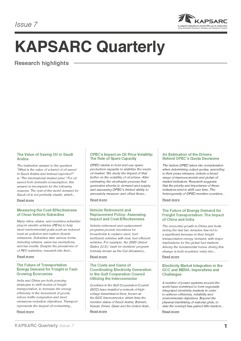

Energy productivity analysis framework for buildings: a case study of GCC region



01 July 2018
A new analysis framework is developed and applied to assess the benefits of building energy efficiency policies and programs. One of the main advantages of the new energy productivity analysis is that it accounts for both economic and energy performances of energy efficiency actions ...
Read More31

Fostering Joint Leadership on Energy Productivity Transitions in Saudi Arabia and China
01 July 2018
This workshop explored specific opportunities where the Kingdom of Saudi Arabia and China can benefit from cooperation around efforts to improve industrial energy productivity. This is especially timely as both countries move into a closer phase of engagement under China’s Belt and R...
Read More48

Rising electricity demand and growing fiscal constraints have encouraged governments in the Gulf Cooperation Council (GCC) and Middle East and North Africa (MENA) regions to consider more cooperative approaches to delivering reliable and affordable electricity services. The developme...
Read More45

The Costs and Gains of Coordinating Electricity Generation in the Gulf Cooperation Council Utilizing the Interconnector


10 June 2018
Countries in the Gulf Cooperation Council (GCC) have installed a network of high-voltage transmission lines, known as the GCC Interconnector, which links the member states of Saudi Arabia, Bahrain, Kuwait, Oman, Qatar and the United Arab Emirates (UAE). The Interconnector has success...
Read More48

Potential Effects of Trade Liberalization on China’s Imports of Plastics From the GCC



04 June 2018
Petrochemical products, particularly plastics, contribute to a significant share of expanding and increasingly diverse trade flows between the Gulf Cooperation Council (GCC) countries and China. The petrochemical sector could benefit from a preferential bilateral trade regime between...
Read More43

OPEC’s Impact on Oil Price Volatility: The Role of Spare Capacity

01 June 2018
OPEC claims to hold and use spare production capacity to stabilize the crude oil market. We study the impact of that buffer on the volatility of oil prices. After estimating the stochastic process that generates shocks to demand and supply, and assessing OPEC’s limited ability to acc...
Read More40

Unintended consequences of China’s coal capacity cut policy


01 June 2018
In early 2016, China introduced additional capacity cut policies to rebalance supply in the coal market to match demand that had been reduced by slow economic growth and strict environmental regulation. Ensuing disruptions to the coal market caused these policies to be revised and, s...
Read More29

The impact of financial development on energy consumption: Evidence from an oil-rich economy

01 June 2018
This paper examines the relationship between energy consumption, financial development, and economic growth in an oil-rich economy—Azerbaijan—employing cointegration techniques to the data ranging from 1992 to 2015. The results confirm the existence of a long-run relationship among t...
Read More43

Benefits of energy efficiency programs for residential buildings in Bahrain


01 June 2018
This paper outlines the approach and the cost-effectiveness potential for designing and retrofitting residential buildings to be energy-efficient in Bahrain. The analysis is focused on residential buildings since these buildings consume over 48% of the total electricity used in Bahra...
Read More47

The impact of international trade on CO2 emissions in oil exporting countries: Territory vs consumption emissions accounting


01 June 2018
While international trade and Carbon dioxide (CO2) emissions have been well-studied, a panel of only oil-exporting developing economies has not been considered. This paper addresses that gap by investigating the role of the trade in CO2 emissions using a panel of nine oil exporting c...
Read More42

The responsiveness of fuel demand to gasoline price change in passenger transport: a case study of Saudi Arabia
01 June 2018
Empirical estimates of fuel demand changes to price variation are based on historical consumption and prices, and can be applied as a single point estimate to a wide range of price movements. However, if fuel prices are set outside the boundaries of historical changes, policymakers m...
Read More57

Gasoline savings from clean vehicle adoption


01 June 2018
Conventional counterfactuals used in literature may underestimate fuel savings from clean vehicle adoption, thus overestimating the costs of securing associated environmental benefits. Using a large-scale nationally representative sample of U.S. new car buyers, we propose a choice mo...
Read More34

Households’ response to changes in electricity pricing schemes: Bridging microeconomic and engineering principles

01 June 2018
This paper presents a computational take on households’ response to price changes. Many studies use assumptions (i.e., price elasticities) that were estimated using historical information; however, if a price change has not been experienced in the past, the response may not be statis...
Read More34

Estimating the learning curve of solar PV balance–of–system for over 20 countries: Implications and policy recommendations




01 June 2018
Solar photovoltaic systems installed on homes and commercial building rooftops are deemed central for a low-carbon future. As capital costs of photovoltaics continue to fall, its role towards making buildings more sustainable and environmentally-friendly will continue to grow. Capita...
Read More40

The impact of economic growth on CO2 emissions in Azerbaijan



01 June 2018
This paper investigates the relationship between the economic growth and CO2 emissions in Azerbaijan. A cointegration analysis is conducted over the period 1992–2013. For getting more robust results, Johansen, ARDLBT, DOLS, FMOLS and CCR methods are employed to explore cointegration ...
Read More35

Economic policy instruments and market uncertainty: Exploring the impact on renewables adoption

01 June 2018
The success of any renewable policy can be measured through three parameters: total cost, aggregate installed capacity of renewable technology deployed over the lifetime of the policy and speed at which renewables are adopted. Using these three parameters, this study allows us to exp...
Read More38

Electricity transmission formulations in multi-sector national planning models: An illustration using the KAPSARC energy model


01 June 2018
The purpose of this study is to assess the policy-relevant effects of incorporating a more proper representation of electricity transmission in multi-sector national policy models. This goal is achieved by employing the KAPSARC Energy Model (KEM), which is the first publicly availabl...
Read More42

Over the last decade, India and China have become leading consumers of energy, especially oil, with freight transportation accounting for a large portion. The growth in total transport energy use is directly correlated with the fast-paced urbanization and industrialization of these t...
Read More38

Decoupling of CO2 emissions and GDP: A time-varying cointegration approach



01 June 2018
The relationship between CO2 emissions, the main gas responsible for global warming, and economic growth is among the most studied themes of environmental economics. Reducing overall emissions while keeping a high pace of economic development is at the heart of the sustainable develo...
Read More41
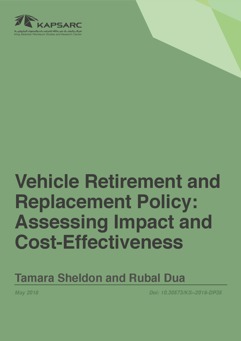
Vehicle Retirement and Replacement Policy: Assessing Impact and Cost-Effectiveness

24 May 2018
Governments across the world, motivated by air quality improvement or by climate change mitigation goals, are trying to accelerate the turnover of older, higher-emitting vehicles and replace these with lower emission vehicles. One approach is to encourage consumers to scrap their old...
Read More47

The Economic Impact of Price Controls on China’s Natural Gas Supply Chain





24 May 2018
Despite significant progress made by China in liberalizing its natural gas market, certain key areas such as market access and pricing mechanisms remain heavily monopolized or controlled by the government. To assess how such distortions impact the market, we developed a Mixed Complem...
Read More66

Identifying the Roadblocks for Energy Access: A Case Study for Eastern Africa’s Gas


20 May 2018
Natural gas resources in Tanzania and Mozambique have emerged as a new source of gas supply. While they are poised for export to global gas markets, they can also provide a key source of energy to the rest of Eastern Africa (defined in this paper to include Burundi, Ethiopia, Kenya, ...
Read More47
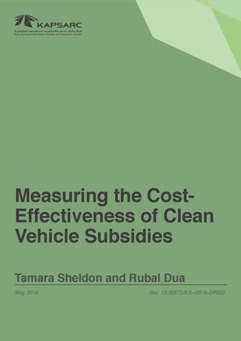
Measuring the Cost-Effectiveness of Clean Vehicle Subsidies

10 May 2018
Demand-side policies, including rebates, sales tax exemptions, and tax credits promote clean vehicle adoption, with the goal of reducing local air pollution and greenhouse gas (GHG) emissions. Limited research to date on their cost-effectiveness and efficiency suggests such subsidies...
Read More66

Understanding the Energy Transition
18 April 2018
The world of energy is always undergoing transition, but the nature of the current phase of the transition is subject to a wide spectrum of interpretations that are often colored by bias and aspirations for a particular future end-point. In its simplest form, the energy transition is...
Read More48

The International Energy Agency (IEA) and KAPSARC co-hosted an expert workshop on the potential of advanced carbon dioxide (CO2 ) enhanced oil recovery (CO2 -EOR) to decarbonize oil production. The workshop focused on the potential for using CO2 -EOR for CO2 storage and increasing oi...
Read More43

Energy demand elasticities and weather worldwide



01 April 2018
The purpose of this paper is to empirically estimate a model of aggregate residential and commercial energy demand elasticities, taking into account capital stock and climatic effects. We model a theoretically founded non-linear energy demand system, the generalized almost ideal, for...
Read More37

China and India’s movement of freight have in recent decades produced a significant increase in energy demand. Economic shifts and population growth in these two countries have played a major role in driving this development. The right data and a better knowledge of the trends that a...
Read More42

The Value of Saving Oil in Saudi Arabia



25 March 2018
What is the value of saving a barrel of oil that would otherwise had been consumed domestically? This study explores the question, taking a long-run perspective into a general equilibrium approach. In the case of Saudi Arabia, the difference between the domestic price of oil and the ...
Read More40

Economic Cycles and the Responsiveness of Natural Gas Demand in China’s Residential Sector
05 March 2018
An important question for global gas markets is the extent to which China’s demand for natural gas will grow, particularly in light of the perceived overbuild of liquefied natural gas (LNG) supply capacity. China’s current 13th Five-Year Plan endorses the use of natural gas to reduce...
Read More44


Policy Levers for Promoting Sustainable Mobility
28 February 2018
An effective transport policy framework would take into account the costs of rising local pollution, congestion, accidents and global greenhouse gas emissions. The various supply- and demand- side transformations happening in personal mobility provide policymakers with opportunities ...
Read More40

Review analysis of economic and environmental benefits of improving energy efficiency for UAE building stock


20 February 2018
In the United Arab Emirates (UAE), buildings consume almost 90% of the total electricity used in the country. This paper provides a comprehensive overview of recent trends in energy consumption in the building sector as well as current efforts in promoting energy efficiency within UA...
Read More38

Toward Economic Prosperity Through Industrial Energy Productivity Improvement




19 February 2018
In this report, we explore the main trends and policies that relate to industrial energy productivity in China and Saudi Arabia, focusing on energy efficiency, structural economic reform, industrial upgrading and energy pricing. Our objective is to increase shared understanding on th...
Read More45

Correction to: Measuring persistent and transient energy efficiency in the US (Energy Efficiency, (2016), 9, 3, (663-675), 10.1007/s12053-015-9388-5)

01 February 2018
The article Measuring persistent and transient energy efficiency in the US, written by Massimo Filippini and Lester C. Hunt, was originally published Online First without open access. © 2017, Springer Science+Business Media B.V.
Read More28

Enhanced Oil Recovery and CO2 Storage Potential Outside North America: An Economic Assessment


29 January 2018
Storing carbon dioxide (CO2 ) in oil reservoirs as part of CO2 -based enhanced oil recovery (CO2 -EOR) can be a cost-effective solution to reduce emissions into the atmosphere. In this paper, we analyze the economics of this option in order to estimate the amount of CO2 that could be...
Read More49

Policy Options for Reducing Water for Agriculture in Saudi Arabia

23 January 2018
As populations and economies grow, a megatrend that will increasingly affect both developed and emerging economies is the policy trade-off between managing water resources and achieving food security objectives. This poli... https://link.springer.com/chapter/10.1007/978-981-10-6695-5_12
Read More47

Voluntary disclosure, greenhouse gas emissions and business performance: Assessing the first decade of reporting

19 January 2018
This study explores the empirical relationships between GHG emissions and an extensive range of business performance measures for UK FTSE-350 listed firms over the first decade or so of such reporting. Despite the popular and policy generated environmental imperatives over this perio...
Read More34
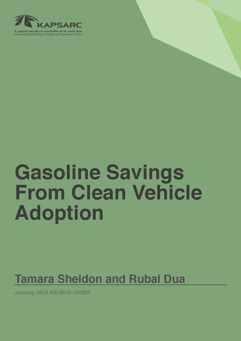
Gasoline Savings From Clean Vehicle Adoption

16 January 2018
Without the option to purchase plug-in electric and/or hybrid vehicles, conventional counterfactuals used in literature may underestimate the fuel savings from clean vehicle adoption, thus overestimating the costs of securing associated environmental benefits. Using a nationally repr...
Read More40

A global degree days database for energy-related applications

15 January 2018
Weather can have a profound effect on energy consumption particularly with respect to hot and cold temperatures, driving residential and commercial energy demand. The cooling and heating degree day methodology has been often been regarded as a reliable means to account for this effec...
Read More41

Measuring international migration in Azerbaijan

10 January 2018
International migration significantly affects economic, social, cultural, and political factors of the country. Owing to this situation, it can be said that the reasons of international migration should be analyzed in order to control this problem. The purpose of this study is to det...
Read More33

Residential electricity use effects of population in Kazakhstan


01 January 2018
We studied impacts of population groups of 15–64 and 65–above on residential electricity use in Kazakhstan in the STIRPAT framework. Unlike earlier studies for Kazakhstan in the STIRPAT framework, we applied time series cointegration and error correction methods. Results from the aut...
Read More32

East Africa Shared Gas Initiative
01 January 2018
Energy demand in the economies of Eastern Africa is among the lowest in the world and represents only a small outlet for the large natural gas resource that has been discovered. Despite its important potential, renewables (with the exception of hydropower) face a long road prior to m...
Read More45

Restructuring Saudi Arabia’s Power Generation Sector: Model-Based Insights



20 December 2017
Saudi Arabia plans to reform and privatize its power generation sector as part of the Kingdom’s Vision 2030. To provide analytical insights, we developed a model that simulates the restructuring of the electricity market, along with reforming fuel prices to an energy equivalent of $3...
Read More44

Can adoption of rooftop solar panels trigger a utility death spiral? A tale of two U.S. cities


05 December 2017
The growing penetration of distributed energy generation (DEG) is causing major changes in the electricity market. One key concern is that existing tariffs incentivize ‘free riding’ behavior by households, leading to a cycle of rising electricity prices and DEG adoption, thereby erod...
Read More34

The impact of age groups on consumption of residential electricity in Azerbaijan


04 December 2017
In this study, we examined the impacts of population age groups of 0–14, 15–64 and 65-above on residential electricity consumption in Azerbaijan within the STIRPAT framework. Unlike many prior studies of STIRPAT framework, we analyzed this impact, employing co-integration and error c...
Read More44

Thermal Study of Hybrid Photovoltaic-Thermal (PVT) Solar Collectors Combined with Borehole Thermal Energy Storage Systems


01 December 2017
This article reports on the evaluation of the short and long-term electrical performance of a photovoltaic-thermal (PVT) system coupled with borehole thermal energy storage (BTES). This assessment was conducted using a computer simulation of a PVT system installed on a small office b...
Read More36

Coal in Asia: The Challenge for Policy and the Promise of Markets
30 November 2017
When balancing the objectives of affordability, reliability and environmental sustainability of energy supply, the answer in developing Asian economies has historically been unequivocal: Coal is king. This is because these nations placed greater emphasis on the first two objectives a...
Read More42

Role of Oil in the Low Carbon Energy Transition
27 November 2017
The way the world uses energy services has entered a period of profound change. However, there is continuing uncertainty about its trajectory in terms of the speed and extent of transition. This will dictate whether the world achieves the 2oC target, and if not, by how much. But what...
Read More48

Growth Through Diversification and Energy Efficiency: Energy Productivity in Saudi Arabia






24 November 2017
With domestic energy demand in Saudi Arabia expected to potentially double by 2030, managing the relationship between energy consumption and economic growth will be very important for the Kingdom’s sustainable development. To assist in this task, this report recommends using energy p...
Read More46
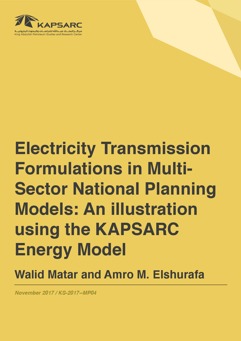
Electricity Transmission Formulations in Multi-Sector National Planning Models: An illustration using the KAPSARC Energy Model


05 November 2017
The purpose of this study is to assess policy-relevant effects of incorporating a more proper representation of electricity transmission in multi-sector national policy models. This goal is achieved by employing the KAPSARC Energy Model (KEM), which is the first publicly available la...
Read More45

Evaluation of building energy efficiency investment options for the Kingdom of Saudi Arabia



01 November 2017
In this paper, economic and environmental impacts of energy efficiency programs associated with new and existing buildings are evaluated for the Kingdom of Saudi Arabia (KSA). In particular, the analysis considers optimized designs for new buildings as well as different energy retrof...
Read More33

Oil subsidies and renewable energy in Saudi Arabia: A general equilibrium approach



01 November 2017
In 2016, the Kingdom of Saudi Arabia (KSA) announced its Vision 2030 strategic plan incorporating major changes to the economic structure of the country, including an intention to deploy 9.5 GW of renewable energy in an effort to reduce the penetration of oil in the electricity gener...
Read More42

Modeling of electricity demand for Azerbaijan: Time-varying coefficient cointegration approach



01 November 2017
Recent literature has shown that electricity demand elasticities may not be constant over time and this has investigated using time-varying estimation methods. As accurate modeling of electricity demand is very important in Azerbaijan, which is a transitional country facing significa...
Read More41

Welfare Implications of the Rebound Effect From More Energy-Efficient Passenger Cars

30 October 2017
Improving the energy efficiency of passenger cars makes it cheaper to drive, allowing motorists to take to the roads more frequently. This additional driving, which offsets some of the expected energy savings from energy efficiency, is known as the rebound effect and is perceived neg...
Read More44

Towards More Pragmatic Global Climate Goals and Policies
22 October 2017
This paper presents an analysis of the climate and economic impacts of four different carbon emission scenarios. The scenarios include: a ‘business as usual’ reference scenario; a carbon emission mitigation scenario designed to meet the Paris Agreement goal of limiting average global...
Read More40

Does urbanization boost pollution from transport?

19 October 2017
The study examines the impacts of urbanization, energy consumption and real GDP on atmospheric pollution from automobile transport in Azerbaijan in the STIRPAT framework. Since the study uses time series variables the unit root properties of employed variables are tested for non-stat...
Read More44

Review of energy-growth nexus: A panel analysis for ten Eurasian oil exporting countries

19 October 2017
The paper examines the energy-growth nexus in ten oil-exporting developing Eurasian countries: Azerbaijan, Bahrain, Iran, Kazakhstan, Kuwait, Oman, Qatar, Russia, Saudi Arabia and the UAE over the period 1997–2014. Lack of enough energy-growth nexus studies on the oil exporters of th...
Read More29

Modeling collective decision-making processes with the KAPSARC toolkit for behavioral analysis

19 October 2017
In this article, we briefly introduce the reader to the KAPSARC Toolkit for Behavioral Analysis (KTAB). KTAB is a toolkit for building models of collective decision-making processes (CDMP), and simulating them. KTAB is being developed by the King Abdullah Petroleum Studies and Resear...
Read More40

Will Current Electric Vehicle Policy Lead to Cost-Effective Electrification of Passenger Car Transport?
19 October 2017
Encouraged by the falling cost of batteries, electric vehicle (EV) policy today focuses on accelerating electrification of passenger cars, paying comparatively little attention to the cost of the particular type of EVs and charging infrastructure deployed. This chapter first discusse...
Read More41

Emissions leakage, environmental policy and trade frictions

19 October 2017
We develop a two-good general equilibrium model of a small open economy to decompose the effect of a country’s unilateral strengthening of environmental policy on pollution emissions in the rest of the world, known as emissions leakage. We show analytically and numerically that...
Read More49

The Political Feasibility of Policy Options for the UAE’s Energy Transition



10 October 2017
The United Arab Emirates (UAE) has said it wishes to transition toward a less carbon-intensive energy system, both as part of its Nationally Determined Contribution (NDC) within the United Nations Framework Convention on Climate Change (UNFCCC), and as one of a number of investments ...
Read More42

Understanding demand for hybrid and electric vehicles using large-scale consumer profile data

09 October 2017
Consumer adoption of hybrid and electric vehicles is a crucial step in improving energy utilization and reducing emissions from the transportation sector. T... Link: https://www.scopus.com/inward/record.uri?eid=2-s2.0-85050097941&partnerID=40&md5=fd6ac204cd44dcd69b41d1eca57ead78
Read More47
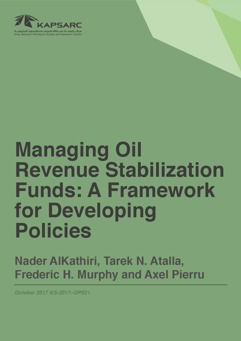
Managing Oil Revenue Stabilization Funds: A Framework for Developing Policies



04 October 2017
Oil revenue stabilization funds provide short-run protection against oil revenue fluctuations – in the way that Saudi government deposits and reserve at the Saudi Arabian Monetary Authority (SAMA) have historically served as a buffer to decouple government budget from oil revenue flu...
Read More47

The relationship between energy consumption and economic growth: Evidence from Azerbaijan

03 October 2017
The study investigates the causal relationship between energy consumption and economic growth in Azerbaijan using annual data covering the period from 1990 to 2015. We used Toda-Yamamoto causality test framework of vector autoregressive (VAR) model to test causal relationship between...
Read More33


GCC Energy System Overview – 2017


01 October 2017
This paper presents data sets that support economic and policy analyses of countries in the Gulf Cooperation Council (GCC). The objective is to provide an overview of the GCC energy systems and serve as a reference for researchers performing quantitative modeling and analysis
Read More37

How to Achieve Economic Prosperity Through Industrial Energy Productivity Improvement
27 September 2017
The King Abdullah Petroleum Studies and Research Center (KAPSARC) and the Energy Research Institute (ERI) of China’s National Development and Reform Commission (NDRC) have initiated a joint study into how industrial energy productivity can improve economic prosperity. This study come...
Read More47

Electricity markets around the world are facing significant challenges from the demand and supply side of the industry. From the supply side, distributed energy resources, usually owned by third parties, are forcing utilities to re-evaluate their business models; while developments i...
Read More47

Comparing renewable energy policies in E.U.15, U.S. and China: A Bayesian DSGE model


01 September 2017
The promotion of renewable energy sources (RES) by governments is one way of helping countries to meet their energy needs while lowering greenhouse gas emissions. In this paper, we examine the role of energy policy in RES promotion, based on a carbon tax and RES price subsidy, at a t...
Read More42

Growth, Investment and the Low-Carbon Transition: A View From Saudi Arabia


31 August 2017
A common priority across G20 countries is the need to reinvigorate economies through an economic transformation that delivers a higher level of better quality growth. At KAPSARC, the need to improve economic growth and deliver climate goals agreed at COP21 in Paris is being investiga...
Read More41

Transitioning to Liberalized Energy Markets
29 August 2017
Some countries have successfully navigated the transition to using a free market to provide energy more efficiently, while others are only just embarking on this journey. This transition is a lengthy, costly and complex process. Consequently, lessons learned from their experiences ca...
Read More39

Global LNG market outlook and repercussions for Europe

16 August 2017
Read More
31
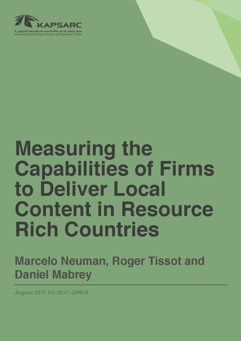
Measuring the Capabilities of Firms to Deliver Local Content in Resource Rich Countries
13 August 2017
The term ‘Local Content Policy’ is a catch-all for ensuring that resource owners capture more value from developments than the fiscal revenues alone. KAPSARC has explained the benefits of a dynamic perspective when evaluating firms’ capabilities – their entrepreneurial capacity – and...
Read More53

Price shocks are a feature of international oil markets, with the oil price collapse in the second half of 2014 being the most recent example. These episodes are a source of macroeconomic disruption that harm economic activity in the short and medium term, particularly for oil-export...
Read More38

Asian premium or North Atlantic discount: Does geographical diversification in oil trade always impose costs?

05 August 2017
We develop a Global Oil Trade Model (GOTM) to examine the ability of large crude oil exporters or importers to influence inter-regional price differentials by allocating their sales or purchases respectively among different crude oil consuming or producing regions. The model is based...
Read More36

Mobility-on-demand services provide a glimpse into the potential impact of an automated mobility future. Current signs suggest an important role for public policy in reaching a desired lowcongestion, energy-efficient mobility future.
Read More38

Reforming Industrial Fuel and Residential Electricity Prices in Saudi Arabia

29 July 2017
The Saudi electricity sector buys fuel and sells electricity at prices administered by the government. In this analysis, we assume that fuel prices are deregulated — priced at their marginal values or international equivalents — and use a long-term static version of the KAPSARC Energ...
Read More41

Prices versus policy: An analysis of the drivers of the primary fossil fuel mix



19 July 2017
Energy policymakers often attempt to shape their countries’ energy mix, rather than leave it purely to market forces. By calibrating and simulating a Dynamic Stochastic General Equilibrium (DSGE) model, this paper analyzes the primary fossil fuel mix in the USA and compares it ...
Read More35

Drivers of Transportation Fuel Demand: Fuel Efficient Mobility From the Consumer’s Perspective
19 July 2017
The working assumption of most policymakers and automakers is that light-duty vehicle buyers either undervalue fuel economy or behave as if they do – perhaps because of the complexity in evaluating discounted fuel cost savings. If one accepts this argument then huge benefits can be g...
Read More41

An Evaluation of High Energy Performance Residential Buildings in Bahrain


16 July 2017
This paper describes our analysis of the cost-effectiveness of designing and retrofitting residential buildings in Bahrain and outlines our analytical approach. The study focuses on residential buildings since households consume more than 48 percent of electricity used in the country...
Read More55

In 2016, policymakers in Saudi Arabia increased domestic transportation fuel prices, which are expected to approach market levels in the near future. Current low crude oil prices offer an excellent opportunity for policymakers to deregulate the passenger transportation sector without...
Read More38

Striking a balance between profit and carbon dioxide emissions in the Saudi cement industry


01 July 2017
Cement manufacturing is a major industry in Saudi Arabia. As a highly polluting sector, it may be part of CO2 abatement policy for the country. This paper presents a multi-criteria analysis to examine how two competing objectives affect the performance of the cement industry in Saudi...
Read More41

Estimating the Learning Curve of Solar PV Balance-of-Systems for Over 20 Countries



15 June 2017
The capital cost of a solar photovoltaic (PV) system comprises the module and balance-of-systems (BOS). The latter refers to everything else that is needed to make the solar system functional including cables, mounts, labor, etc. While modules are priced internationally, the BOS is c...
Read More39

Curbing Carbon Emissions: Is a Carbon Tax the Most Efficient Levy?

15 June 2017
The ambitious environmental objectives of the Paris Agreement imply that, in order to curb carbon emissions, all cost-effective policy options should be considered. These options include carbon taxes, probably the most popular fiscal tool for curbing emissions, and various other taxe...
Read More42

Economic and Environmental Benefits of Improving UAE Building Stock Energy Efficiency


08 June 2017
In the United Arab Emirates (UAE), buildings consume almost 90 percent of the total electricity used in the country, mostly in Dubai and Abu Dhabi. We undertook a study to explore available opportunities to improve the energy efficiency of the UAE building sector. This paper assesses...
Read More40

How do Price Caps in China’s Electricity Sector Impact the Economics of Coal, Power and Wind? Potential Gains from Reforms




01 June 2017
China imposes maximum prices by plant type and region on the electricity that generators sell to utilities. We show that these price caps create a need for subsidies and cross-subsidies, and affect the economics of wind power. We model the price caps using a mixed complementarity for...
Read More39

A look at the response of households to time-of-use electricity pricing in Saudi Arabia and its impact on the wider economy

01 June 2017
Households in Saudi Arabia account for about half of domestic electricity demand. This high level of consumption is partly due to historically low prices. These prices have also been flat throughout the day. Policymakers are exploring different pricing policies to help reduce this sh...
Read More37

Toward the Integration of Policymaking Models and Economic Models

31 May 2017
The traditional economic approach to policy analysis is to utilize tools and methods developed within the field of economics and study the economic impact of one or more policies solely from an economic perspective. As a consequence, the “policies” are usually formulated and evaluate...
Read More39


Energy Productivity: Evaluating Large-Scale Building Energy Efficiency Programs in Oman


22 May 2017
More than 75 percent of the total electricity consumed in Oman is attributed to buildings, with almost 50 percent used by households. The absence of mandatory energy efficiency regulations for buildings, coupled with population growth, has led to a significant increase in annual ener...
Read More38

Jointly reforming the prices of industrial fuels and residential electricity in Saudi Arabia

01 May 2017
The Saudi electricity sector currently buys fuel and sells electricity at prices administered by the government. In this analysis, we illustratively explore combining the reform of the fuel prices used in power plants with the implementation of alternative electricity pricing schemes...
Read More56

Support for a Carbon Tax in China: A Collective Decision-Making Process Simulation Using the KAPSARC Toolkit for Behavioral Analysis


01 May 2017
China, the world’s largest emitter of carbon dioxide, is taking steps to combat the effects of climate change on its environment. The path it takes to mitigate the effects of pollution will have a significant impact on the global carbon reduction agenda. In this study, we focus on th...
Read More41

Energy Dialogue 2016 Summary
18 April 2017
KAPSARC’s Energy Dialogue 2016 delivered rich insights and thoughtful discussion about the rapid transitions underway in an area of national and global importance. The 300 participants included high-level officials, leading researchers, policy strategists, and industry p...
Read More39

The Effect of Preferential Trade Agreements on Energy Trade from Chinese and Exporters’ Perspectives


16 April 2017
During periods of supply abundance that lead to lower prices, commodity exporters strive to secure their market share with major importing economies. This paper seeks to cast light on what drives an exporter’s share of Chinese imports of oil, gas and coal – and we find that the strat...
Read More41

Understanding Long Term Consumer Demand For Fuel Efficient Vehicles

16 April 2017
Consumer adoption of fuel-efficient vehicles is a crucial step in improving energy use and reducing emissions from the transportation sector. The range of options includes hybridization of powertrains all the way through to fully electric vehicles. To promote adoption, policymakers h...
Read More45

Future of the Electricity System in GCC Countries
10 April 2017
Global electricity markets are facing substantial changes from both the demand and supply side of the industry. These structural shifts are also affecting Gulf Cooperation Council (GCC) countries, which need to adapt by developing new electricity models. Moving to a new power system ...
Read More43

Efficient industrial energy use: The first step in transitioning Saudi Arabia’s energy mix




01 April 2017
In Saudi Arabia, industrial fuel prices are administered below international prices and firms make decisions based on low energy prices, increasing domestic energy demand. This analysis explores alternative policies designed to induce a transition to a more efficient energy system by...
Read More41

Assessing the cost of renewable energy policy options – A Spanish wind case study

01 April 2017
This paper assesses the cost effectiveness of wind energy policy options by using a cost–benefit analysis approach. In comparison with other studies, the main contribution of this paper is the use of real financial and operational information of 318 wind projects in Spain between 200...
Read More30


Joint Oil Stockpiling between Middle East Exporters and Northeast Asian Importers: A Winning Formula?
01 April 2017
When oil owned and commercially traded by an exporting country is stored in an importing country in exchange for first drawing rights by the host country in times of emergency, that process is known as ‘joint oil stockpiling’. It can thus be classified as both commercial and strategi...
Read More47

A Measurement Device for Estimating Local Firm Capabilities in New Oil Producing Countries: The Case of Uganda
01 April 2017
In this paper we present an overview of KAPSARC’s local content project, its methodological approach and objective. We describe a measurement device (questionnaire) used to quantify different features of local firms surveyed in Uganda. The data collected in these questionnaires provi...
Read More39
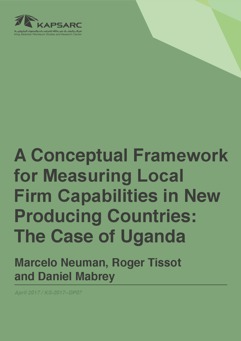
A Conceptual Framework for Measuring Local Firm Capabilities in New Producing Countries: The Case of Uganda
01 April 2017
Policymakers in new resource-rich Eastern African countries are eager to promote industrialization and economic development by encouraging international oil and gas companies (IOCs) to use local suppliers. However, policymakers usually lack information on the local firms’ abilities a...
Read More39

Human Geography of Energy describes a methodology that utilizes remote sensing and social science methods to answer research questions about energy use and energy development. To explore the potential of this approach, KAPSARC organized workshops in London and Boulder, Colorado to wo...
Read More45

Gasoline Demand, Pricing Policy and Social Welfare in Saudi Arabia

12 March 2017
In the face of low international oil prices, countries in the Gulf Cooperation Council recently implemented fuel price reform across a number of sectors. Saudi Arabia, for example, announced in December 2015 an increase in the gasoline price. We undertook a welfare analysis in this p...
Read More59

Economic Stability in the GCC Countries
08 March 2017
Evidence confirms that there is a positive correlation between the economic growth rate and its volatility/risk in the Gulf Cooperation Council (GCC) region. In other words, there is a trade-off between the benefits of oil and gas activity and the volatility resulting from unpredicta...
Read More45

Reporting LCOE for Solar PV: Apples to Apples Comparisons

08 March 2017
Solar energy is expected to be an integral technology in the creation of a low-carbon future. Hence, as photovoltaics (PV) installations continue to grow at an exponential rate, a better understanding of the generation costs of this relatively young industry is necessary in order to ...
Read More47

Foreword to the special issue: Renewables and diversification in heavily energy subsidized economies




01 March 2017
34
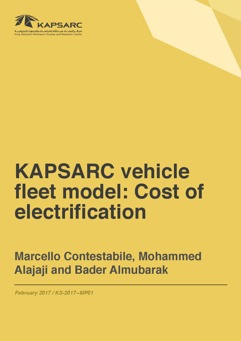
KAPSARC vehicle fleet model: Cost of electrification
28 February 2017
This paper discusses the model we have developed at KAPSARC for estimating the relative costs of passenger car fleets containing low-emission vehicles of different types, particularly with emphasis on electric vehicles. The main purpose of the model is to enable analysis of low-emiss...
Read More44

Passenger cars are responsible for a large and steadily growing share of global energy-related greenhouse gas (GHG) emissions. Electric vehicles (EVs) powered by renewable electricity have the potential to provide a substantial contribution to the decarbonization of passenger car tra...
Read More40

Third-Party Access to Regasification Terminals: Adapting to the LNG Markets’ Reconfiguration
09 February 2017
Substantial changes to global liquefied natural gas (LNG) markets, including the move toward the creation of an Asian trading hub, more flexibility through an increase of spot and short-term trade, liberalization in key Asian markets, emergence of new players and current oversupply, ...
Read More42

The unstudied barriers to widespread renewable energy deployment: Fossil fuel price responses
01 February 2017
Renewable energy policy focuses on supporting the deployment of renewable power generators so as to reduce their costs through scale economies and technological learning. It is expected that, once cost parity with fossil fuel generation is achieved, a transition towards renewable pow...
Read More33

Analyzing the effects of renewable energy and climate conditions on consumer welfare




01 February 2017
This paper aims to measure the impact of the gradual adoption of Renewable Energy Sources (RES) on the welfare of consumers. To this end, we construct a theoretically founded measure of the true cost of living (TCL) and the equivalence scale (ES) for the household sector, based on a ...
Read More38

Energy productivity evaluation of large scale building energy efficiency programs for Oman


01 February 2017
This paper outlines the benefits of large scale energy efficiency programs for new and existing buildings in Oman. In particular, an energy productivity analysis for these programs is carried out to encompass their overall impact for Oman’s economy. Over 75% of the total electr...
Read More37

Determinants of energy productivity in 39 countries: An empirical investigation

01 February 2017
This paper uses three types of analysis to investigate the drivers of energy productivity changes occurring in 39 countries during 1995–2009. We find that increases in sectoral energy productivity were the primary driver behind economy-wide energy productivity improvements. Structura...
Read More36

Coal and renewables are seen as the cornerstone of India’s energy strategy to meet its growing electricity demand. These two energy resources are at different stages of legislative, policy, regulatory and institutional reform.
Read More40

Fossil fuel price shocks and CO2 emissions: The case of Spain

01 January 2017
This paper focuses on the impact of oil, natural gas and coal price shocks on the Spanish business cycle from 1969 to 2013. It uses Bayesian procedures to estimate a Dynamic Stochastic General Equilibrium (DSGE) model for a small open economy. The paper shows that natural gas and coa...
Read More36
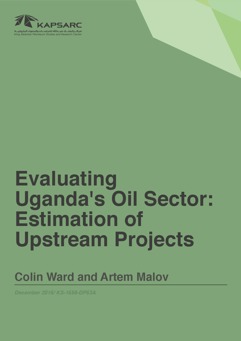
Evaluating Uganda's Oil Sector: Estimation of Upstream Projects

20 December 2016
Uganda and other countries in Eastern Africa are on the cusp of developing many oil and gas resources, and there is reason for local content to be included in the discussion. As part of a larger research effort at KAPSARC – which includes determining the local capacity for goods and ...
Read More48

Modeling and forecasting electricity demand in Azerbaijan using cointegration techniques



08 December 2016
Policymakers in developing and transitional economies require sound models to: (i) understand the drivers of rapidly growing energy consumption and (ii) produce forecasts of future energy demand. This paper attempts to model electricity demand in Azerbaijan and provide future forecas...
Read More32

Shaking up the LNG Scene
08 December 2016
Dramatic changes in the global liquified natural gas (LNG) markets are already visible through market dynamics and stakeholders’ behavior, but many other signs point to much more significant changes to come – a great reconfiguration, which could transform the way LNG is traded and ha...
Read More39
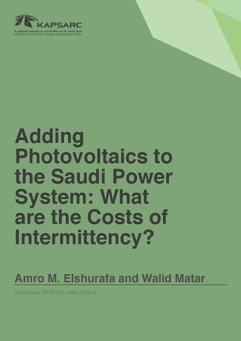
Adding Photovoltaics to the Saudi Power System: What are the Costs of Intermittency?


28 November 2016
Intermittent generation from wind or photovoltaics (PV) imposes a cost on the power systems in which they are deployed. These costs vary regionally due to different fuel costs and ramping flexibility of existing grid capacities. With 2015 as a reference year, we examine the costs of ...
Read More38

LNG for Africa
24 November 2016
Though Africa is traditionally considered as an exporter of pipeline gas and liquefied natural gas (LNG), in future it could come to be seen as an LNG market. Until recently, financing issues, market conditions, price sensitivity and the small size of the individual gas markets were ...
Read More41

Leveraging Intellectual Capital to Enhance Collaboration and Technology Deployment While Mitigating Freedom to Operate Risks in the Partitioned Zone

07 November 2016
to manage its intellectual property assets across the onshore portioned zone. The program applies Chevron’s intellectual property asset management system and accounts for government regulations and specific intellectual property provisions for company operations in the region.
Read More39

A tutorial on building policy models as mixed-complementarity problems


05 November 2016
After 50 years of development, building and solving mixed-complementarity problems (MCPs) have become commonplace for policy models that analyze markets. These models are used to develop policies that reshape markets, or introduce markets that replace other organizational forms. In t...
Read More34

Economic impacts of debottlenecking congestion in the Chinese coal supply chain




01 November 2016
The fast pace of development in China’s coal industry created bottlenecks in its transportation infrastructure. These bottlenecks likely affected not only China’s domestic coal market, but also global coal markets. In this paper, we estimate the costs and consequences of these bottle...
Read More34

Is unbundling electricity services the way forward for the power sector?

01 November 2016
High penetration of distributed energy resources will lead to further fragmentation of the power sector, both in the services offered and its value chain. Successful business models will be those that are able to create new products, establish more efficient pricing mechanisms and mo...
Read More47


Macroeconomic impacts from developing a country’s natural resources can occur much earlier than initially expected. There is evidence that just the announcement of a large oil or gas discovery can affect the economy.
Read More41

Evaluating Building Energy Efficiency Investment Options for Saudi Arabia



26 October 2016
This study suggests that energy efficiency programs in buildings can provide up to a 27 percent reduction in electricity consumption and a 30 percent reduction in peak electricity demand for Saudi Arabia. It is well recognized, however, that given the low electricity prices in Saudi ...
Read More47

Impacts of Higher Energy Efficiency on Growth and Welfare Across Generations in Saudi Arabia
26 October 2016
Energy policies in the oil-rich countries of the Gulf Cooperation Council (GCC) region influence their domestic growth in the long run. Accordingly, they also redistribute income across generations over long periods. In this paper, we use MEGIR-SA to assess the aggregate effects of h...
Read More38

Macroeconomic and Welfare Effects of Energy Policies in Saudi Arabia: The MEGIR-SA Model
26 October 2016
MEGIR – Model with Energy, Growth and Intergenerational Redistribution – investigates the long-run implications for growth and equity across generations of different energy policies. It is the first general equilibrium model with overlapping generations to be developed and applied fo...
Read More35

Major transformations are taking place in the mobility sector; where a transportation system comprising of shared, fully electric, connected and driverless cars available on demand may be on the cusp of emergence. Technological developments and preferences of the next generation towa...
Read More39

The prospects for coal-fired power generation in Saudi Arabia

19 October 2016
Almost all of Saudi Arabia’s electric power generation is fueled by oil and gas. Plans for future capacity envisage nuclear and renewables supplementing this mix and thereby freeing up oil for other revenue-generating opportunities. Coal-fired generation has been promoted in some Gul...
Read More37

Energy Productivity in the GCC: Evidence From an International Kuznets Curve Analysis



18 October 2016
This paper explores energy productivity trends at a national level for the countries of the Gulf Cooperation Council (GCC) and puts them in an international context. This analysis can be used as part of an evidence base for setting nationally appropriate energy productivity targets.
Read More42

Energy Productivity as a New Growth Model for GCC Countries



18 October 2016
Following the collapse in oil prices, Gulf Cooperation Council (GCC) countries have intensified efforts to find a new growth model which increases the welfare of their citizens, while reducing exposure to volatile energy markets. This paper argues that placing energy productivity at ...
Read More37

As economies in the Middle East and Asia grow and develop, there will be further strain on water, energy and food resources – each inextricably linked to the others. Much of the Middle East is energy abundant, but population growth and economic development have led to severe water an...
Read More40

Drivers of Transportation Fuel Demand: Aligning Future Scenarios and Policy Expectations
16 October 2016
The U.S. light-duty vehicle market represents a key test bed for some of the world’s leading vehicle regulatory policy programs. At the federal level, standards for model years 2022-2025 were established in 2012 under the Greenhouse Gas (GHG) Emissions/Corporate Average Fuel Economy ...
Read More37

Prices Versus Policy: An Analysis of the Drivers of the Fossil Fuel Energy Mix


05 October 2016
Understanding how the composition of a country’s energy mix is formed in an environment where greater government involvement is anticipated due to climate change obligations is critical. This paper is part of a project analyzing drivers of the mix and the transition to a future energ...
Read More45
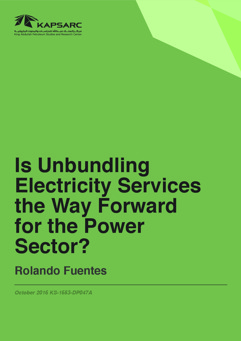
Is Unbundling Electricity Services the Way Forward for the Power Sector?

05 October 2016
High penetration of distributed energy resources (DERs) will lead to further fragmentation of the power sector, both in the services offered and its value chain. The ‘‘local’’ component of energy policies will probably become increasingly important.
Read More43

Does disagreement among oil price forecasters reflect volatility? Evidence from the ECB surveys



01 October 2016
We examine quarterly oil price forecasts from the Survey of Professional Forecasters conducted by the European Central Bank. We present three empirical findings, all of which are robust to the number of respondents considered. First, the dispersion of forecasts is correlated positive...
Read More42

Potential Gains From Reforming Price Caps in China’s Power Sector




29 September 2016
When energy sectors transition from government-controlled to market-driven systems, the legacy regulatory instruments can create unintended market distortions and lead to higher costs. In China, the most notable regulatory throwback is ceilings on electricity prices that generators c...
Read More39

Sub-Saharan Africa (SSA) has the most resource-rich countries in the world, many of whom are endowed with large oil, gas and mineral deposits. This discussion paper examines the role of natural resources in the economic development and demography of countries in SSA, showcasing vario...
Read More47
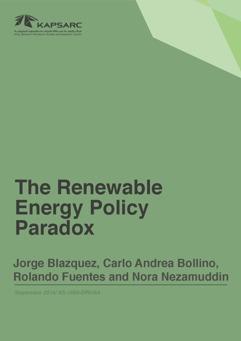
The Renewable Energy Policy Paradox




08 September 2016
One major avenue for policymakers to meet climate targets is by decarbonizing the power sector, one component of which is raising the share of renewable energy sources (renewables) in electricity generation. However, promoting renewables in liberalized power markets creates a paradox...
Read More50

LNG Markets in Transition: The Great Reconfiguration

06 September 2016
The industry has now embarked on a period of further change, with over 180 bcm of new LNG export capacity under construction at a time when the assumed rapid LNG demand growth in Asia appears to be slowing. The absorption of this new supply will affect, not on... Purchase a pdf download
Read More46

Investing for Energy Productivity in the GCC – Financing the Transition




02 September 2016
An unprecedented infrastructure investment boom occurred in the Gulf Cooperation Council (GCC) in the first part of the 21st century. Strong public capital spending supported by high energy prices provided governments with an opportunity to accelerate economic diversification and inf...
Read More40

Modelling residential electricity demand in the GCC countries


01 September 2016
This paper aims at understanding the drivers of residential electricity demand in the Gulf Cooperation Council countries by applying the structural time series model. In addition to the economic variables of GDP and real electricity prices, the model accounts for population, weather,...
Read More38

India aims to transition from a fossil fuel burning economy to a comparatively low-carbon economy through the increased use of renewables. To achieve this, India aims to build 175 GW of renewable energy capacity by 2022, establishing one of the largest renewable programs in the world...
Read More36

Quantifying Worldwide Demand Elasticities as a Policy Tool

10 August 2016
This paper provides a comprehensive worldwide database of estimated elasticities for electricity and natural gas for households as a function of income, price, capital stocks and weather conditions.
Read More33
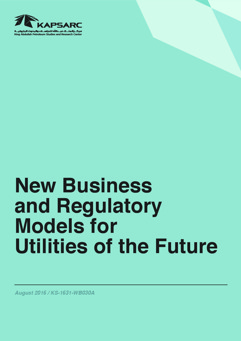
Technological advancements have the potential to disrupt the fundamentals of the electric power sector and to some extent make the current role of utilities obsolete. Many countries face this challenge but so far a generic business and regulatory model has yet to emerge that would re...
Read More42

Local content is a political imperative in Eastern Africa, and how it is implemented has implications for the economics of oil and gas projects and could also affect expected government revenues. Policymakers need to weigh the trade-off between encouraging local content against endan...
Read More46

Energy Relations and Policy Making in Asia



08 August 2016
Trade between the economies of the Gulf Cooperation Council (GCC) and North East Asia (NEA) reached $471 billion in 2013, based almost entirely on oil and gas. The GCC sends 44 percent of its exports to NEA, which depends on the GCC region for a very high proportion of its oil import...
Read More41

The Responsiveness of Fuel Demand to Gasoline Price in Passenger Transport

26 July 2016
Empirical estimates of fuel demand changes to price variation are based on historical consumption and prices, and can be applied as a single point estimate to a wide range of price movements. However, if fuel prices are set outside the boundaries of historical changes, policymakers m...
Read More48

Around 150 mtpa of LNG export capacity will come to global gas markets over 2015-20. While Asia seems unlikely now to be able to absorb it all, Europe emerges as a residual market for flexible volumes. The question is, therefore, which outcome(s) in the global LNG market could set th...
Read More45


Will current EV and charging infrastructure policy lead to cost-effective electrification of passenger car transport?
19 June 2016
Governments around the world are seeking to expedite the electrification of passenger cars. Due to the particular policy approaches taken and market conditions, different mixes of BEVs and PHEVs and of rapid and slow public charging infrastructure are starting to emerge in different ...
Read More30

Measuring persistent and transient energy efficiency in the US

19 June 2016
The promotion of US energy efficiency policy is seen as a very important activity. Generally, the level of energy efficiency of a country or state is approximated by energy intensity, commonly calculated as the ratio of energy use to GDP. However, energy intensity is not an accurate ...
Read More38

The penetration of renewable energy in deregulated electricity markets is changing the behavior of wholesale electricity prices. Liberalized electricity markets work well when the penetration of renewable energy is low, but they are disrupted when the penetration is significant.
Read More40

Policy Instruments & Market Uncertainty: Exploring the Impact on Renewables Adoption


16 June 2016
Policymakers have a variety of financial tools to foster the deployment of renewables. Our study explores how these policy instruments impact a private investor’s behavior, and the resulting differences in the adoption of renewable technology as well as costs to taxpayers and ratepay...
Read More40

The recent fall in oil and natural gas revenues has brought renewed attention to domestic energy pricing issues among GCC governments. Fuel and feedstock prices are typically set below world market prices to support domestic energy-intensive activities such as petrochemicals producti...
Read More49

Policymakers Guide to the Various Ways of Calculating Energy Productivity

13 June 2016
The existence of multiple approaches to calculating energy productivity, with its resulting diverse outcomes, makes it difficult to draw meaningful comparisons between economies and monitor their progress over time. To understand better the implications of this, we conducted a system...
Read More41

Beyond the end-consumer: how would improvements in residential energy efficiency affect the power sector in Saudi Arabia?

01 June 2016
Energy efficiency in buildings has garnered significant attention in Saudi Arabia. This paper outlines the potential effects of higher residential efficiency on electricity load profiles in the Kingdom. It further presents the associated benefits that could have been realized by the ...
Read More51

Drivers of Transportation Fuel Demand: Is Policy Expanding the Reach of Alternative and Fuel Efficient Vehicles?
01 June 2016
The transportation sector accounts for about 25 percent of all energy consumed worldwide and lightduty vehicles constitute the largest portion of this. Policy has a significant role in increasing vehicle fuel efficiency and expanding the reach of alternatively fueled vehicles.
Read More42

Challenges for Widespread Renewable Energy Deployment


01 June 2016
Part of the policy strategy to avert the worst outcomes of global climate change is a transition to low carbon energy on an unprecedented scale. In particular, strong incentives are in place to promote the competitiveness of renewable energy technologies, stimulate their rapid uptake...
Read More38

Understanding Adoption of Energy-Efficient Technologies: A Case Study of Battery Electric Vehicle Adoption in the U.S.

16 May 2016
The adoption of energy-efficient technologies is a key factor in improving energy utilization. The ways in which consumers make their decisions – incorporating non-economic factors – is critical to understanding the pace and depth of adoption. We present a way of characterizing curre...
Read More47

Renewable Energy: Lessons from the EU Experience
16 May 2016
Reducing reliance on fossil fuels in the generation of electricity through supporting wind turbines, solar cells and other renewable technologies has been a key objective of the European Union (EU) for more than a decade. Between 2004 and 2013, the largest 19 European countries more ...
Read More38

The Gulf region has seen rapid population and economic growth over the past few decades, changing the landscape of the area, raising living standards and enabling millions to increase their consumption of essential services such as water and electricity. These services have mostly be...
Read More44

Can Adoption of Rooftop Solar PV Panels Trigger a Utility Death Spiral?



15 May 2016
The growing penetration of distributed energy resources (DER) such as solar and wind power is causing major changes in the electricity market. One key concern is that existing tariffs incentivize ‘free riding’ behavior by households, which leads to a cycle of rising electricity price...
Read More38

Evaluating the economic viability of solar-powered desalination: Saudi Arabia as a case study
03 May 2016
This article constructs a cost calculator to estimate the economic competitiveness of solar-powered desalination in Saudi Arabia. Solar desalination is defined as a plant that obtains solar energy from a closed system. This is done to focus the investigation on desalination technolog...
Read More40

The Impact of Low Oil and Gas Prices on Gas Markets: A Retrospective Look at 2014-15

03 May 2016
In the past year, global gas prices have dropped significantly, albeit at unequal paces depending on the region. All else being equal, economists would suggest that this should have generated a positive demand response. However, “all else” was not equal. Prices of other commodities a...
Read More37

Turkey and the EU: Energy, Transport and Competition Policies

01 May 2016
Specifically, these studies aimed to (i) examine the extent to which Turkey’s policies have the potential to converge with thos... Authors: Ahmet O. Evin, Emre Hatipoglu & Peter Balazs http://ipc.sabanciuniv.edu/publication/turkey-and-the-eu-energy-transport-and-competition-policies
Read More44

Solar Photovoltaic Toolkit


16 April 2016
This data set compiles capital costs (CAPEX) and levelized cost of energy (LCOE) data for the solar photovoltaic (PV) technology by year and country and presents the data in an interactive manner. Although, the data set contains information that dates back to the 1980s, most of the i...
Read More42

How Will Natural Gas Adapt to the New Price Environment?
11 April 2016
During the period 2011-14, buyers – particularly in Europe and Asia – argued that high natural gas prices had been the main obstacle preventing the fuel from fulfilling its promise and increasing its share in the primary energy mix. Key gas price indices have dropped across the world...
Read More41
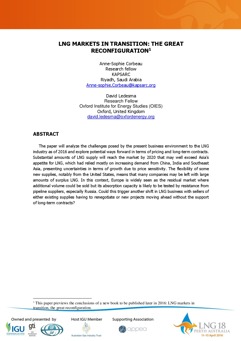
LNG Markets in Transition: The Great Reconfiguration

11 April 2016
Read More
53

Do population age groups matter in the energy use of the oil-exporting countries?

01 April 2016
This study examines the impacts of the population age groups of 20-34, 35-49, 50-64 and 65-79 on the per capita energy use of the oil-exporting countries of Commonwealth Independent States: Azerbaijan, Kazakhstan and Russia employing the modified-STIRPAT framework. Considering that e...
Read More34


Step by Step: The Reform of China's Energy Economy
21 March 2016
China has become a regional powerhouse, a middle-income country and home to the world’s largest middle class. Its GDP has grown from $400 billion in 1971 to more than $13 trillion in 2012 (purchasing power parity, 2005 US$). The government aims to double GDP per capita once again, fr...
Read More40

The case for alternatives to gasoline and diesel was historically built on economic concerns; that the world might be running out of oil, which would then become prohibitively expensive. More recently, the argument has been refocused around carbon abatement and avoiding the social co...
Read More41

Water, energy and food are inextricably linked and, consequently, inefficient use of any of the three resources can have a negative effect on the other two. Managing this nexus requires a holistic approach. We compare the productivity of extracted water used for agriculture, and the ...
Read More48
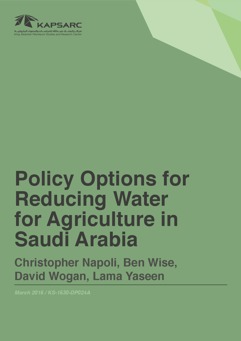
Policy Options for Reducing Water for Agriculture in Saudi Arabia

05 March 2016
Saudi Arabia relies almost exclusively on aquifers and desalination to provide its water. Roughly 87 percent of these water extractions are used for agriculture, and so any policy to improve the sustainability of water resources cannot ignore this agriculture dimension.
Read More49
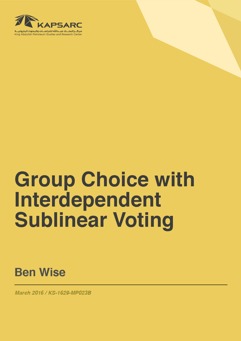
Group Choice with Interdependent Sublinear Voting
05 March 2016
Many important decisions of policy are made in a collective manner, so a great deal of formal and informal analysis has been devoted to collective decision-making processes (CDMPs). One common approach to analyzing CDMPs is first to model the participants as exercising their ‘votes’ ...
Read More42

Oil price: Endless ability to surprise

04 March 2016
[No abstract available]
Read More35

Analyzing coalitions in China’s policy formulation: Reforming the role of state-owned enterprises in China’s energy sector

01 March 2016
We focus on the elite decision-making process in China, analyzing the formation of coalitions around particular policy options. We apply a framework that simulates collective decision-making processes (CDMP): the KAPSARC Toolkit for Behavioral Analysis (KTAB). KTAB facilitates the ap...
Read More50

A framework for understanding energy for water
03 January 2016
This article offers a framework for understanding how energy is used to meet water demand in countries. Specifically, the relationships between energy use and water scarcity, the location of renewable water resources, and aggregate water demand are explored. The article also examines...
Read More32

Assessing the impact of political disruptions on crude oil trade

01 January 2016
Provides an empirical evaluation of energy trade flows, focusing on crude oil trade among the top 20 crude oil exporters and top 20 crude oil importers. We assess the potential impact of cross-national political disruptions (bilateral and regional) on energy trade between the six pro...
Read More44

Energy Relations and Policy Making in Asia: Conclusion
01 January 2016
One Belt One Road. It has been the Chinese government’s slogan of the last few years, and it may come to dominate the middl... https://www.scopus.com/inward/record.uri?eid=2-s2.0-85018068233&doi=10.1007%2f978-981-10-1094-1_16&partnerID=40&md5=b0253707a9a718d29eed5a96e32eb2be
Read More37

Energy Relations and Policy Making in Asia
01 January 2016
This volume goes beyond a conventional analysis of Asia’s energy relationships and explores the premise that energy relations in Asia in the 21st century should reinforce mutual interdependence. Conventional analyses of internatio... https://www.palgrave.com/gp/book/9789811010934
Read More38

Biophysical and economic limits to negative CO2 emissions

01 January 2016
To have a >50% chance of limiting warming below 2 °C, most recent scenarios from integrated assessment models (IAMs) require large-scale deployment of negative emissions technologies (NETs). These are technologies that result in the net removal of greenhouse gases from the atmosph...
Read More57

GCC-NEA oil trade: Competition in asian oil markets and the Russian ‘Pivot’ east

01 January 2016
KAPSARC: The purpose of this paper is to assess Middle East crude oil exporter strategies to maintain or expand market share in Asian oil demand. It also analyses the impact of changing global crude oil flows on key oil exporters’ revenues and on inter-regional price differentials by...
Read More41

Natural Resource Revenue Management Strategies in Developing Countries: A Calibrated Macroeconomic Model for Uganda



24 December 2015
Recent natural resource discoveries in Eastern Africa provide an opportunity to boost economic development. However, this opportunity brings with it potential challenges in the form of ‘Dutch disease’ and, potentially, the ‘resource curse’. A companion paper to this report: Managing ...
Read More45

The Prospects for Coal-fired Power Generation in Saudi Arabia


24 December 2015
Almost all of Saudi Arabia’s electric power generation is fueled by oil and gas. Plans for future capacity envisage nuclear and renewables supplementing this mix and freeing up oil for other revenue-generating opportunities. Coal-fired generation has been promoted in some Gulf Cooper...
Read More55
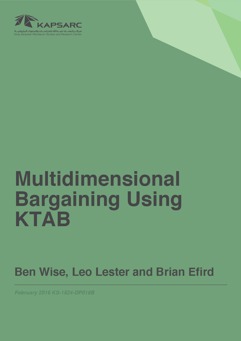
Multidimensional Bargaining Using KTAB



24 December 2015
This paper (Multidimensional KTAB) is a technical discussion paper designed as a follow on to An Introduction to the KAPSARC Toolkit for Behavioral Analysis using one-dimensional spatial models (Unidimensional KTAB). It extends the original framework of KTAB to explain the analysis d...
Read More42

Comparing Renewables Support Policies: Quantifying the Trade-Offs


24 December 2015
Policies to support wind energy development are most effective when they deliver power at the lowest cost per unit of added capacity and per unit of delivered electricity. Our analysis uses real Spanish onshore wind project data to identify which approaches deliver the lowest cost to...
Read More44

Quantifying the impact of coal on global economic growth and energy productivity in the early 21st century


01 December 2015
Two intriguing circumstances have characterized the behavior of energy markets in the first years of 21st Century: a sharp increase in oil prices without a clear impact on real economic activity and a relative stagnation of energy productivity after 30 years of continuous improvement...
Read More33

Measurement of energy efficiency based on economic foundations

01 December 2015
Energy efficiency policy is seen as a very important activity by almost all policy makers. In practical energy policy analysis, the typical indicator used as a proxy for energy efficiency is energy intensity. However, this simple indicator is not necessarily an accurate measure given...
Read More38

The embodied energy in trade: What role does specialization play?

01 November 2015
Many industrialized countries are net importers of embodied energy and emissions, while many developing countries are net exporters. We examine the role of specialization in driving these trade patterns by conducting a spatial index decomposition analysis on the embodied energy in ne...
Read More42

The Economics of Energy Vulnerability
24 October 2015
The economic vulnerability of an economy to energy disruptions is traditionally viewed through the lens of price shocks. This ‘energy vulnerability’ is driven by the energy mix, the infrastructure and the supply chain resilience that an economy enjoys.
Read More35

This study employs a multi-regional input-output model at the provincial level to evaluate the environmental costs of coal burning in China in 2007, in terms of its damages from climate change externality. According to the results, the contributions of central-west provinces to the n...
Read More47
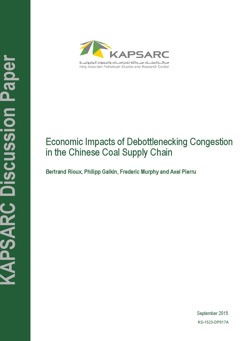
Economic Impacts of Debottlenecking Congestion in the Chinese Coal Supply Chain




07 September 2015
China’s coal industry grew at unprecedented rates during the first decade of the 2000s in order to support equally unprecedented economic growth. In that type of environment, it is impossible for the capacities of every link in the supply chain to be correctly sized all the time. In ...
Read More54

Beyond the ‘Green Economy’: China’s Path to Sustainability
06 September 2015
While developed economies plan their transition from a ‘brown economy’ to a ‘green economy’, China is embarking on its journey directly to the ‘golden economy’—a future in which energy, water and land use are harmonized with social and economic needs, including meaningful employment ...
Read More39
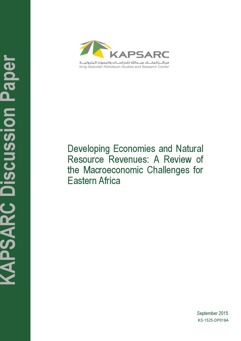
Macroeconomic Challenges for Eastern Africa



06 September 2015
Recent natural resource discoveries in Eastern Africa provide an enormous opportunity to boost economic development. However, success is not inevitable and the causes of failure have been extensively researched during recent years. This paper summarizes the challenges that can beset ...
Read More40
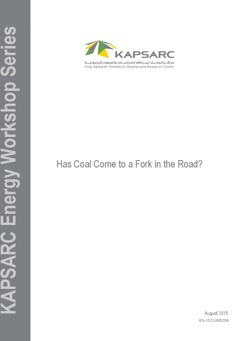
Has Coal Come to a Fork in the Road?
11 August 2015
Coal’s future depends on politics and technology. The world currently seems divided between the OECD members—attempting to phase coal out of their energy mix—and much of the rest of the world that is torn between access to cheap energy and its environmental impacts. This leaves gover...
Read More40
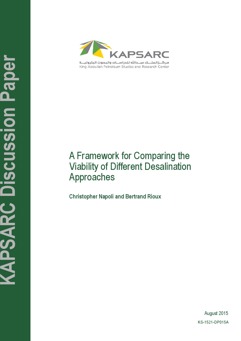
A Framework for Comparing the Viability of Different Desalination Approaches

06 August 2015
Most renewable powered desalination schemes are hybrids that displace fossil fuel power when renewable power is available. Their economic viability depends only on whether the renewable power source can generate electricity more cheaply than the fuels that it displaces. The framework...
Read More42

Natural Gas: Entering the New Dark Age
06 August 2015
Even the most aggressive decarbonization forecasts of the International Energy Agency (IEA) foresee a growing role for natural gas in 2040. Industry players forecast a role for gas as the fuel of choice, whether as a destination or a bridge fuel. And yet, in most parts of the world, ...
Read More44
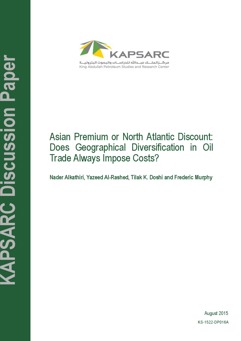
Asian Premium or North Atlantic Discount: Does Geographical Diversification in Oil Trade Always Impose Costs?


06 August 2015
It is popularly believed that importers of oil diversify their suppliers to achieve security of supply and that exporters diversify their customer base to achieve security of demand. However, this diversification comes at a cost, compared with buying from or selling to the most econo...
Read More41

Reforming the Role of State-Owned Enterprise in China’s Energy Sector: An Analysis of Collective Decision-Making Processes Using the KAPSARC Toolkit for Behavioral Analysis (KTAB)



06 July 2015
What are the prospects for reform of the Chinese energy sector? This question is the subject of much debate both inside and outside China. Since coming to power in November 2012, China’s new government has issued a series of statements on reform, clearly an important part of the coun...
Read More41

Since the OPEC meeting on November 27, 2014, world attention has focused on the U.S. shale oil producers, their financiers and how quickly they will throttle back their production due to low oil prices. U.S. producers are now considered by many to have taken over the role of the majo...
Read More42

The discovery of significant oil and gas reserves in Eastern Africa provides a major opportunity for boosting economic development in the region. In developing these reserves, Kenya, Mozambique, Tanzania and Uganda have the chance to rapidly transform their economies and address deve...
Read More43

Economic modelling of energy services: Rectifying misspecified energy demand functions

01 July 2015
Although it is well known that energy demand is derived, since energy is required not for its own sake but for the energy services it produces – such as heating, lighting, and motive power – energy demand models, both theoretical and empirical, often fail to take account ...
Read More39

Efficient Industrial Energy Use: The First Step in Transitioning Saudi Arabia’s Energy Mix




07 June 2015
External observers worry about whether Saudi domestic consumption of oil will crowd out exports. This is based on simple extrapolations which suggest that in a little more than 20 years Saudi Arabia may become a net importer of hydrocarbon fuels. However, our research does not suppor...
Read More37

Quantifying the determinants of a country’s energy productivity trends answers the fundamental question of whether its economy is becoming more energy productive because of technological and efficiency gains, or whether it is due to structural economic shifts. This paper uses three t...
Read More39
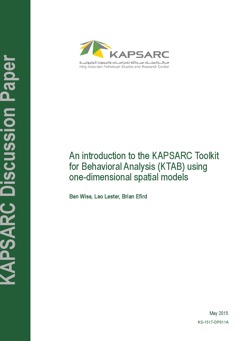
An Introduction to the KAPSARC Toolkit for Behavioral Analysis (KTAB)



07 May 2015
The KAPSARC Toolkit for Behavioral Analysis (KTAB) is freely available, state-of-the-art software that has been designed to enable the rigorous and systematic analysis of collective decision-making processes (CDMPs). KTAB is being designed with three types of users in mind. The progr...
Read More43

Members of the Gulf Cooperation Council (GCC) play a key role in the global energy system. Collectively, in 2014 the six countries supplied the global market with over 28 million barrels of oil equivalent per day of oil and natural gas. They also hold approximately 30% of global prov...
Read More43

While their consequences are usually obvious, global shifts are not always apparent until after they have occurred. Most shifts have their roots in local political, technological or economic forces and may interact in some way with the energy system. Globalization amplifies their eff...
Read More40

Developing local content policies requires first a definition of what constitutes ‘local’ and ‘content’. The politically workable answers are typically different in Eastern Africa than other parts of the world – local context is important. There is no single template that can be tran...
Read More45

Lowering Saudi Arabia’s fuel consumption and energy system costs without increasing end consumer prices




01 May 2015
Using a multi-sector equilibrium model of the Saudi energy system that handles administered prices in a mixed-complementarity formulation, we present results from a set of policy scenarios that lower oil consumption in the country. Some of these scenarios are the solutions to Mathema...
Read More36

Devising and Optimizing Development Strategies for South Fuwaris Field Using Integrated Reservoir Simulation Models

21 April 2015
The South Fuwaris Field is located in the Partitioned Zone (PZ) between Saudi...0 API) from two prolific heterogeneous carbonate reservoirs: Ratawi Limestone and Ratawi Oolite. The field has been developed using vertical and horizontal wells with all wells on electric submersible pumps.
Read More39
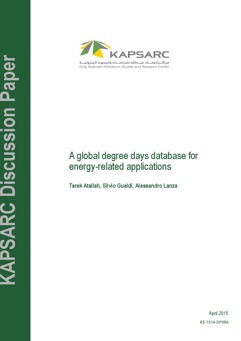
A global degree days database for energy-related applications

06 April 2015
Weather can have a profound effect on energy consumption, especially extremes of hot and cold temperatures. These variations in particular drive residential and commercial energy demand because space heating and cooling is such an important component. Traditional approaches are custo...
Read More36

Modeling residential electricity consumption and efficiency within an economic framework

06 March 2015
Many countries have promoted energy efficiency and conservation in the residential sector due to its significant contribution to total demand. This paper discusses some of the wider implications of more efficient households on the overall energy system. Various efficiency options, su...
Read More41
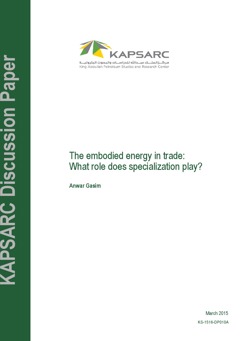
Embodied energy in trade: What role does specialization play

06 March 2015
In global discussions aimed at limiting greenhouse gas emissions, the national targets set by governments are tied to the energy used or emissions generated within national borders. However, international trade can confuse the accounting. Moving a factory across the border does not c...
Read More45

How coal fueled global growth and slowed energy productivity gains in the early 21st century

06 March 2015
It is common for decision makers and media to conflate the oil price with the price of energy. High crude oil prices are taken as signals of energy scarcity. By contrast, and perhaps misleadingly, low crude oil prices are perceived as evidence of energy abundance.
Read More43

Coal: Modeling a complex fuel source
06 February 2015
Coal represented 30% of worldwide primary energy consumption in 2013 and would become the most consumed fuel through 2040, under the International Energy Agency (IEA) Current Policies Scenario. However, even in countries with policies designed to curb its supply and consumption, coal...
Read More52

Energy transitions policy: What matters most
06 February 2015
KAPSARC’s research into energy transitions asks why transitions take longer and cost more than policymakers anticipate. Our focus is on the dynamics of the supply chains supporting new fuels and technologies as they penetrate sectors previously occupied by fossil fuels.
Read More42

Energy productivity: From policy goal to reality
06 February 2015
Energy productivity, at the national level, has emerged as a valuable indicator for a number of reasons. It accommodates economic growth, linking energy use to gross domestic product. It is more than conceptually tied to energy efficiency; seen by policymakers as a solution to a wide...
Read More41

The map of world oil flows is changing. It is not only the flows of crude oil that have been affected by surging US light tight oil production, but product flows are also undergoing significant change. Whether these trends will represent a transient shock or a secular change depends ...
Read More39

China's Sustainable Fuel Strategies
24 January 2015
KAPSARC’s China Research Project is investigating the policy-economic nexus that underpins the growth and evolution of China’s energy economy. This workshop investigated one of the major emerging trends of China’s energy transformation: the development of sustainable fuel use.
Read More40

The KAPSARC Energy Policy Database: Introducing a Quantified Library of China’s Energy Policies


06 January 2015
Government policy is a critical factor in the understanding of energy markets. Governments create constraints and incentives that drive behavior through policy. In turn, these behaviors have fundamental impacts on the functioning of markets. Despite the critical role of policy, it is...
Read More50

Energy for Water
06 January 2015
Energy for water was chosen because it has received less attention in discussions on water and energy, which to date have focused largely on how water is required in the production of different energy resources. Water and energy form a nexus with agriculture that requires a more inte...
Read More40

Drivers of Transportation: Measuring the Impact of Policy on Adoption of Alternative Fuel Vehicles
06 January 2015
The effects of fuel economy and greenhouse gas (GHG) emission standards continue to reverberate through the automotive industry as governments attempt to reduce tailpipe emissions. Manufacturers are developing alternative fuel powertrains and more efficient internal combustion engine...
Read More38

Why build energy models as MCPs? An economic perspective


06 January 2015
The discipline of microeconomics focuses on the outcomes of the actions of economic agents, where economic agents can be individuals as producers and consumers or organizations that deliver goods or services. Microeconomists have developed a collection of models to understand and rep...
Read More46

The Dynamics of China’s Energy Economy
06 October 2014
The growth of its economy means that the People’s Republic of China ranks at the top of many energy related league tables. It produces and consumes roughly 50% of the world’s annual coal demand, while also being the largest importer of coal (accounting for 16% of total coal imports)....
Read More45

The challenges of energy policy are multiplying, particularly as climate change has become a feature of the discourse around the world. There is no single policy tool that addresses all elements of the energy trilemma – securing affordable, reliable, and environmentally sustainable e...
Read More39

KAPSARC and the U.S. Energy Information Administration jointly convened a working group meeting on June 3, 2014 in Beijing on modeling the Chinese energy economy. This introduced the different models and methods currently being pursued by different stakeholders and so facilitate coll...
Read More43

Managing China's energy productivity potential: what lessons for policy makers

06 October 2014
Maximizing the economic welfare extracted from the energy system is a key priority for all governments. This can be measured by a country’s energy productivity. Perhaps nowhere else in the world is this issue more salient than in China. China is the world’s largest energy consumer an...
Read More43
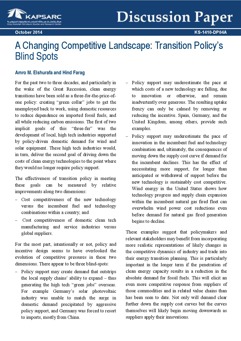
Changing Competitive Landscape: Transition Policy’s Blind Spots




06 October 2014
For the past two to three decades, and particularly in the wake of the Great Recession, clean energy transitions have been sold as a three-for-the-price-ofone policy: creating “green collar” jobs to get the unemployed back to work, using domestic resources to reduce dependence on imp...
Read More39

Energy productivity: aligning global agendas
06 October 2014
The well-established link between economic growth and energy usage presents a conundrum for policymakers that can be resolved by focusing on energy productivity to promote greater societal welfare. Energy productivity focuses attention on how energy resources can be put to their best...
Read More50

Policy Support for Energy Transitions: Where is Public Money Best Spent?
06 September 2014
Considerations for the effective allocation of public funding in support of energy transitions require an appreciation of the success and failure of policy instruments in achieving balanced energy transitions. Understanding the impact of structural changes in supply chains of both ne...
Read More39

The impact of oil price volatility on welfare in the kingdom of saudi arabia: Implications for public investment decision-making


01 April 2014
Since real oil price is positively correlated with real consumption and domesticincome in Saudi Arabia, a risk premium needs to be considered when assessingthe net present value of oil-related public investment projects. For projects generatingadditional oil exports, this risk premiu...
Read More46

Banning the bulb: Institutional evolution and the phased ban of incandescent lighting in Germany

01 April 2014
Much academic attention has been directed at analysing energy efficiency investments through the lens of ‘behavioural failure’. These studies have challenged the neoclassical framing of regulation which emphasises the efficiency benefits of price based policy, underpinned...
Read More41

Lowering Saudi Arabia’s fuel consumption and energy system costs without increasing end consumer prices




07 March 2014
Saudi Arabia aims to reduce the growth of its energy demand. This paper outlines an approach that could help the country to reduce substantively its current fuel consumption and could result in a net economic gain without increasing current end consumer prices and while maintaining p...
Read More39

Ratios that link energy consumption, or its related emissions, to the economic value generated accommodate the differing progress on economic development of nations better than absolute measures. Policymakers are increasingly using indicators such as energy efficiency, intensity, and...
Read More52

A Framework for Fuel and Technology Transitions in Energy: Evaluating Policy Effectiveness
06 March 2014
This paper discusses a framework that adds to existing approaches for evaluating energy transitions and policy. The framework that KAPSARC is developing aims to provide a tool for assessing the effectiveness of policy instruments in delivering rapid transitions in the energy mix. How...
Read More39

Energy systems modeling to support policy making
06 February 2014
The main needs of energy system models over the past three decades trace a journey from an era in which concerns about security and sufficiency of supply were the dominant themes (1970s and 1980s), through a swing towards liberalizing markets, particularly North American natural gas ...
Read More45

Pushing Maximum Reservoir Contact Applications to New Limits in Tight Facies: A Case Study of Middle East’s Highest Reservoir Exposure Producer

19 January 2014
The paper presents the evolution of reservoir management strategies that supported a recently drilled penta-lateral producer, which set a company record of total reservoir contact in a major greenfield in the Middle East. This paper will investigate the maximum reservoir contact (MRC...
Read More39

Measuring the energy intensity of nations: Towards a framework for transparent comparisons
06 December 2013
This paper explores whether it was feasible and reasonable to gain a better understanding of national energy intensity by measuring the embodied energy in goods traded across national borders. If so, this information could provide decision-makers with a more transparent picture of a ...
Read More44

Capital structure in LNG infrastructures and gas pipelines projects: Empirical evidences and methodological issues

01 October 2013
This paper provides new empirical insights on the capital structure of project-financed LNG infrastructures and gas pipeline projects, by using data relating to projects whose financial close occurred between June 2004 and March 2011. Most results are consistent with the basic view o...
Read More30

A simple approach to valuing a multinational firm’s tax shields


01 September 2013
We consider a multinational firm that seeks to maximize its total amount of interest tax shield while following a constant debt ratio policy on a global level. The firm’s total interest tax shield can then be considered as a piecewise-linear increasing function that is concave with r...
Read More50

This paper provides an assessment and a review of the national oil companies’ (NOCs) business models, challenges and opportunities, their strategies and emerging trends. The role of the national oil company (NOC) continues to evolve as the global energy landscape changes to ref...
Read More36

The role of CO2 capture and storage in Saudi Arabia’s energy future
01 November 2012
This paper aims to investigate for the first time the role of carbon dioxide (CO2) capture and storage (CCS) in shaping the future energy policy for Saudi Arabia. It begins with a broad analysis of the strategic context for CCS. It then reviews CCS development in Saudi Arabia, includ...
Read More41

Carbon Capture and Storage: Technologies, Policies, Economics, and Implementation Strategies
02 November 2011
This book focuses on issues related to a suite of technologies known as “Carbon Capture and Storage... https://www.crcpress.com/Carbon-Capture-and-Storage-Technologies-Policies-Economics-and-Implementation/King-Abdullah-Petroleum-Studies-Al-Fattah-Barghouty-Dabbousi/p/book/9780415620840
Read More39
